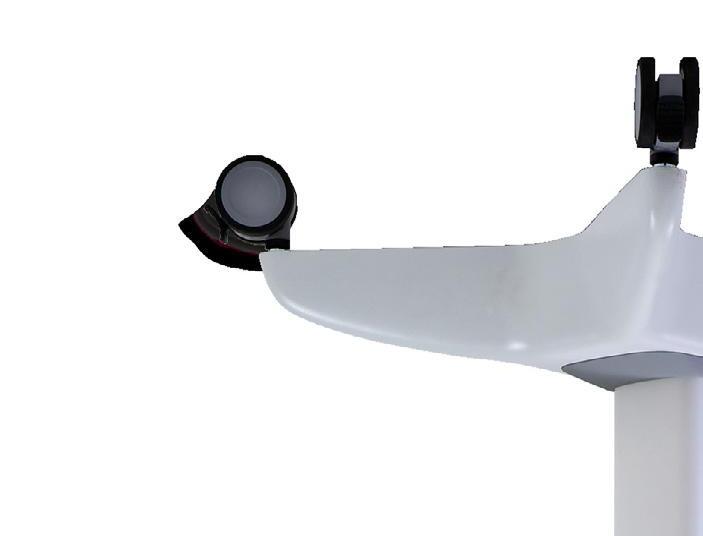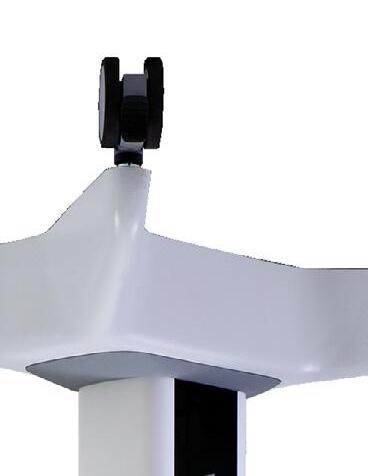







The first and original TGA-approved energy device for the treatment of mild to severe inflammatory acne.



Treat active acne and prevent future acne breakouts in as little as three 30-minute sessions
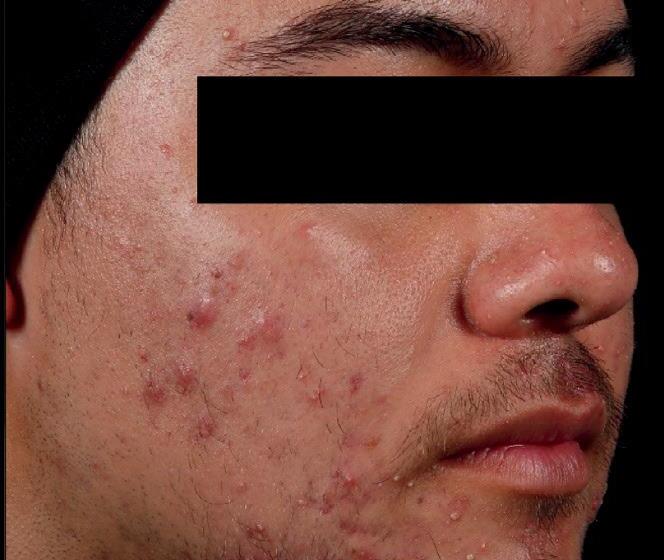
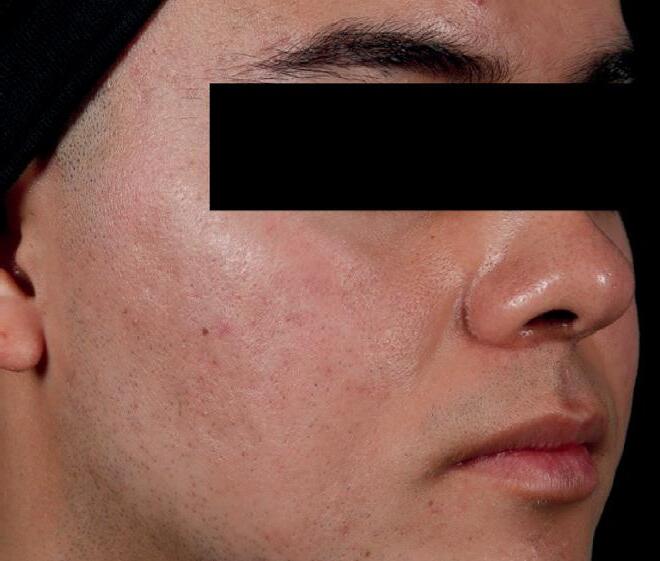
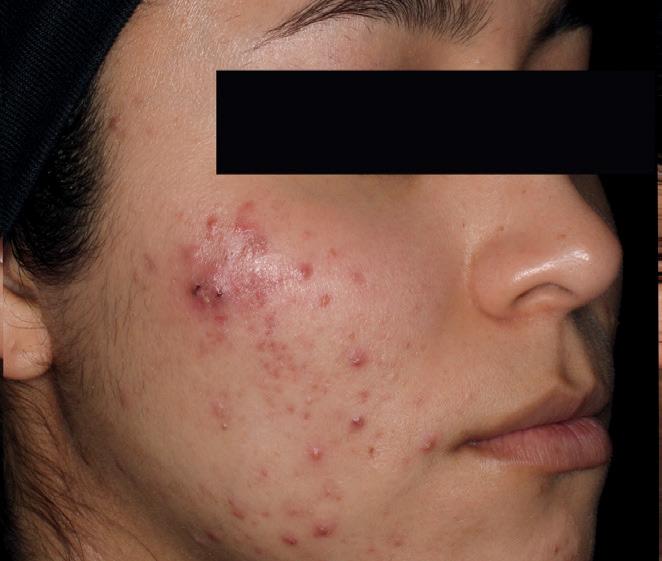
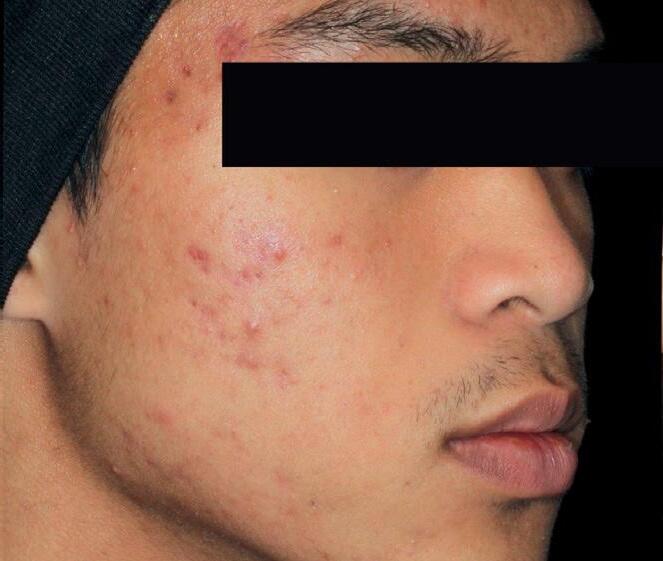
BEFORE AFTER BEFORE AFTER BEFORE AFTER

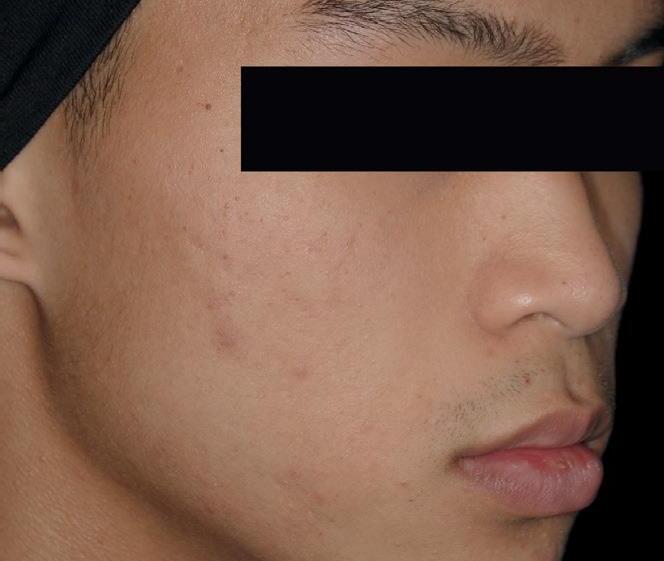

Results may vary.
“After“ photos taken 12 months after final treatment session.

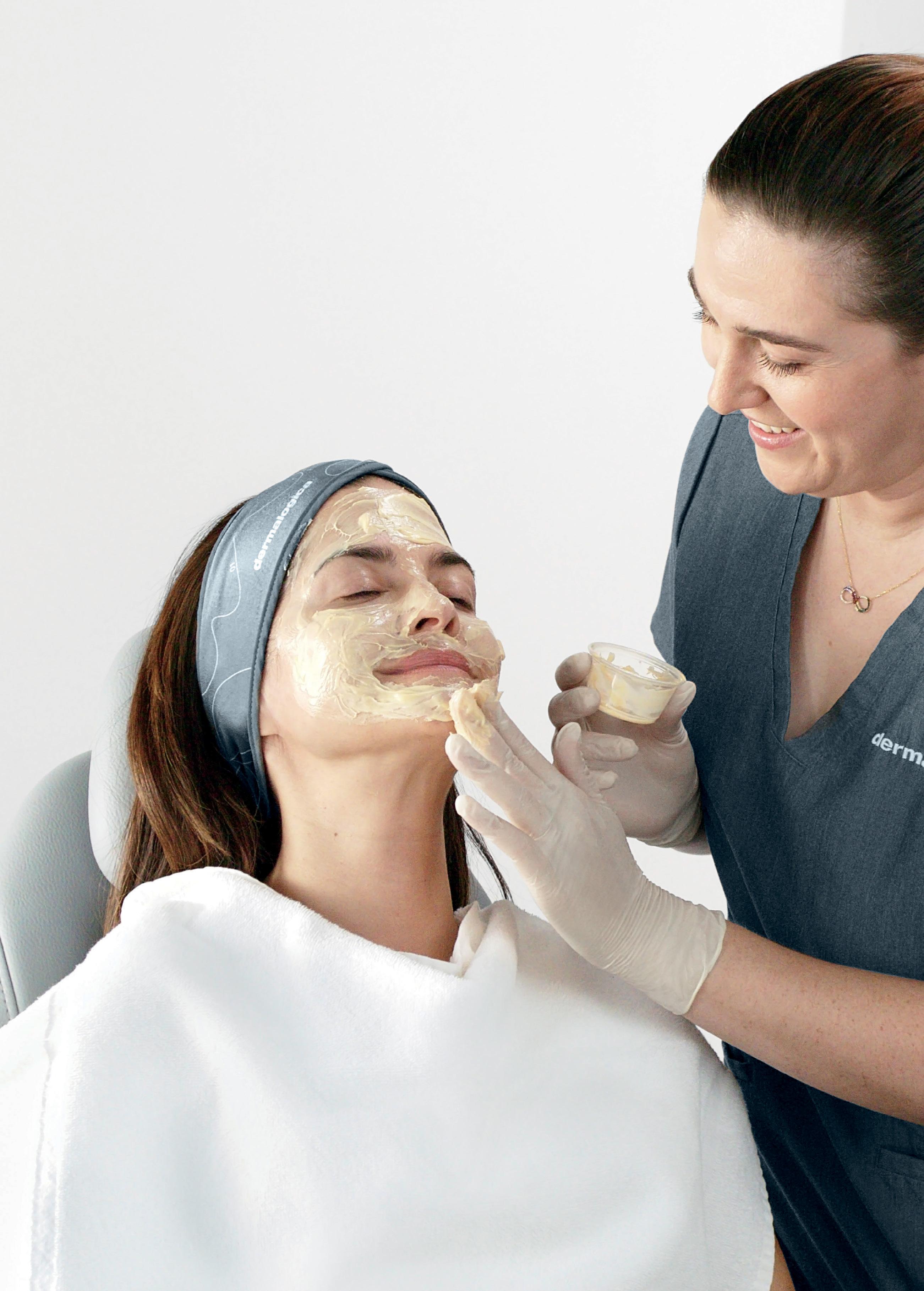
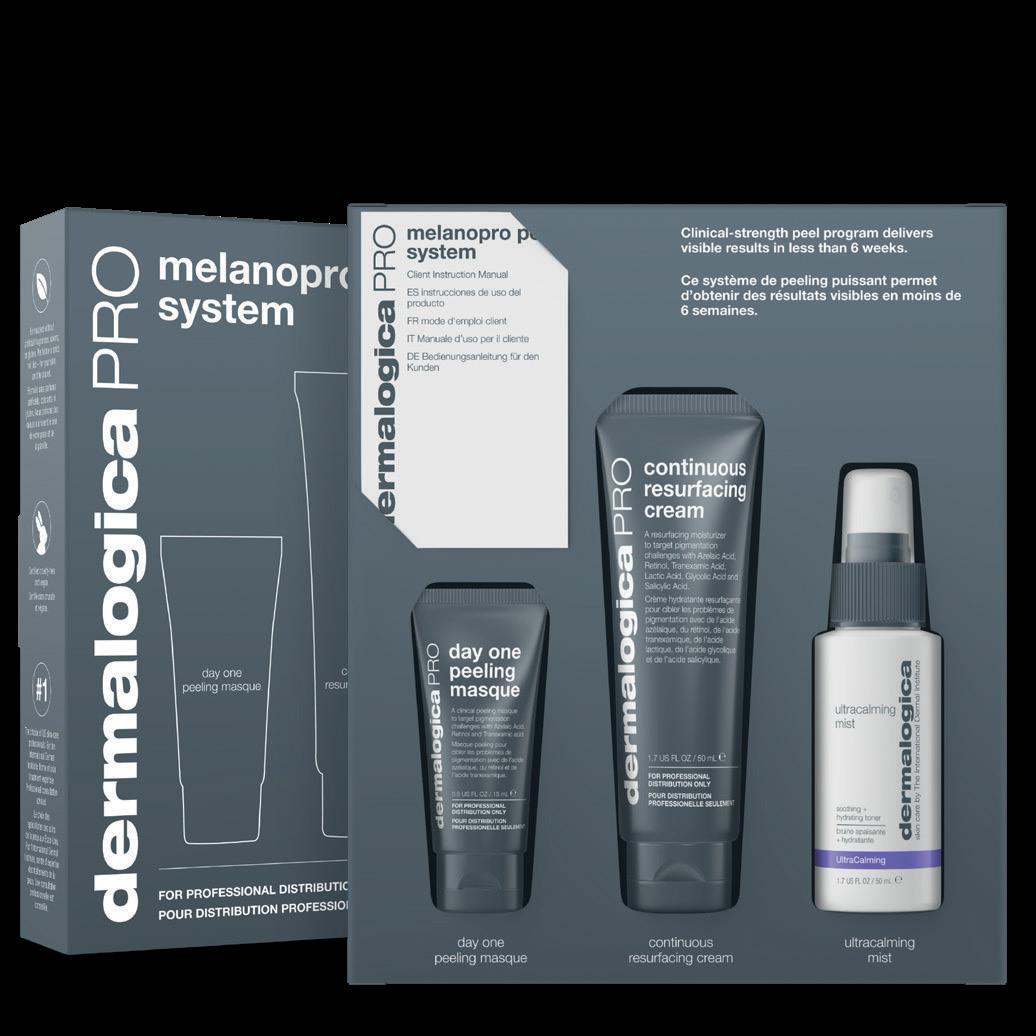

This unique professional peel system reduces all forms of hyperpigmentation in less than 6 weeks and is effective and safe on all skin tones. This transformative 2-phase regimen works to visibly counteract environmental skin damage – fading dark spots, reducing the appearance of hyperpigmentation, and smoothing skin’s texture to reveal fresh, brighter skin.
Phase 1 - in clinic
Intensive Peeling Masque (Day 1)
• Professional application (45min)
• Removed at home (4-7 hours later)
Phase 2 - at home
Resurfacing Moisturizer (4-6 weeks)
• Home applications: 2-3 times daily
• Day 1-6: flaking
• Day 7-15: adjustment
• Day 16-48: results peak

“Melanopro Peel System has been developed and thoroughly tested to provide excellent results on all skin tones. I have witnessed outstanding outcomes on Fitzpatrick types one to three. However, it was particularly exciting to observe the results on Fitzpatrick types four to six, who are more susceptible to post-inflammatory hyperpigmentation and have limited treatment options. Moreover, Melanopro Peel System is a comfortable treatment option with minimal to no downtime, so it does not disrupt the patient’s daily life.”
- Dr. Wong, Double Board Certified Dermatologist, Edmonton, Canada

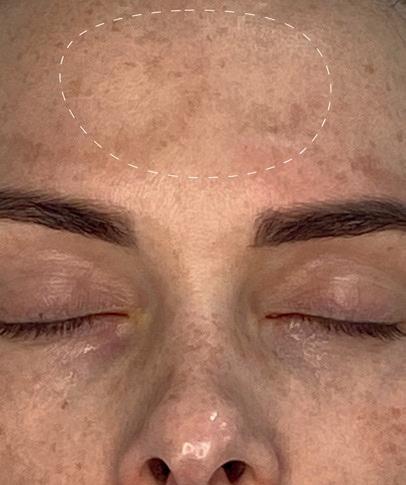
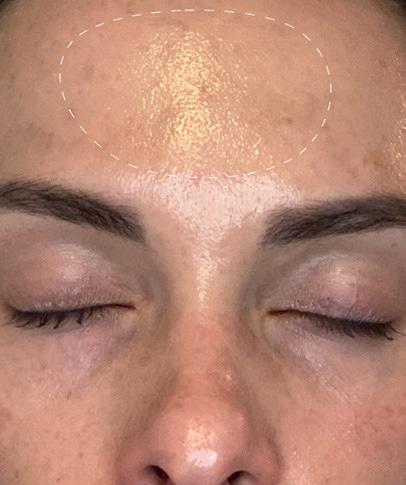
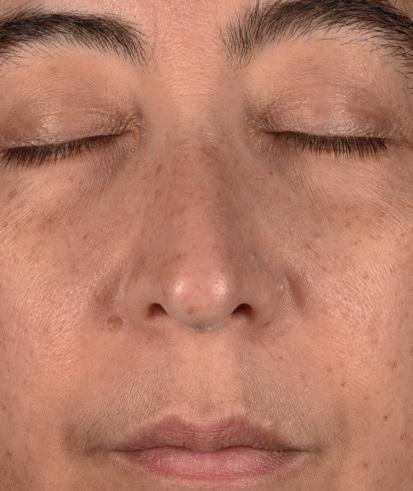
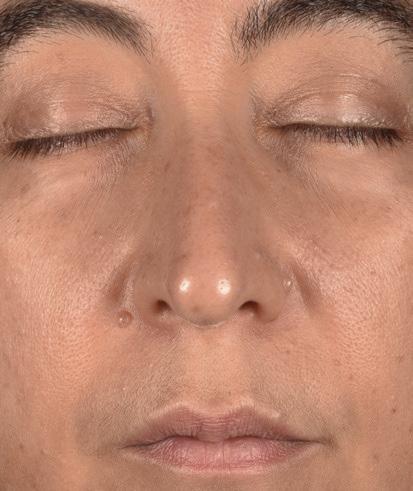
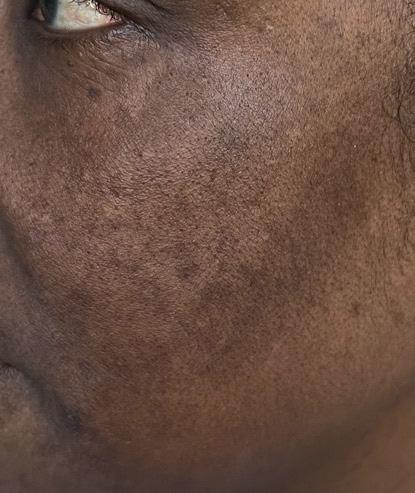
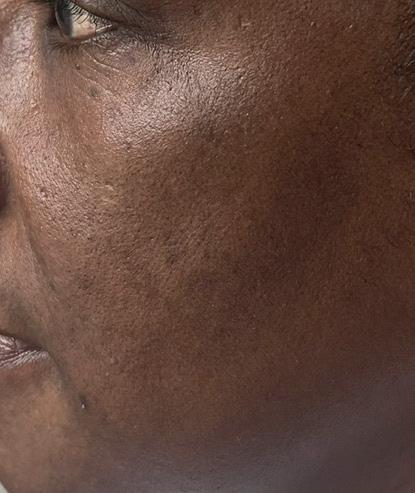
Melanopro Peel System does more than enhance your professional offering on all hyperpigmentation concerns – it is also highly profitable. Contact your local Dermalogica PRO representative or contact us on 1800-659-118 or go to dermalogica.com.au/pro
Skin health for your patients, profitability for your business.
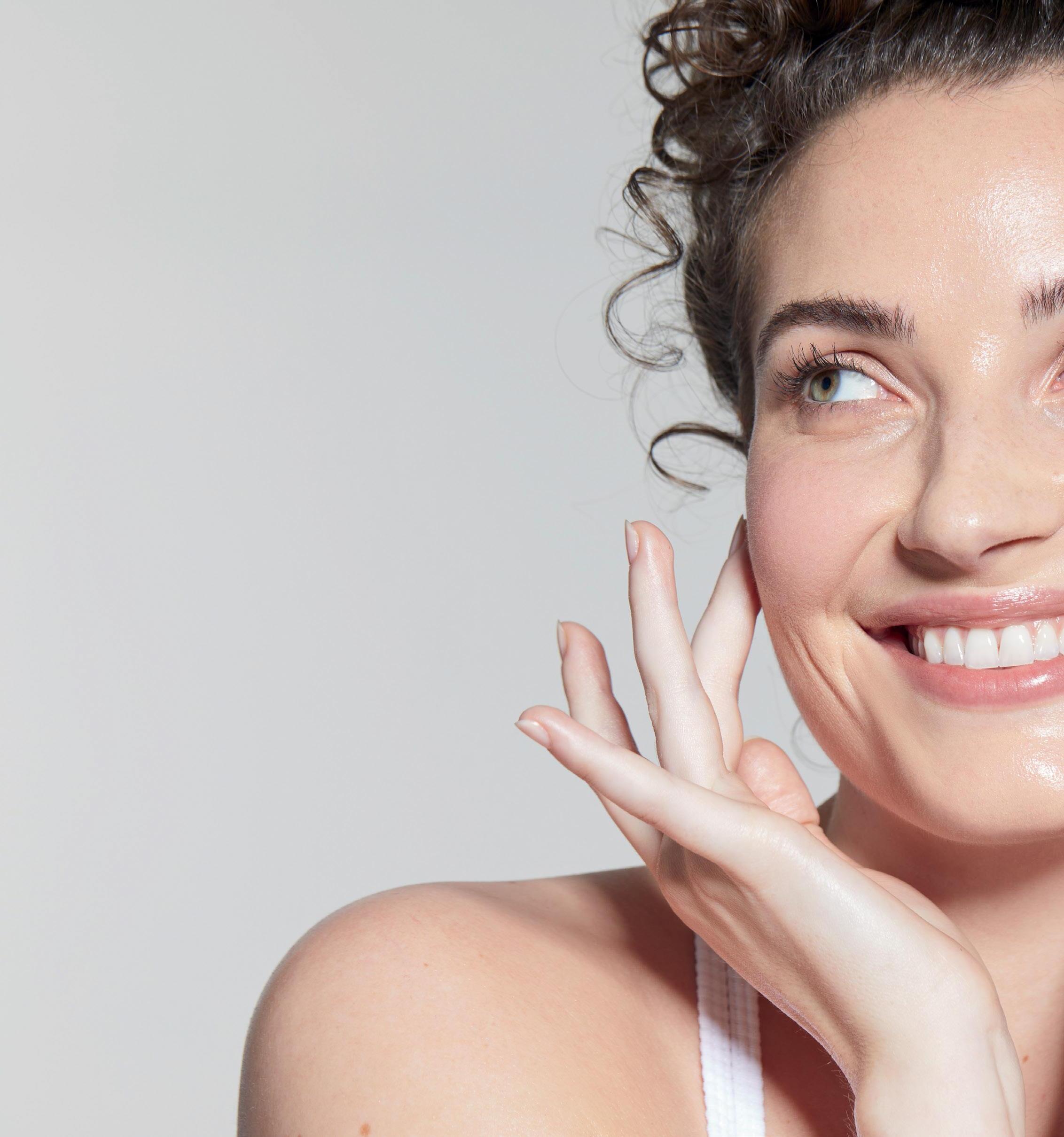
Treatment with Hydrafacial uses patented vortex fusion technology to cleanse, extract and hydrate skin, plus extensive personalisation options through boosters. In partnership with the best brands in aesthetics, Hydrafacial offers a range of booster options to target specific skin concerns and increase upgrade treatment opportunities.
Unparalleled Business Revenue with just a few treatments per day, and now offering patient membership programs for increased loyalty and profitability.

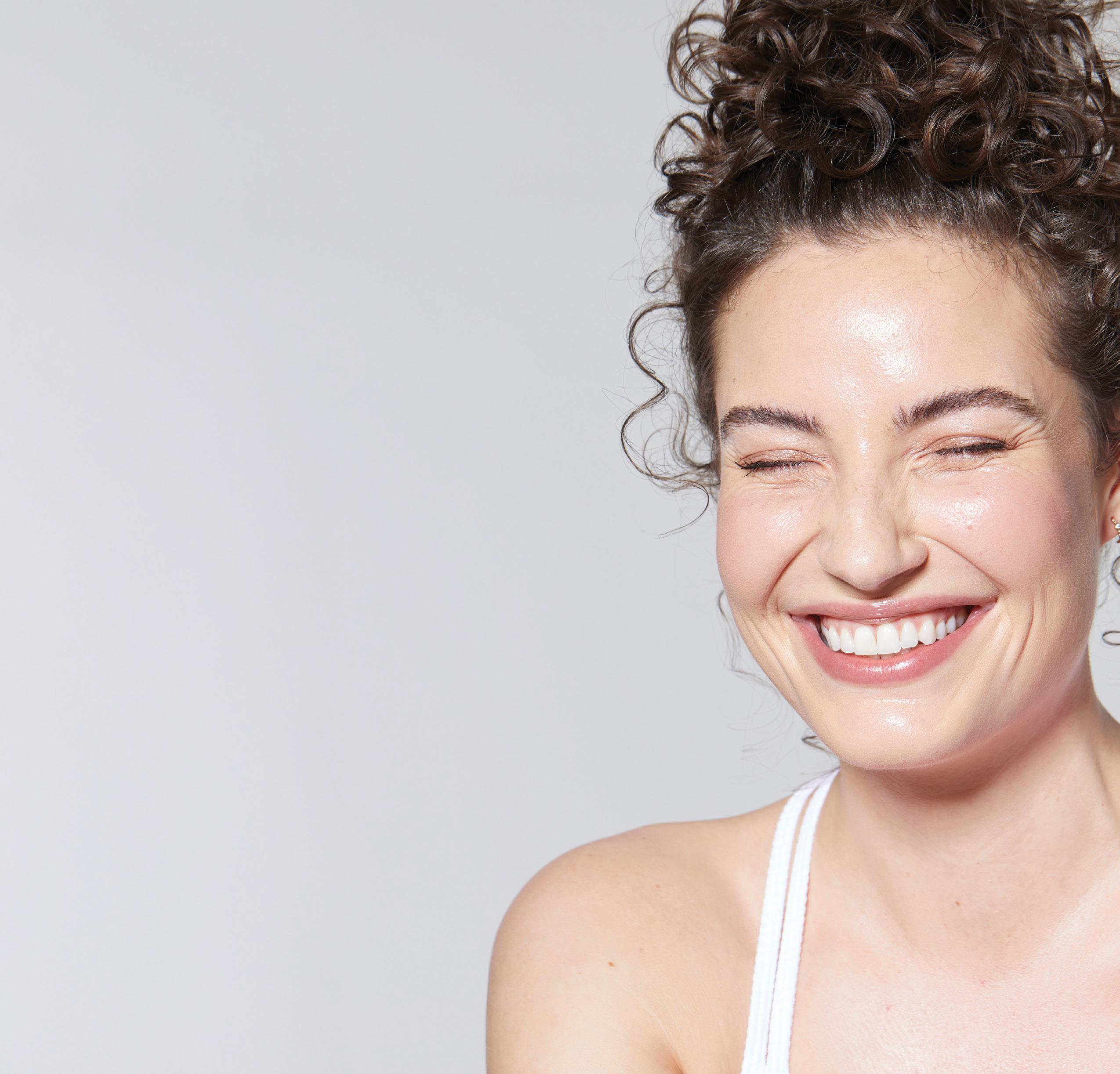
“ “


The Smartest Device in Skin H ealth
Hydrafacial Syndeo is the future of skin health. Its cloud-connected platform makes treatment even more seamless, while delivering glowing results that patients of all skin types will love. Syndeo offers new opportunities and innovative intelligence for every aesthetic business.
Discover thousands of treatment combinations to personalise every Hydrafacial experience.
D ata Co llection
Cloud-Based D ata P la tform
B u s iness I ntelligence
Patented Vortex-Fusion Technology
Cus tom B ackligh t C olours
Automatic S erum S election
100% Touch-Free E xperience
Sea mless G esture C ontrol
Upgrade I n -Treatment P r ompts
12 Treatments in 1 Device
There's never been a better time to elevate your clinic with Hydrafacial.
D Discover the new finance options making ownership easier than ever before

Contact the local team now. https://www.hydrafacial.com.au/professional/ 1300 309 233 (Australia) or 0800 888 135 (NZ) info@hydrafacial.com.au







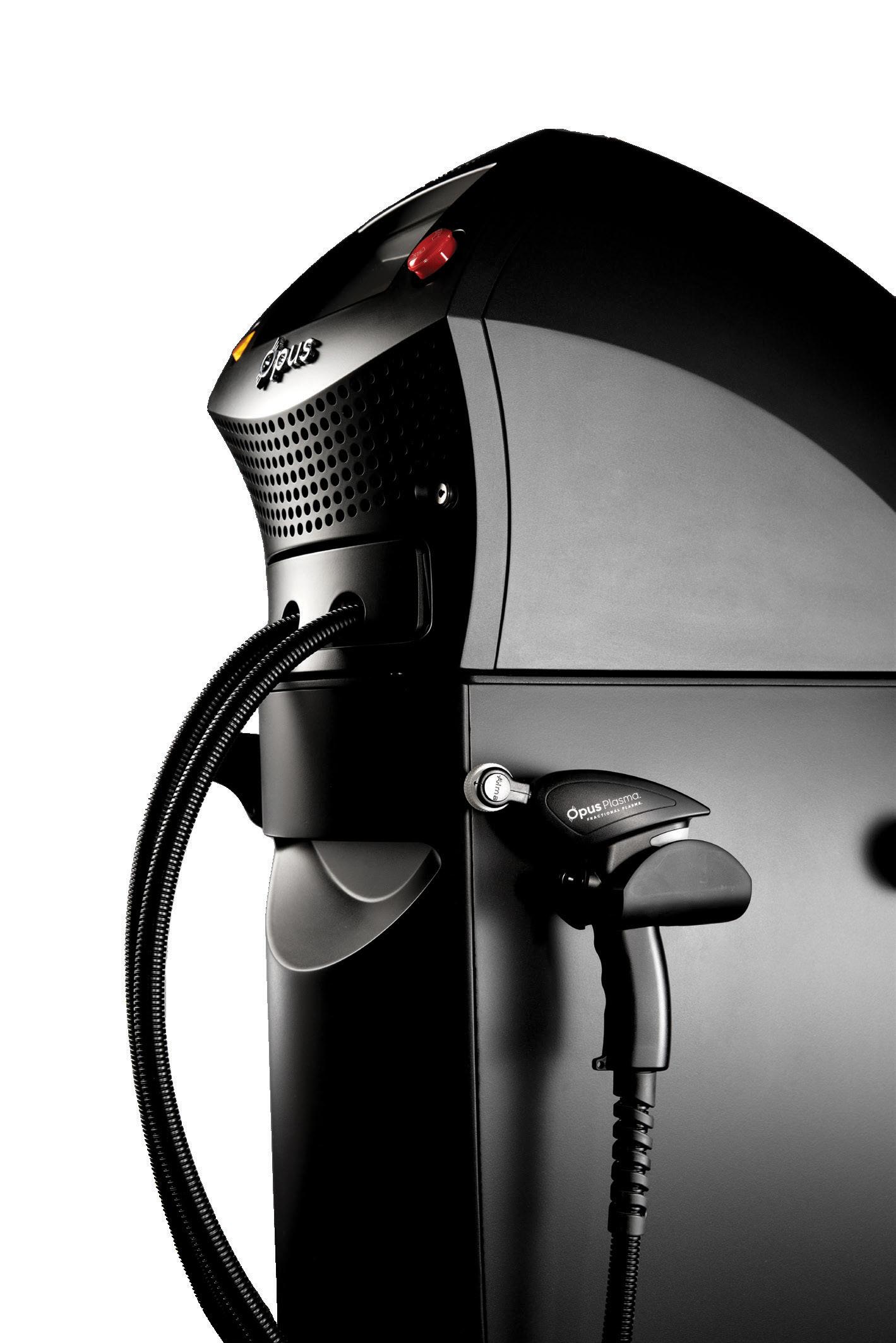
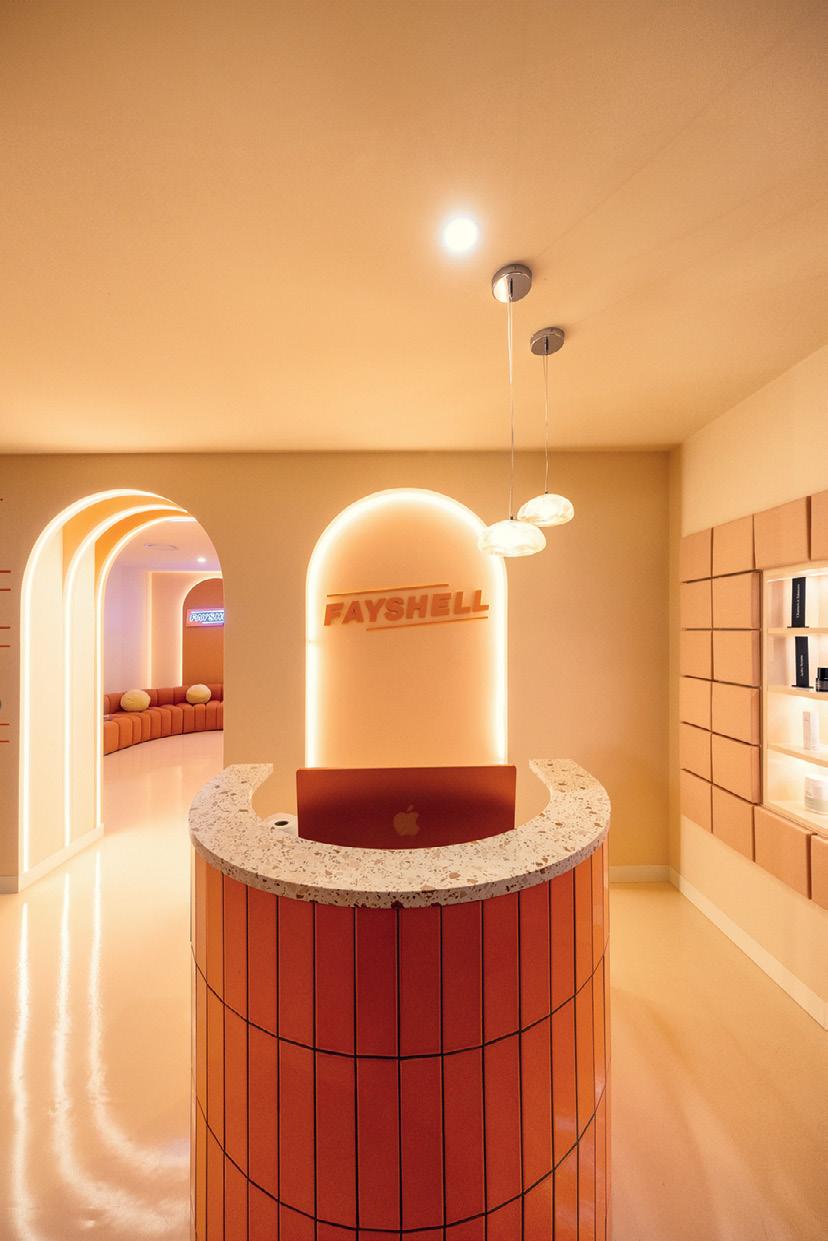
31
COVER STORIES
36 Selling Lies
46 Nurse Jodie on: The Matrix
71 Biohacking Modalities
TRIED+TESTED
14 Nadine and Kym try the latest aesthetic treatments EVENTS
22 Conference Calender
All aesthetic conferences you need to know about this year
24 The Next Generation
Prof Greg Goodman shares a sneak peek of the ASCD Symposium 2024
BUSINESS

26 Out and About Launches and events we attended
30 New Openings
The latest spa and clinic openings to know about
40 A Mindful Expansion
Dr Josh Wall shares his strategy for Contour Clinics AESTHETICS
46 The Power of Protons
Danielle Hughes explains how to determine the true strength of an acid solution
50 Why Your Patients Might Need Dental Work Instead Of Injectables
Dentist Dr Gamer Verdian explains what happens inside the mouth as we age
56 The Biggest 2024 Aesthetics Trends And Why You Should Avoid Them
Dr Giulia D’Anna explains why not every trend should be followed
58 Improved Treatment Results With ALASTIN Skincare
Galderma’s newly launched skincare range explained SPA HOTSPOT
60 Aurora Spa and Bathhouse
On the cover
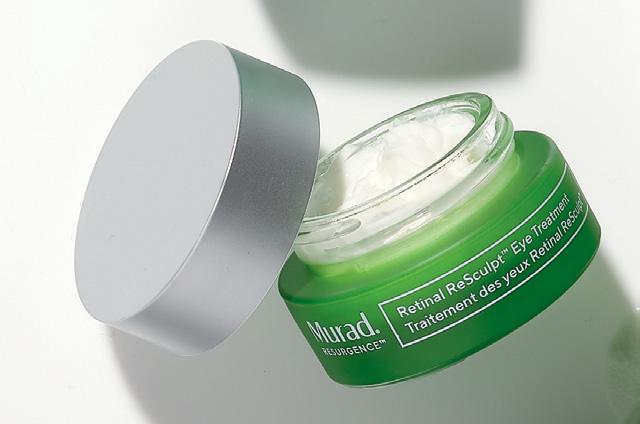
56
62
WELLNESS
64 Treating Trauma
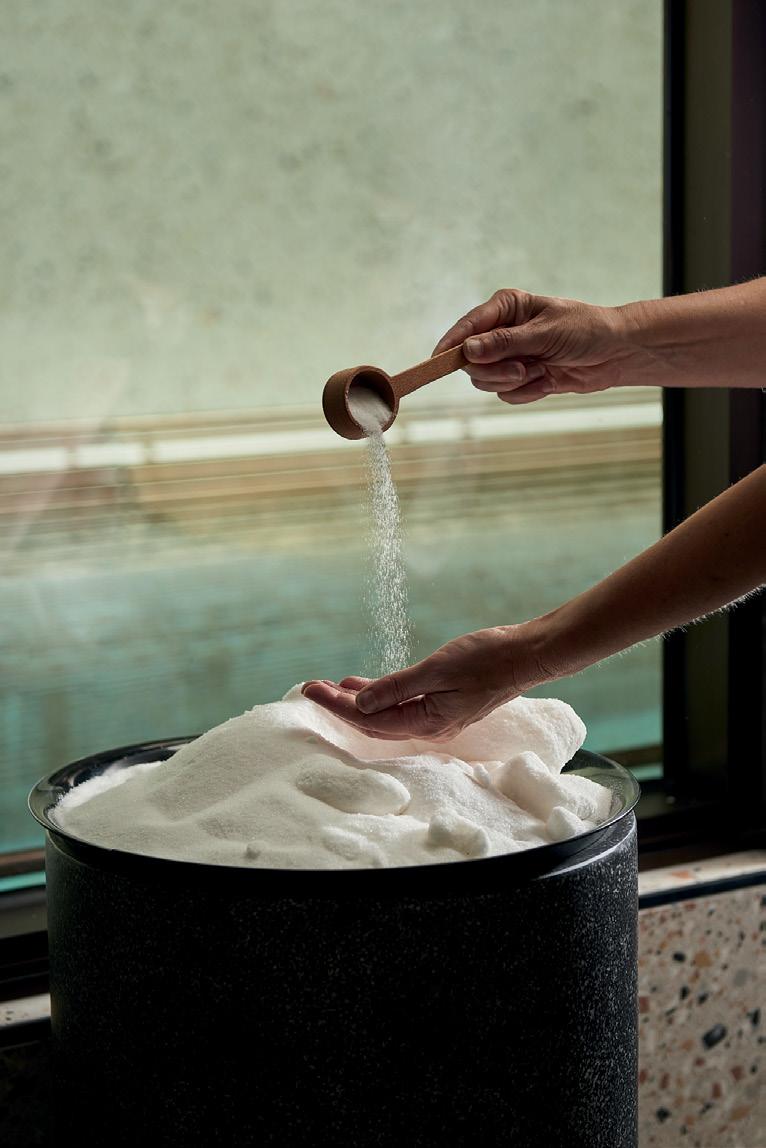
Carrara Treatment Wellness & Spa aims to help people overcome mental health problems and addiction
66 A Path To Holistic Wellness
Exploring Reiki, Energy Healing, and Shamanism with Mariane Ferreira
68 A Bright (And Female) Future For The Wellness Industry
Michelle Reeve shares her learnings from the 2023 Global Wellness Summit TECHNOLOGY
74 World-class Devices, Unrivalled Flexibility
Why own an expensive device when you can rent it?
76 New Device Launches
We take a look at two of the most exciting launches this year
78 A Paragon of Aesthetic Surgery and Patient-Centric Care
Dr Charlotte Ying shares how she successfully uses her suite of Venus devices MEDI
82 (Un)regulated – The Alarming State Of The Aesthetic Industry In The UK
Aesthetic practitioners in the UK are facing regulatory changes this year, but is it enough?
88 The biggest trends in cosmetic injectables for 2024 Dr Rafael Ekmejian shares the innovations that will be big this yea.
92 New Rules For Cosmetic Nurses
What do nurse injectors think of AHPRA’s new proposed guidelines?
Candela’s brand values of Science, Results, and Trust guide its commitment to clinically proven results to strengthen the longstanding partnerships established with physicians, their practices and the patients they treat. Established in 1970, Candela is a leading US-based global medical aesthetic device company with headquarters in Marlborough, Massachusetts. The company’s technologies enable physicians to provide advanced energy-based solutions for a broad range of medical-aesthetic applications including treatment of benign vascular lesions, pigmented lesions, scar revision, facial resurfacing, wrinkle reduction, acne, spider veins, skin elasticity, tattoo removal, hair removal, and RF microneedling to promote collagen production. candelamedical.com

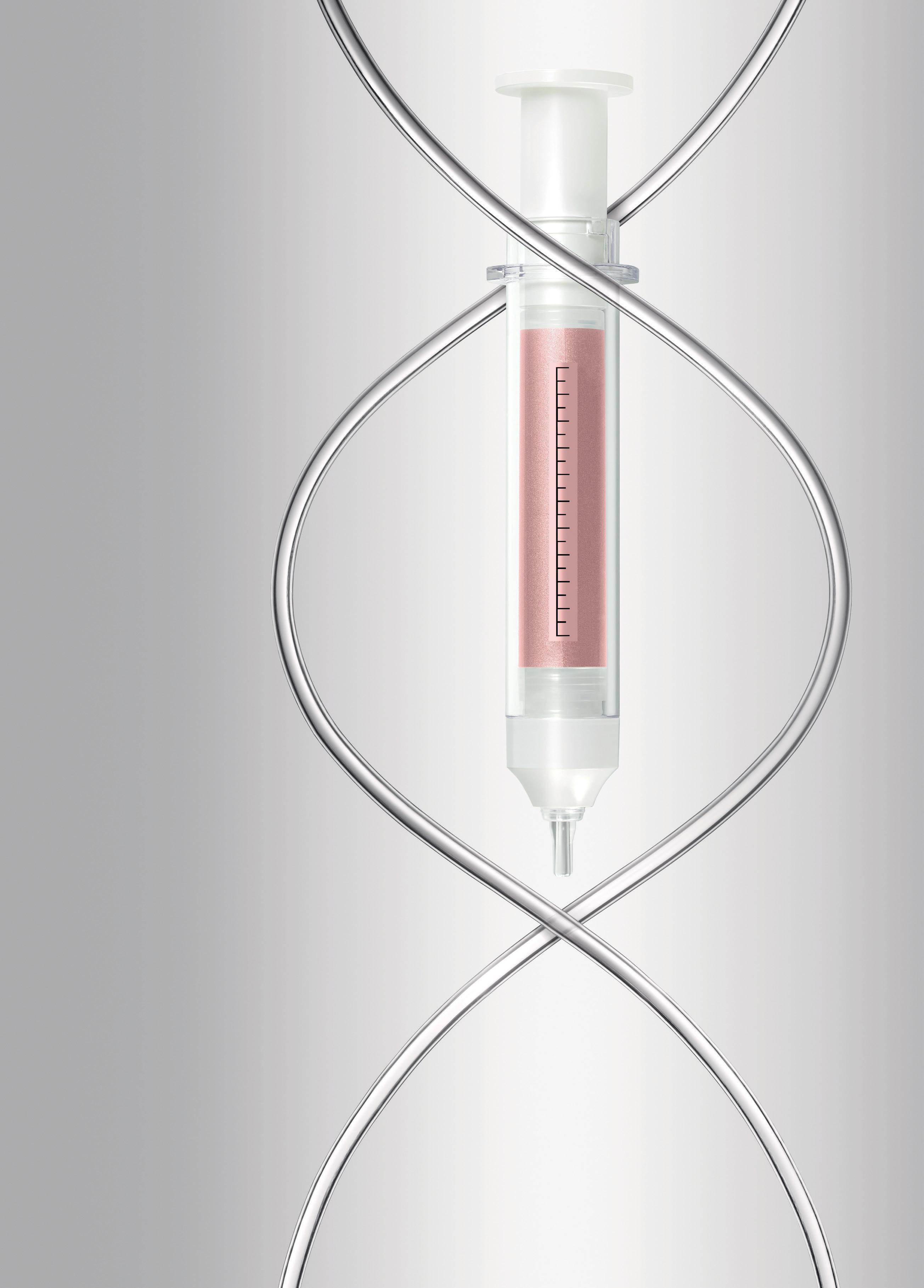
published by
BHA MEDIA Pty Ltd
A division of The Intermedia Group 41 Bridge Rd, Glebe NSW 2037 www.bhamedia.com.au
ph: 02 9660 2113 fax: 02 9660 4419 executive chairman Simon Grover
managing editor
Nadine Dilong ndilong@intermedia.com.au
advertising enquiries
Kym Cowper
ph: +61 2 9660 2113 mob: 0410 570 467 kcowper@intermedia.com.au
graphic designer
Leanne Hogbin
subscription enquiries
subscriptions@intermedia.com.au
To subscribe by credit card call 1800 651 422 or visit www.intermedia.com.au
To subscribe by cheque or money order, make cheque/money order payable to: The Intermedia Group Pty Ltd. P.O. Box 55, Glebe, NSW Australia 2037
AUSTRALIA
1 yr (4 issues) $AUD 79.00 inc GST
2yrs (8 issues) $AUD 126.40 inc GST – SAVE 20%
3yrs (12 issues) $AUD 165.90 inc GST – SAVE 30%
NEW ZEALAND
1 yr (4 issues) $AUD 100.00
ASIA/PACIFIC
1 yr (4 issues) $AUD 110.00
REST OF WORLD
1 yr (4 issues) $AUD 127.00
Payable in Australian dollars includes air postage
Disclaimer: This publication is published by BHA
Pty Ltd (the “Publisher”). Materials in this publication have been created by a variety of different entities and, to the extent permitted by law, the Publisher accepts no liability for materials created by others. All materials should be considered protected by Australian and international intellectual property laws. Unless you are authorised by law or the copyright owner to do so, you may not copy any of the materials. The mention of a product or service, person or company in this publication does not indicate the Publisher’s endorsement. The views expressed in this publication do not necessarily represent the opinion of the Publisher, its agents, company officers or employees. Any use of the information contained in this publication is at the sole risk of the person using that information. The user should make independent enquiries as to the accuracy of the information before relying on that information.All express or implied terms, conditions, warranties, statements, assurances and representations in relation to the Publisher, its publications and its services are expressly excluded save for those conditions and warranties which must be implied under the laws of any State of Australia or the provisions of Division 2 of Part V of the Trade Practices Act 1974 and any statutory modification or re-enactment thereof. To the extent permitted by law, the Publisher will not be liable for any damages including special, exemplary, punitive or consequential damages (including but not limited to economic loss or loss of profit or revenue or loss of opportunity) or indirect loss or damage of any kind arising in contract, tort or otherwise, even if advised of the possibility of such loss of profits or damages. While we use our best endeavours to ensure accuracy of the materials we create, to the extent permitted by law, the Publisher excludes all liability for loss resulting from any inaccuracies or false or misleading statements that may appear in this publication. Copyright © 2024 BHA Media Pty Ltd.
Environmental Statement: The Intermedia Group takes its Corporate and Social Responsibilities seriously and is committed to reducing its impact on the environment. We continuously strive to improve our environmental performance and to initiate additional CSR based projects and activities. As part of our company policy we ensure that the products and services used in the manufacture of this magazine are sourced from environmentally responsible suppliers. This magazine has been printed on paper produced from sustainably sourced wood and pulp fibre and is accredited under PEFC chain of custody. PEFC certified wood and paper products come from environmentally appropriate, socially beneficial and economically viable management of forests. The wrapping used in the delivery process of this magazine is 100% recyclable.
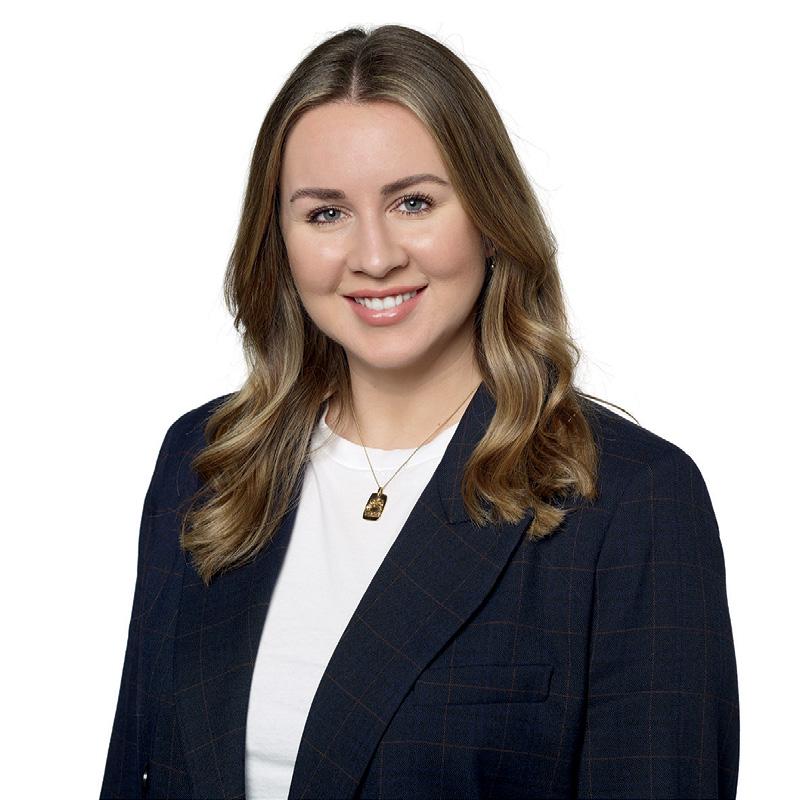
Welcome to our first issue of 2024. It has been an eventful start to the year if you’re a cosmetic injector, with newly proposed AHPRA guidelines and TGA rules changing the way you can market yourself and communicate with your (potential) clients. We dissect the changes and talk to industry to hear their concerns on page 92. It’s safe to say we’re going through a pivotal time in aesthetics, not just in Australia, but in other countries as well. On page 82, we talk to esteemed practitioners from the UK, to see what effect the country’s more relaxed laws have on the industry and patient safety.
Another big topic of the past few months has been fraudulent activity in the skincare and aesthetics space. Whether it’s brands lying about their ingredients, or copycats pretending to be the same as the original, consumers and practitioners are being misled, ultimately compromising your patients’ health and endangering your businesses. On page 36, we talk to brands about the consequences of fraud, and what they are doing to protect themselves and their clients.
In more positive news, we’re excited for the incredible amount of innovation that will shape 2024. From new devices (p 76) to an impressive range of biohacking modalities that can literally help your patients live a longer, healthier life (p 71), our industry is evolving quickly, and so will the treatments you will be able to offer. Consumer expectations are increasing, as well as their
thirst for knowledge and understanding of what is possible, so it’s important you stay educated on the latest science and developments.
A great way to level up your knowledge is attending some of the many conferences on offer this year, starting with ABIC’s Elevate Conference on February 19. On page 22, we have put together a conference calendar so you can start planning your year, both for yourself and for your team. Remember, as an aesthetic or wellness practitioner, you never stop learning, and we love to be a part of your educational journey.
Happy reading,
Nadine Dilong Managing Editor NDILONG@INTERMEDIA.COM.AU
dermaviduals.com.au/partner-with-us
The latest and greatest in the aesthetics industry, tested by the SPA+CLINIC team.
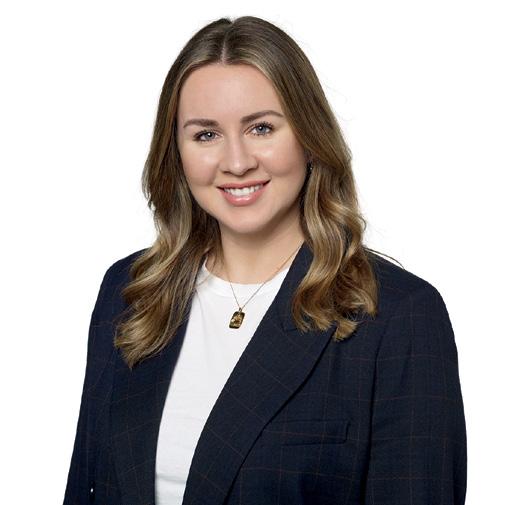
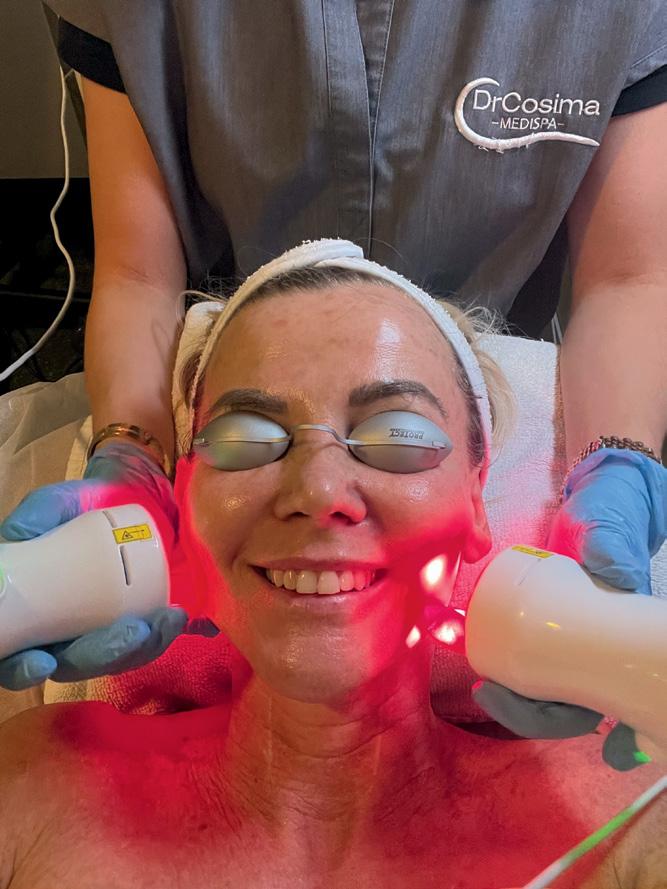

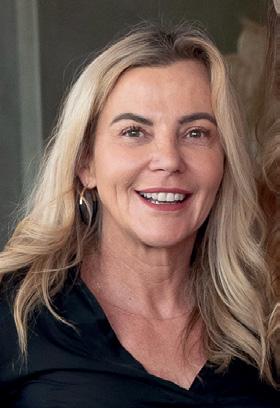
Nadine Dilong, Managing Editor tried: MesoInfus™ Needling
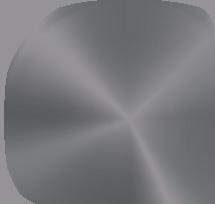




Dynamic muscle stimulation has been one of the most exciting developments of the past year, and triLift by Lumenis has come up with a device that incorporates this technology to activate your facial muscles, strengthen and smooth your skin, and boost natural volume and Hyaluronic acid production, so of course I was keen to try it! I had the treatment at Skin by Sarah Hudson, who has been using the device on her patients for several months and has had incredible feedback, achieving visibly rejuvenated and lifted results. After a thorough skin analysis, we start with the muscle stimulation part of the treatment, dividing the face into a few different zones. I can definitely feel the current and twitching that is happening on my face, but it is not painful. The great thing about triLift is that it uses RF at the same time, which feels warm on the skin, and stimulates the collagen and elastin production. After the muscle workout, Sarah uses the RF microneedling applicator to further improve the quality of my skin. It feels a bit spicy as the needles go in, but just like the muscle stimulation, it is absolutely bearable. After about 30 minutes, we are done, my skin is red, and I go home with some Skin by Sarah Hudson aftercare products, which help calm my skin down immediately. About a week later, my skin is looking refined, and I feel a slight lift around my eyebrows, but of course, having more than one treatment is recommended for best results. Lumenis.com.au
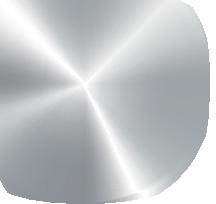


Kym Cowper, Partnerships Manager tried: The Hour of Power
Unlock Radiant Skin with the Hour of Power: Dr Cosima’s gorgeous Edgecliff practice and Beauty Technology offer a unique in-clinic treatment, known by her clients as the Hour of Power, so of course we had to find out more about it. With a mix of three different modalities, Dr Cosima explains the treatment delivers a no-downtime option to give clients their best skin ever. The treatment features Aerolase, Byonik, and Aqua Glow, a dynamic trio delivering both a relaxing and transformative experience, addressing various skin concerns and leaving me with a rejuvenated, radiant complexion and softened fine lines. First, my skin is cleansed and gently exfoliated through a hydradermabrasion treatment (Aqua Glow), then Aerolase, a non-invasive laser system that targets a range of skin imperfections, including pigmentation irregularities, fine lines, and acne is performed. Dr Cosima adjusts my settings accordingly during the course of my three sessions performed over three months. Last but certainly not least, the Hour of Power incorporates Byonik Laser, an advanced system that combines radiofrequency and microcurrent technologies. This synergy stimulates collagen production, tightens sagging skin, and improves overall skin elasticity. Triggered by your heartbeat, this laser operates like no other on the market and is completely individualised to each person on each treatment. What a unique treatment, leaving me with rejuvenated and glowing skin. beautytechnology.com.au
Late last year, I was invited to give my skin a pre-christmas boost with a mesoneedling treatment at Australian Skin Clinics. ASC uses AestheticsRx products, including specifically formulated needling solutions depending on the patient’s skin concern. In the fortnight before the treatment, I prepped my skin with AestheticRx’ Ultimate Serum, which includes a tyrosinase inhibiting action, which is important to use prior to dermal therapies to prevent any risks of post inflammatory hyperpigmentation occurring. After a thorough skin analysis, we decide to use the brand’s Repair serum to use with my needling in order to reduce redness and inflammation. It includes Hyaluronic Acid, Vitamins B & C, and Zinc. The MesoInfus™ Serum is applied to the treatment area in small sections providing the required slip for the microneedling device to glide over the skin. It’s not painful at all, except for right under the nose, which is always a sensitive area for me, and after about ten minutes, the treatment is done, I am red as a tomato, and leave the clinic with SPF on, of course. Thankfully the redness subsides within a few hours, and I don’t even experience much flaking in the coming days. I would describe MesoInfus™ as a quick pick-me-up treatment, and of course, as with most treatments, best results are seen after several treatments. aestheticsrx.com.au

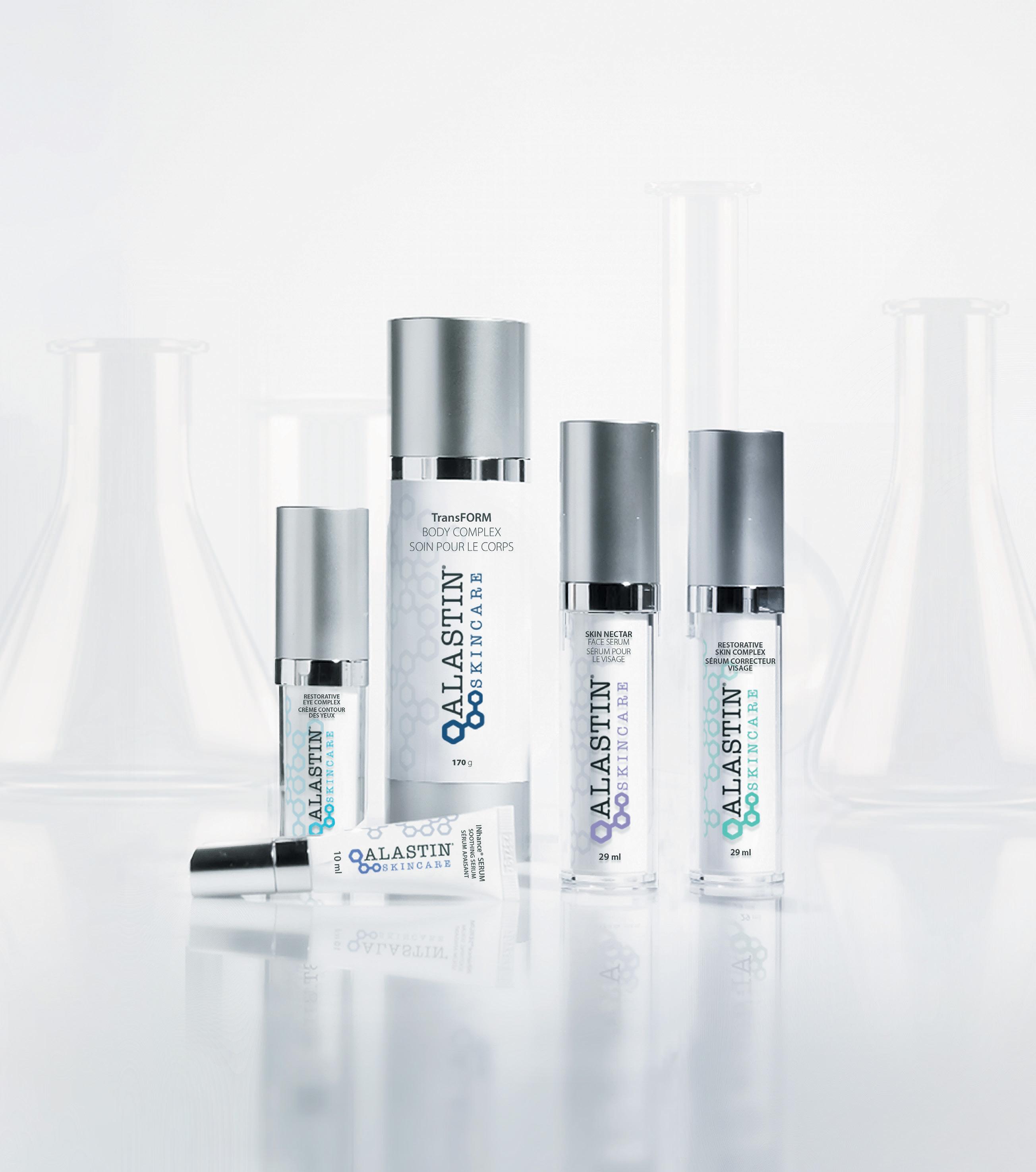

Custom designed and fabricated, upholstered by Jade Upholstery jadeupholstery.com.au
Bocci 73s bocci.com

Custom designed and fabricated, micro-cement with integrated charging, by Studio Idéék

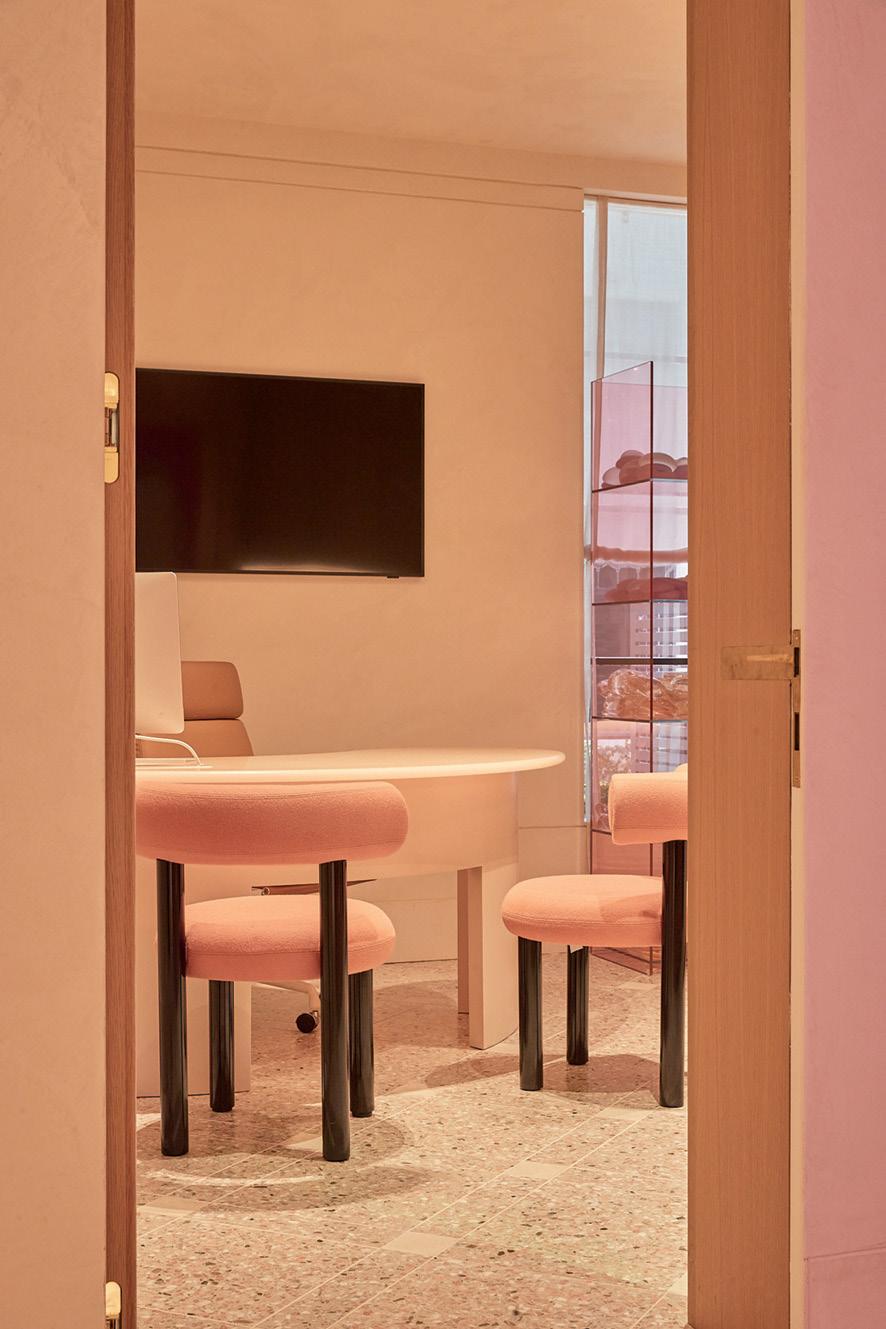


Name: ONE COSMETIC
Owner: DR LOUIS WESSELS & MRS NATHALIE WESSELS
Location: DOUBLE BAY, SYDNEY
Size: 170m 2 internal
Treatment Rooms: 4
Staff: 12
Interior Inspiration: SOPHISTICATED, WELCOMING & LUXURIOUS

ast year, Plastic Surgeon Dr Louis Wessels and his wife Nathalie Wessels decided to give their clinic in Double Bay a ‘facelift’. Offering both surgical and non-surgical treatments, the duo aim to provide a one-stop shop for their patients, focusing on a multidisciplinary team and the latest technology. “What truly distinguishes us, is our commitment to the continuum of care. Rejecting a one-and-done mentality, we strive to cultivate long-term partnerships with our patients,” says Nathalie Wessels. “The emphasis on continuity is evident in our efforts to minimise the visibility of post surgery scars through non-surgical interventions conducted in our practice. Recognising breast implants as medical devices, we believe there is a responsibility of ongoing patient monitoring. This commitment materialises in our dedicated breast implant check clinic, ensuring the ongoing safety of our patients beyond the immediate post-surgery phase.”
Nathalie was heavily involved in the renovation process, working closely with Peter Kambos from Alliance Project services and Anna Trefely from interior design firm Esoteriko. “The close partnership with the interior design team was instrumental in crafting a new visual identity for One Cosmetic that respected the existing building and harmonised with the location,” says Nathalie. “Witnessing the transformation from conceptualisation to reality added a layer of satisfaction to the overall experience, highlighting the significance of creative collaboration in bringing the vision to life.”
When asked about her favourite room at One Cosmetic, Nathalie
finds it hard to choose but is especially fond of one of the treatment rooms. “I just love every aspect of One Cosmetic from the archway hall, to the lite up Pink ‘Ultrafragola’ mirror designed by Ettore Sottsass for Polyronova, Italy. But Treatment Room 1, or otherwise known as Nurse Chelsea’s, stands out as a favourite with its strategic location. The large window offering views of the front garden and Transvaal Ave creates a serene ambiance, enhancing the overall treatment experience at One Cosmetic. The combination of natural light and scenic views adds a touch of tranquility, making it an inviting escape for clients seeking a rejuvenating atmosphere during their treatments.”
Indeed, atmosphere and making patients feel at ease is an important aspect for the interior choices of One Cosmetic. “Anna and I focused around the idea of creating a clean, well-designed clinic fostering a sense of professionalism and care,” Nathalie explains, “Not only did we want the look of One Cosmetic to set the tone of what we provide; cutting-edge technology, but also create a welcoming sophisticated environment. Ultimately, investing in the look of One Cosmetic is an investment in our reputation, patient relationships, and overall success in the competitive healthcare landscape.”
Nathalie stresses the importance of having a good relationship with your builder and interior design team when going through a build, as well as some more practical focuses, such as enough storage room, durable materials, and sustainable electricity sources if possible. “Building a successful clinic requires a balance of professionalism, customer satisfaction, and strategic business decisions,” Nathalie concludes.

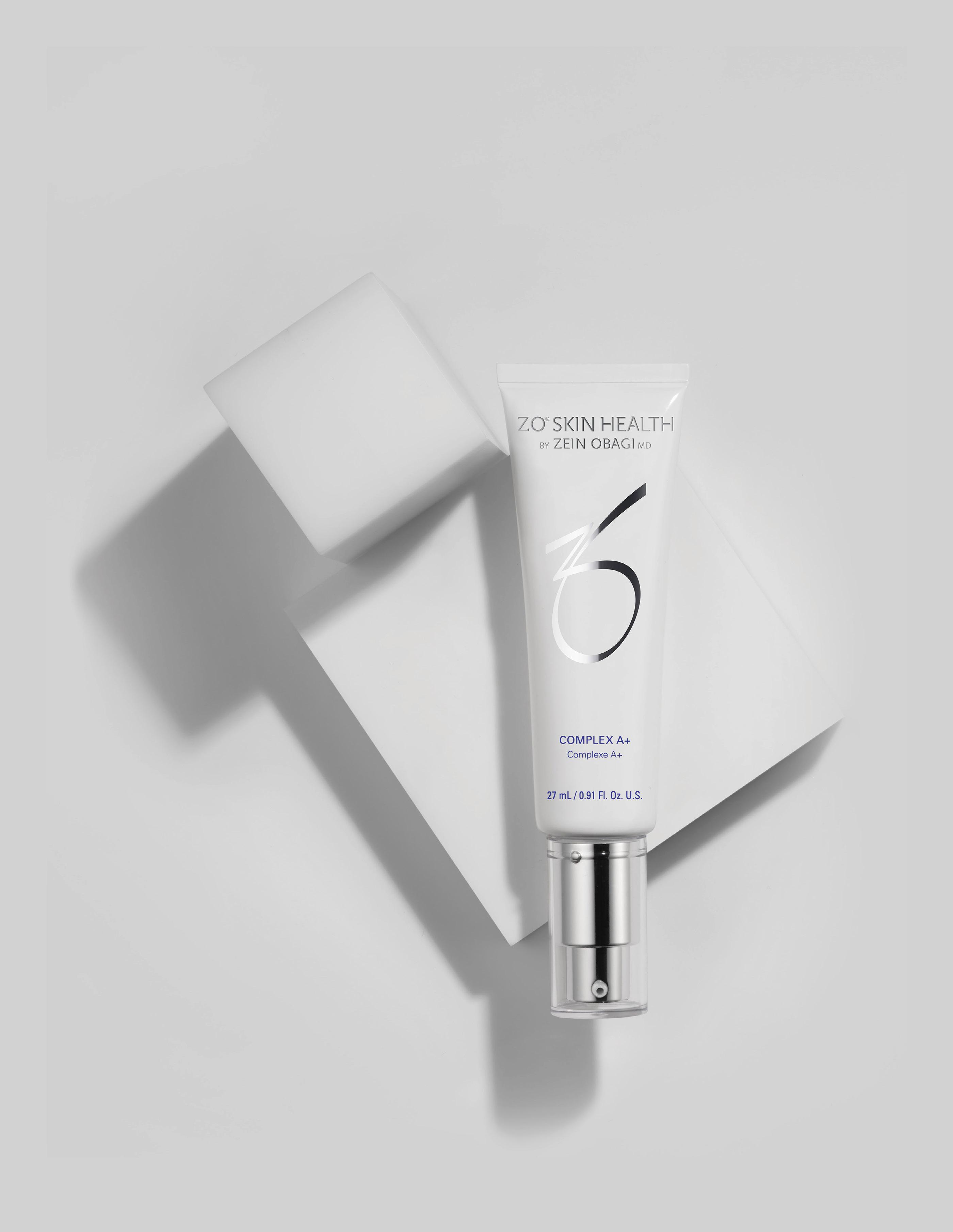
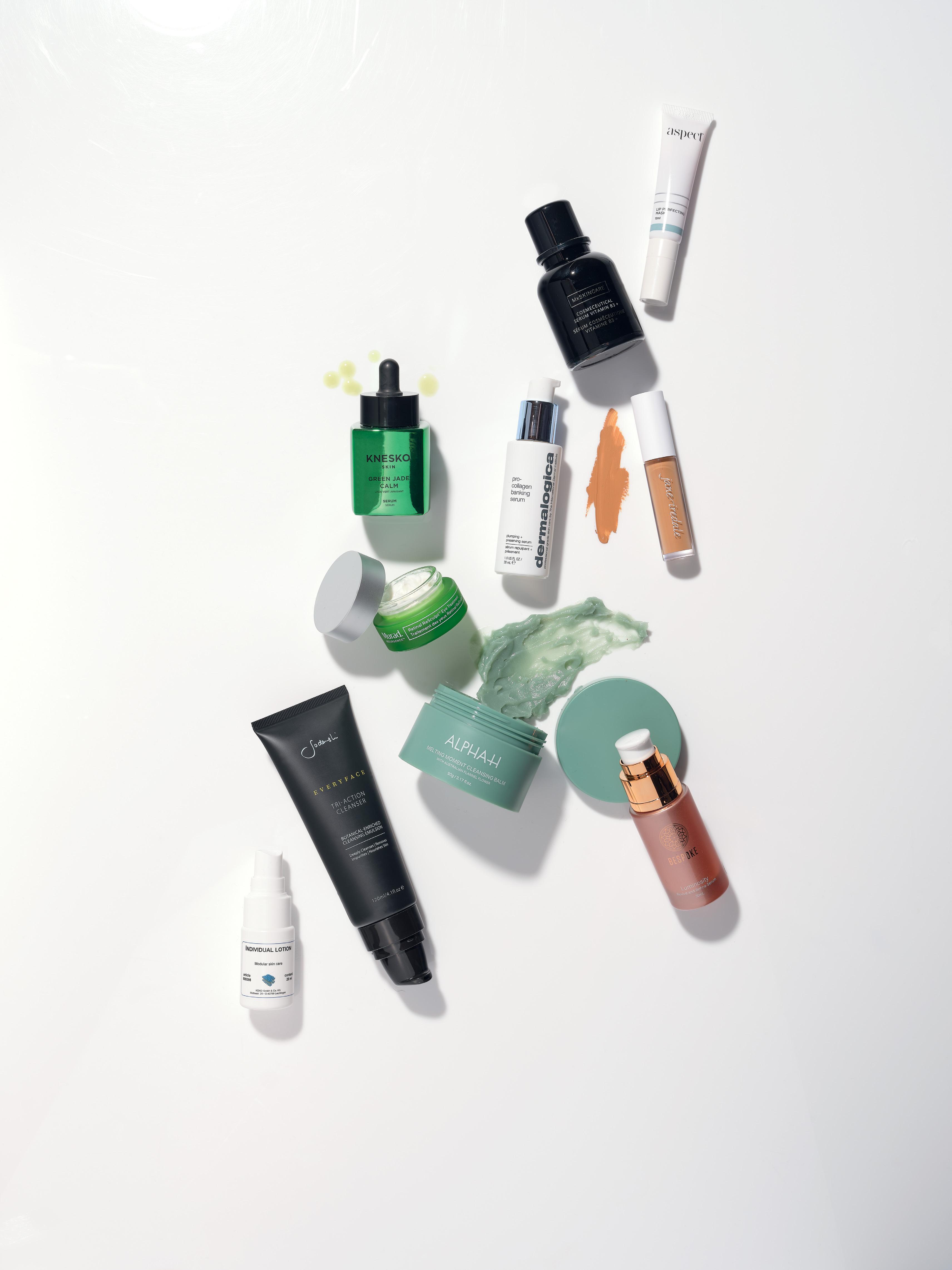
Brand new skincare product launches to kick off 2024.

Omorfi Revitalising Overnight Mask, RRP $79.00 omorfi.com.au
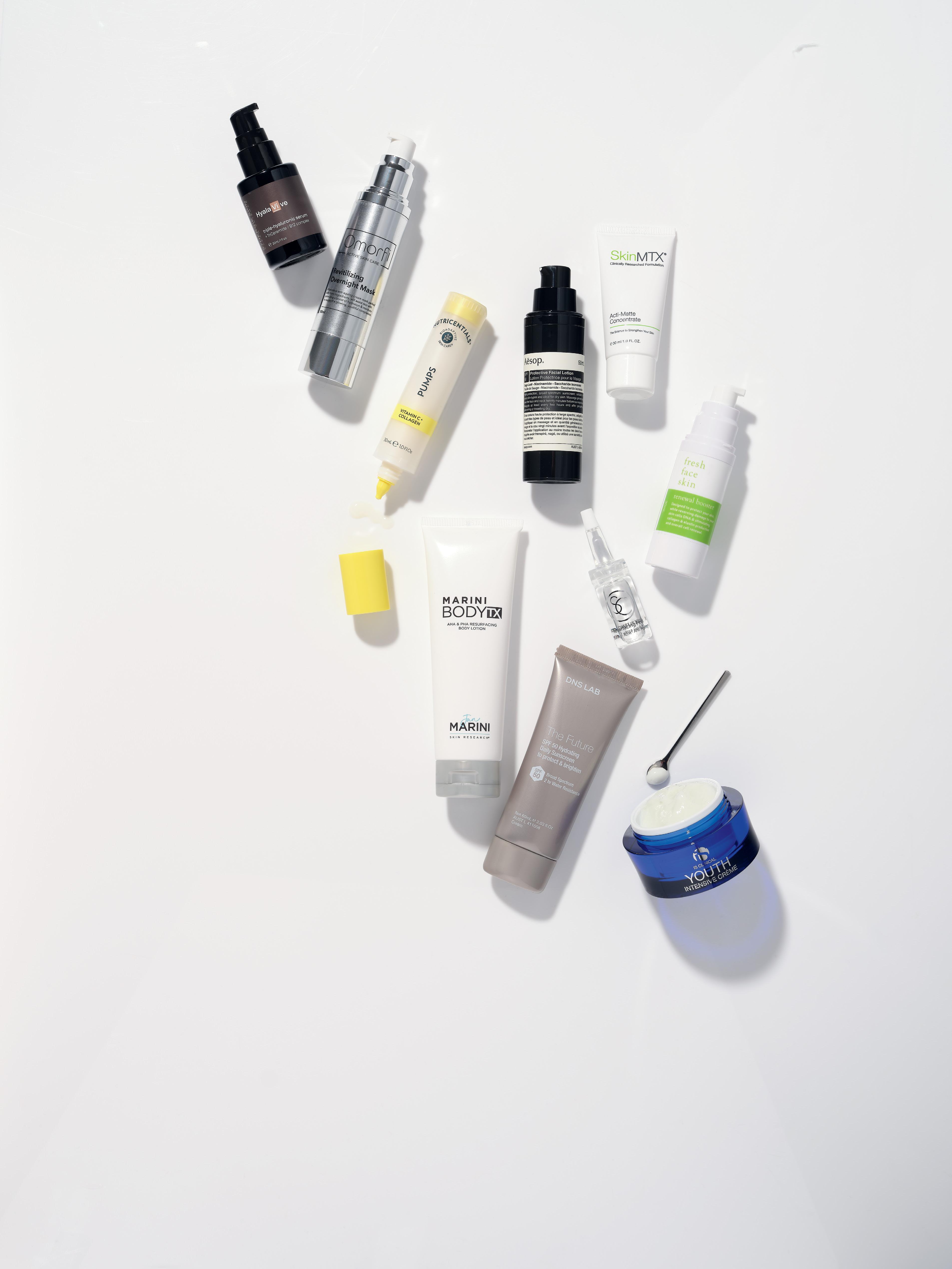
SkinMTX Acti-Matte Concentrate, RRP $79.00 skinmtx.com.au
Fresh Face Skin Renewal Booster, RRP $54.95 freshfaceskin.com.au
SC Organics SC Resurfacing Peel, RRP $86.00 scorganics.com.au
iSClinical
Youth Intensive Creme, $376.00 isclinical.com.au
When: February 19, 2024
Where: Doltone House, Sydney
After the great success of the inaugural ABIC education conference in 2023, ABIC is thrilled to offer an even more engaging and immersive educational experience in 2024. Join us at the ELEVATE 24 Education Conference, on Monday, February 19th, 2024 at Doltone House, Sydney. The conference will be held at the award-winning venue on Darling Island, Pyrmont Sydney, featuring a networking promenade with stunning views of Barangaroo and Sydney Harbour. This one-day event is the perfect way to wrap up your summer and connect with industry. theabic.org.au

When: March 1 – March 3, 2024
Where: Crown Conference Centre, Melbourne
The Australasian Society of Cosmetic Dermatologists (ASCD) are delighted to invite you to the ASCD Symposium taking place 1-3 March 2024 at the Crown Conference Centre. On 29 February, the day prior to the Symposium, there will be a number of Sponsored Workshops taking place. Details for these pre-event workshops will be released in due course. Ascd.org.au
When: March 7 – March 10, 2024
Where: InterContinental Double Bay, Sydney
This must-attend aesthetic medical conference will be held on 7 – 10 March 2024 at the exclusive InterContinental Hotel in Sydney’s Double Bay with an innovative and relevant program, industry supported workshops and a trade exhibition that will be held over two days, Friday 8 and Saturday 9 March 2024. COSMEDICON.COM.AU
When: May 3 – May 5, 2024
Where: Melbourne
Get ready for an experience that will redefine your approach to aesthetics at the Cutera University Clinical Forum 2024, held in Melbourne (exact location TBA). One of the many highlights will be the global launch of AviClear, the latest innovation in energy-based aesthetic devices. Learn from the experts, such as Dr Greg Goodman and Dr Ryan de Cruz, and enjoy live demonstrations, and countless networking opportunities. cucf.com.au/


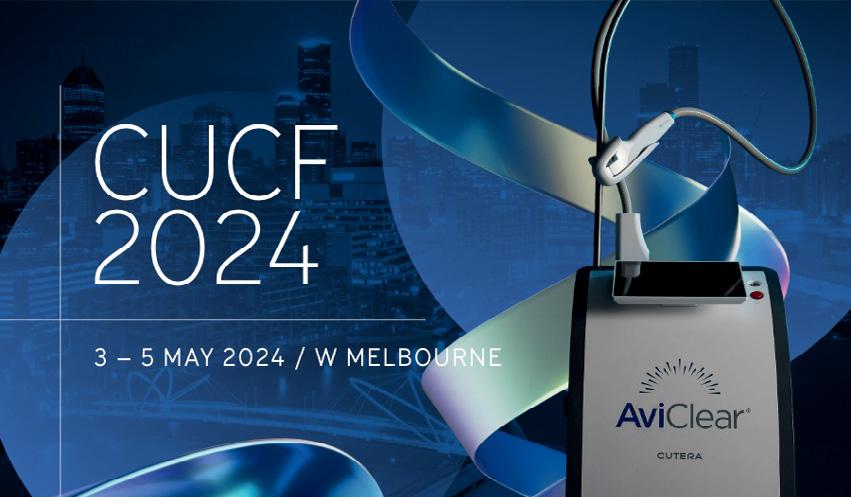
When: May 19 – 20, 2024
Where: Mantra on View, Surfers Paradise
Thriving Aesthetics Summit, organised by APAN will set a new standard in industry events that is tailored to address the current industry needs unique to 2024. The key topics for the 2024 Thriving Aesthetics Summit will contain a strong focus on the changing business models in the aesthetics industry and new advances in successful media communication. In fact, 40% of the program will be dedicated to mastering business growth in the competitive world of Aesthetics. apanconf.com
When: June 14 – June 16, 2024
Where: Gold Coast Convention & Exhibition Centre, Gold Coast
The NSS is an all inclusive 3-day learning event designed to give you a lifetime of value. Over the last 11 years the NSS has been a not-for-profit symposium with state-of-the-art learning to empower practitioners to provide value and safety to their patients. The 2024 NSS will take place on the Gold Coast from June 14-16. nonsurgical.org.au
When: June 16 – 18, 2024
Where: Taronga Zoo, Sydney
Juv’ae are delighted to unveil the details of the highly anticipated Juv’ae 2024 Conference, set against the backdrop of the dynamic city of Sydney. Mark your calendars for an enriching experience from the 16th to the 18th of June 2024. These dates have been thoughtfully chosen to align with the NSS Conference, presenting a unique opportunity to harness the collective presence of Key Opinion Leaders (KOLs) while simultaneously optimising cost-effectiveness for pharmaceutical companies. Juvae.com.au
When: August 1 – 4, 2024
Where: Winx Stand, Sydney

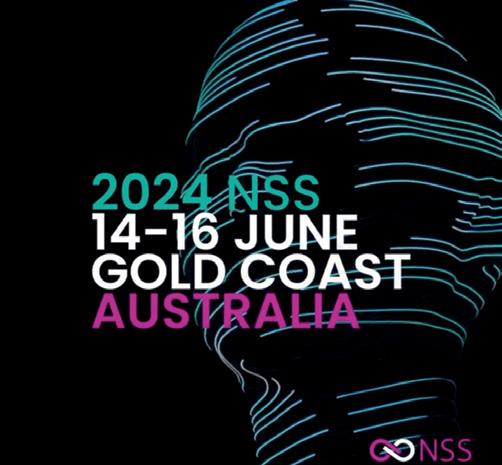
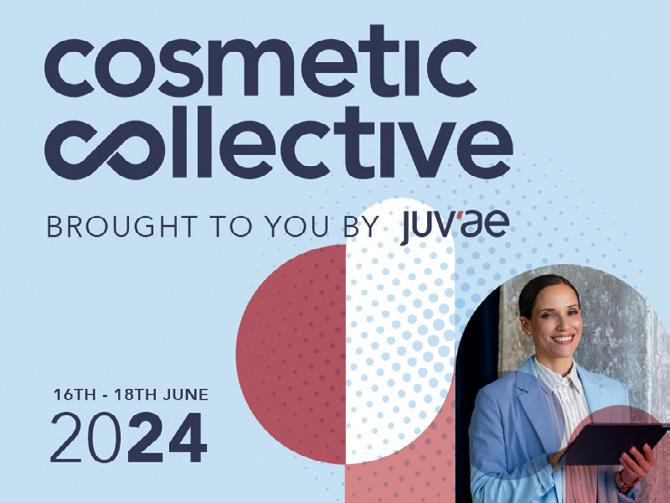
Aesthetics 2024 is an all inclusive three and half days of non-surgical educational event covering all things practical, topical and current with injectables, energy devices and all skin health therapy, held at The Winx Stand in Sydney. The program is created for all non-surgical practitioners including dermal therapists. The largest aesthetic meeting in Australia, our theme for A24 is understanding the ‘Why’ we do things. We hope to see you all there! Aestheticsau.com
When: October 29 – 31, 2024
Where: Crystalbrook, Byron Bay
The Fresh team searched high (Darwin) and low (Adelaide) and they’re more certain than ever… the secret behind the magic is none other than the breathtaking Crystalbrook at Byron Bay, a venue so perfect it seems destined for the splendor of Fresh Life. The Crystalbrook isn’t just a venue; it’s a canvas for the ultimate Fresh Life experience. Returning for the second year in a row, it promises to be nothing short of spectacular. While The Fresh Life is returning to the same location, this isn’t a rerun! The Fresh Life 3.0 promises a reinvention, a transformation of the expected. The event will expand on training, bringing you even more business workshops and an immersive experience that will be sure to send you home prepared and invigorated for the busy season. thefreshlifeconference.com

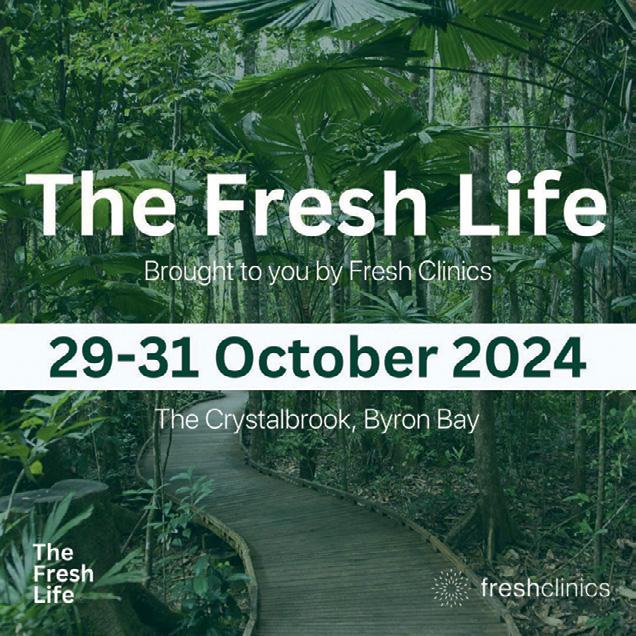
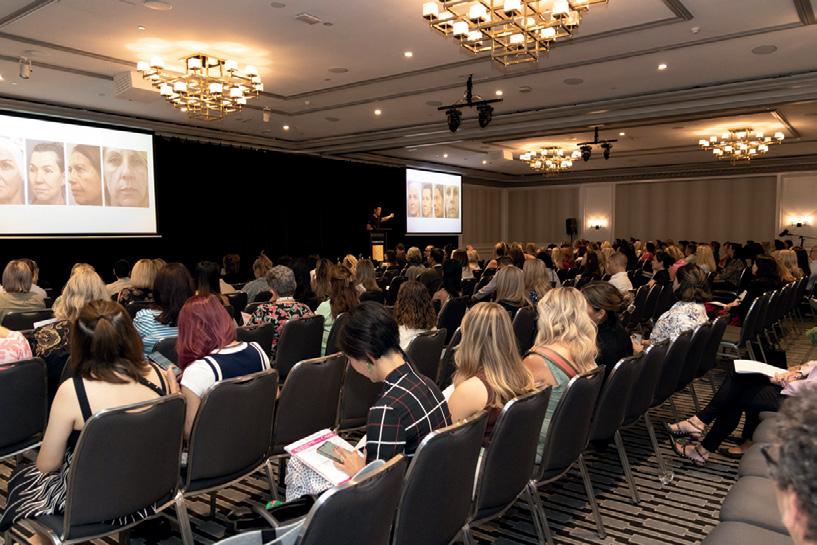
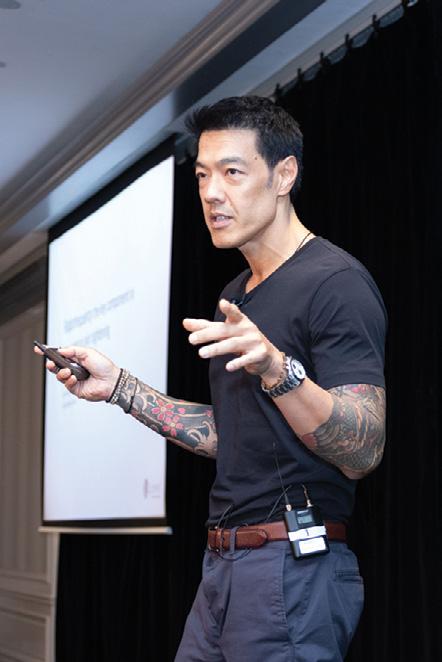
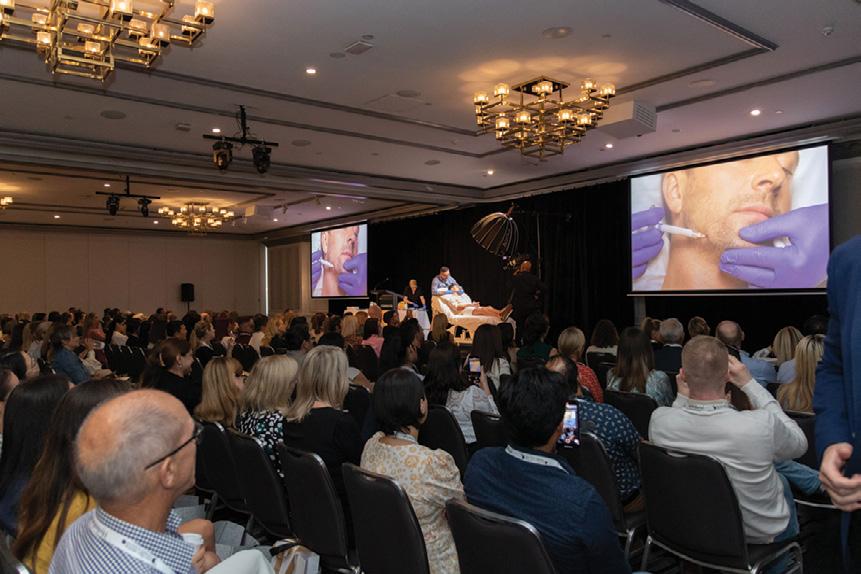
OSMEDICON 2024 is Australia’s premier boutique aesthetic medicine education event and runs over four days from Thursday through to Sunday, 7 - 10 March.
Driven by delegate feedback, the program has been tweaked to maximise the education benefits for attendees. Thursday is Workshop Day, with the Scientific Program and Trade Exhibition running concurrently on Friday and Saturday, and Sunday will feature case studies, live injecting demonstrations and more scientific presentations.
The conference will again be held at Sydney’s Intercontinental Hotel, Double Bay. Delegates can expect to learn about the latest innovations in aesthetic treatments, as well as tips and tricks from experienced key opinion leaders.
Thursday hosts two full-day, cutting edge, Industry supported, concurrent workshops that will cover different injectable treatments plus breakfast workshops are featured on Friday, Saturday and Sunday from 7am.
This year the scientific program will run over three days, and has been curated to ensure the inclusion of an impressive cross-section of international and local opinion-leaders, providing thought-provoking and skill-enhancing presentations and discussions. The COSMEDICON mission is that delegates will return home with plenty of new ideas and practical skills that can be implemented immediately.
Every year COSMEDICON provides a social program of lavish and fun events – in 2024 this will commence with the Cryomed Aesthetics Welcome Drinks in The Bar on Thursday night from 7pm. On Friday night, High Tech Medical’s ‘Rocky Horror’ themed Gala Dinner in The Ballroom at the InterContinental, Double Bay commences at 7pm and is sure to make the crowd ‘jump to the left…’ with a characterdriven show in addition to world-renowned DJ Stephen Ferris (he has provided soundtracks for the City of Sydney 2000 New Years Eve celebration, VIVID and Mardi Gras, amongst others) and includes a prize for the best costume. Be ready to let your hair down!
On completion of the scientific program on Saturday, delegates and exhibitors will adjourn to The Courtyard for the Xytide Networking Event. This is the perfect opportunity to catch up with friends old and new, and to discuss learnings and insights from the event.
In response to the Call for Papers, COSMEDICON 2024 will feature a diverse and knowledgeable range of experienced International and local presenters, this year running over three days, concluding at afternoon tea time on Sunday.
International speakers include:
Dr Kim Booysen (UK) is a globally experienced, medical doctor with over 20 years’ clinical experience and holds degrees in medicine, law, business management, health management and aesthetics. She runs her own busy aesthetic practice in South East London and her current field of interest is ultrasound in aesthetics.
Dr Glen Calderhead (South Korea) is Vice-President, Medicoscientific Affairs of the Lutronic Corporation and travels worldwide lecturing on all aspects of phototherapy and photosurgery. A pioneer of laser surgery both in Japan and world- wide, he is a leading expert in low level light therapy (LLLT) and has published a number of scientific papers, as well as being the co-author of and contributor to several books on laser therapy, laser surgery and simulation surgery.
Dr James Chelnis (USA), is board certified in oculofacial plastic surgery and ophthalmology, having completed his ASOPRS (American Society of Oculoplastic and Reconstructive Surgeons) fellowship at Vanderbilt University and the University of Tennessee. He is an internationally recognised speaker and teacher in aesthetics and plastic surgery, including at NYU, Mount Sinai, NY Eye and Ear, as well as Vanderbilt University.
Jordan Jacobs RN (USA) has wide expertise in non-surgical facial rejuvenation using her distinctive injection techniques. With extensive, highly specialised training by some of the world’s leading aesthetic injectors including Dr. Raj Acquilla, Dr. David Funt, Dr. Arthur Swift, Dr. Shino Bay Aguilera, Dr. Lara Devgan, Dr. Christian Subbio, Dr. Patan Tapel, Dr. Christopher Surek, and Nurse Practitioner Leslie Fletcher, she is based in New York City and runs her own business, Jordan Jacobs Medical Artistry.
Dr Shang-Li Lin (Taiwan) is a board-certified dermatologist and founded Shangli Dermatologic & Aesthetic Clinic in Taipei 12 years ago. He has given lectures and training sessions at numerous global conferences and workshops and won the best case in non-surgical facial rejuvenation in 2015 at AMEC for his insightful treatment plans and unique injection techniques, and because of his passion and tremendous experience in the fields of injectables, laser and energybased devices, he is a highly sought after speaker worldwide.
Visit cosmedicon.com.au for tickets and new speaker announcements.
Prof Greg Goodman shares a sneak peek of the ASCD Symposium 2024.

This year’s ASCD Symposium, taking place on March 1-3, is themed “The Next Generation” and it is possibly our best in terms of content across the aesthetic domain. We are extremely content heavy, and I feel confident that it will enthral and challenge all of us and possibly even exhaust us just a little.
In an extraordinary outpouring of overseas support, we have 21 international speakers with 14 being on site and actively engaged. They come from the US, UK, Georgia, Singapore, Hong Kong, Germany, South Africa, Israel and Brazil. Additionally, we have an incredible array of local key opinion leaders featuring plastic surgeons, dermatologists, aesthetic practitioners, nurses and nurse practitioners.
Highlights are many, but I will try to pick out some: We are starting with taking a peek at the elephant in everyone’s room, the rise and rise of AI in all our lives. We then move on to highlight the rise of radiofrequency, a simple but incredibly flexible technology, before moving on to the twin streams of the conference.
We then have sections on the revolution currently going with injectables, in intelligent energy-based devices and in surface active skin care and after care. In an attempt to address unmet needs such as the neck, décolleté and body, we dive into skin care and treatments designed for these areas.
An in-depth session will examine the nuances of facial anatomy and what it means to the injector. There is quite an emphasis on the psychology of your patients and your obligations to them and to the regulatory authorities; how to manage the modern informed patient, and avoiding and looking after those who we should not treat.
Later in the conference we will look at what may replace what we are doing – a little crystal ball gazing in machinery used and procedures performed. Disruptors in our industry will be identified. The ever-threatening emergencies and complications in what we do will add to our skills to manage these events. We finish where we began with the challenges and the potential for AI and the growing need for best skills in practice management. Prof Greg Goodman is the ASCD President. Ascd.org.au
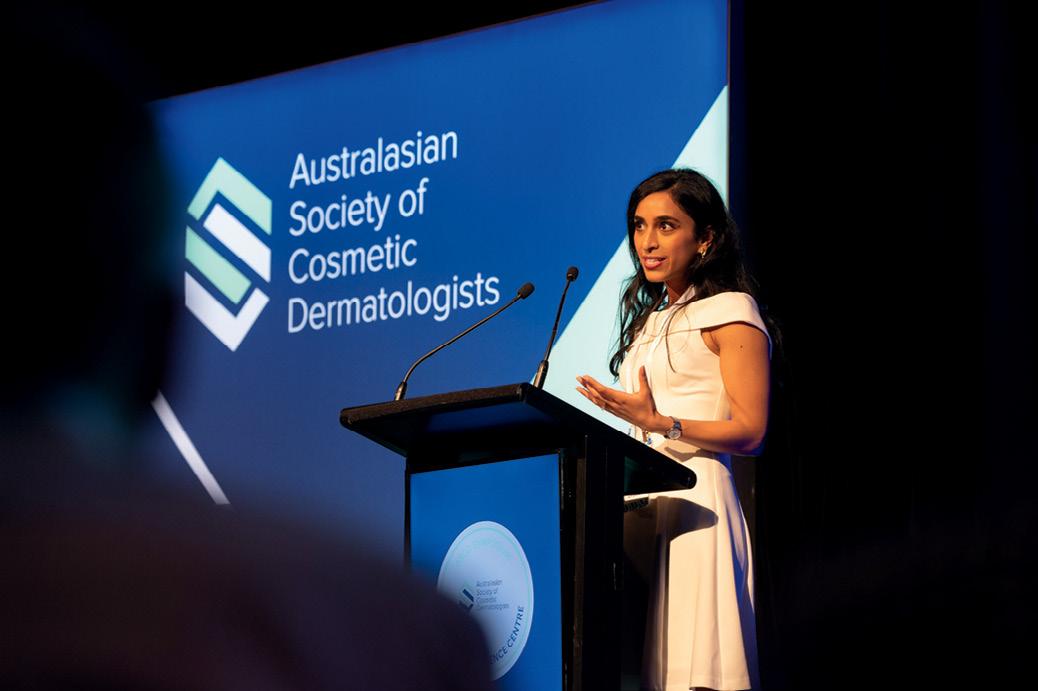
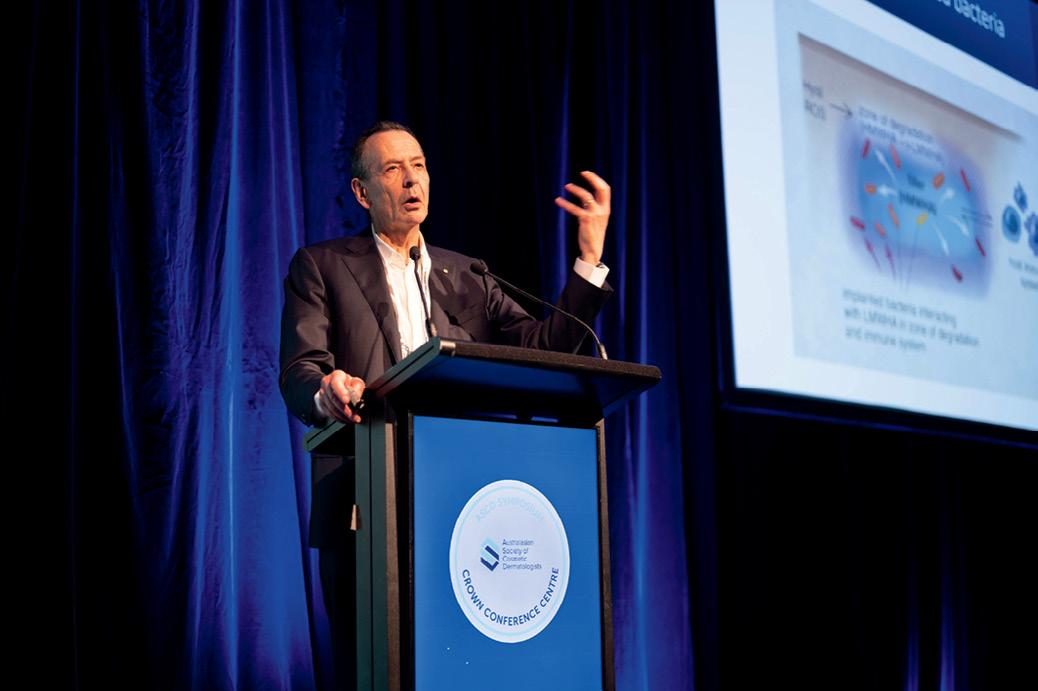

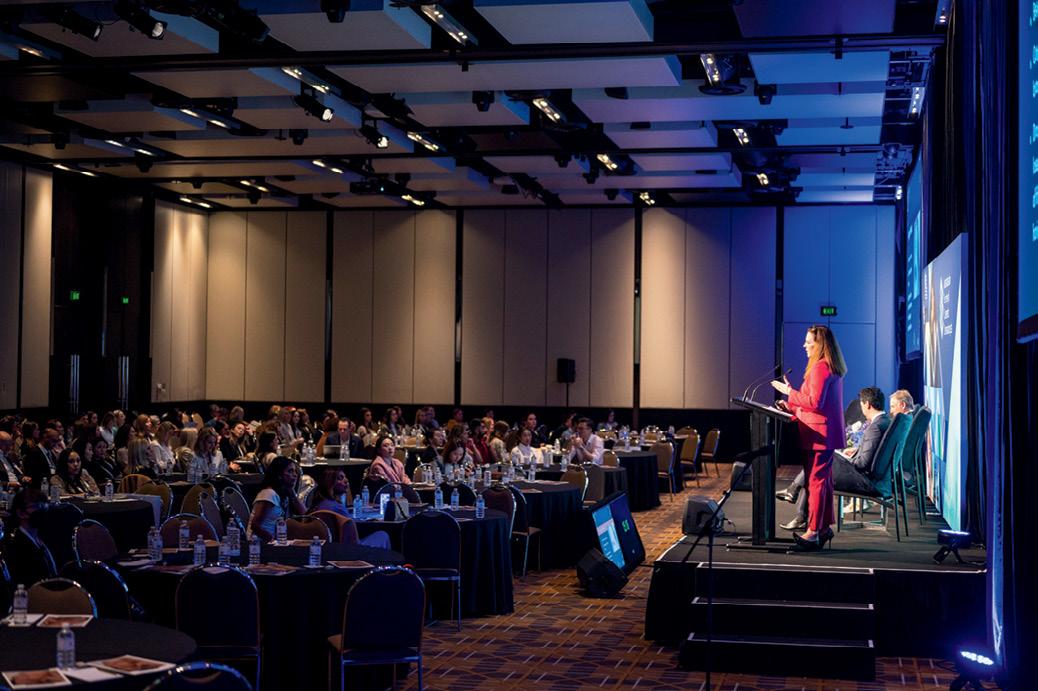
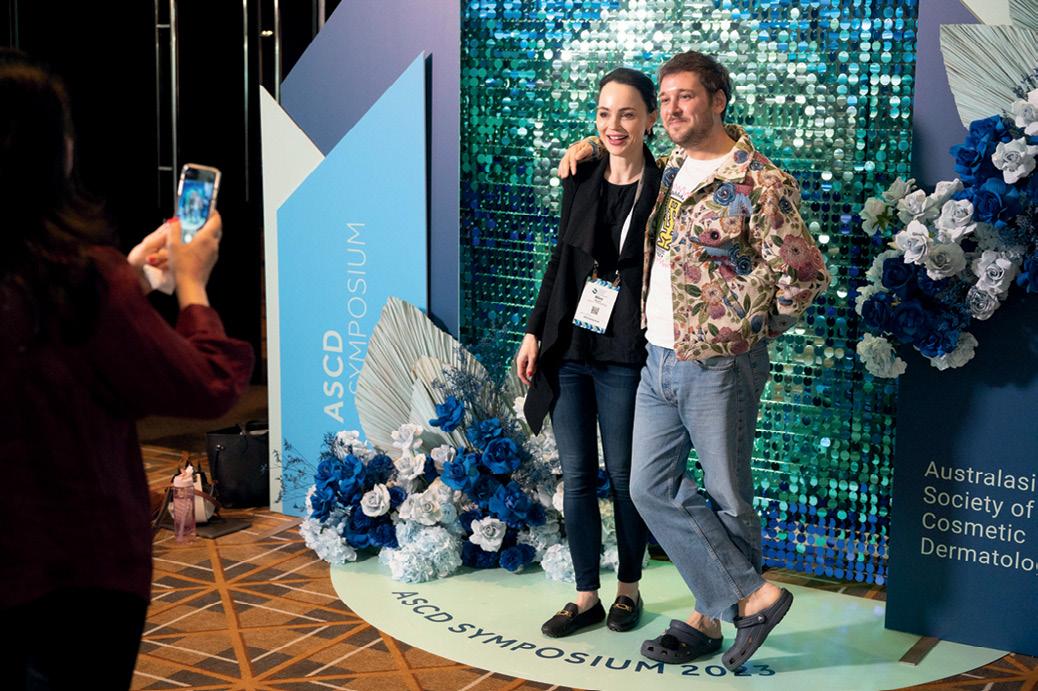
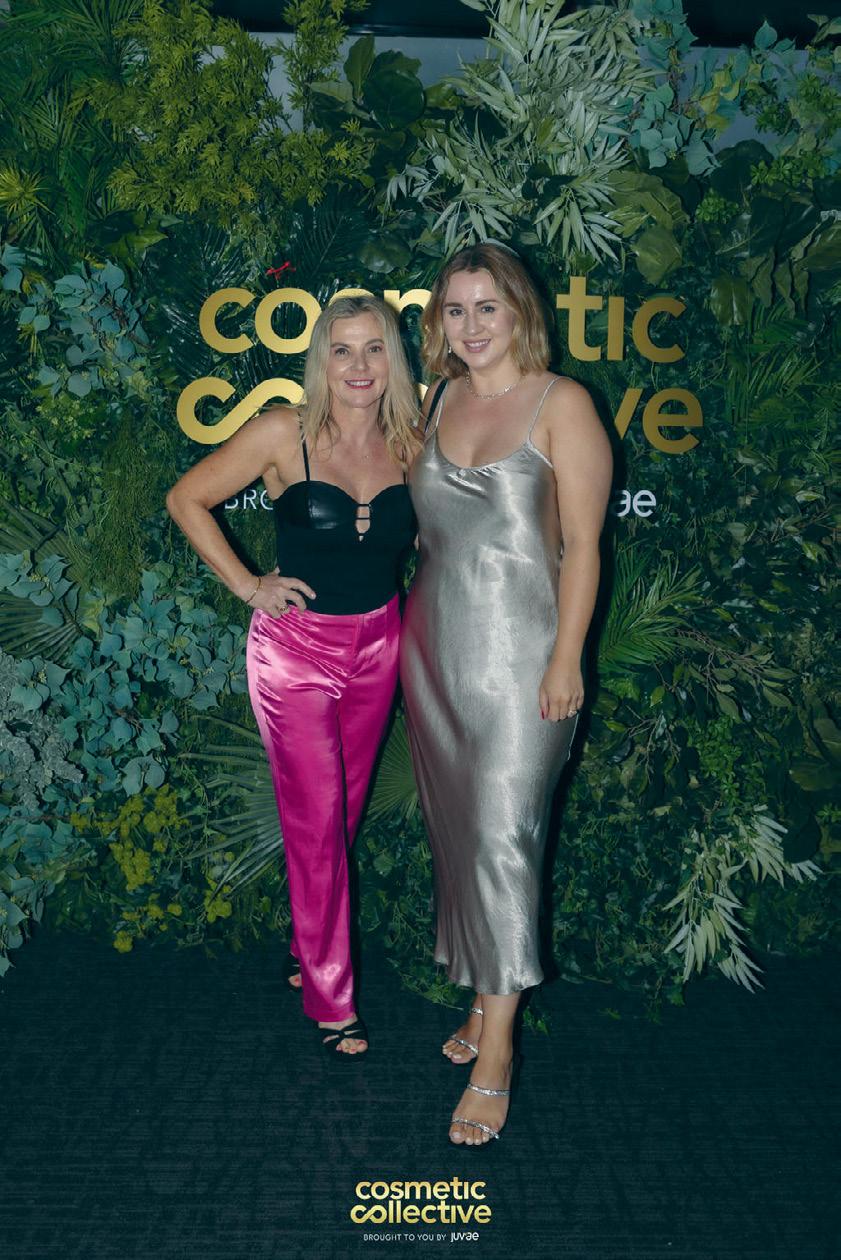
On December 3, Juv’ae invited cosmetic nurses and industry professionals aboard a Sydney Harbour Cruise to celebrate the year that was, and to recognise outstanding cosmetic nurses’ achievements with Juv’ae awards. Nurses from all over Australia donned their most glamorous dresses and mingled with industry friends as the cruise offered stunning views of Sydney Harbour.
After a delicious buffet dinner, Juv’ae’s Director of Nursing Leadership & Strategy, Jacinta King introduced the awards ceremony, celebrating nurses in eight different categories, such as ‘best lip augmentation’, ‘Best Social Media’, and a special one for ‘Juv’ae Family Spirit’, which was preceded by Juv’ae Founders Nicole Schmid-Sanele and Melissa Isaia sharing their utmost appreciation and love for the community of Juv’ae members they have built throughout the years. After the awards were handed out, it was time to celebrate and dance the night away.
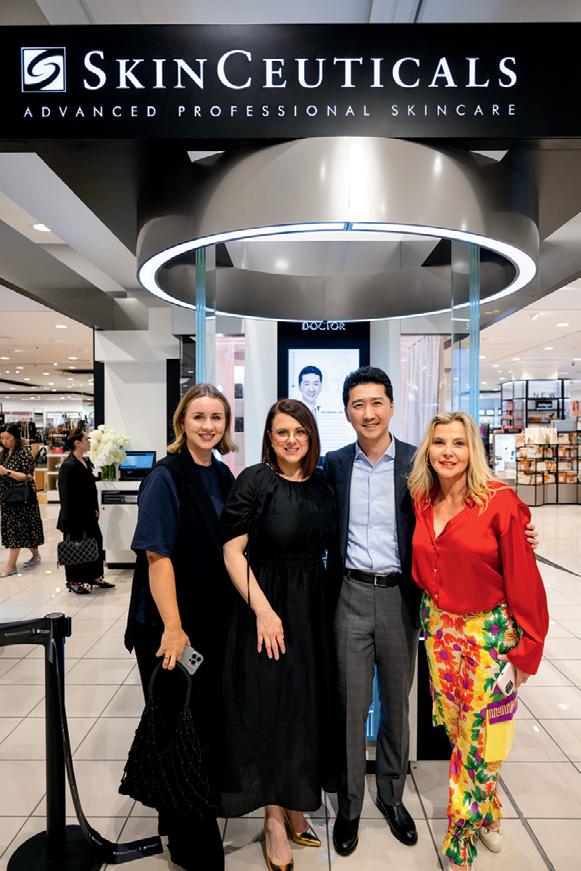



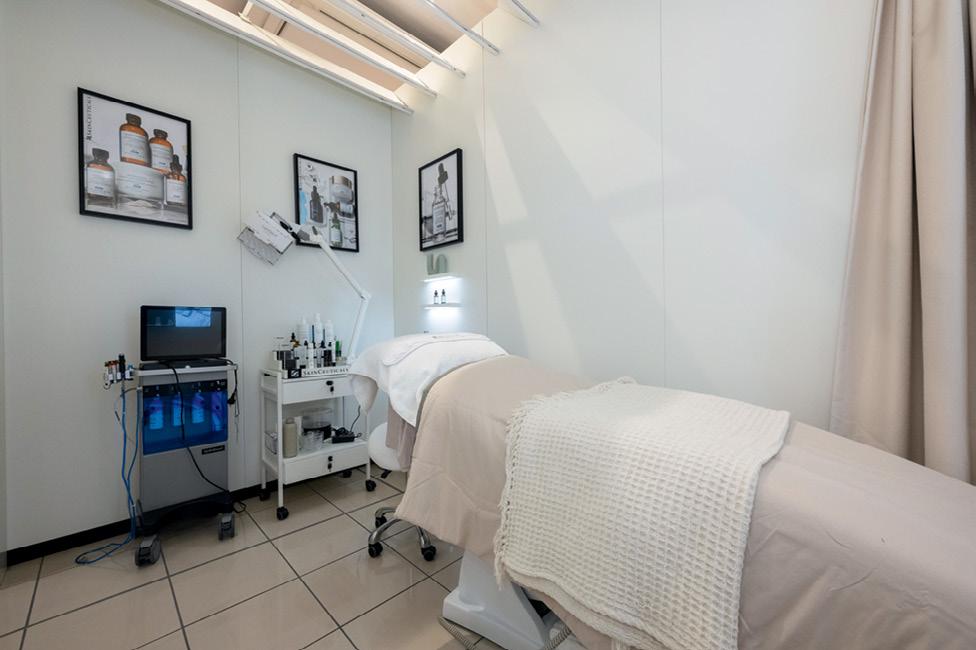
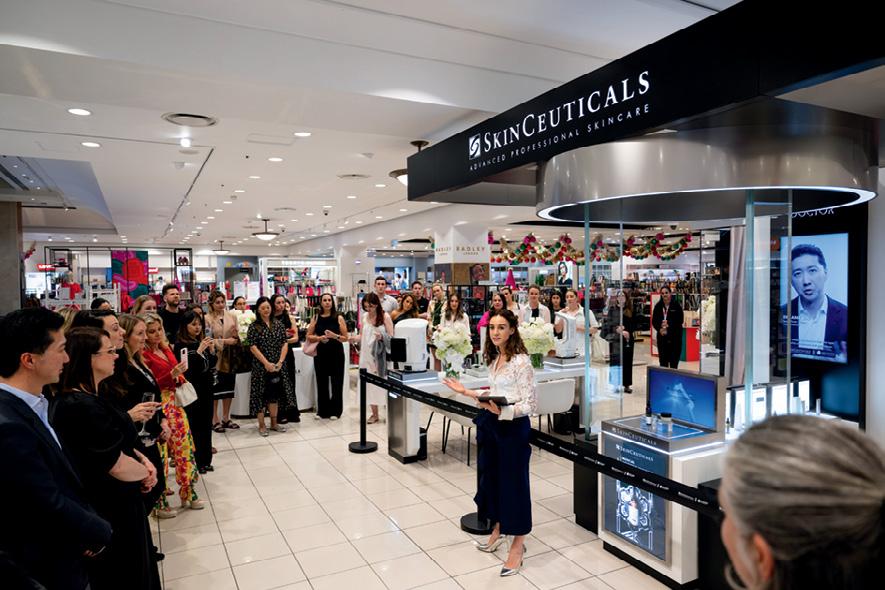
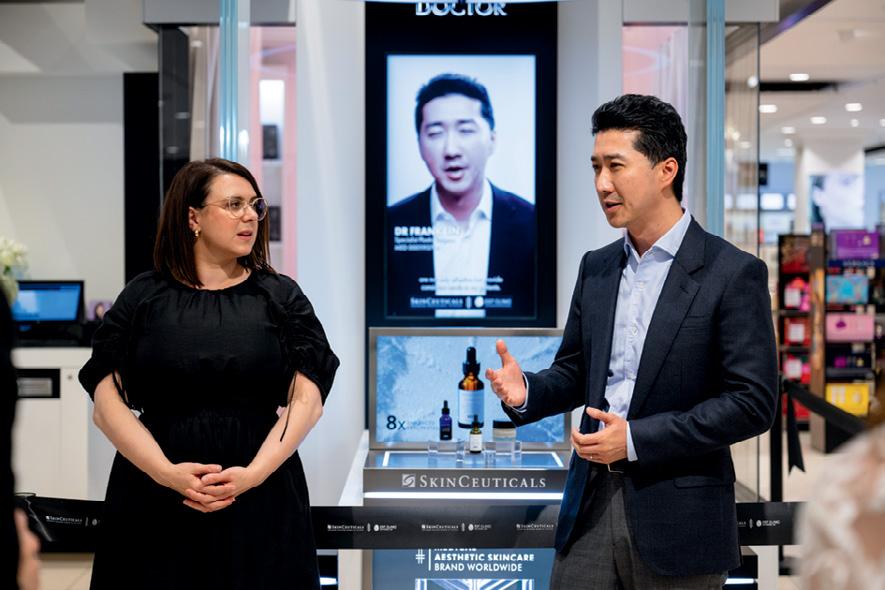
On December 6, SkinCeuticals invited industry professionals to the opening of its first in-department location at Myer Chadstone in Melbourne. The satellite clinic was developed in collaboration with Plastic Surgeon Dr Frank Lin, whose other two clinics EST and Eastern Plastic Surgery are also located in Melbourne and stock SkinCeuticals products. Guests could take a look inside the clinic at Myer, which includes a treatment room offering professional treatments with optional Hydrafacials and LightStim LED.
SkinCeuticals’ Head of Medical and Education, Dr Tania Romano, welcomed guests to the brand-first concept and explained her appreciation for the longstanding partnership with Dr Lin, who said he loved working with the brand due to its ongoing commitment to scientific research and innovation. Guests enjoyed SkinCeuticals branded mocktails, canapés, and live music by a violinist.
On December 4, 2023, CeraVe invited media, influencers, and brand friends to a festival of skincare. Held at Pix on Location in Sydney’s inner West, CeraVe transformed the location into a playground for skincare lovers, including giant cleansers, ball games, photo opps, and a food truck.
On stage, dermatologist Dr Ryan de Cruz educated guests about the importance of a simple but scientifically backed skincare routine before comedians Sam Andrew and Mel O’Brien entertained with their version of Adele’s ‘Make you feel my love’, re-writing the lyrics to explain their very different approaches to skincare.


CeraVe ambassador and TV presenter Brooke Boney hosted the event, taking questions from the audience, who were also invited to take a skin quiz to figure out their skin types before visiting several skin stations to collect products customised to their specific concerns. This was CeraVe’s largest Australian event to date, with more big plans to come for this year. Stay tuned.

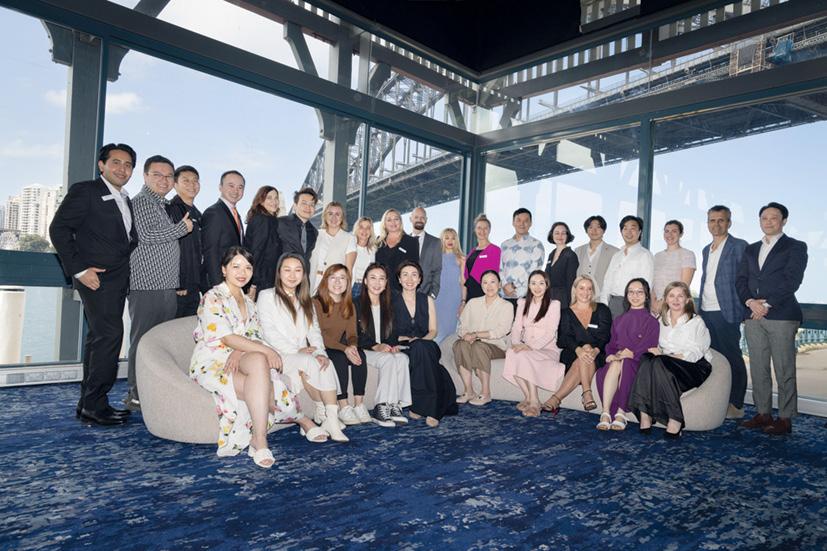



Australia has plenty of incredible practitioners who we regularly learn from at educational events and conferences, however, whenever there is a doctor from overseas visiting our shores, we are particularly interested to meet with them and pick their brain on how they do things in other countries.
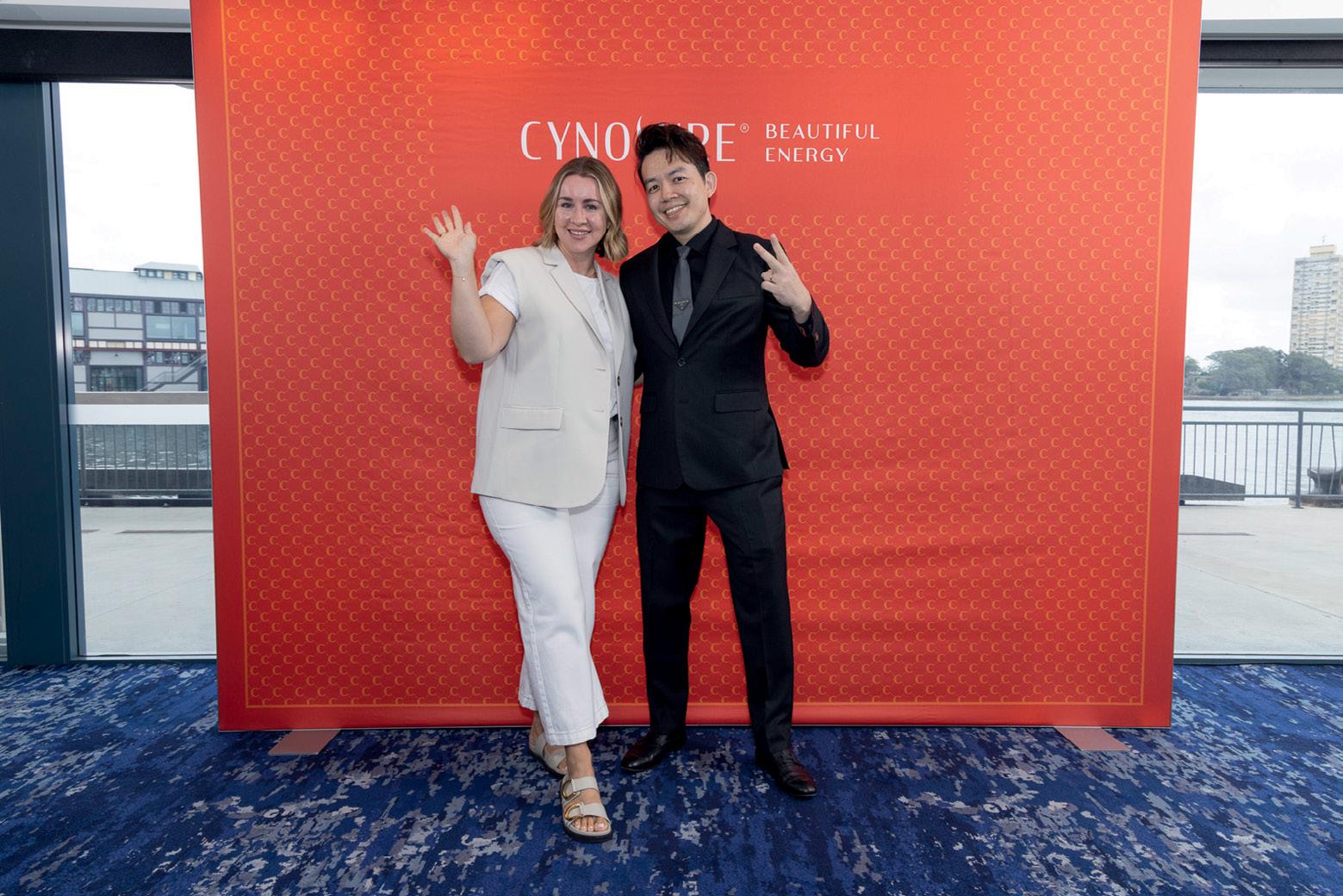
Late last year, Singapore based aesthetic practitioner Dr Isaac Wong visited Sydney for the Cynosure Exchange event, held at Pier One. Dr Isaac Wong is the Founder and Director of The Artisan Clinic on Singapore’s famous Orchard Rd. His special interest is in facial contouring, lifting and rejuvenation with injectables, lasers, and combination therapy. With more than 400 clinics on Orchard Rd, Dr Wong has managed to break through the crowded market and establish himself as a leader in facial rejuvenation.
At the event, Dr Isaac told us how he has turned his one-man practice into a multi-million dollar revenue business in just a few years, and why his suite of Cynosure devices has played an important role. Many Australian clinic owners attended the lunch and not only enjoyed the stunning view of Sydney’s Harbour Bridge, but also learned Dr Wong’s tips and tricks on how to get the best out of your devices, and how to market your clinic’s offering effectively.
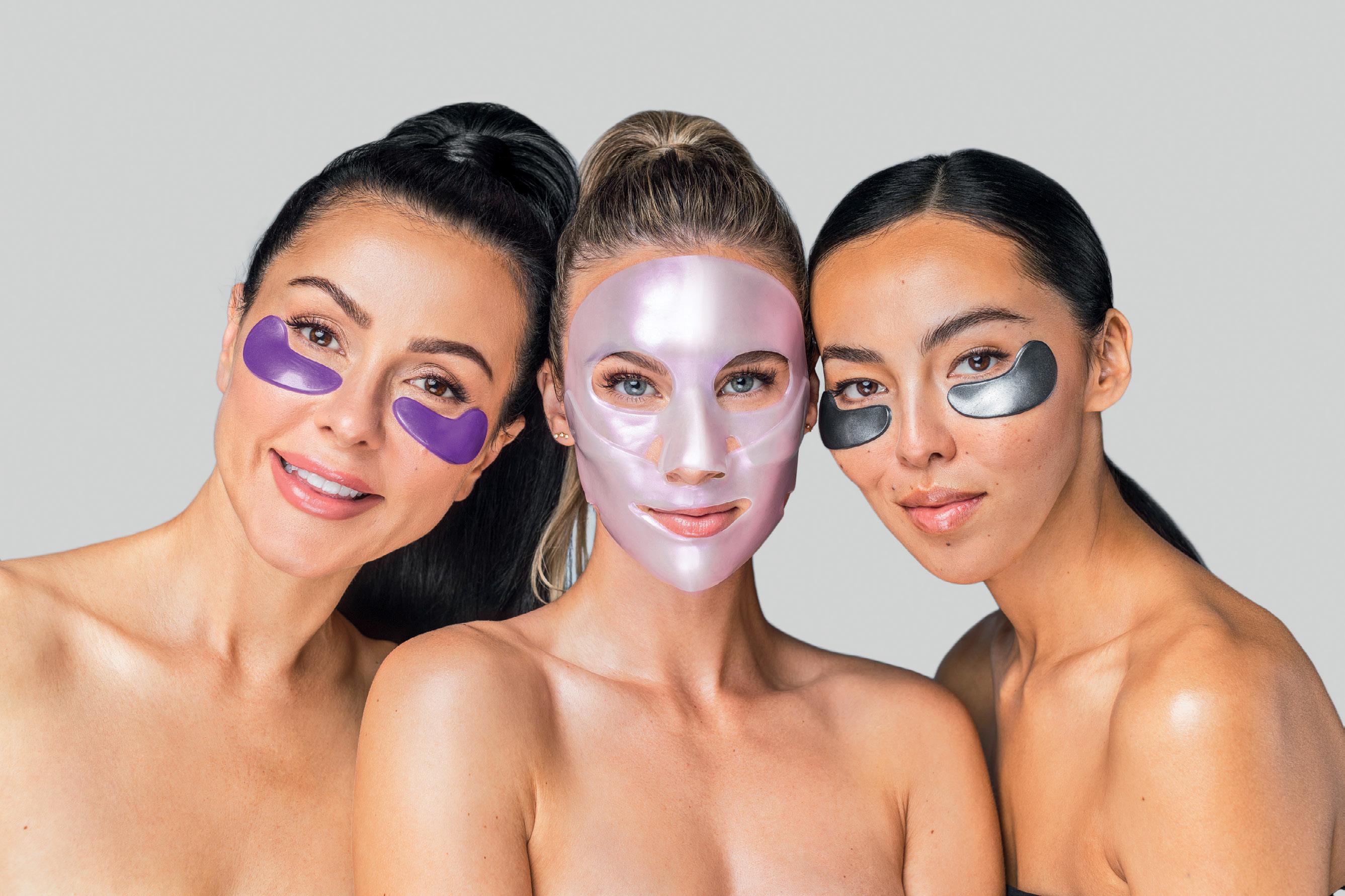
There’s a reason why KNESKO has garnered a cult-following overseas. Now, the gemstone infused luxury skincare brand has landed in Australia, where its story began in 2012, set to revolutionise your (medi-)spa offering.
Introducing a new brand to your existing (medi-)spa offering usually means replacing or upgrading an existing one, but what if we told you that KNESKO is the perfect addition to almost any treatment you offer, and can easily increase your revenue and enhance your clients’ experience at the same time?
KNESKO is a gem-infused, high vibrational skincare brand founded by celebrity aesthetician Lejla Cas, who realised, everyone was seeking the same thing: They wanted intentional time for themselves to recharge, and a skincare routine that was effective, luxurious, and healing.
Each product in the KNESKO range is developed under Lejla’s creative direction alongside a team of boardcertified dermatologists and cosmetic chemists. The brand’s premium formulas are routinely found in high-end spas and clinics, makeup artist kits, and celebrity bathrooms.
Lejla has appeared on Keeping Up with the Kardashians and Real Housewives of Beverly Hills forming lifelong relationships with Kris Jenner, Kathy Hilton, and Lisa Rinna, all avid fans of KNESKO treatments.
Lejla’s career in the beauty industry began in Perth, Australia before she moved to the United States in 2007, where she worked in roles ranging from education to marketing to product development. In addition to working with globally recognised brands, she continued providing her intuitive skincare and makeup services to private clients. With decades of experience
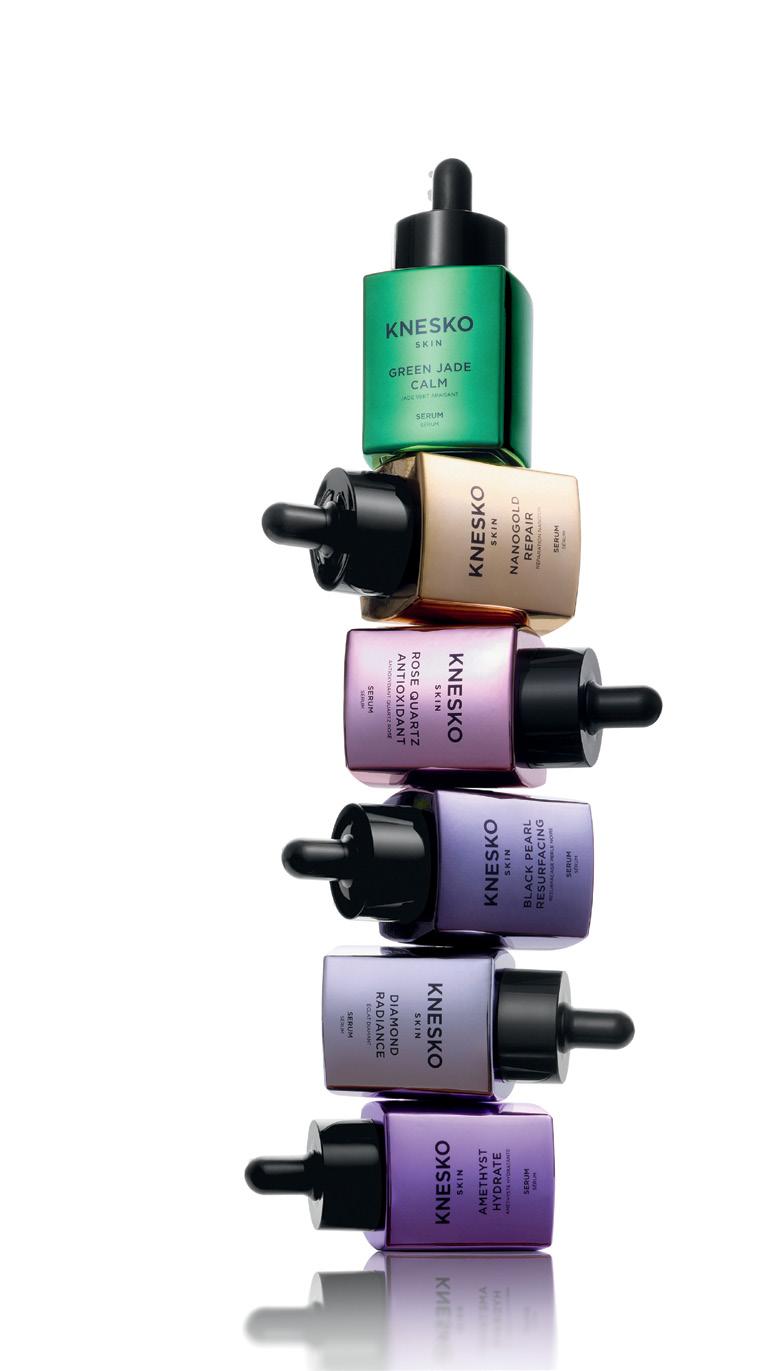
in the beauty industry, Lejla is also a Reiki Master, perfecting the art of energy healing with every product she creates. Her expertise in formulating high performance skincare, gemstone healing, and providing intentional moments of self-care are what form the pillars of the brand.
KNESKO is championed by aestheticians, makeup artists, and dermal therapists globally for the results and holistic approach to beauty. Each of Knesko’s six collections is crafted with revolutionary GEMCLINICAL® technology, which is the infusion of real crushed gemstones into results driven treatments, that balance the chakras, are charged with Reiki energy, and formulated with clean clinical ingredients to target key skin benefits.
Each collection is designed to address skin benefits like; Repair (Gold), Radiance (Diamond), Resurfacing (Black Pearl), Hydration (Amethyst), Calming (Green Jade) and Antioxidant (Rose Quartz). Committed to clean formulations, the ophthalmologist-tested formulas are 100% free of artificial fragrance, synthetic dyes, formaldehyde & formaldehyde donors, benzyl & propylene glycols, phthalates, parabens, sulfates, silicones, triclosan, oxybenzone, paraffins, nanoparticles and nut oil.
The collection of masks, serums, and sculpting tools seamlessly integrate into spa treatment protocols to maximise the impact of guest results and spa revenue. Knesko’s top luxury partnerships also activate touchless spa upgrades that feature their collagen eye and face treatments into spa lounge and poolside activations to generate revenue.
The cutting-edge GEMCLINICAL® technology used in each product is perfect for clinical application. Made with bioavailable marine collagen that utilises a special poly-peptide delivery system, the mask itself melts and penetrates through the epidermal barrier as it sits on the skin for intense hydration. With a triple helix structure that stores up to 10x more age-defying serum, each face mask produces results unlike that of competitors.
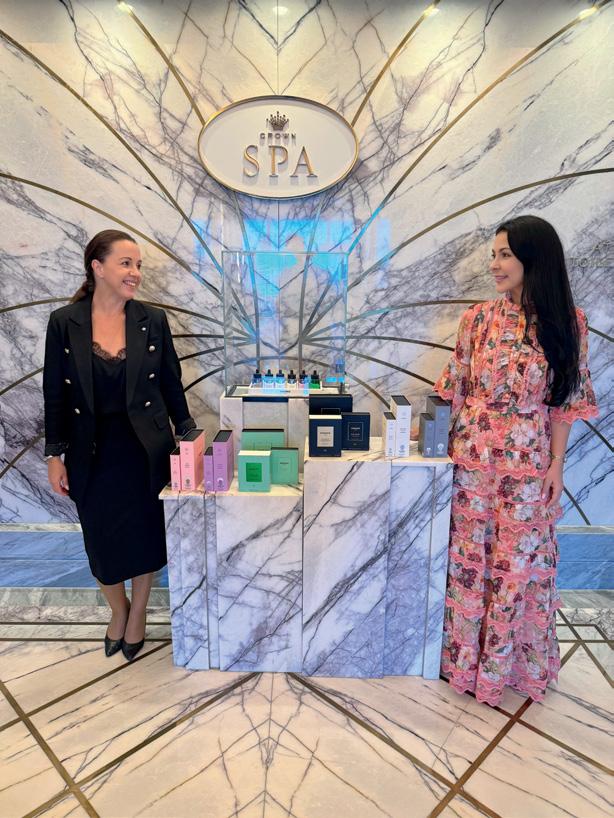

Knesko masks feature hydrogel material, technology that is used in hospitals to fast-track wound healing. The notable thickness of the masks helps drive actives deeper into the skin. This wound-healing technology makes the collagen masks perfect for clinical procedures like microneedling, ablative and non-ablative treatments, IPL, chemical peels, microdermabrasion, dermaplaning and post-procedure skin recovery. The soothing effect of our masks help to reduce visible redness, puffiness and irritation, providing rapid posttreatment comfort and skin restoration.

Luxury spas and clinics turn to KNESKO’s collagen masks, Gemstone Booster Bar, and sculpting tools to increase guest average spend and improve ROI with a retail and upgrade offerings with each guest experience.
Spa partners have embraced KNESKO offerings including collagen masks for face, eyes, lips and décolleté, the fair-trade Gemstone Rollers and Gua Sha tool, and our clinically formulated Gemstone Serums. The
KRISTY CHARLIER, BSN, RN, a cosmetic injector with a background as a dermal therapist, started her career in Sydney. Kristy has practiced in both Australia and the US, and has incorporated KNESKO into her clinical treatments since the company’s launch. Her favourite treatments to use Knesko masks and serums are microdermabrasion, microneedling (Skinpen), RF microneedling, Radio Frequency, IPL, Laser Resurfacing and after cosmetic injections.
How do you use KNESKO masks for your clinical aesthetic treatments?
I really love to use the serum from
collections are featured in treatment rooms in over 1000 5-star spas and highend resorts. International spa and resort partners include Fairmont, Four Seasons, MGM Resorts, St. Regis, Wynn, The RitzCarlton and 1 Hotels.
Knesko recently made their debut at the Crown Spa Sydney. It’s a full circle moment for Lejla, who landed her first hotel spa in 2012 at the Four Seasons Beverly Wilshire Hotel (The Pretty Woman hotel) in Los Angeles with Spa Director Melissa Vitalis. Now, as Spa Director at Crown Sydney, Melissa has once again introduced KNESKO to her spa menu, “We were looking for a line of masks that would complement our existing brands and that was results driven. Knesko’s support, time, training and care for their clients is why they make such a great partner. We cannot wait to see the success of this partnership!”
“Knesko is adaptable and inclusive for all skin types, it has many options for small and larger packs of products – it makes it a really compelling proposition to our guests. Our guests regularly add it on as an enhancement to their treatment and then purchase a retail component to take home,” she explains.
Lejla is thrilled to be announcing the launch of KNESKO
AUSTRALIA PTY LTD across premium Spas, Resorts and Med Spa Clinics nationwide. All orders will be shipped from the Perth, WA warehouse. Follow KNESKO on Instagram @kneskoskin and Lejla Cas @mrsknesko KNESKO.COM.AU
For partnership inquiries contact: Aldo Celeste, Global VP Spa Development & Sales, info_aus@kneskoskin.com

the mask sachet as my glide during a microneedling/dermapen treatment. I’ll pick the mask appropriate to the skin concern of the patient and I finish off with the Gemstone Serums. I use the masks to calm down skin after ablative and non-ablative procedures in the treatment room which helps the skin have a faster recovery.
Why do you choose KNESKO over other mask competitors?
I like that the active ingredients in their serums and masks are proven to make a difference to the skin, and that they are committed to clean beauty, so no nasties
will irritate the skin during a treatment. In the post-care, their masks and serums maximise the recovery process to achieve better results.
What has your experience been like when it comes to support for KNESKO spa or clinical partnerships?
Knesko really partners with their accounts, and they show that by always providing great continuing education and support. They are always available to answer questions or concerns and take your feedback onboard to assist you better.
Helix House, based in Randwick, is your new Home of Wellness. We offer hot and cold contrast therapy via a traditional Finnish sauna, private indoor Infrared Saunas and Ice Plunges. Our Sunlighten Infrared Saunas have built-in Red-Light Therapy, the only saunas of its kind. The saunas have been specifically designed by NASA, to make sure you’re benefiting from all three Infrared wavelengths, which heat your body at a cellular level and have tailored programmes to target your needs. Our different programmes vary the amount of short, mid and far wavelengths to really focus on your desired outcome. Whether that be a cardio workout, weight loss or anti-aging – we’ve got you! And no matter what program you choose, the red-light therapy always leaves your skin glowing from that increased collagen production.
Our Ice Plunges are here to help test your Central Nervous System and increase blood flow to your skin, muscles and joints, while also detoxing your blood cells to get you feeling fresh, perfect for the Summer months. Our stunning outdoor balcony includes a Traditional Finnish Sauna, heating up to 110°C to get you hot and sweaty. We also
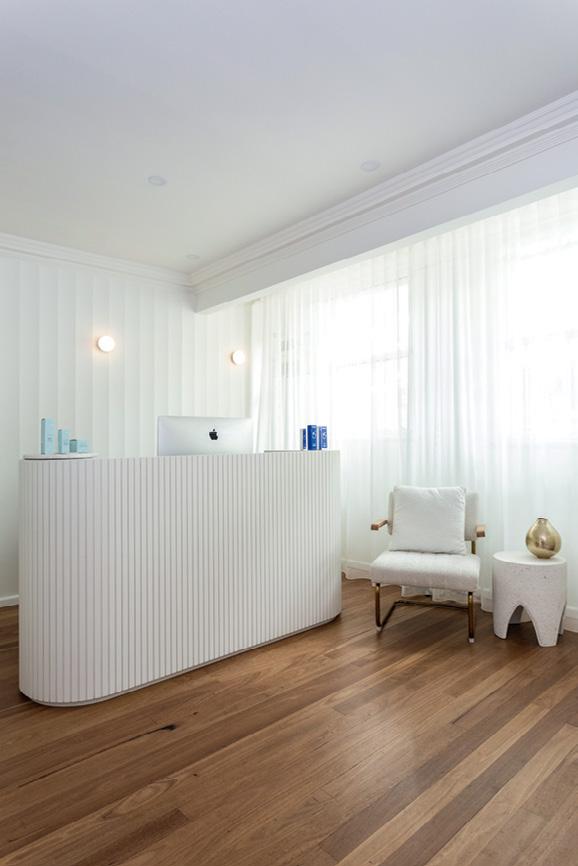



have an outside Ice Plunge and shower, fulfilling everyone’s contrast therapy needs along with stunning ocean views! After your wellness session, why not have a little collagen drink? We have collaborated with The Beauty Chef to get all those pro and prebiotics into your gut to make you feel healthy, hydrated and fresh. helixhouse.com.au


The Centre for Medical Aesthetics is a light filled, tree-lined space in Surry Hills. As a 3-level terrace, its muted interiors feel like a cozy visit to a friend, more so than a medical clinic. Reach Dr Amy Chahal’s office at the top level and you’re in a quirky space with bespoke art and a well-styled procedure room. Dr Chahal opened The Centre for Medical Aesthetics in Sydney’s Surry Hills district in November last year.
Offering a suite of skin and minimally invasive aesthetic treatments, the goal is patient centred care considering the individual to and taking a multi-layer, multi-modality approach to helping patients feel their most confident self at any age. The team thoughtfully consider their patients’ unique background, features and requests before providing them with treatment or advice to help them look and feel their best. They take a wellness, science and holistic approach in getting results. tcmasydney.com.au
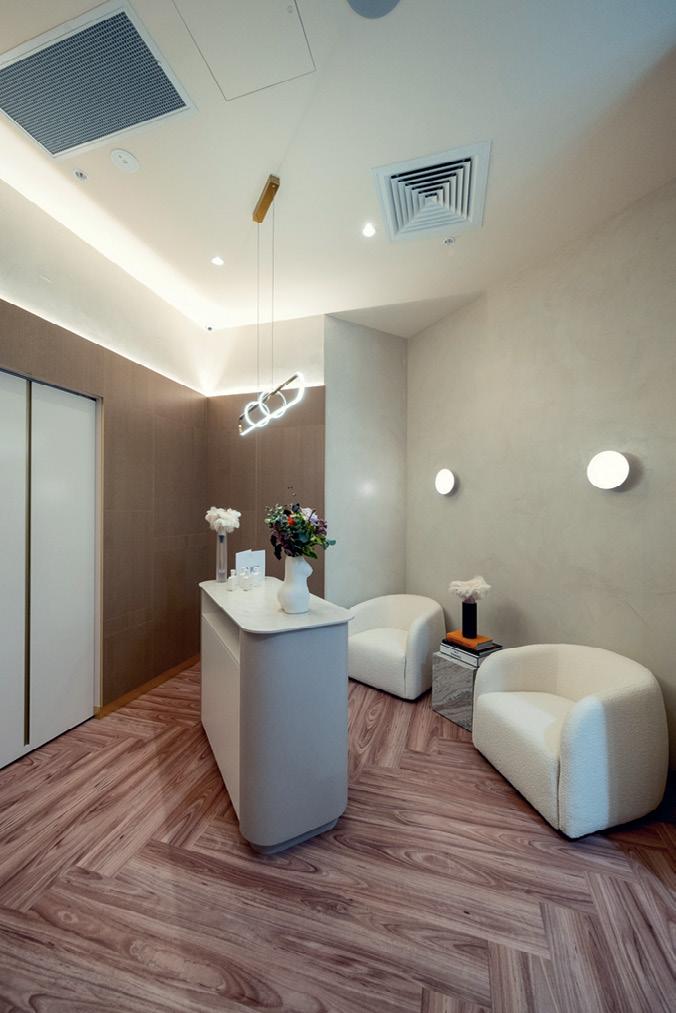


After the success of Fayshell Bondi Junction, the duo behind the brand, Katelin Gregg and Ella James, set their sight on the other side of the bridge and have opened Fayshell Neutral Bay. Just like the Eastern Suburbs location, the skin clinic offers no-fluff facials and LED services a well as skin memberships. In true Fayshell style, the decor boasts bright orange hues and Instagrammable neon signs and mirror decals everywhere.
Fayshell has redefined the skincare game by providing affordable, time-efficient, and results-driven facials tailored to meet clients’ unique skin needs. While membership is optional, it opens doors to the exclusive LED lounge and offers savings on each treatment, allowing you to curate a skincare routine that suits your individual preferences. Brands used at Fayshell include Synergie Skin, Image Skincare, Dr Spiller, Hydropeptide, and more. fayshell.com
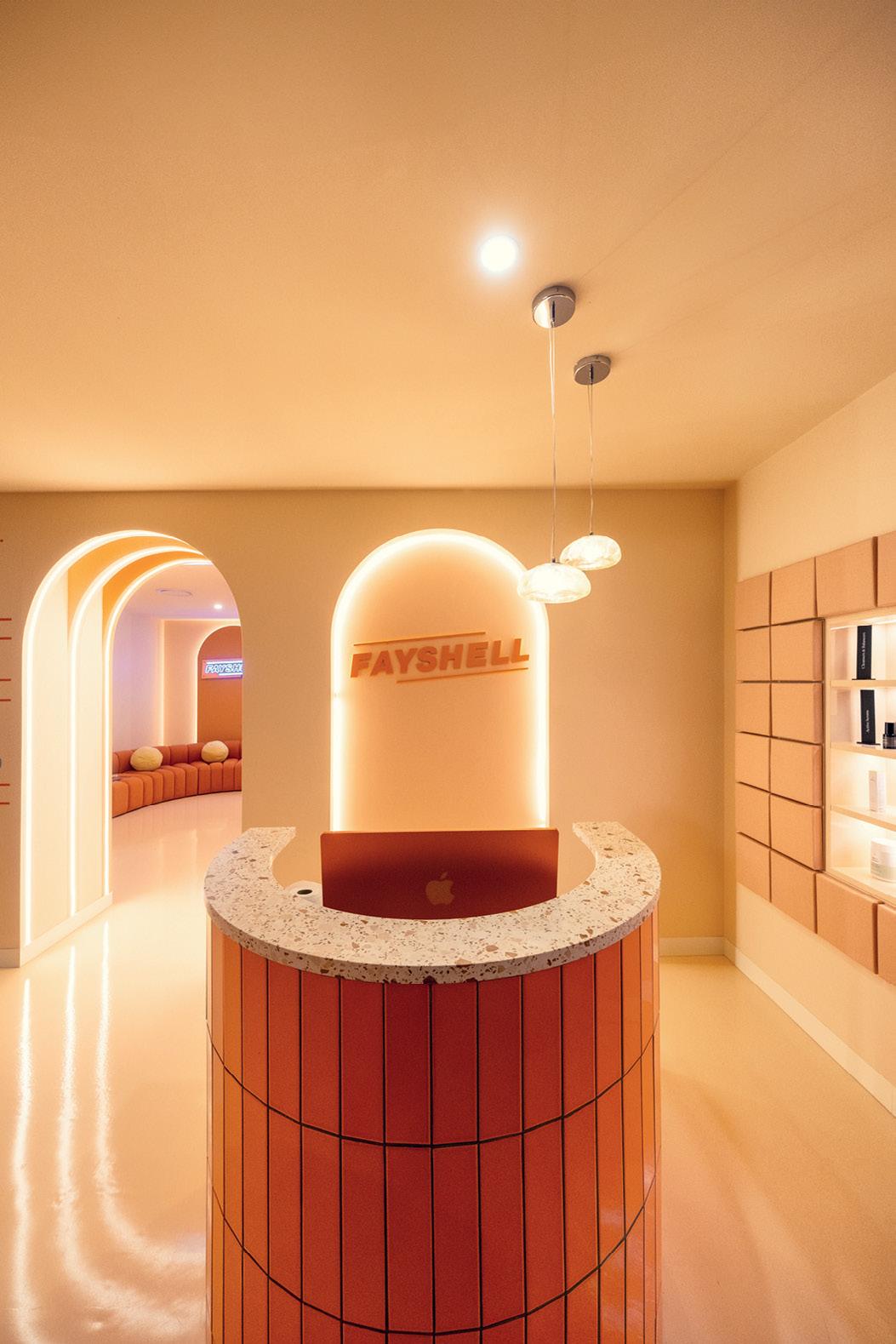
Introducing Q-Tox, a premier destination for a rejuvenated and radiant you, conveniently nestled in Narellan Town Centre. Q-Tox is not just another injectables clinic; it’s a sanctuary where luxury meets technology. Our unique focus is being committed to retail cosmetic injectables, working alongside nurses who are experienced in treatment breadth and depths meaning patients receive the treatment they need, not the one we have.
For their second site, Q-Tox wanted to redefine the traditional clinic experience - instead of a cold, clinical environment, there are touches of opulence, and indirect lighting, creating a warm and inviting ambiance, designed to make you feel pampered and relaxed. Embracing innovation with two built for purpose injectables rooms, each furnished with the latest technology including mobile phone activated fridges, projectors for video calling doctors, and a 55” TV for before and afters, cosmetic injectors have never been more supported to help patients achieve their best version of themselves. Q-Tox continues its LED subscription service for long-term beauty enthusiasts, providing a seamless path to sustained radiance. Not only does this provide stability of revenue, but it creates an enduring relationship with our practitioners, building trust before ever injecting a needle. q-tox.com.au



As we venture into a new year, now is the perfect time to affordably revitalise your clinic or spa experience. A few simple tweaks of your music can have a big impact to the customer experience, the level of comfort and luxury they associate with your business, the number of services they book and whether they refer you to friends.
What one person finds relaxing is not what everyone finds relaxing. Ask customers to choose from a few simple playlists. In OneMusic’s research into all things music and business, a dental clinic in Manly, Sydney, was found to ask their patients’ favourite genre ahead of their appointment. Playing their favourite genre during their appointment was a simple but powerful tool to show consideration for the wellness of their customers.
If your goal is for your clients to feel fully relaxed, research shows that 45-minutes of music in a relaxed position can encourage a delta brainwave of 5hz, which is equivalent to sleep. There are many studies around the neuroscience of relaxation and music, even some debates about what the most relaxing song in the world is.
One study suggests “Weightless,” a piece commissioned by the British Academy of Sound as the most relaxing. A 2023 study conducted at Auckland University of Technology found a song by New Zealand pop-alt artist Benee to also be the most relaxing in the world. Whether you use
contemporary music or instrumental songs, your music has a profound impact on the inner journey of your customers, and we want them to leave relaxed and rejuvenated.
Music can be as effective as medication to help us relax and is as restorative as sleep. Get it right and a 30 min massage will feel like 60 mins.
One Study out of Standford University showed that “listening to music seems to be able to change brain functioning to the same extent as medication.” A NZ study found that some music alters the human state, that there is temporarily less connectivity of various parts of the brain, slowing the brain - i.e. allowing for a break or rest.
No matter what music you are playing, you need to check you have permission to play it in a commercial setting – even if you have a paid music streaming service.
As well as a music licence, here are the other key elements to setting up your music in-house:
1. Volume: Ensure the volume is set so no one needs to raise their voice when talking. In one U.S Study, participants showed an overwhelming preference for soft music in comparison to medium or loud. Soft music was measured at 60-70dB, which is about the same volume as an average conversation.
2. Speaker Position: Ensure your speakers are in a position that is not in direct ear or head-line. You want the music to spread
evenly throughout the room and be indirectly reaching the ears of your client.
3. Volume consistency: The music volume is consistent throughout the clinic to create a seamless ambience
Rippling water or monastery-like chimes soundscapes are not for everyone.
Soundscapes like rippling water have been proven to be less effective than music for relaxation. A study of 60 women exposed to a psychological stress test found a significant decreased stress response across all measured parameters when comparing music played to that of sound effects or no sound at all.
It is no surprise that customers prefer music in-store than silence. Suggested in a study by University of Bath’s School of Management, music enhances the customer’s experience and even lifts sales. The study also showed that pleasant music makes customers decision making more intuitive.
Conclusively, using music is not as black and white as many might perceive. The way in which you curate your song choices, set the volume and position, and use it throughout your space and sessions, will determine the benefits of it for your clients.
OneMusic is the main licensing body for Australian businesses, servicing over 80,000 business owners with a-stop-shop approach. onemusic.com.au
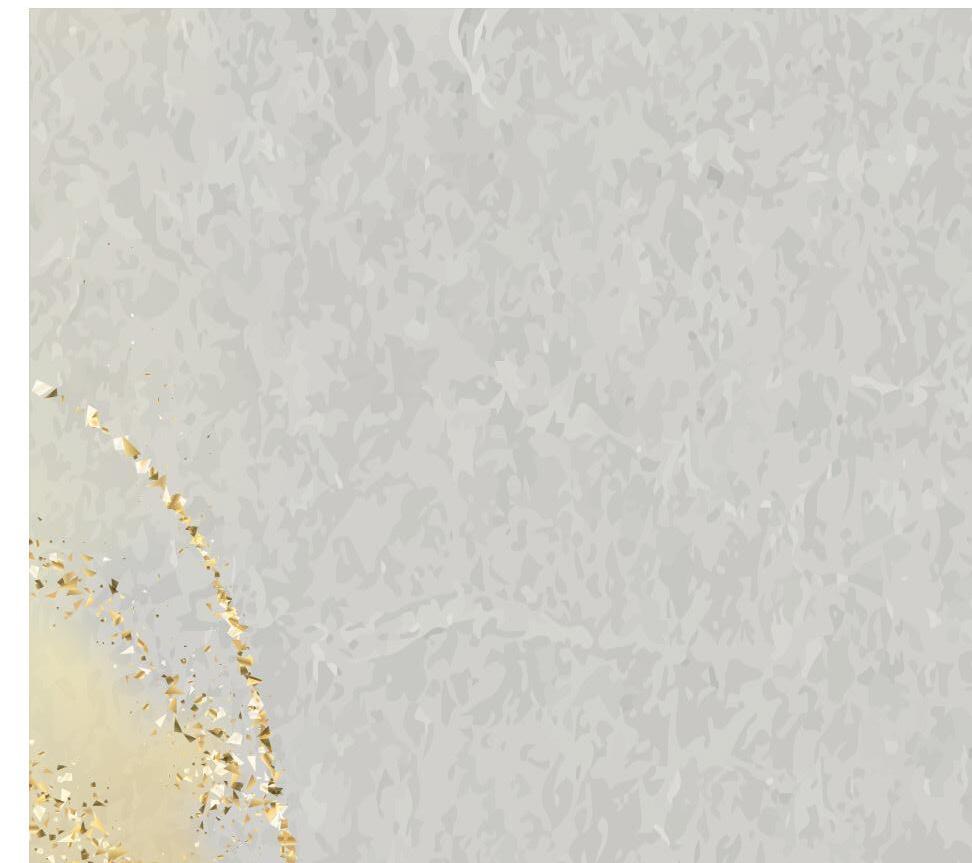
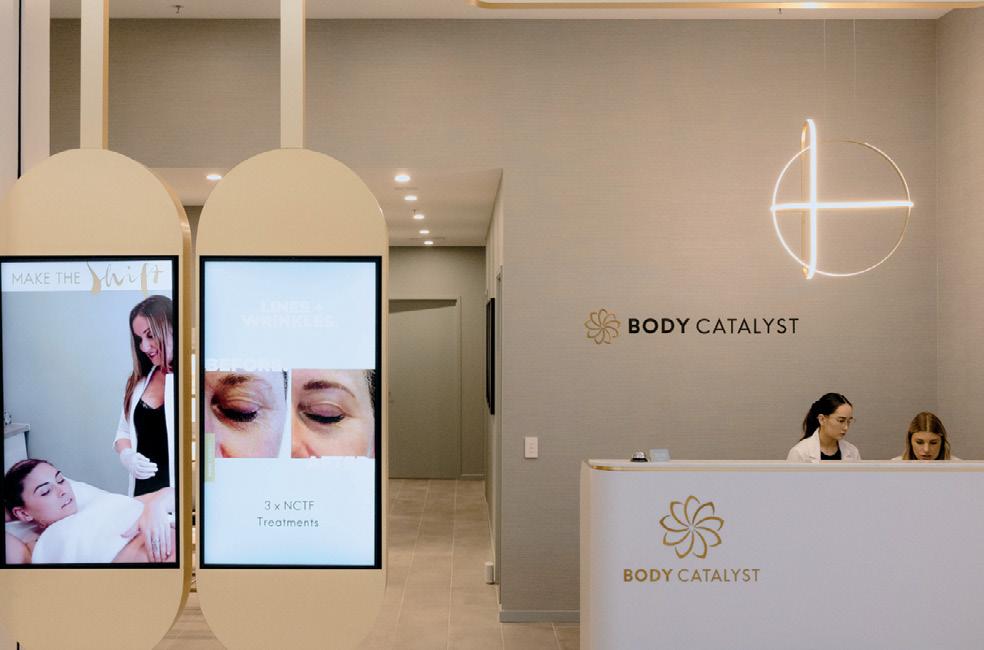



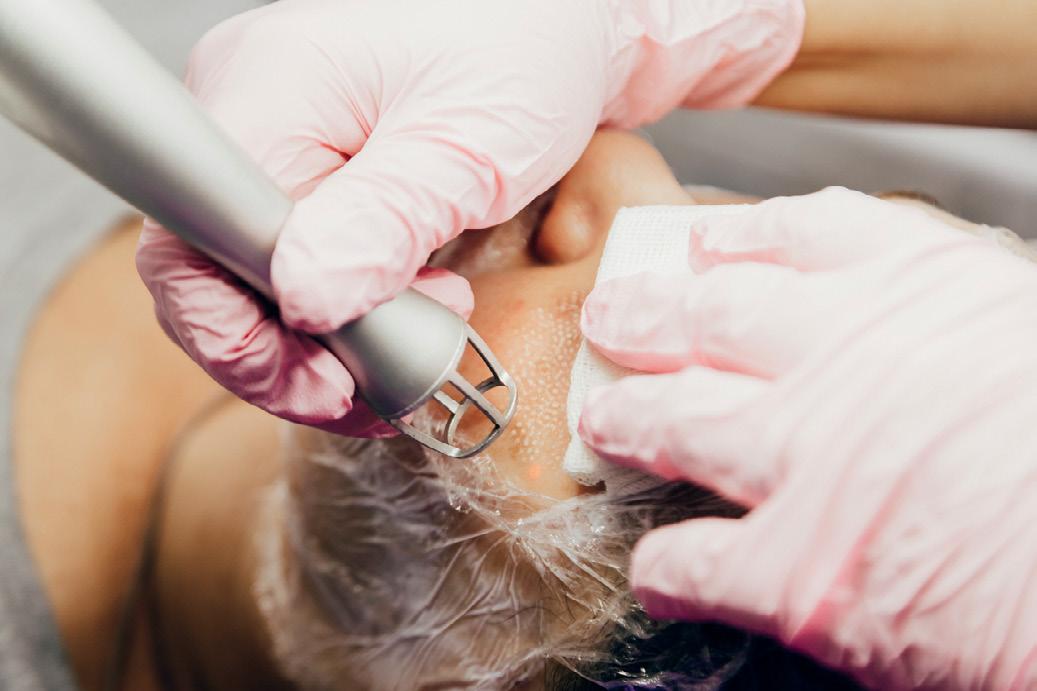


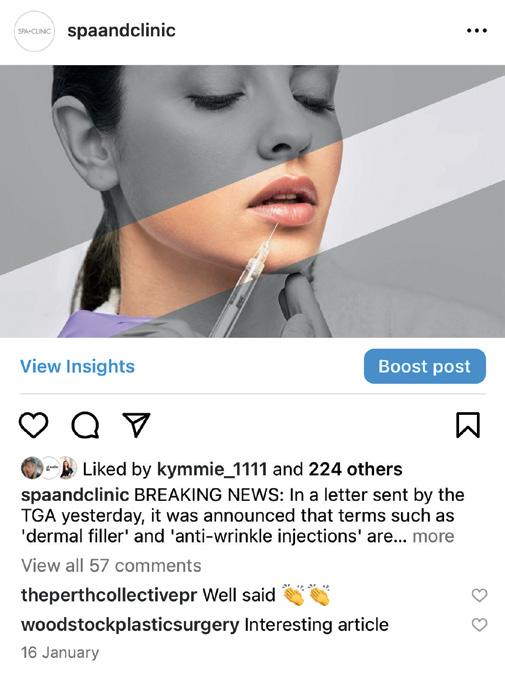



Running a successful spa or clinic means managing risks to your business. But if you only have Public Liability and Professional Indemnity insurance, you may be missing essential cover, says SALLY MACKENZIE
You work hard to make your spa or clinic a relaxing and tranquil space. But you also know that anything can happen when you’re running a small business. Broken equipment, wild weather, smashed windows… Unplanned incidents like these and others can leave you with large repair bills. In some cases, they could also make it impossible to treat your clients until the situation is fixed.
That’s why many spa and clinic owners purchase a Business Insurance Pack to help protect their beauty and wellness business. A Business Insurance Pack*, also called a Business Pack or simply Business Insurance, is a convenient and affordable way to protect your spa or clinic. These customisable insurance packages allow you to manage many business risks by bundling different types of cover. You can include only cover that makes sense for your spa or clinic, easily protecting many parts of your business with a single policy.
Business Packs can include cover for your commercial premises, business contents, equipment and stock. Australian spa and clinic owners often add these types of cover to their policies:
A standard part of most Business Packs, Public Liability insurance* is one type of cover you may already have. However, you may be able to save money by adding it to your Business Insurance Pack rather than having a separate policy.
Your therapists and technicians likely require many tools and equipment to do their jobs. Portable Equipment insurance* can help you repair or replace these “tools of the trade” your employees use for treatments.
Of course, providing beauty and wellness services is just one part of your daily business activities. You may also service clients at different locations, rely on phones to book appointments, EFTPOS readers to take payments, and computers to store client information. Electronic Equipment insurance* can help you replace the many devices that are essential to running your spa or clinic.
Money insurance* may be useful if you still do cash business. It covers cash and cheques that are stolen, lost or damaged in your salon.
Transporting deposits to the bank or temporarily storing business funds in a private residence are also covered.
Money in your till may not be the only target for many criminals. Theft insurance* helps you replace business items that are taken from your secured spa or clinic, like premium retail stock, equipment, and furniture.
If you own the building where your spa or clinic is located, you might want to consider insuring the structure itself. Building insurance* can help if your business premises is damaged or lost in a fire, storm, or other insured event.
Cover is also available for the things kept inside your spa or clinic. Contents insurance* can help you replace stock, furniture, business records, and other business items if an insured event (including malicious damage but different to theft) occurs at your business premises.
Glass
A broken mirror could cost you more than just seven years of bad luck!
Glass insurance* can help you replace windows, mirrors, and signage inside and outside your spa or clinic. It also covers porcelain and ceramics, such as toilets or basins.
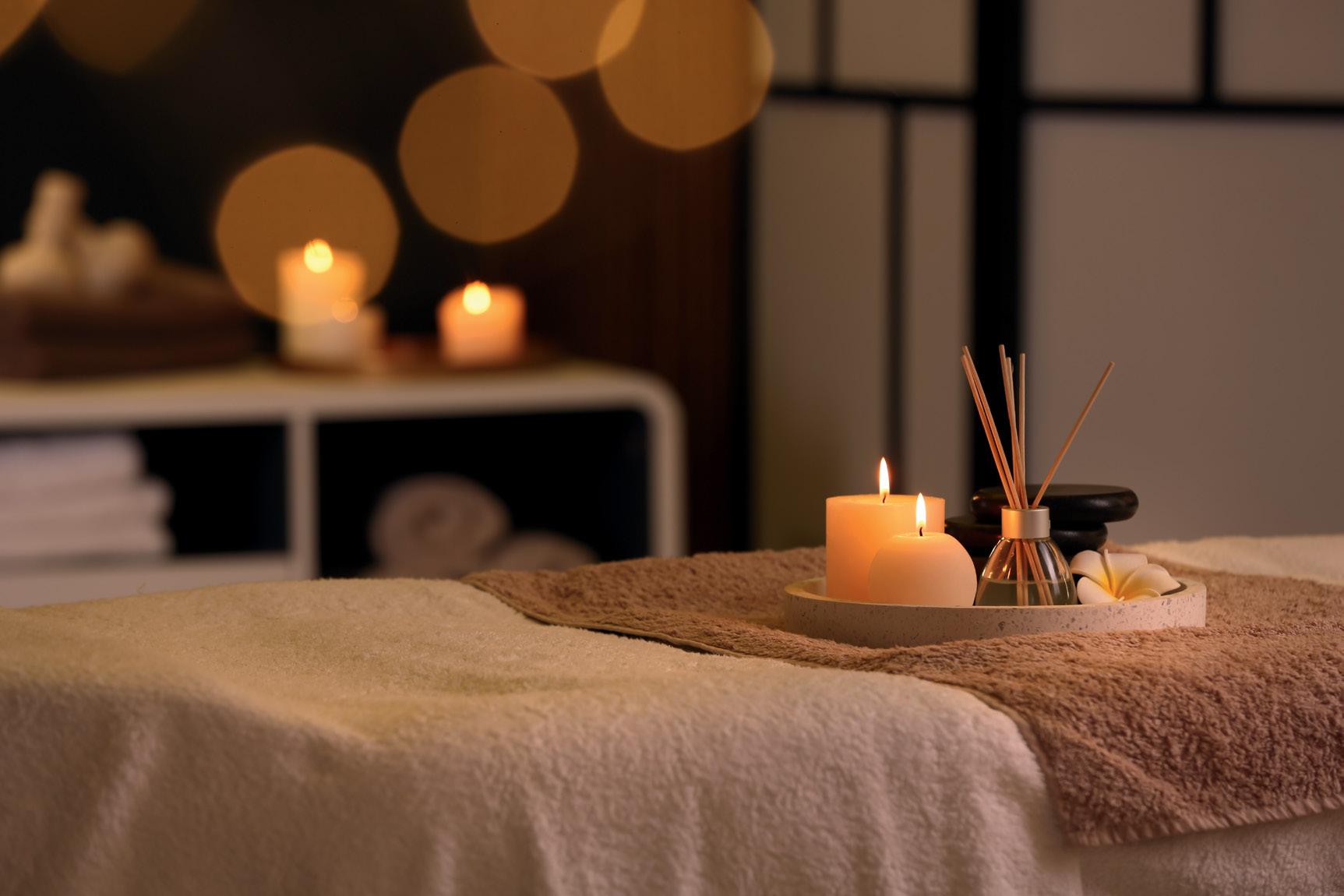
Running a spa or clinic is hard work. That’s why BizCover has made it quick and easy for small businesses to buy insurance. Compare multiple quotes and buy instant cover online in just minutes. Build a Business Insurance Pack that fits your spa or clinic’s needs, and get back to helping your clients relax and rejuvenate!
Visit bizcover.com.au today for no-dramas business insurance.
*This information is general only and does not take into account your objectives, financial situation or needs. It should not be relied upon as advice. As with any insurance, cover will be subject to the terms, conditions and exclusions contained in the policy wording.
© 2024 BizCover Pty Limited, all rights reserved.
ABN 68 127 707 975; AFSL 501769






Fake treatments, false claims, and patent infringements are a growing problem for skincare and device companies. NADINE DILONG explores the extent and consequences of fraud in the aesthetic industry.

Fraud. According to the Oxford Dictionary, a “wrongful or criminal deception intended to result in financial or personal gain.” We’ve all experienced it in one way or another, even if it’s just through those pesky scam calls from claim-to-be insurances/banks/ overdue payment collectors. Unfortunately, the aesthetics industry is rife with fraud, too, not only trying to con consumers into buying fake products and treatments, but even industry professionals are targeted.
Throughout 2023, I kept hearing about copycat devices being sold as “originals” to clinic owners; more than that, actually, I get e-mails sent to my inbox on a daily basis, mostly from Asian companies, trying to sell me filler and anti-wrinkle products of dubious origin, or body sculpting devices that look exactly the same as some of the trusted Australian companies
I work with. I hit ‘delete’ and shrug it off, but a part of me wonders how many people fall for it, and what this means for patient safety.
Then, of course, there was the Biologi court case late last year, which found that skincare brand Biologi had made false claims about its ingredients, its certifications, and innovations. “If they could do this for years, working with some of the best clinics in the industry, how many other brands are being fraudulent?” is what came to my mind immediately. So to shine a light on the many challenges brands, and therefore, their clients, i.e. industry professionals, are facing due to lies and deception, and to hopefully make you ask more questions from now on, I talked to industry to understand some of the fraudulent activity that has been happening, and how brands respond to this.
Jan Marini Skin Research (JMSR) is a US-based cosmeceutical skincare brand that prides itself on ongoing research and product development. Through studies conducted by doctors using JMSR, the brand has collated many impressive before and after images throughout the years showing the efficacy of their products. In September last year, the Jan Marini team attended a laser conference in Sydney and was shocked to see a competitor skincare brand use one of their before and after photos. We spoke to Jan Marini MD, Vivien Gardiner.
At a recent medical laser conference, we witnessed an Australian skincare manufacturer using JMSR’s licensed before and after images and presenting them as their own results. The patient who was the subject of the study did not give the infringing company permission to use their image. Neither did the surgeon who carried out the study, nor Jan Marini Skin Research, Inc, who commissioned the study.
The attributions to the study author, Jan Marini products used and identifying features in the images had all been cropped out. It was only by chance we discovered this. We wondered how often the infringing company had been doing this and to which audiences? The audience we were with on the day included doctors, nurses and dermal clinicians who
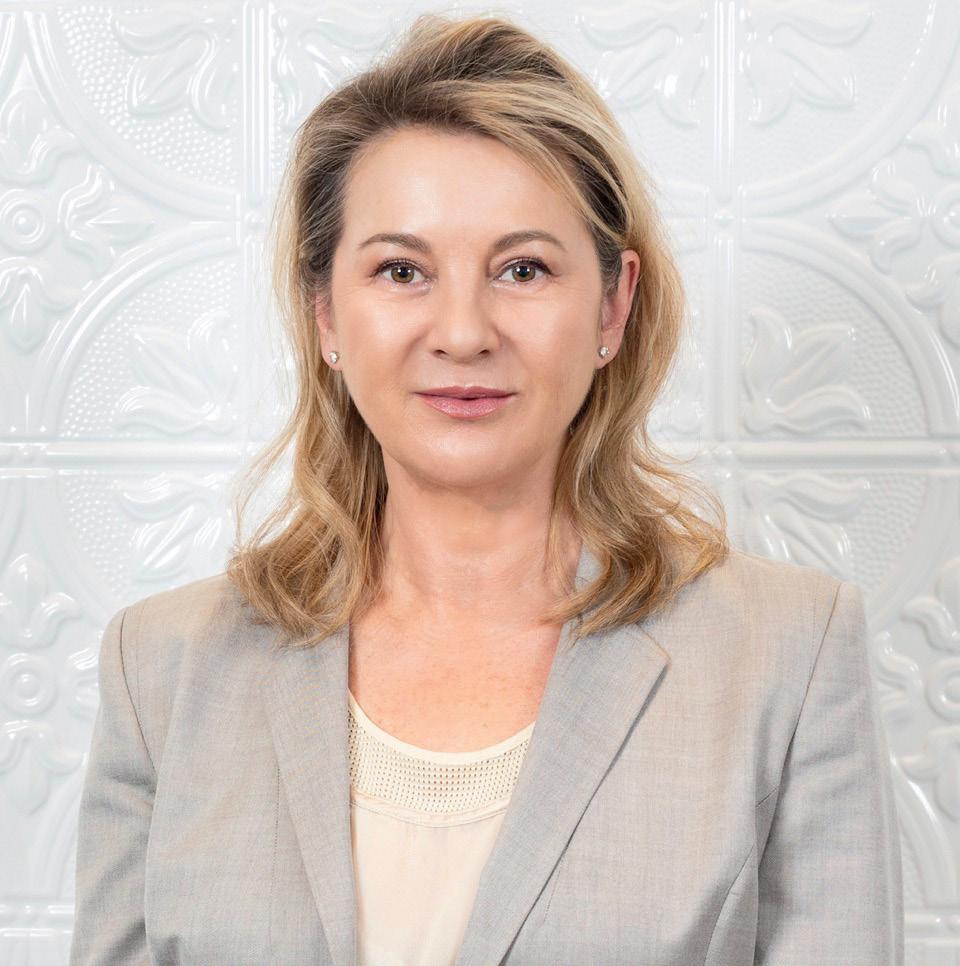

are all trained to expect that the use of before and after images above a brand logo is an illustration of the results obtained with that brand.
In-house counsel at Jan Marini Skin Research (JMSR) in the US described this conduct as “outrageous”. As a scientific brand, with exceptional scientific credentials, we all found it extraordinary that a skincare manufacturer supplying the aesthetic medical space could be so unscientific.
We asked that the CEO of the offending company contact us. When we didn’t hear anything, together with in-house counsel at JMSR HQ, we engaged Australian lawyers who wrote with our demands. Eventually, and only on threat of legal proceedings, a Deed of Undertaking was provided.
The infringing company claimed their staff found the image online already cropped and used it for illustrative purposes only. This is central to the problem. Scientists, doctors, nurses and dermal clinicians all recognise the convention that where no explicit attribution is made when presenting before and after images with a company logo clearly displayed, then the results shown must be attributable to that brand. Across all tertiary and senior secondary education in Australia, intellectual integrity and the importance of not plagiarising another’s work is embedded in the curriculum.
Even if we take the company claims at face value – that the images
Laboratoires FILLMED has designed, developed and marketed anti-ageing products for medical aesthetic professionals since 1978. One of their key products is their NCTF range, an injectable product which helps improve the quality of the skin through a patented combination of enzymes, vitamins, and acids. We spoke to FILLMED’s Regional Marketing Manager (Asia Pacific-Central & Eastern Europe), Min Zionh, to understand how they combat fraudulent copies of their products being sold.
Do you, as a company, experience attempted fraud in the industry, i.e. are there ‘fake’ NCTF products being sold?
Yes, we had fraudulent NCTF 135 HA in the United Kingdom. At the time we were made aware by our subsidiary in the UK of this. In this particular case, the fraudulent product was sold through a website.
Please explain the impact this potentially has on you as the company and the risks involved for practitioners. To combat fraudulent product as a company, FILLMED have added a layer of security on the packaging box of the products. The technology used is a prooftag, it ensures the product’s authentication. The use of a fraudulent product is very risky, because the content of the box, and the product could be potential dangerous and not stable in formulation. Our security measures with the prooftag allows every practitioner the ability to check the authenticity when purchasing. In Australia, Cryomed Aesthetics are the only distributor of FILLMED products – it’s always advisable for practitioners to ensure they are liaising only with the authorised distributor when taking on a brand.
were found randomly on the internet and used to illustrate a skin condition and how it can be corrected – then the presenter should have acknowledged those facts during the presentation. To not do so is misleading the audience.
What are the consequences of a brand claiming before and after photos as their own, when they are not?
For the infringing company, the consequences are reputational and potentially disastrous. It suggests they are either incapable of carrying out their own clinical studies, or if they are, they are not achieving results. Plagiarising before and after images is going to be found out eventually, which in this instance it has.
The issue is not just the intellectual property theft, which indicates a ruthless “sales at any cost” culture, but that the market is being misled into believing such results are possible using a particular brand’s products. What a waste of time for practitioners and waste of money for consumers.
The consequences for JMSR are not insignificant. We now have to be hyper-vigilant in regard to representations made to the market to ensure the integrity of our intellectual property assets. At the core of our professional standard lies the principle of intellectual honesty. Plagiarism of one company’s research and findings by another, without attribution or acknowledgment, is illegal and highly unethical. It’s up to each of us as health professionals to ensure the highest standards are maintained. Otherwise, it’s just a race to the bottom.
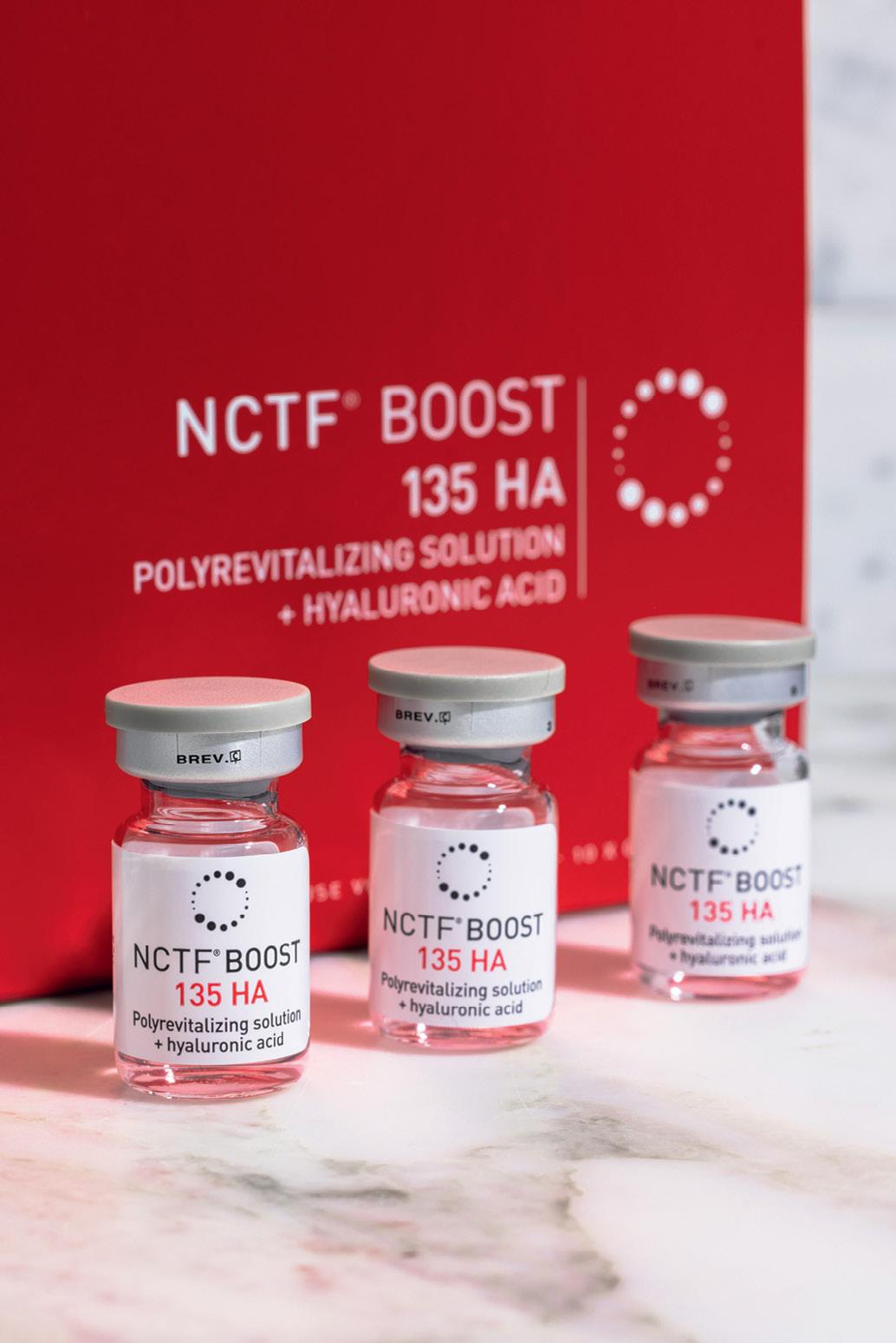
Are you actively doing anything to prevent fraudulent activity?
Yes, as mentioned above FILLMED has now placed a prooftag on every box of NCTF Boost 135 HA. This prooftag needs to be scanned in order to check the origin of the product, the information regarding the scan of the prooftag and its use are found in the instructions for use of the product.
FILLMED is also currently working to implement an anti-fraud campaign to prevent the circulation of fraudulent products and raise awareness on the importance of, firstly the prooftag, and secondly to avoid any purchase of the products on foreign websites. FILLMED does not sell NCTF Boost 135 HA products to the general public – it is a professional use product only.
What is your advice for practitioners who might not know whether they have bought an authentic product?
Every practitioner must use the prooftag in order to check the authenticity their FILLMED NCTF Boost 135 HA product. FILLMED have created a website exclusively for authenticating products https://fillmed.com/authenticity/
Hydrafacial has become one of the most requested and performed facial treatments worldwide in the past few years. The combination of a deep exfoliation and nourishing infusion leaves customers with glowing skin that is unrivalled. It’s not surprising that similar devices have popped up on the market promising the same results, but this has resulted in many breaches of trademark uses and false claims. We chat to Hydrafacial’s Marketing Direct ANZ, Kate McGrath.
Can you briefly explain any patents/trademarks
Hydrafacial has, i.e. why other brands can’t call themselves ‘Hydrafacial’?
Hydrafacial have 83 existing patents, with another 49 patents pending worldwide. These patents apply to Hydrafacial’s unique design features, exclusively only to Hydrafacial. Hydrafacial registers their Intellectual Property in all markets so use of the words Hydra Facial, Hydrafacial and its variations, including HydroFacial and Hydro Facial, are considered in Australia and New Zealand as infringements of our Intellectual Property rights and are actionable under law. The same applies to images of the Hydrafacial device, our treatments and our spokespeople and influencers. Features, words and images are all protected from use by trademark and consumer protection law. Hydrafacial trademarks also include ‘3 Steps to the Best Skin of Your Life’, ‘Vortex-Fusion Technology’, ‘One Device. Endless Opportunities’ and ‘Cleanse, Extract, Hydrate’.
Some customers believe that Hydrafacial is a generic treatment name, like ‘laser’ or ‘IPL’. It’s definitely not. And we have had other ‘hydro microdermabrasion’ owners say that they own a Hydrafacial and when questioned, it’s not a genuine device but they say it’s the same. The law says otherwise and if it was the same, other companies would not need to use our premium, established brand name to sell their own device.
We see actions that range from the use of our brand images and trademarks on social media and digital marketing, sales reps telling customers they are buying a Hydrafacial device during their calls, right through to a supplier selling a device with a Hydrafacial name on the actual machine. One supplier has told customers it’s OK to use our brand name and materials in their marketing campaigns, and those owners are at risk of legal action, whist the supplier takes none of that risk themselves.
Sadly, some customers are deceived by these frauds to the point that owners have booked our training sessions believing they’ve purchased a genuine Hydrafacial, and are shocked when they discover the supplier has misled them.
Moreover, we regularly receive requests to purchase our solutions and boosters, and enquiries whether they fit into non-Hydrafacial
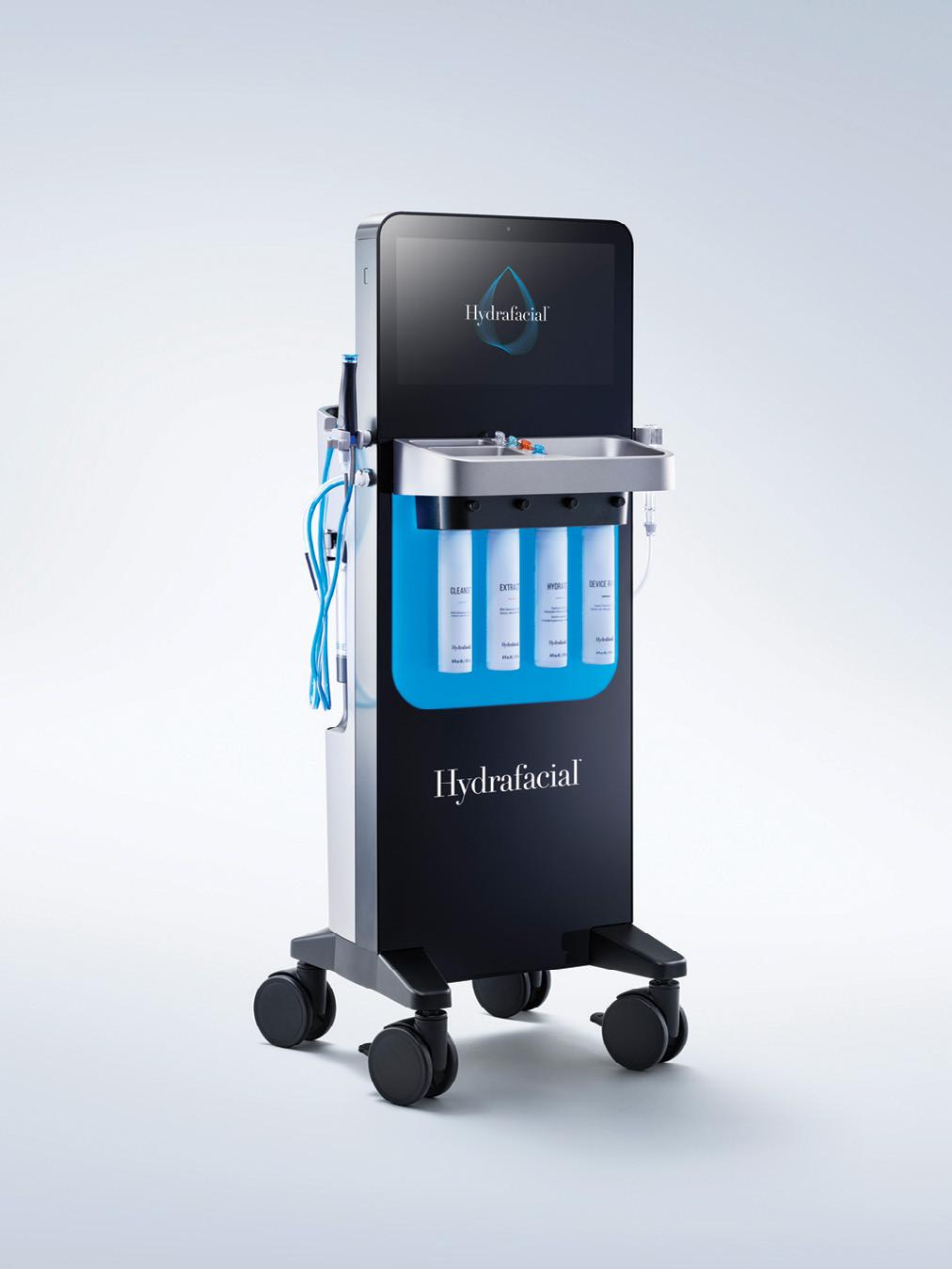
increase in requests to purchase these famous-name products because we have generated such awareness with consumers.
What are the risks involved for a practitioner using a ‘fake’ Hydrafacial?
If a clinic uses our brand to promote their non-Hydrafacial treatments to consumers, it’s considered misleading advertising and is something that is actionable under Consumer Protection Law. We actively search for misuse of our brand and our legal team take action so we protect legitimate Hydrafacial device owners. If taken further, that could potentially result in a financial penalty on the clinic and some very bad PR.
In terms of devices, we actively and regularly review the market and take action against wholesalers who are using our brand to sell an inferior device. Our consumables are built with RFID chips to ensure genuine solutions and boosters are used, this is because the Hydrafacial experience is the combination of the device technology and the solutions and boosters – not just use of the device. Our global and local teams take legal action with wholesalers who infringe our brand name, and with clinics who use our brand fraudulently as this constitutes false and misleading advertising for patients who believe they are receiving a genuine Hydrafacial treatment.
How can a practitioner, but also a consumer, know they are getting a genuine Hydrafacial treatment?
For practitioners who are purchasing, we are a global brand and easy to find; the local website has all our contact details and clinic owners can call the office or drop us an email at info@hydrafacial.com.au.
Because Hydrafacial sell directly into Australia and New Zealand, this is the place to find us – we are still associated with High Tech Medical but not with any other device supplier, so if clinics are dealing with
In October 2023, bombshell news broke that skincare brand Biologi had been found guilty of making false claims about their ingredients, leading to an order to publish eight corrective notices. We talked to Cosmetics Regulatory Expert, Jennifer Rudd, to unpack what this means for Australia’s largely unregulated skincare industry.
Can you sum up what the Biologi case is about and why it is such a pivotal moment in the skincare industry?
This landmark court case involving skincare company, Biologi, and associated ingredient supplier, Plant Extracts, found the companies guilty of making numerous false and misleading claims. These included false representations about high levels of Vitamin C content in certain products, and products being ‘pure plant’ and single ingredient, when they were found to also contain glycerine and be diluted. It’s the biggest thing to ever happen in the Australian skincare industry – or at least in the eight years I’ve been in it!
It’s a pivotal moment because it shines a light on the need for better transparency in the skincare industry. For years, skincare brands have been operating in a space where marketing often blurs the lines between fact and fiction, and consumers have had to navigate these murky waters. It’s time for a new era of ‘clear beauty’, which will pave the way for a more ethical and trustworthy skincare industry. And that’s a win for everyone – brands, consumers and regulators alike.
What do you think is going to happen to the brand –can they recover from this?
I think the future of Biologi is really up in the air at this point – only time will tell. Sure, they might retain some of their loyal customers, but there seems to be a growing number of customers expressing disappointment online and talking about switching to other brands. The decision by several major retailers to drop Biologi products would likely be another big hit to their business. Trust is so hard to rebuild once broken, especially when we’re looking at a series of long-term issues, not just a one-off mistake. And frankly, I think their response to the court findings probably hasn’t helped the situation much either!
Do you think there are more well-known skincare brands out there that are making false claims?
While I’d like to think that most brands are being honest and ethical, the reality might be a bit different. The skincare industry is highly competitive, which means there’s always a temptation for brands, including well-established ones, to stretch the truth too far in their marketing. Hopefully this case serves as a wake-up call! It’s not fair to
another company, they won’t be buying a genuine Hydrafacial.
For consumers who are seeking treatment, Hydrafacial spends millions globally each year on promoting the brand, so we understand how much our brand name is worth. And customers do as well – we have tens of thousands of hits to our practitioner-finder every month –these are new customers looking for a local Hydrafacialist. Our genuine owners are listed there and this year we will launch our ‘Verified Partner’ campaign to help differentiate our customers from other clinics.
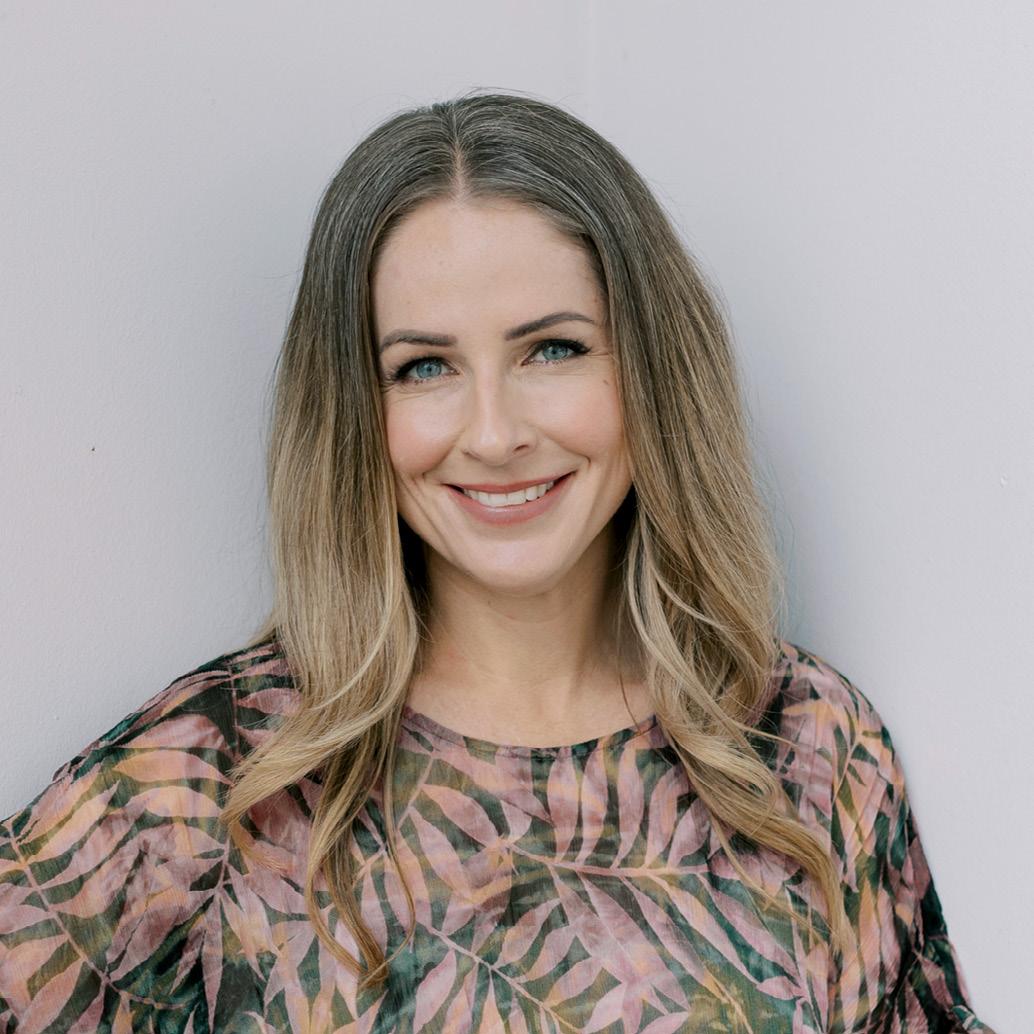
the honest brands when other brands are making false claims to boost sales – everyone should be playing by the same rules.
Why is it so easy to get away with fraud? Is no one actually checking a skincare brand’s claims?
The main issue is that the ACCC, the regulator, simply doesn’t have the resources to check every single claim out there, even when they’re reported. We’ve seen little enforcement from them in the skincare industry over the last five years. However, it’s encouraging to see the ACCC focussing on greenwashing lately, so I’m hoping we’ll see more action soon – but it needs to go beyond just environmental claims to deter brands from making other false claims.
Until that happens, it’s essential for brands to take the lead in acting with integrity and being transparent about their claims. This is where regulatory experts, like myself, come into play. We work with brands to uphold ethical standards and ensure compliance, verifying that their product claims are accurate and supported by solid evidence.
How can a clinic owner/practitioner check if a skincare brand’s claims are true?
As a clinic owner, you want to be able to trust what brands tell you, but it’s always smart to do your homework. If something sounds too good to be true, it often is. So, don’t be shy to ask for the proof behind big claims, like ‘100% natural’ or ‘certified organic.’ A brand should be able to back up their claims without getting defensive. If they can’t, well, that’s a red flag right there!
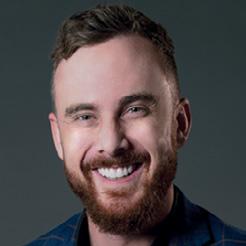
Contour Clinics has grown from one to five clinics in five years. We chat with DR JOSH WALL to learn about his successful business strategy.
Dr Josh, as Medical Director of five clinics, tell us what your vision for Contour Clinics was when you opened the first clinic in 2018, and how your vision may have evolved. In 2018 when I established Contour Clinics, my vision was centred around creating the most comprehensive doctor-led clinic with a national presence across all states. It was crucial to me that our clinic became synonymous with experienced and trusted doctors and nurses, ensuring that our patients receive the highest quality care. Beyond the clinical aspect, I was equally committed to fostering a great workplace culture, understanding that a positive and collaborative environment would contribute to our overall success. Over the years, this vision has evolved, guided by a commitment to continuous improvement and the everchanging landscape of medical aesthetics. Our journey has been shaped by the dedication of our team and the trust of our patients, driving us to exceed expectations and maintain our position as a leading force in the field.
Do you have a business background?
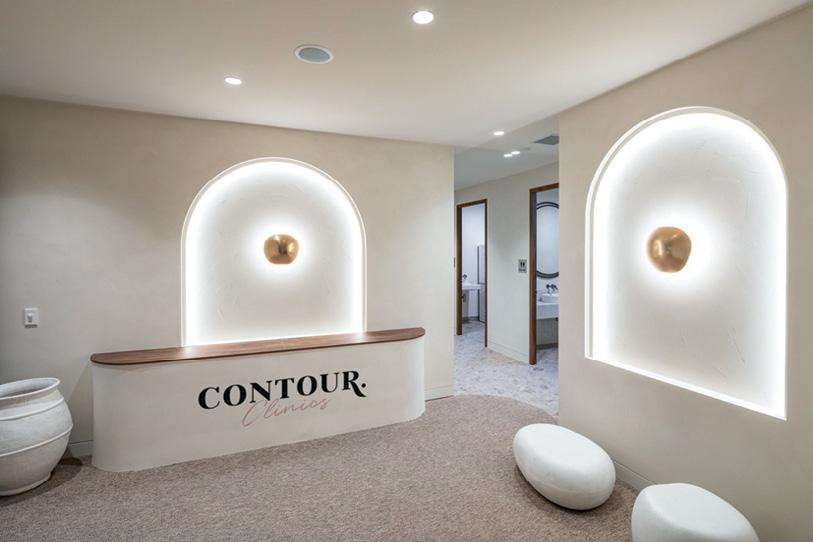
tests and considering the socio-economic status of the areas under consideration. This ensures each new clinic is in the best possible location, aligns with our vision and caters to the diverse needs of our patient demographic.
Why is it important to you that Contour Clinics are “doctor-led” and what exactly does this mean for patients?
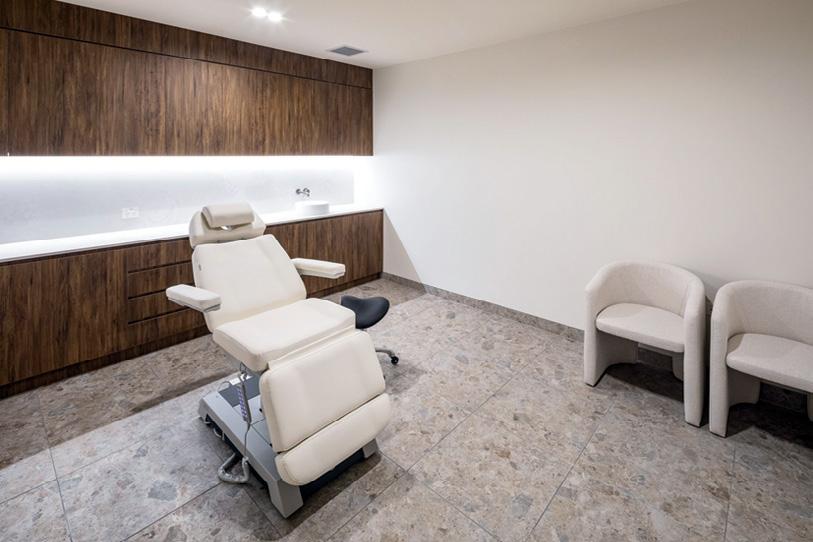

I do have a business background but I mainly concentrate on the clinical side of the practice. My business partner has an MBA and provides us with invaluable expertise in strategic business management and operations. We’re a great team and this partnership model has allowed us to divide responsibilities – it’s been instrumental in the growth of Contour Clinics.
At what point did you know it was time to open the second clinic?
We knew it was time to open a second clinic when we felt we had hit capacity at our first clinic in Five Dock and had actually created an overflowing bucket of potential patients. We knew we had that customer base already there, so we were ready to open a second clinic to keep up with the demand.
How do you decide on the locations for a new clinic?
When selecting new clinic locations, we adopt a strategic approach by assessing the success of existing clinics, conducting thorough population
The commitment to Contour Clinics being “doctor-led” is rooted in the principles of safety, trustworthiness, and prioritising patient well-being. Despite the potentially more profitable route of running a nurseonly clinic, our dedication to patient care necessitates having a doctor on-site. This ensures we can manage complications effectively and foster an environment where patients with complex medical backgrounds feel secure and well-cared for.
What has been the biggest challenge?
Undoubtedly, the biggest challenge we’ve faced has been navigating the impact of the COVID-19 pandemic, coupled with the rapid growth experienced by the clinics. By November 2021, we were treating 1,000 patients monthly, and just two years later we are now treating 5,000 patients a month. This growth means recruiting more staff and finding the right people can be tricky – we want to ensure every person we hire aligns with our business values and commitment to excellence.
What is the most popular treatment at your clinics?
Anti-wrinkle procedures are by far the most popular treatment at Contour Clinics.
In 2024 we are excited to announce plans for new clinic locations, marking a strategic expansion to bring our services to more locations. These initiatives reflect our ongoing commitment to providing accessible, top-tier medical aesthetic treatments while maintaining the highest standards of care and professionalism.
Dr Josh Wall is the Medical Director of Contour Clinics. contourclinics.com.au

love what they do, they want increased financial reward and more freedom in their lives. Often, they end up working more and seeing less financial benefit due to a gap in knowledge, not having the right tools and frameworks to manage the business finances.
If that feels like a summary of what’s happening in business, let me introduce you to Profit First. Profit First is a method gaining popularity due to its effectiveness in enhancing the financial health of thousands of businesses. Developed by author and entrepreneur Mike Michalowicz, Profit First redefines the traditional accounting formula, prioritising profit and offering a simple yet powerful process for gaining money confidence and improving overall financial performance.
Spa and clinic owners, driven by a passion for delivering exceptional services, often find themselves caught in the daily whirlwind of client interactions, staff management and business operations. Financial management tends to get sidelined, creating stress, overwhelm and less financial reward.
Profit First provides clarity and a framework that helps business owners break free from the month-to-month cycle. Once implemented, a business owner can be on top of their finances in under 30 minutes a week. By prioritising profit, spa and clinic owners can improve their financial health, create buffers for unforeseen challenges while sustainably growing their businesses. The Profit First method brings four key principles that can be implemented for greater financial reward personally, increased profitability and the sense of peace that comes from knowing the business finances are under control.
1. Separate Accounts:
The act of separating business funds into designated bank accounts for profit, owner’s pay, business expenses and taxes provides visibility and prevents overspending. This predetermined separation creates a simple cashflow process that reduces financial stress and ensures that each aspect of the business receives the attention it deserves.
2. Know The Priorities:
Profit First encourages setting aside profit as the first step in a business owner’s cashflow management process, which makes it a natural priority. Similar to choosing healthier food options by consuming salads
and veggies first, prioritising profit becomes a habit. Spa and clinic owners naturally find the most profitable ways to run their businesses and often notice innovation and creativity is fostered as a result. Profit becomes central to how the business is managed and developed.
3. Remove Temptation:
Just as one removes tempting snacks from the kitchen to promote healthier choices, in Profit First money is set aside for profit “out of sight and out of mind.” Ensuring that profit remains untouched until it’s time to reap the financial rewards, aligning with the business owner’s bigger financial goals. This means keeping a profit account in a separate bank to the businesses main banking platform.
4. Create a Rhythm:
Establishing a rhythm for managing the business finances keeps a finger on the pulse of the overall performance of the business. It prevents reactive financial decisions and provides confidence that cashflow is working as intended. Similar to eating frequent, smaller meals to avoid overeating, Profit First’s rhythmic approach helps spa and clinic owners maintain control and avoid typical stressors such as tax time or overspending in flush months.
The Profit First method is not just a financial strategy; it also creates a mindset shift that empowers spa and clinic owners to take control of their business financial performance. My client Kate was feeling stressed and overwhelmed with money management in her business. After implementing Profit First she commented how simple the process is, that her confidence has grown and the peace and freedom she now feels with increased profit and financial cushions in place and the ability to make informed financial decisions and investments in her business.
By prioritising profit and implementing a structured approach to financial management, business owners can build resilient, sustainable, thriving businesses in the competitive health, beauty and medispa space.
Remember, just like the technical aspects of the service provided to clients were learnt, learning the skill of money management is the same. It is a skill that can be developed and implemented by anyone who is willing to put the time in and fulfil the ultimate vision for their business. Don’t be afraid to bring in help and watch your business transform into a highly profitable, rewarding and sustainable company.
Laura O’Hagan is a Profit and Growth Consultant dedicated to helping health and beauty business owners create greater financial success.
laurajohagan.com

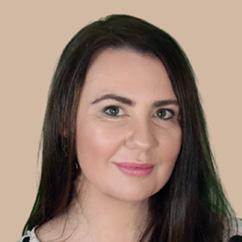
ABIC’s Nicole Montgomery shares eight reasons why diversity can only be positive for your business.
Diversity within a team brings together individuals with varying backgrounds, experiences, and perspectives. This rich tapestry of ideas and viewpoints is a breeding ground for innovation and creativity. When employees from different walks of life collaborate, they bring fresh and unique ideas to the table. This diversity of thought can lead to ground breaking solutions, products, and services that set your company apart from the competition. In diverse teams, you find a blend of expertise, cultural influences, and problem-solving approaches that spark innovative thinking. This dynamic environment encourages employees to think outside the box, consider unconventional solutions, and push the boundaries of what’s possible.
An inclusive workplace is more likely to have engaged and satisfied employees. When individuals feel valued and respected, they are naturally more motivated to give their best to the organisation. High employee engagement is not just about productivity; it also contributes to a positive workplace culture, which can significantly affect your company’s success. Engaged employees tend to be more committed, less likely to leave their jobs, and more enthusiastic about their work. This means lower turnover rates, a more stable workforce, and increased overall productivity.
Diverse and inclusive businesses can better connect with a broader customer base. Understanding and catering to the needs of diverse demographics is a key factor in expanding your market reach and increasing competitiveness. This, in turn, leads to higher revenue and growth, which are essential for business success. In a globalised world, your customers come from various backgrounds, cultures, and perspectives. A company that can resonate with and address the needs of these diverse groups will have a significant advantage over competitors that do not embrace diversity and inclusion. This adaptability allows you to tap into new markets and seize opportunities that might have otherwise been overlooked.
Diverse teams are known to make better decisions. When people with different backgrounds and perspectives come together to discuss and solve problems, it leads to well-rounded, comprehensive decision-making. This diversity of thought helps in avoiding groupthink and making more informed choices. Inclusion of a variety of perspectives can be a powerful tool for avoiding biases and ensuring that all aspects of an issue are considered. This, in turn, leads to better problem-solving and more effective decision-making. When critical decisions are made with a wide array of inputs, they are more likely to be sound, balanced, and aligned with your business goals.
Organisations that prioritise diversity and inclusion tend to attract
the best talent. Talented individuals often seek out workplaces where they feel respected and valued. This competitive advantage can significantly impact business success, as the quality of your team has a direct correlation with the quality of your products and services. In a competitive job market, attracting top talent is a critical factor in driving business success. The best minds in the industry are more likely to be drawn to organisations that embrace diversity and provide an inclusive environment. By making diversity a focal point of your recruitment strategy, you’re ensuring that you’re not only attracting the best but also setting your organisation up for ongoing excellence.
Depending on where you are based, diversity and inclusion are not just good practices but might be legal requirements. Failing to comply with diversity regulations can lead to legal issues and damage a company’s reputation. By actively promoting diversity, businesses can ensure they meet all legal and ethical obligations.
Consumers are becoming increasingly conscious of the values and principles upheld by the companies they support. Businesses that champion diversity and inclusion not only appeal to a broader audience but also create a positive brand image. This goodwill can lead to customer loyalty and trust, which are indispensable in the competitive business landscape. A strong reputation and positive brand image are powerful assets for any company. They can differentiate you from competitors, foster customer loyalty, and help you weather challenging times. A business with a reputation for inclusivity is likely to draw more customers and partners, contributing to its long-term success.
The world is becoming more diverse, and businesses must adapt to this change. Embracing diversity and inclusion prepares organisations to thrive in an evolving global landscape. Those who resist change, risk becoming irrelevant or facing reputational damage. In the face of globalisation, rapidly changing demographics, and evolving customer expectations, businesses that are agile and open to diversity will thrive. Embracing diversity ensures that your company remains relevant and resilient, ready to seize emerging opportunities.
The benefits of diversity and inclusion in business are undeniable. From driving innovation to expanding market reach and fostering employee satisfaction, it’s clear that these principles are essential for achieving longterm success. Embracing diversity and inclusion isn’t just a strategy for outranking the competition; it’s a pathway to building a stronger, more resilient business that can thrive in an ever-changing world.
Nicole Montgomery is ABIC’s partnerships, marketing, and events manager. Theabic.org.au

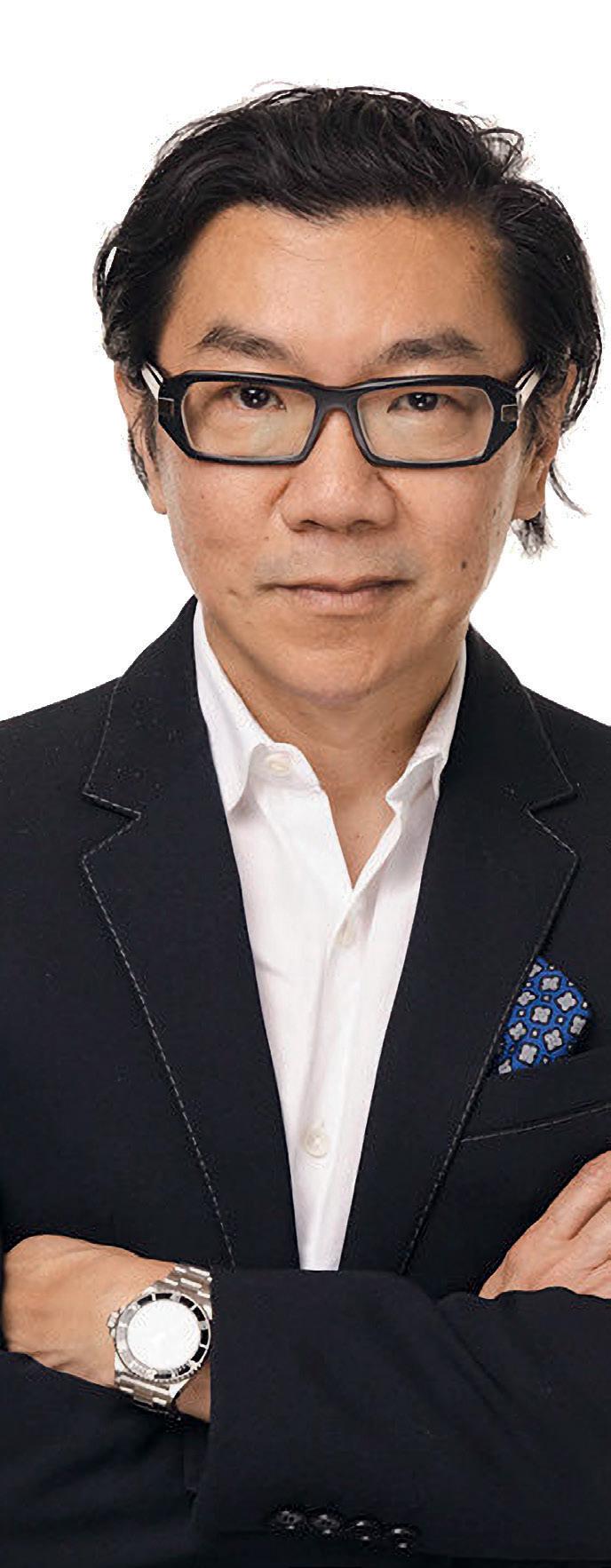
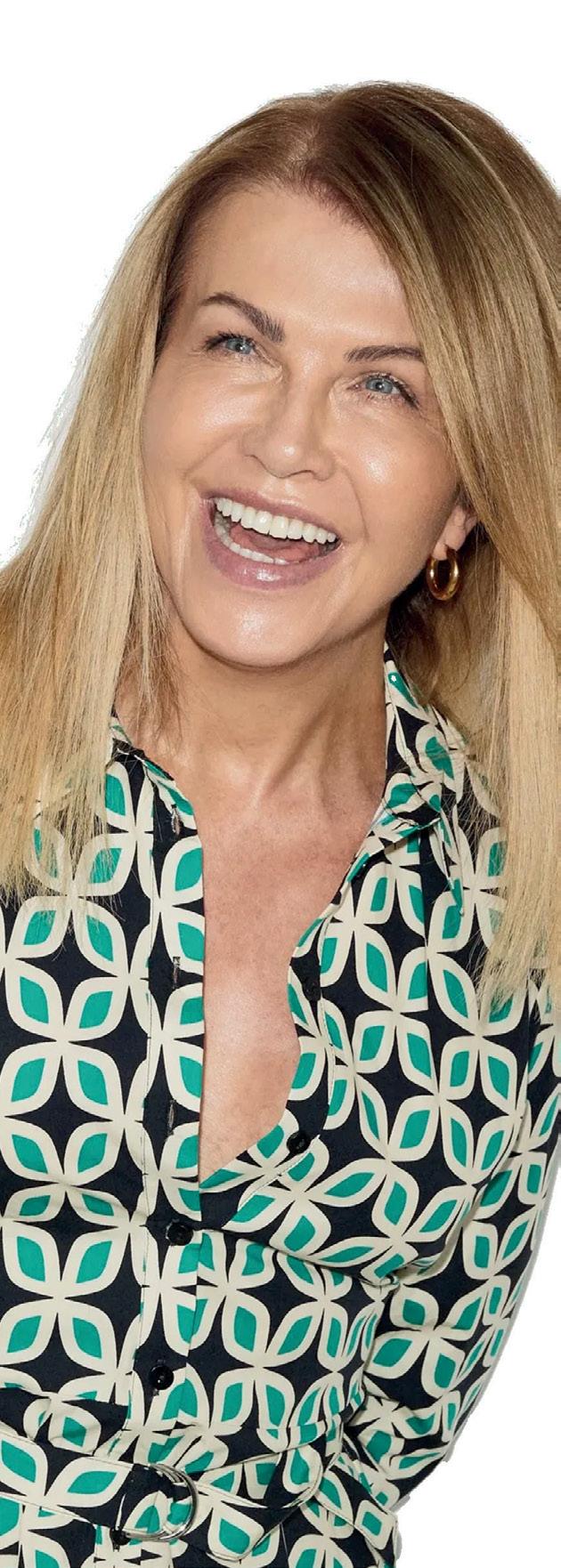


Incorporating inclusive practices into your business for some is second nature, and for others takes courage and intention. The result: a business that ensures that no matter who walks through the doors, they will be seen, be comfortable and be cared for.
James will be joined by three practitioners who will share their unique prespective on how they have overcome diversity and channelled their experience into practices that champions inclusivity and customer care best practices.
https://events.humanitix.com/elevate-24-abic-education-conference
STEVEN LIEW PETA FRIEND JAMES VIVIAN AGNES DUBEMeet Nurse Jodie, a healthcare professional turned aesthetics expert, leading a thriving clinic on the Sunshine Coast. Recently, she introduced Candela’s cutting-edge Matrix™ system. Dive into the transformative impact this new addition is having on Nurse Jodie’s patients, team, and the overall success of her business.
Q: Can you share a bit about your background and journey into nursing?
A: I go by Nurse Jodie, and my nursing career began back in 1987, right after high school. Initially, I started as an assistant in nursing and later pursued my Diploma of Enrolled Nursing, then later my Bachelor’s degree. Over the years, I’ve had the privilege of working in a variety of nursing specialties, including general surgery, ENT, gynaecology, renal, and orthopaedic wards. These areas have provided me with a diverse and fast-paced nursing experience, mainly focused on caring for both pre and post-operative patients. I’ve thoroughly enjoyed the dynamic nature of this work; it’s never a dull moment.
Q: How did you transition into the aesthetics industry from your nursing career?
A: About 12 years ago, I came across a cosmetic clinic advertising positions for a cosmetic nurse and a beauty therapist. Although I hadn’t previously worked in this industry, I had completed my diploma in beauty therapy during a maternity leave 15 years prior. With a keen interest and the desire to learn both roles, I applied for the positions and was fortunate enough to work with a remarkable team of doctors, nurses, and therapists, performing skin treatments for patients. Little did I know that this experience would pave the way for me to eventually establish my own clinic.
Q: Tell us about your clinic and how it evolved over time.
A: Our clinic, situated in the picturesque Sunshine Coast of Queensland in Minyama, started as a small venture about five years ago. We began by renovating a three-room space, giving it a fresh look with new paint and flooring. Initially, it was a nerve-wracking endeavour, not knowing how we’d survive and grow. We offered services that we were confident in, and gradually, our clinic began to flourish.
Q: What types of treatments are currently in high demand among your patients?
A: Patients often seek treatments that help them look and feel more youthful or maintain their current appearance. They’re interested in slowing down the ageing process, and we typically categorise our patients into three groups: the preservers, the preventers, and the reversers. A popular and versatile treatment that addresses all these categories is Matrix™ Pro RF microneedling. This treatment preserves,
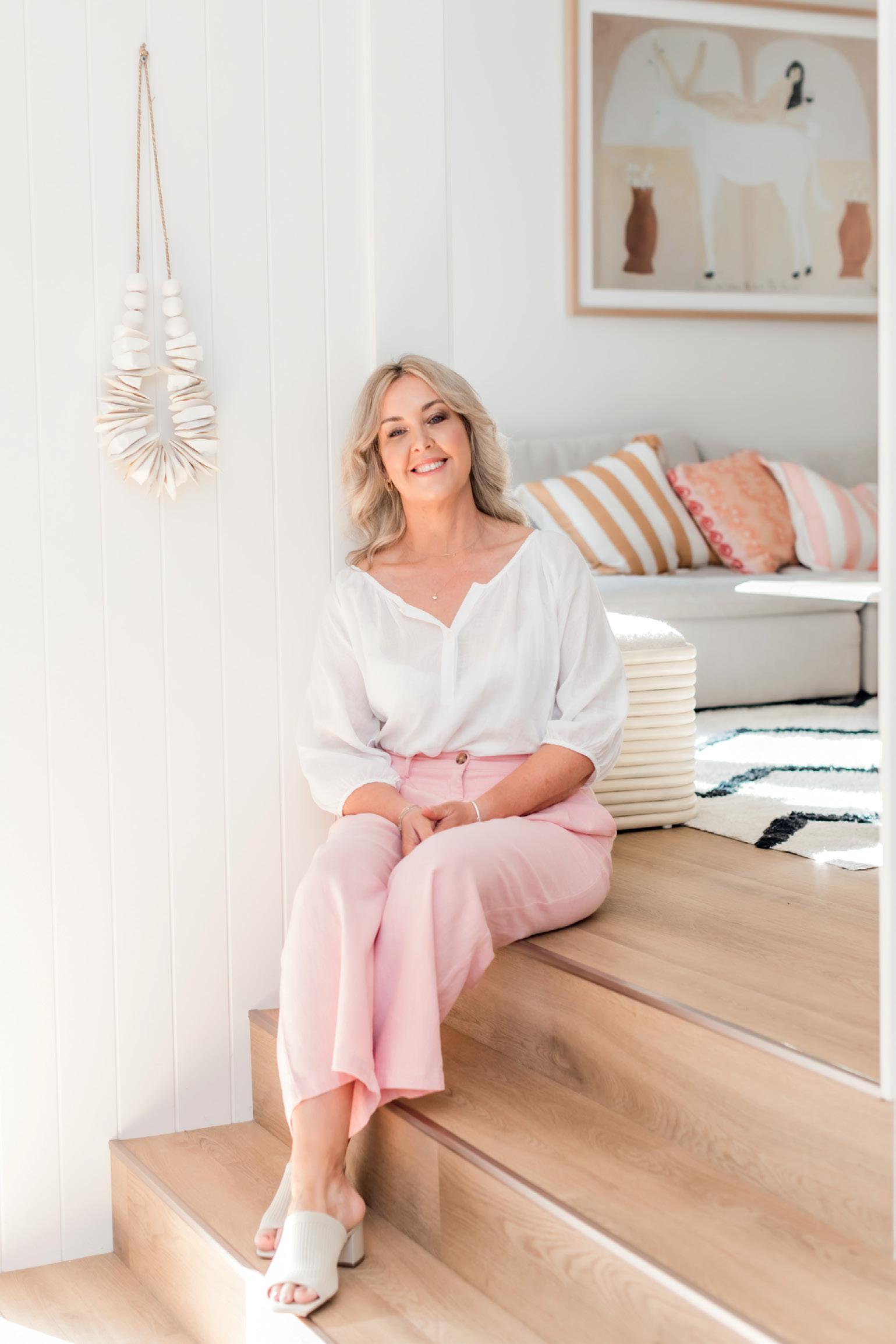
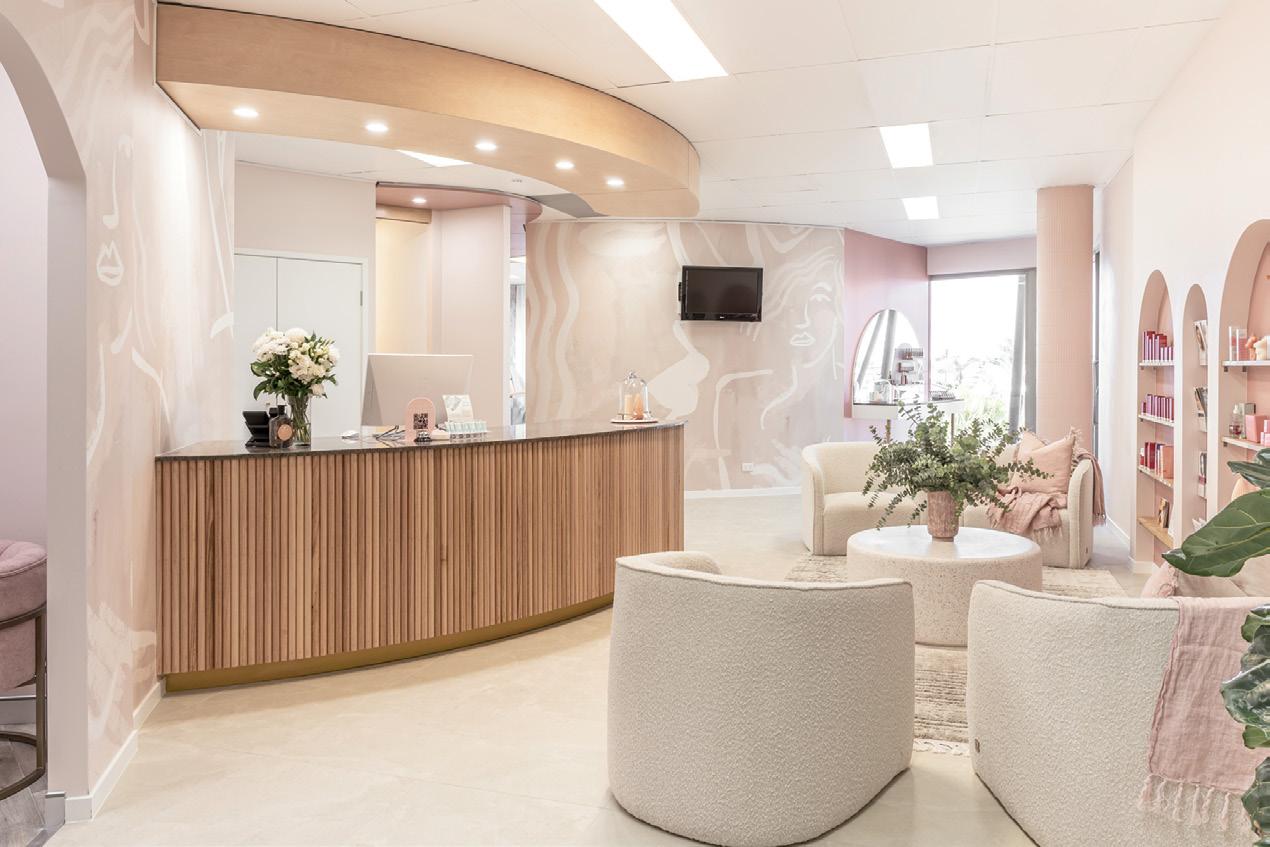
prevents, and reverses ageing through radiofrequency coagulation, which enhances firmness and elasticity, and microneedling, helping to stimulate collagen production as we age.
Q: What initially attracted you to the Matrix™ system?
A: Our attraction to the Matrix™ system stemmed from its RF microneedling and sublative RF applications. One of the primary concerns patients had was achieving improved skin texture. Prior to this technology, patients had to undergo more severe ablative resurfacing treatments, leading to extended downtime and discomfort. The Matrix™ system’s results are truly game-changing for patients, providing visible improvements in texture and skin quality with minimal, if any, downtime.
Q: What is your favourite feature of the Matrix™ system?
A: I’m particularly fond of the Matrix™ system’s compact and beautifully presented design. It’s incredibly portable, easily moving from one treatment room to another without taking up much space. Additionally, it’s straightforward to operate.
Q: Having had the Matrix™ system in your clinic for three months, how have both existing and new patients received it?
A: The Matrix™ is delegable to team members, and in our clinic, Asha our brilliant cosmetic nurse (pictured on the right) is our professional Matrix™ Queen, smashing out the most packages since acquiring the device! Asha makes it a point to discuss Matrix™ treatments with our patients because she understands that virtually every skin type can benefit from improved skin texture and tightening and that it’s an excellent preventative measure for ageing, thanks to the microneedling’s collagen-inducing effects. When Asha shows our patients the before-and-after results achieved with Matrix™ treatments, most are very eager to book their sessions!

Q: Considering the time the Matrix™ system has been in your clinic, how long do you anticipate it might take to recoup your investment?
A: I’m confident that we’ll recover our investment in the system within 12 months. In just two months, we generated $40,000 from RF microneedling treatments alone. Patients are keen on natural rejuvenation, and the Matrix™ system’s ability to tighten skin and improve its quality without invasive procedures or extended downtime is a compelling selling point. We’ve been able to instil confidence in our patients, knowing that they can achieve the desired results.
Q: Based on patient feedback, what significant enhancements in patient experience have you observed during and after Matrix™ treatments so far?
A: Patients have reported refined pores, improved or even eliminated wrinkles, and a lift in cheeks and eye areas after consecutive Matrix™ treatments. Their skin’s elasticity and texture have improved significantly. These treatments enable our clients to achieve airbrushed-like results for their skin, akin to a filtered appearance. For new clients, we recommend starting with a Matrix™ Pro treatment as it enhances the quality of their skin, improving the results of other treatments like fillers and anti-wrinkle treatments.
Q: Have you noticed increased patient interest and engagement due to the Matrix™ system’s addition, even during the early stages of its introduction?

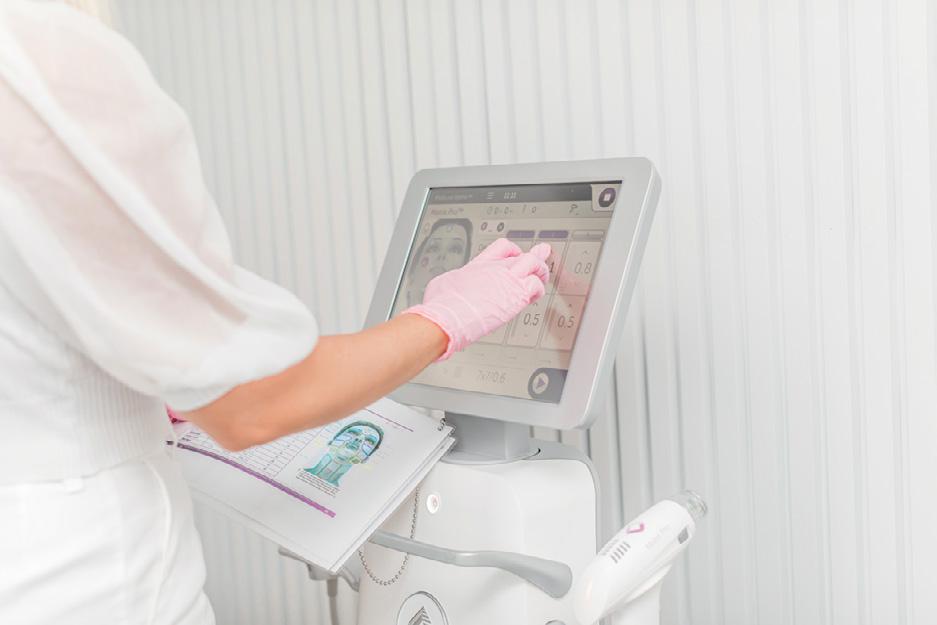
A: Absolutely, the addition of the Matrix™ system has sparked greater interest and uptake among our patients. Our clients are enthusiastic about maintaining their natural beauty, and this treatment helps maintain youthfulness or reverse signs of ageing with consecutive sessions. We encourage our patients to try at least one treatment, and most of them opt for the package of three treatments after experiencing the benefits for themselves.
Q: Looking ahead, how do you envision the Matrix™ system contributing to the sustained growth and success of your clinic in the long term? Are there any strategies you plan to implement to support this?
A: I can’t stress enough how the Matrix™ system benefits every skin type and age group, thanks to its versatility in addressing various concerns. As we continue to witness the remarkable results it delivers, we’re increasingly confident in using this device. Consequently, we’re combining sublative RF and RF microneedling treatments or creating packages to improve skin quality. For some patients, combining Matrix™ Pro for neck tightening with bioremodeling stimulator treatments is proving highly effective. With these two devices, we believe we can address all skin concerns comprehensively. This has positioned us as a reputable cosmetic, skin, and beauty clinic on the Sunshine Coast, and we’re excited to see the sustained growth and success this will bring.
If you are looking to discover more about introducing the Matrix™ into your cliniccontact the technology experts at Candela now:
1300 226 335 info.au@candelamedical.com candelamedical.com/au
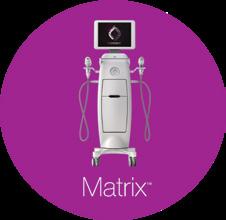
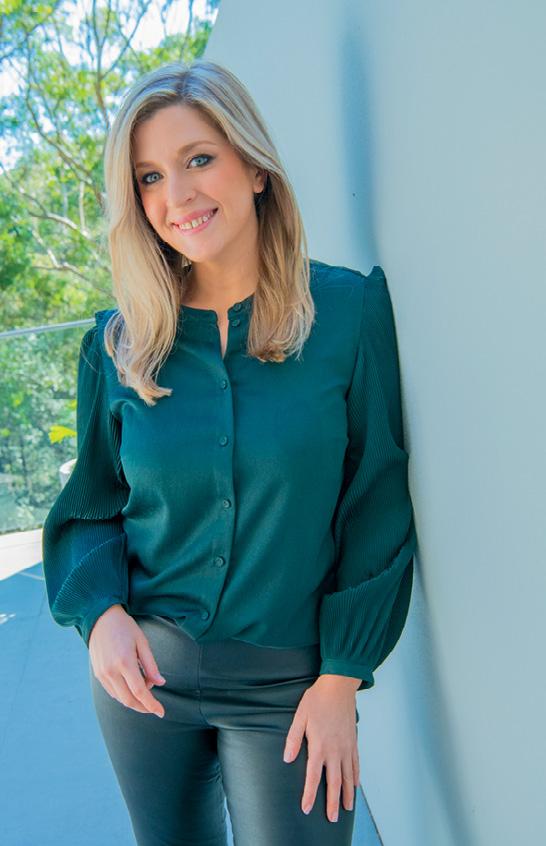
DANIELLE HUGHES explains how to determine the true strength of an acid solution.
cids are clinically proven to stimulate a regenerative response in the skin, leading to improvement in conditions such as acne, hyperpigmentation and the symptoms associated with cutaneous ageing. When it comes to the strength of an acid-based formulation, we often talk about pH and percentage – attributes that are important to consider. But they form only a small part of the strength-equation. Of arguably greater importance when calculating the true strength of a ‘peel’ is its pKa value(s) and proton mobility, the synergistic and compounding effects of multiple acids together, how the acids are delivered and the impact that buffering has on the acid’s performance.
The target is to stimulate a powerful regenerative outcome by precisely delivering acids and optimising the release of protons, whilst simultaneously minimising the surface destruction that acids have potential to cause, leading to impaired barrier function and long-term damage.
The most common organic acids used in skin treatments are carboxylic acids e.g. glycolic, pyruvic, and salicylic acid. The individual acid’s acidity (strength) is associated with its molecular structure (carboxyl group).
The acid’s carboxyl group consists of a carbon backbone attached to an oxygen group and a hydroxyl, comprised of oxygen and hydrogen. When organic acids are dissolved in water, the hydrogen atom of the hydroxyl group dissociates and releases positively charged hydrogen ions, known as protons. Protons are the ‘active’ component of the acid, responsible for achieving the desired regenerative response in the skin.
Each acid will have a specific number of protons that it has the potential to donate into a solution. This ‘number’ is expressed as its pKa (acid dissociation constant), a unique ID card that identifies how readily the acid can donate the protons it’s gripping into the solution. Considered a measure of the acid’s ‘free-acid’ availability, the higher the pKa number, the weaker the acid.
For example, glycolic would be considered a ‘weaker’ acid to pyruvic as it’s pKa value (potential proton yield) is higher than pyruvic and therefore the glycolic acid molecule has a firmer grip on its available protons.
pH (potential hydrogen) measures the concentration of protons within a finished solution. The lower the pH number, the more acidic the solution. pKa is the logarithmic expression of a specific pH at which the individual acid possesses ‘free acid’ containing equal amounts of ion and salt. It informs us of the precise pH required for an effective ‘peeling’ solution containing that acid to perform its ‘personal best’ donating a maximum yield of protons. When an acid’s pH is greater than its pKa, the solution will contain more salt than acid and this will affect the acid’s ability to release maximum protons. Adding another layer of complexity is the consideration that needs to be given when a formula contains multiple acids, each with their own ‘ideal environment’ to be their most effective.

The rule is: Acids donate protons. Bases accept protons. When an acid solution is buffered to a particular pH, a base (often sodium hydroxide) is added to increase the overall pH of the finished product. This practice was a response to the overwhelming side effects and longterm damages associated with applying strong peeling agents containing free ‘unbuffered’ acids to the skin and is often marketed as a feature that supports a product’s superior safety, optimised skin tolerance and reduced side effects, like irritation.
BUT, here’s where the problem is. When the acids contained in these solutions are buffered away from their ideal pKa, the base that was added begins reacting with and neutralising the acid’s protons, accepting these components before they are donated into the formula (or can have the desired effect into the skin) – the acid (often the marketed hero ingredient) is effectively handcuffed, and its activity is restricted.
This buffering effect is why discussing percentage alone is largely misleading. You may have a 40% glycolic acid peel but if the solution has been buffered away from its ideal pH value identified by its pKa number, it will have less efficacy that a 10% glycolic acid solution carefully calibrated to maximise the delivery of protons for the desired skin effect.
The goal has to be to control and maximise the release of protons into the skin in a uniform manner that empowers the individual acids to perform their best work, whilst minimising the side effects associated with delivering free, unbuffered acids. Acids should be bound in a sophisticated delivery vehicle that rapidly penetrates them beyond the outermost stratum corneum to bypass surface irritation that can lead to an inflammatory cycle and barrier impairment.
We know that buffering an acid reduces its clinical efficacy and therefore the holy grail requires a carefully calibrated formula that delivers free, unbuffered acids into the skin. However, where a sophisticated delivery vehicle and a careful calibration of protons is not available, a buffered solution will be the safest option – it just won’t yield the optimal regenerative outcome.
pHformula has pioneered and mastered true dermatological skin resurfacing from the inside-out, with an extensive portfolio of leave-on and layer dependent, free-acid solutions that empower skin professionals to think outside the box and develop fully-customised programs. The brand is acclaimed for its intelligent delivery vehicle complex (PH-DVC™) and controlling the maximum delivery of protons to support optimal skin regeneration without the usual downtime or surface destruction. phformula.com.au
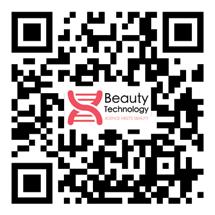
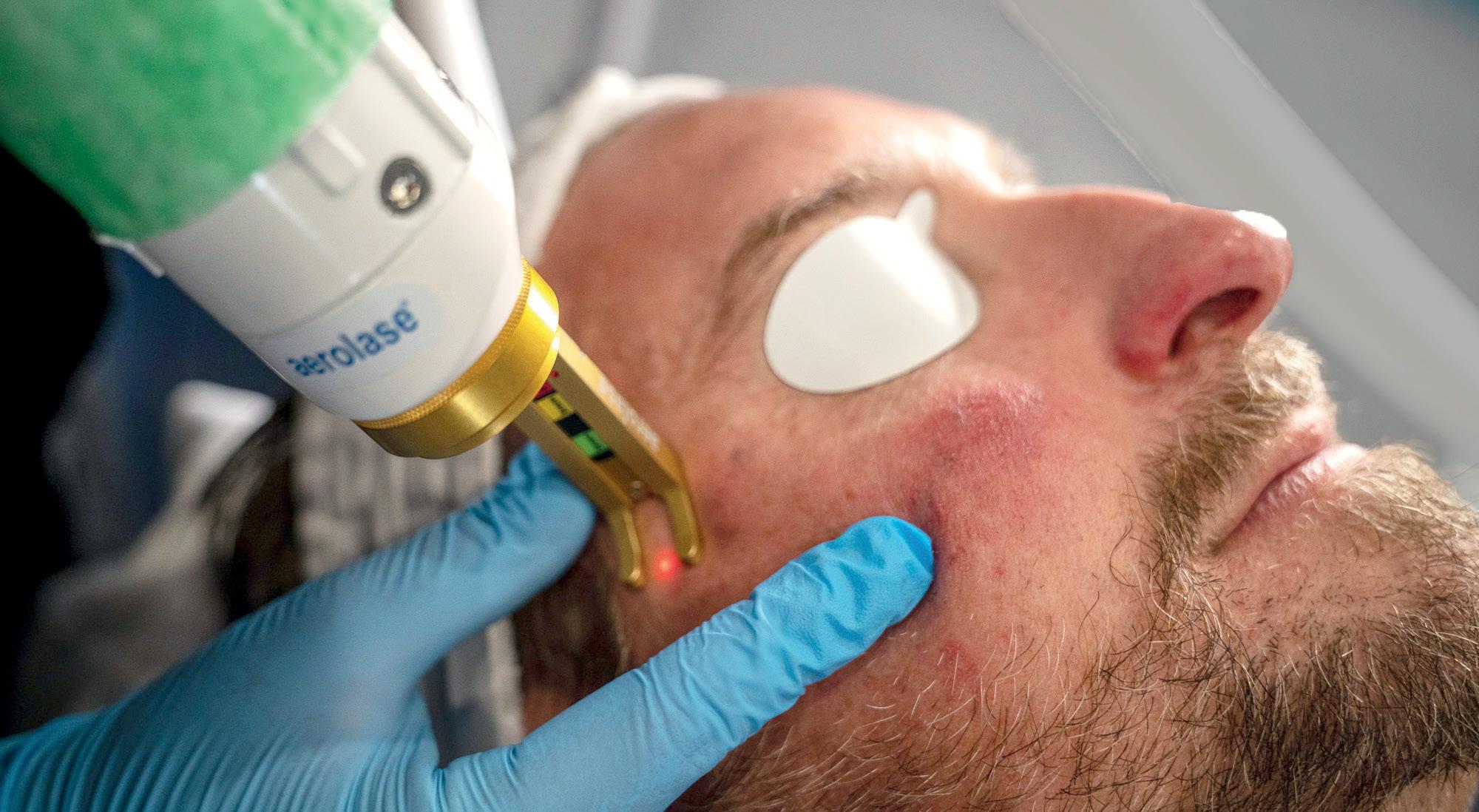
The most efficient lasers on the market today, Aerolase devices successfully treat the most widespread diseases that affect over 400 million people globally. Aerolase devices address the root cause of many medical skin conditions, not just their symptoms. This approach has proven effective in many clinical studies.
With Neo Elite, our medical and aesthetic professionals help their patients with a variety of these conditions, including but not limited to: Melasma, Psoriasis, Acne and Rosacea.
CASE STUDIES:
UP TO 50%
Melasma improvement after 2 treatments and without rebound.
96% 92% 100%
Data
Of patients reported substantial improvement 4 months after 3 leg vein treatments
Clearance after 4 treatments for rosacea. 72% before compared to PDL.
Sebum reduction vs sham for inflammatory acne
• Treatment of Acne and Complications including PIH, erythema and scars.
• Psoriasis
• Rosacea
• Hemangiomas
• Venous Lakes
• Port Wine Stains
• Pseudofolliculitis Barbae
• Melasma
ACNE
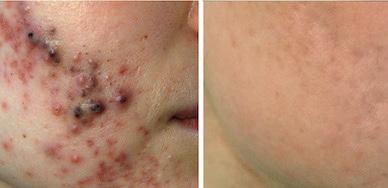
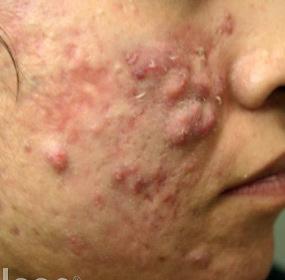
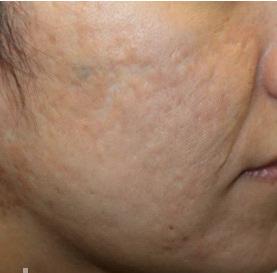
phone: 0490 257 449
instagram: beautytech_anz web: beautytechnology.com.au

The Aerolase Neo Elite boasts high-powered/short pulse laser technology, making treatments faster and more effective. Its user-friendly design ensures easy operation, while the pain-free experience enhances patient comfort. Additionally, the Neo Elite’s no consumables .
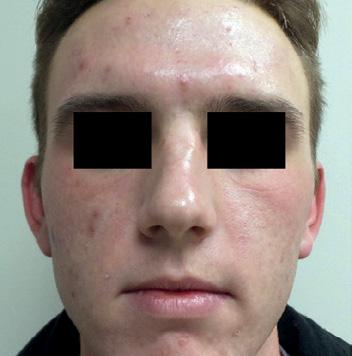

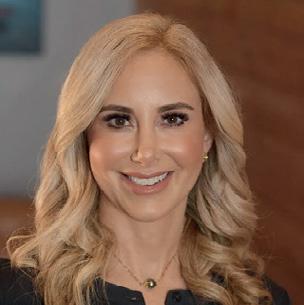
“It’s an amazing laser that does pretty much everything for everyone. I think of all the pieces of equipment in my office, this is my go-to device. You can treat everything acne, anti-aging, skin tightening, stretch marks, scars, you name it.”
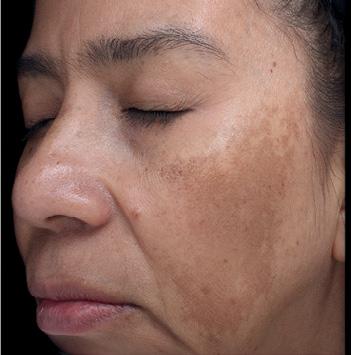
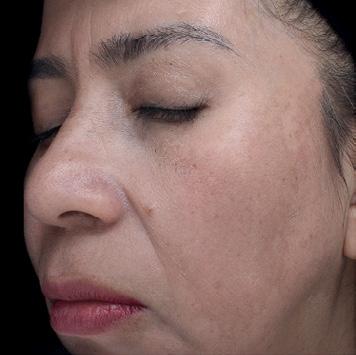
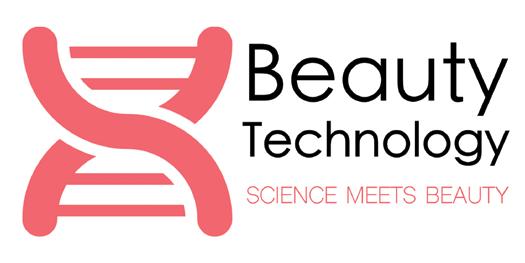

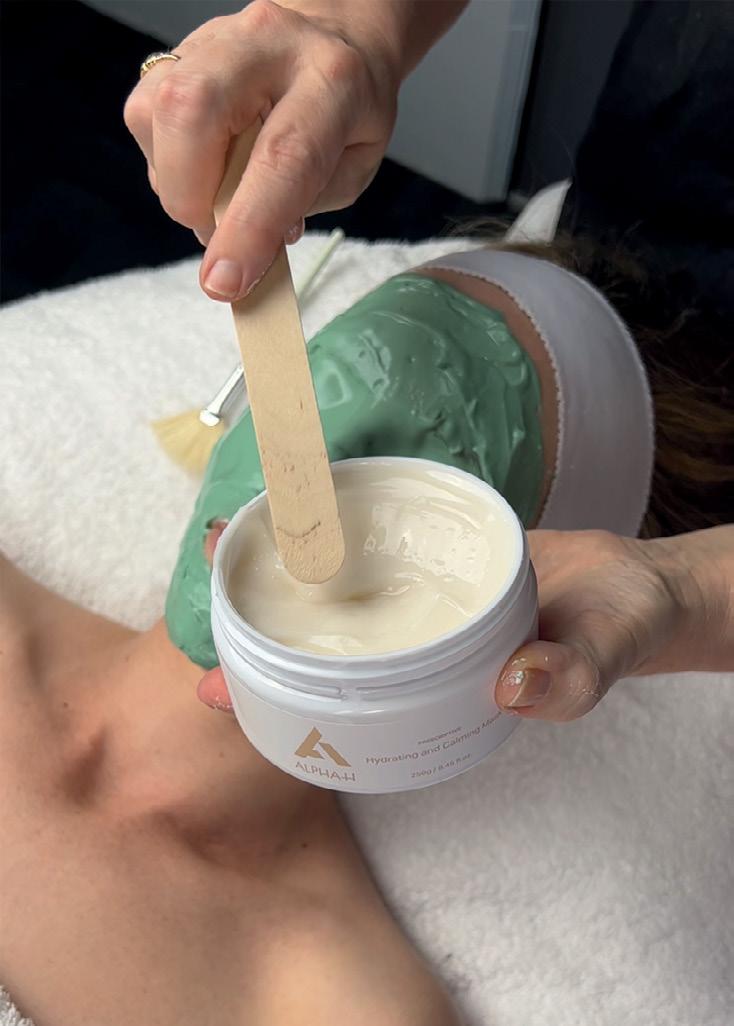
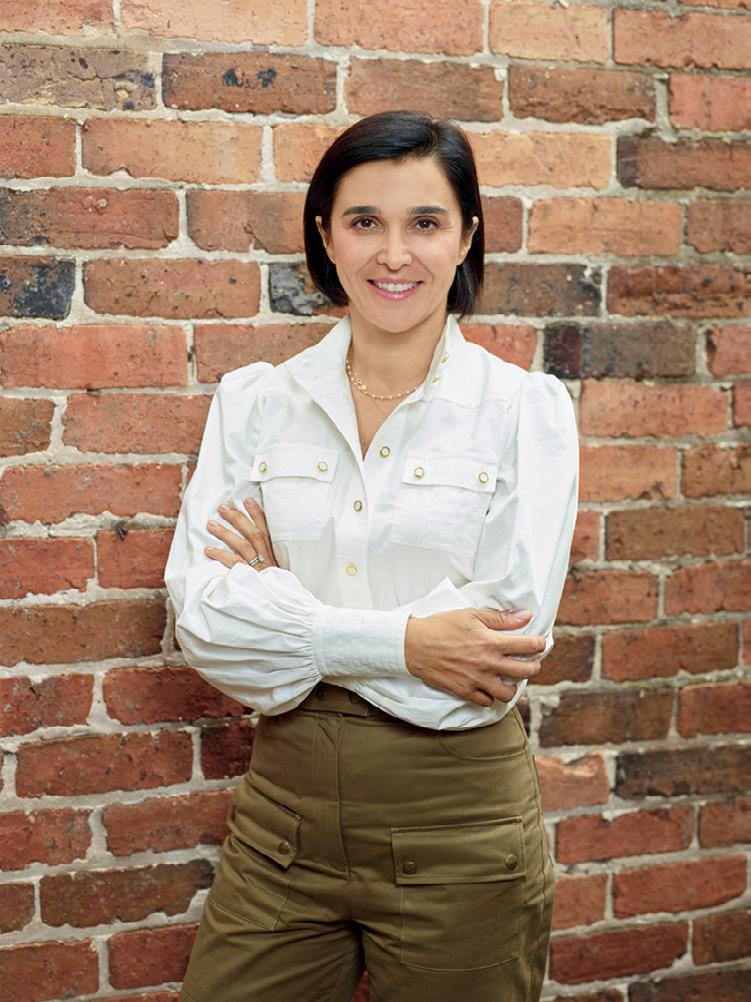
Alpha-H is building strong partnerships with some of Australia’s leading doctors, nurses, and skin therapists.
When thinking of great Australian skincare brands that are efficacious and rooted in professional treatments, Alpha-H comes to mind immediately. Renowned for its global expertise in chemical exfoliation, Alpha-H revolutionised the skincare market by bridging the gap between clinical treatments and at-home skincare with their award winning glycolic acid product ‘Liquid Gold’, which has been the brand’s best-seller for over two decades.
Last year, Alpha-H partnered with trusted distributor BLC to reestablish its presence in the professional channel, and only half a year in, their new focus is showing promising results, with 17 new partners successfully onboarded while actively engaging 80 clinics expressing keen interest.
One of the many benefits of stocking Alpha-H, is that it fits in with existing brands and treatments, and doesn’t aim to replace, but enhance a clinic’s offering. The brand’s exclusive-to-channel prescriptive range centres around three proven chemical peels, strategically crafted to seamlessly integrate into a clinic’s treatment menu and can serve as a standalone treatment or as a valuable protocol add-on.
“Alpha-H chemical peels can be offered as standalone treatments, or combined with existing protocols. Rather than replace an existing offering, Alpha-H Prescriptive is designed to sit perfectly alongside other functional and sensorial brands as the exfoliation specialist and global pioneer” says Alpha-H Chief Commercial Officer, Tina Randello.
It’s this ability to fill a gap, as well as the diversity in treatment options that has attracted some of Australia’s leading medispas and clinics to introduce the brand. “Our patients warmly embraced the Alpha-H range, appreciating its diversity catering to various skin types and addressing a myriad of concerns. Complementing our commitment to excellence, our team of ethical, responsible and experienced plastic surgeons and nurses recognises the importance of providing
comprehensive skincare solutions.” says Emma, Clinic Nurse at Mater Private Clinic, Queensland. “This partnership reflects our commitment to delivering quality care in every aspect of our services.”
Chemical peels are one of the few treatments to deliver immediate results, with proper at-home care becoming an extension to maximise effectiveness. This connection between professional in-clinic treatments and at-home skincare routines is where the brand, with decades of chemical peel expertise, can bridge the gap. Alpha-H has experienced great success in Europe and the US, using an omnichannel approach to connect professional skin clinics and retail outlets and leveraging both for one another.
“Our Europe business has been a great test case to show how retail and clinics can work very synergistically – clinics notice the impact when retailers educate and promote the brand and benefits of exfoliation as such strong voices of influence in the market and retailers perform most strongly when located near Alpha-H clinics,” explains Randello. “Replicating this success model in Australia after perfecting it in Europe was the trigger to re-launch and energise our Australian clinics business.”
The brand’s key competitive distinction lies in its approach to fostering partnerships with clinics and salons — a dedicated emphasis on collaboration. By leveraging strong marketing capabilities through various initiatives, Alpha-H supports the growth in awareness and visitation for its clinics. This includes influencer collaborations, co-created social content, PR and editorial coverage, events and consumer activations.
Brands are also encouraged to take part in crucial retail selling events, empowering them to engage their clientele and level the playing field with retailers. Recognising the increasingly blurred lines between professional and retail sectors, this initiative holds significant importance in adapting to the evolving market landscape.
We hear from two Alpha-H partners about their experience with the Australian skincare brand.
Plastic Surgery Queensland entered into a partnership with Alpha-H in 2021, seeking a distinguished skincare range recognised for exceptional results and affordability. Emma, one of their Clinic Nurses, boasts a wealth of expertise spanning over 15 years in her extensive familiarity with Alpha-H products, having seamlessly integrated them into both her personal skincare regimen and professional practice.
“Our patients warmly embraced the Alpha-H range, appreciating its diversity catering to various skin types and addressing a myriad of concerns. Complementing our commitment to excellence, our team of ethical, responsible, and experienced plastic surgeons and nurses recognises the importance of providing comprehensive skincare solutions. In our focus on treating skin cancer patients, having a moisturiser with SPF 50+ from Alpha-H is integral to our practice,” says Emma.
“The professional range is available to all patients pre- and postoperatively; however, our emphasis lies in utilising the professional peels from Alpha-H for scar management. This strategic approach underscores our dedication to optimal patient care and the continual pursuit of innovative solutions in plastic surgery and skincare. This
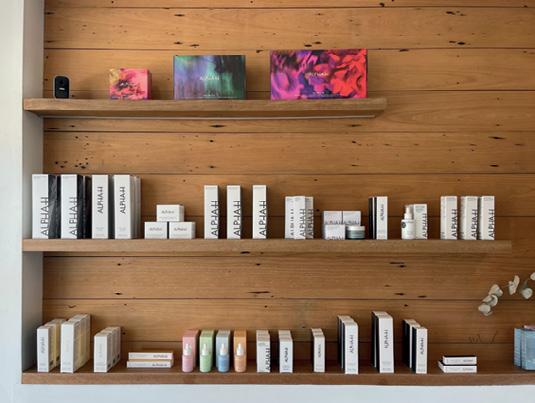


Skin & Clay is a beauty and wellness salon, located in the coastal village of Lennox Head. Founder Kylie Tancred has recently introduced Alpha-H to her range of brands and tells us about her experience.
“When I was in the early stages of designing and branding our clinic it was very important for me to introduce a professional beauty skin care range that would work well with the brand of Skin & Clay that also provided consistent results.

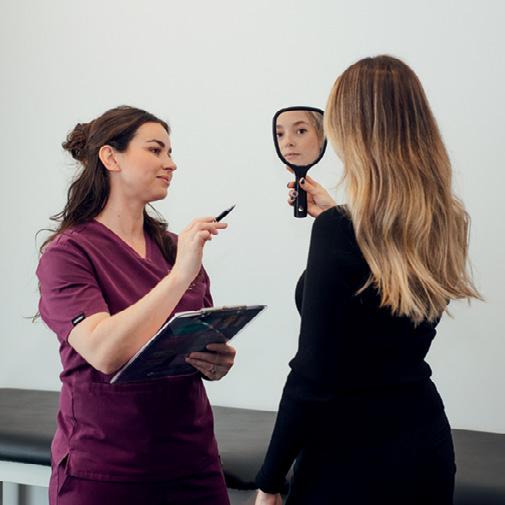

I had used Alpha-H before, and knew it was going to be a perfect match. I love that Alpha-H is a simple, curated range of high-quality skincare. It’s very easy for clients to navigate and understand and it has a trusted reputation of effective products.
The attraction for me was that the brand not only provided a cosmeceutical range for professional treatments in clinic that gave outstanding results, but that it also offers high-grade products at an affordable price point. The retail range utilises plenty of Glycolic Acid for at home use that has really helped clients achieve long-lasting results.
We use Alpha-H in our treatment rooms for most of our professional facial treatments. This way we can introduce our clients to an experience with Alpha-H skincare. We find this transition from professional treatments along with consultation allows us to educate the client about Alpha-H’s range of prescriptive and retail products.
We feel this is a great way we have been able to help move our clients over to the Alpha-H skincare brand for the home care routine. The Essential Hydration Cream is a key seller for us now.
We have had a great response to Alpha-H since introducing it to Lennox Head over 5 years ago. The brand has been well suited to our clients and their skin care needs. The combination of ultra-effective active ingredients with natural botanicals delivering high quality skin care for an assessable price point has won our clients over.”
Visit BLC Cosmetics for more information and register today to become an Alpha-H stockist: blccosmetics.com/pages/stock-register
Dentist DR GAMER VERDIAN explains what happens inside the mouth as we age, and why a holistic approach is best.
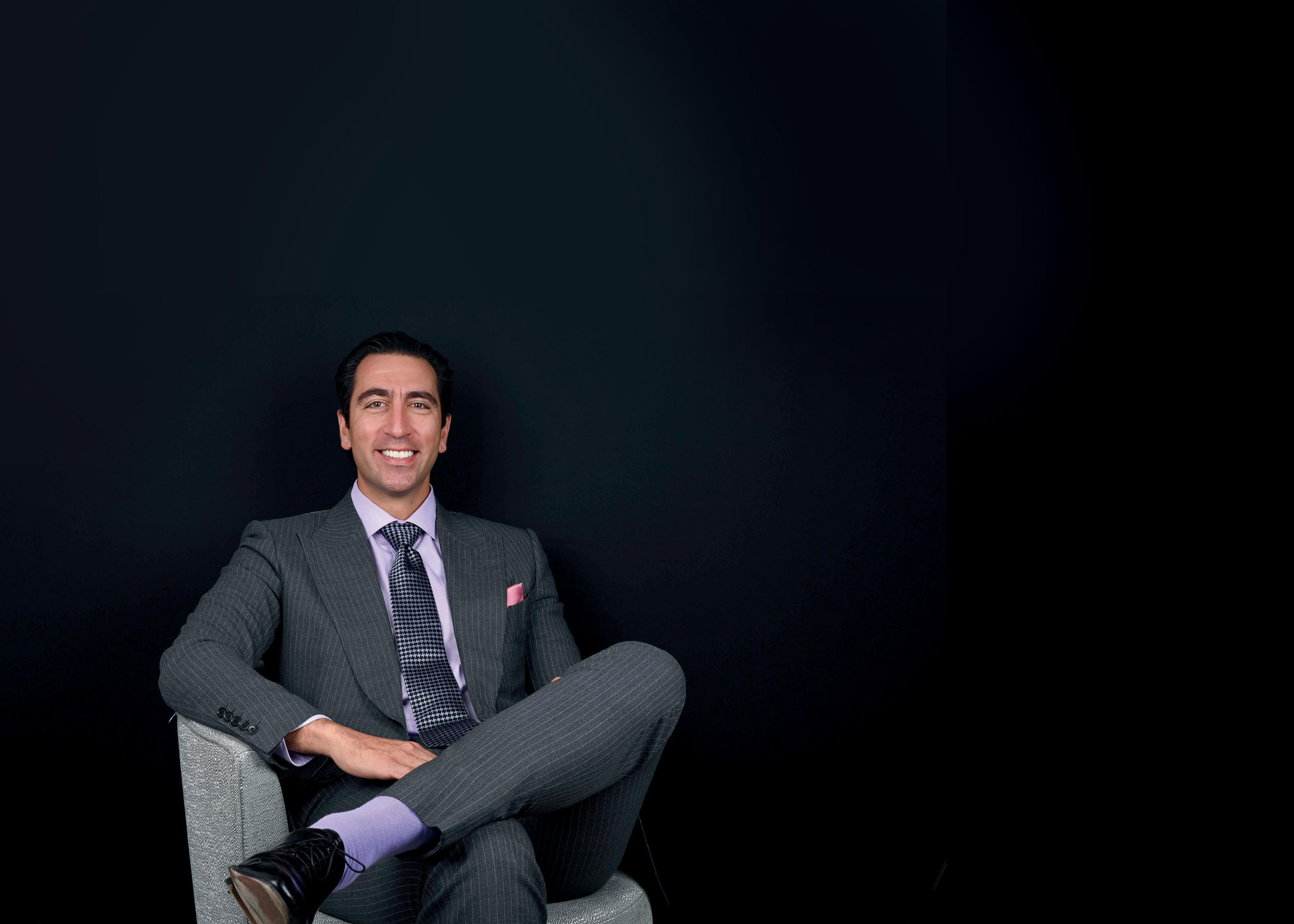 Dr Gamer Verdian
Dr Gamer Verdian
In the chase to slow down the signs of ageing, we tend to focus on our skin first. “What you should actually be looking at is loss of tooth structure,” says dentist, Dr Gamer Verdian. “Fixing your teeth can significantly reverse ageing, regardless of how your skin looks, because it fixes underlying facial collapse.” We talk to the celebrity cosmetic dentist to find out how cosmetic injectors can and should work with a dentist referral system.
Dr Gamer, please explain what happens to teeth, gums, and your jaw bone as we age –even if we practice good dental hygiene?
Ageing impacts oral health even with diligent dental hygiene. Enamel naturally wears down, increasing the risk of decay. Gum recession is also common, exposing more of the tooth and potentially its root. The jawbone can lose density over time, affecting tooth stability. The loss of tooth structure leads to the loss of height of your teeth when they touch together (vertical dimension) which cause our lips to fold over more and wrinkles become more pronounced. These changes reflect the natural course of ageing, despite our best efforts!
How does this show on the face, i.e. can you tell immediately by looking at someone’s face whether they might need some reconstruction?
Ageing in oral structures can subtly influence facial appearance. Enamel wear and bone loss can alter the jawline and lower face contour, sometimes leading to a more aged look. While it’s not always immediately
apparent, a seasoned dentist can often detect these changes, one of the tell-tale signs is increased creasing in the corners of the lips.
What dental treatment options are available to ‘rejuvenate’ someone’s smile, including bone structure?
To rejuvenate a smile, we consider treatments like dental implants for missing teeth, at times we perform bone grafts to fill out the space lost by missing bone. Replacement of missing teeth and bone leads to increased support facial structure.
Veneers offer a cosmetic solution for various imperfections by improving the size, shape and colour Dental Lounge Double Bay

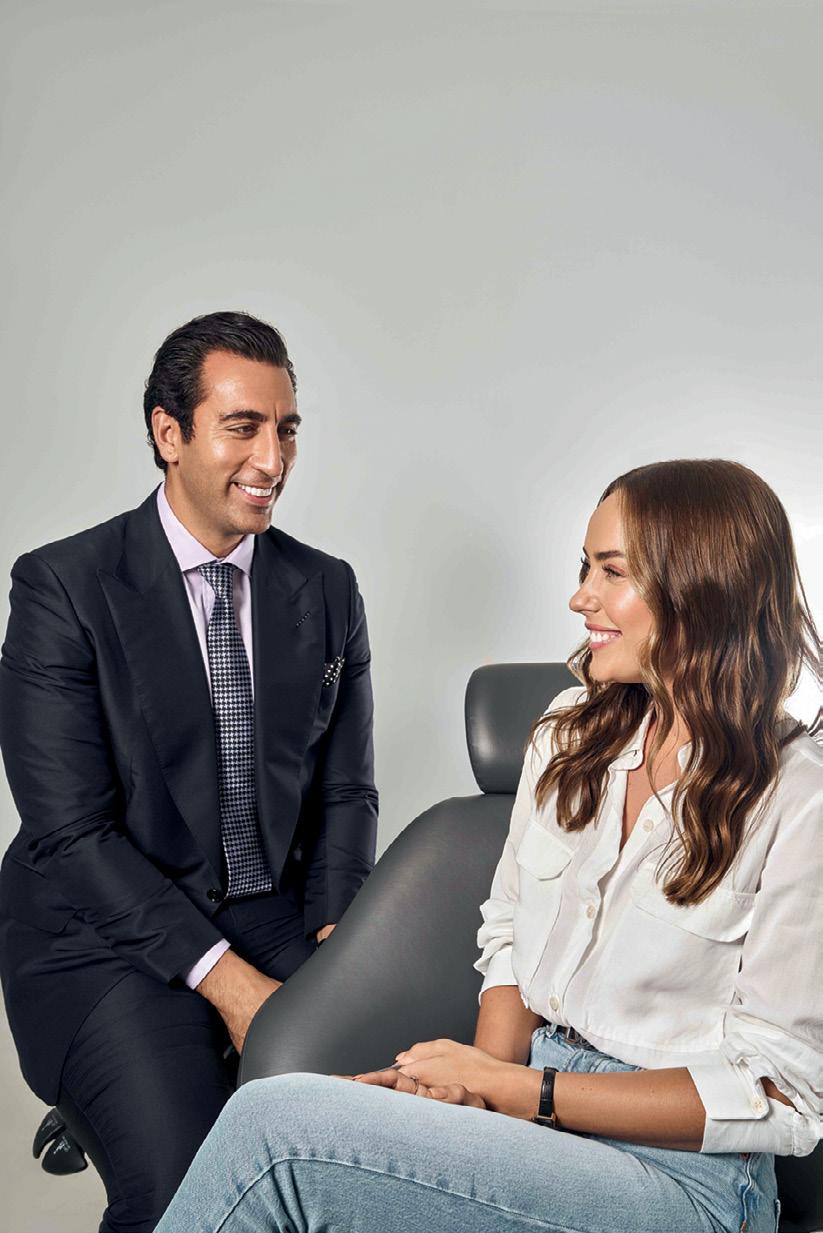
of ageing and worn teeth. Orthodontics can realign teeth at any age, contributing significantly to a youthful appearance. These treatments not only improve oral function but also enhance aesthetic appeal by giving our patients back what they have lost over the years.
Can those results be achieved through injectables? Why? Why not?
Injectables can complement dental treatments by improving surrounding soft tissue aesthetics. However, they don’t address underlying dental issues. They’re best used in conjunction with, rather than as a substitute for, dental treatments, particularly when aiming for comprehensive facial rejuvenation. It would be impossible for injectables to replace two or more missing teeth, there is too much size and volume required to be able to fill that kind of a void.
Can existing filler in someone’s jaw/cheek/ lips be a problem for dental procedures?
Existing facial fillers typically don’t interfere with dental procedures. We see patients all the time with fillers and with the right amount of care there should be no disturbance to their treatments.
Do you think injectors should refer certain patients to dentists first? In what cases should they do this?
Injectors should consider referring patients to dentists when there are underlying oral health issues, such as TMJ disorders or teeth misalignment, that might affect or be affected by injectable treatments. A holistic approach ensures the best aesthetic and functional outcome. In cases where there is significant wear and pain associated with the jaw joint, these would be best referred as a multi-disciplinary approach is often required.
Buccal fat removal has been quite popular lately – can this cause dental/jaw problems?
Buccal fat removal is primarily a cosmetic procedure and usually doesn’t directly impact dental health. Whilst not necessary, consulting with a dentist beforehand is advisable to understand any potential implications for oral health.
Shocking statistics show that 75% of Australians have not been to the dentist for two years, leaving them more likely to develop serious dental problems down the track. Moreover, with cost-of-living expenses rapidly rising, Australians are delaying a visit to the dentist at the cost of their health.
“This is really bad news, not just for preventing cavities or gum disease but for overall health because the two are very closely linked,” says Dr. Gamer Verdian, leading Sydney dentist and Practice Principal of Dental 99. “Delaying a clean and check-up beyond six months increases not only the risk of periodontal disease, but also the silent dangers of heart disease, diabetes and even the onset of Alzheimers.”
Dr Gamer wanted to make dental services accessible for everyone, which is why he founded Dental 99. At Dental 99, patients pay a fixed price of just $99 for the four main pillars of dentistry: a checkup, non-surgical extraction, thorough clean and pain management.
Dental 99 is the brainchild of high profile Sydney-based cosmetic dentist and graduate of the Harvard School of Business, Dr. Verdian, who was inspired to find a way of managing dentistry’s high fixed costs without compromising the patient experience. “The answer was an innovative app that allows you to book, pay and manage your health records on your smartphone. It’s life-changing for patients on a budget and word-of-mouth has seen the platform take off,” says Dr. Verdian.
“We are the pioneers of affordable dentistry and Australians need us more than ever right now,” says Dr. Verdian. “The copycats are already gone but we are committed to staying and reducing the number of Australians who can’t access dentistry due to cost. In fact, we’re so passionate about it that we plan to expand to other countries, such as the United States, where people suffer the same affordability problem. Regular dental care should be accessible to everyone.”
Dental 99 focuses its services on everyday dentistry. The innovative model is centred around a streamlined app that allows patients to book their own appointments, access X-rays and make payment without requiring a receptionist. Reducing admin overheads means patients can pay less for the same quality treatments. “We not only offer patients affordable dental health, we also put the power of information back into their hands,” says Dr. Verdian. “Patient records are all at their fingertips, which is how it should be.”
“Dental 99 is more than a dentist. We see ourselves as a technology/ dental company that has disrupted the business model of old world dentistry and changed the way people can access dentistry in the future.”
Dental 99 currently has 11 locations across Australia and aims to open more locations soon.
Dr Gamer Verdian is the Practice Principal of Dental 99 and owner of The Dental Lounge Sydney. dental99.com.au ; dentallounge.com.au
• Around 60% of women find their gum health is affected by a change in hormones
• Research shows 43% of women suffer from oral discomfort, including dry mouth, once they reach or pass perimenopause
• Over 10% of women suffer oral infections after menopause

Are your clients asking for glass skin with minimal to no downtime? Then look no further, says TANEESA
WILLIAMSONAs event-season is still in full swing, the demand for perfect skin continues. In 2023, ‘glass skin’ became a popular trend after it originated in Korea, describing skin that appears luminous and drenched in hydration, almost ‘glass’ like. LHALA Peel emerges as a game-changer, offering a 4th generation peeling procedure that combines efficacy with gentleness.
With its unique blend of LHA, HP-Sol™, and lipids, this glass skin treatment provides unparalleled benefits, making it the perfect preevent treatment for those seeking radiant, clear, and smoother skin without the hassles of downtime or excessive irritation.
The cornerstone of LHALA Peel lies in its use of LHA, a powerful exfoliating ingredient that belongs to the beta-hydroxy acid family. Unlike its counterparts, LHA offers remarkable exfoliating performance while minimising irritation. This makes LHALA Peel suitable for individuals with sensitive skin, providing a gentle yet effective peeling experience.

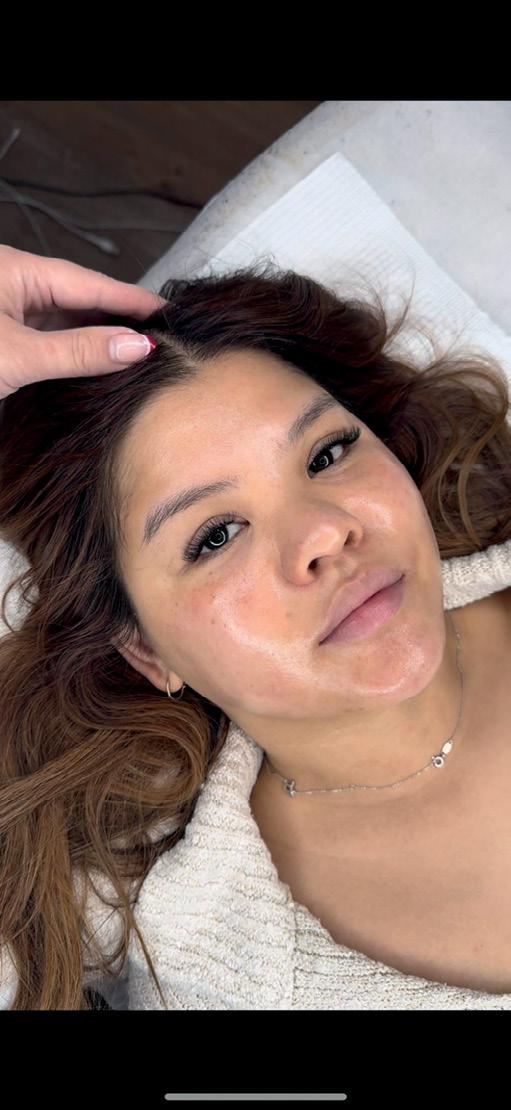


To enhance the skin’s elasticity and promote collagen remodelling, LHALA Peel incorporates HP-Sol™. This innovative ingredient works synergistically with LHA, ensuring not only a smooth exfoliation process but also contributing to long-term skin health. The collagen-boosting properties of HP-Sol™ result in firmer and more youthful-looking skin.
Protective skin barrier and regeneration support
LHALA Peel goes beyond the peeling process by incorporating lipids, which act as a protective barrier for the skin. This helps shield the skin during the peeling procedure and supports regeneration. The presence of lipids ensures that the skin remains protected and nurtured throughout the treatment, minimising downtime and discomfort.
Benefits & advantages of the LHALA Peel:
1. No Downtime: LHALA Peel offers the advantage of no downtime, allowing individuals to resume their daily activities immediately after the treatment. This makes it an ideal choice for those with busy schedules, especially during event-season.
2. Less Skin Irritation or Redness: The combination of LHA, HP-Sol™, and lipids ensures that the peeling process is gentle on the skin, minimising irritation and redness. This is particularly beneficial for individuals with sensitive skin or those who have experienced discomfort with traditional peeling procedures.
3. Brighter and Clearer Skin: LHALA Peel is designed to unveil brighter and clearer skin by effectively removing dead skin cells and promoting cell turnover. The result is a radiant complexion that enhances the natural beauty of the skin.
4. Smoother Skin: The exfoliating properties of LHA, coupled with the collagen-boosting effects of HP-Sol™, contribute to smoother and more refined skin texture. Say goodbye to rough patches and uneven skin tone with LHALA Peel.
5. Synergy with Combined Therapies: LHALA Peel complements various other skincare procedures, including laser treatments (IP laser, PICO, HIFU, and RF needling), skin boosters, lifting, micro-needling therapy, and more. The synergy effect enhances the overall outcome of these treatments, providing a comprehensive approach to skin rejuvenation.

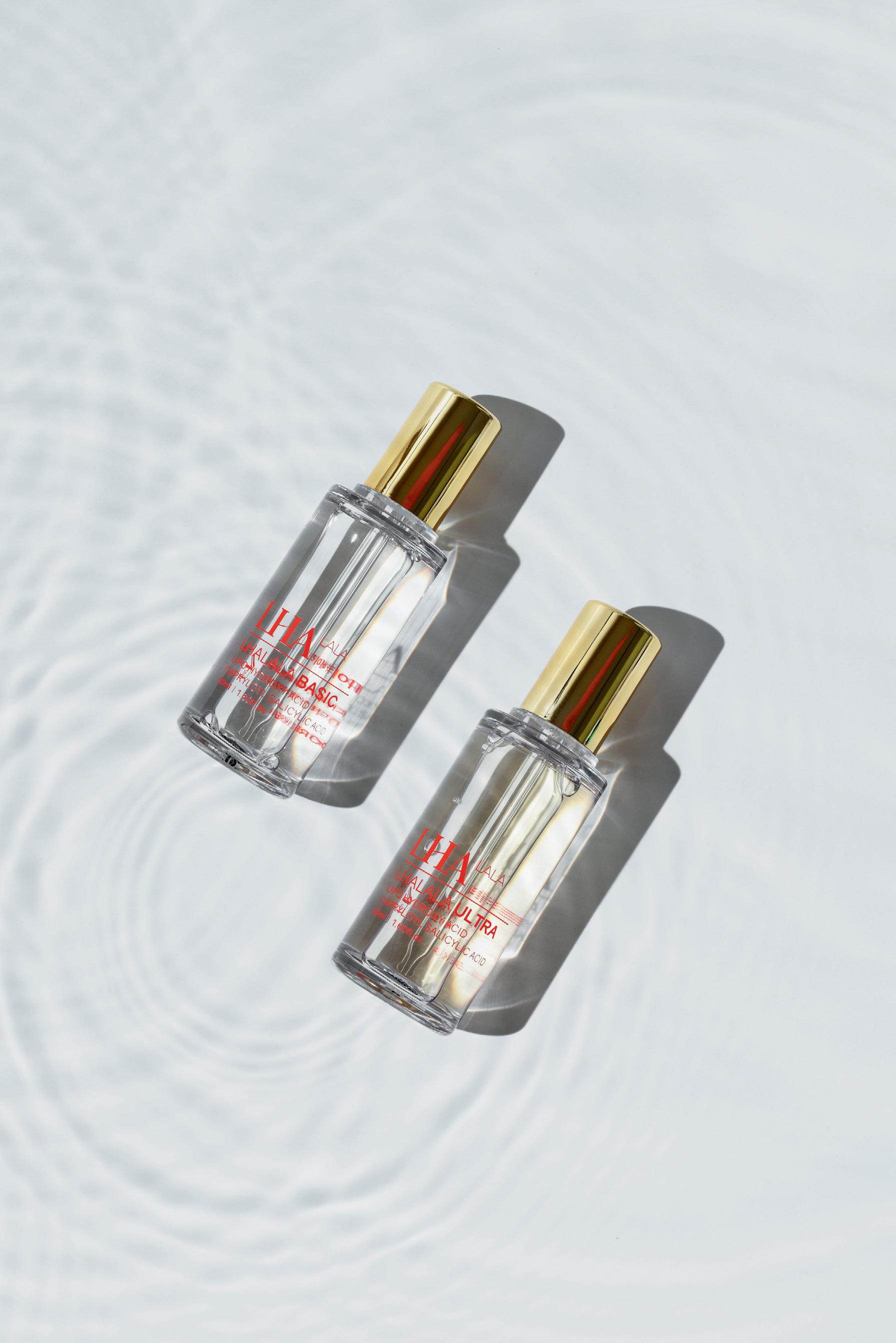
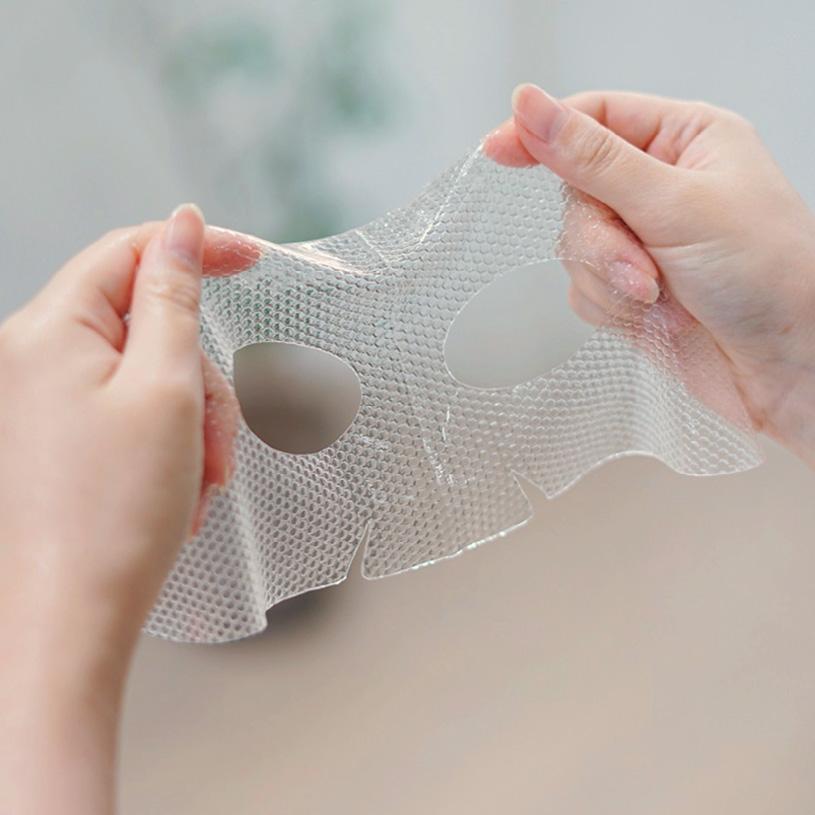
Unlike conventional cotton sheets, the patented 3D stereoscopic embossed structure adheres seamlessly to the skin. The hydrogel that reacts to skin temperature dissolves and continuously delivers good ingredients to the skin. It is a gel-type mask that is effective in moisturising, soothing, and anti-wrinkle. We recommend using it with LED light and it can be used on its own. LHALA Peel is distributed by Raan Medical. raanmedi.com.au
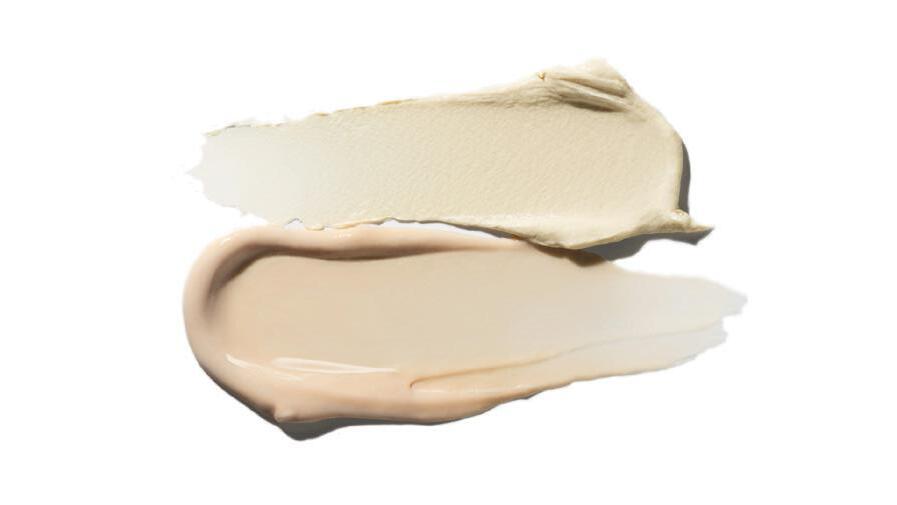
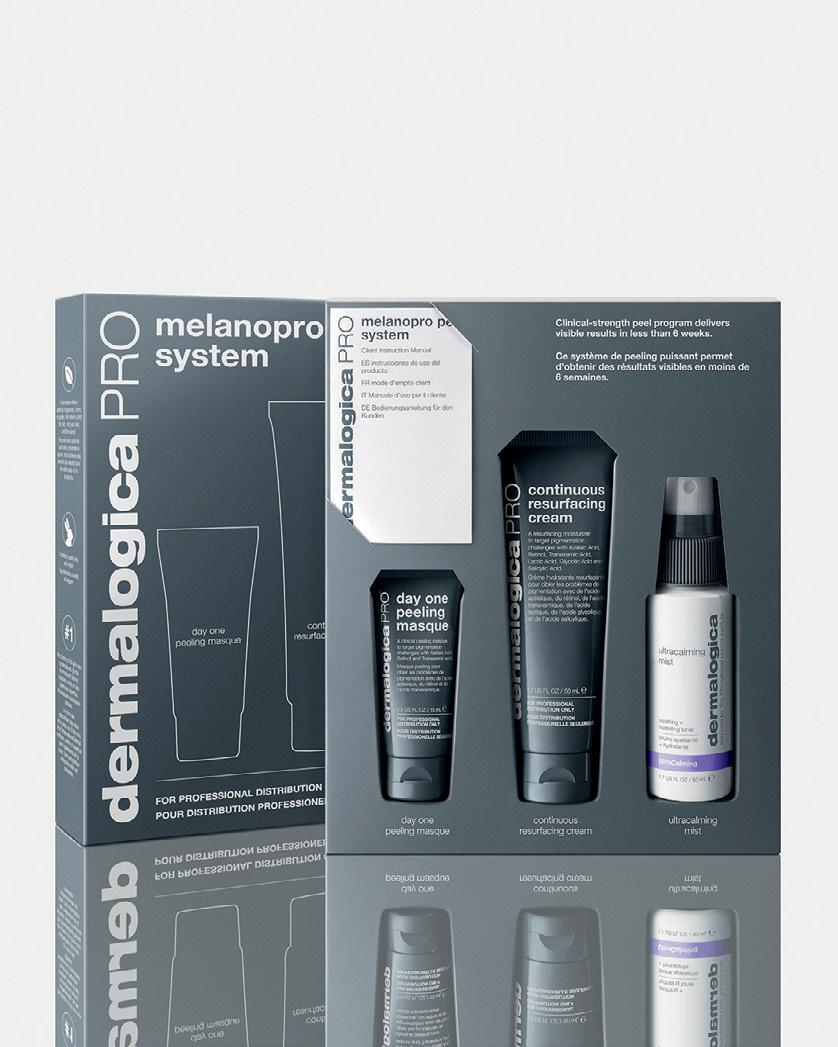
Hyperpigmentation remains one of the most stubborn and prevalent skin conditions in Australia that people want to treat. Whether it’s melasma, sun spots, or postinflammatory hyperpigmentation (PIH), dark spots on the face are hard to conceal, and even harder to treat efficiently. There are, of course, laser options, such as IPL or picosecond lasers, however, these are often unsuitable for darker skin tones.
Dermalogica has launched a new topical depigmentation treatment that is suitable even for dark Fitzpatricks, and creates little to no downtime. Introducing, Melanopro by Dermalogica. We caught up with Dermalogica’s Senior Director - Global Professional Innovation, Louis Chabert, to learn more about this innovative professional treatment.
The innovative professional treatment offering results with little to no downtime. after
“We saw that there was a big gap when it comes to hyperpigmentation treatments, especially for people with darker skin tones, or those prone to postinflammatory hyperpigmentation. There’s nothing that provides a superior efficacy that is 100% safe for them,” he explained.
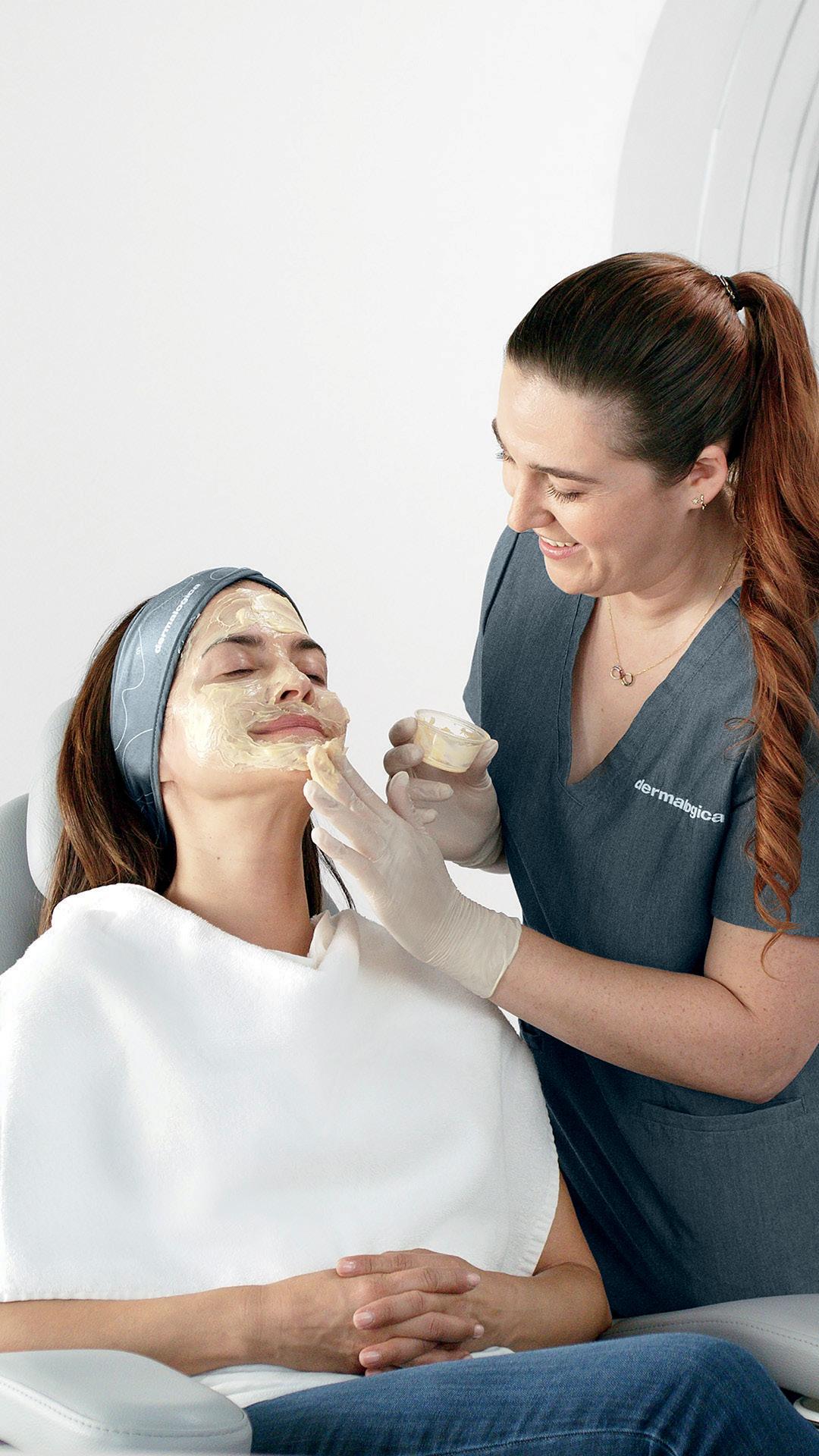
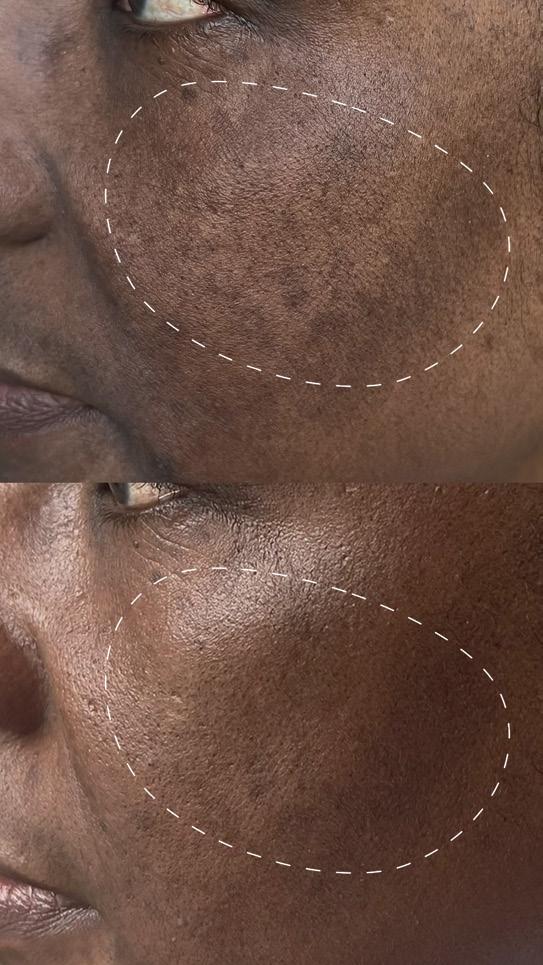
One of the main aspects that the team at Dermalogica focused on, was trying to develop a product that respected the skin barrier, as most other depigmentation solutions on the market, do not.
Melanopro consists of a professional peel applied in-clinic, which is removed 4-7 hours later by the patient in the convenience of their home. Each patient receives an at-home skincare product to use for at least six weeks after the treatment. This product is a resurfacing moisturiser, which includes Azelaic Acid, Tranexamic Acid, Retinol (Vitamin A), Niacinamide (Vitamin B3), and Acetyl Hexapeptide-1 (peptide).
In the first six days, flaking can be expected, with results peaking on day 16-48. What makes this product different to others on the market, is that it doesn’t only reduce pigmentation, but it improves overall skin quality.
“During our trials, each subject would mention how incredible their skin looked after about 14 days,” says Chabert. “So people actually want to do it again, which is not something you find with a lot of other depigmentation treatments on the market.”
“We’re excited to offer this treatment, especially because there is still such a stigma around melasma, with some people associating it with ‘dirty skin’, which, of course, it’s not. People seem to have more empathy with acne patients than with melasma.”
With Melanopro, the patient only has to come into clinic once, for the initial peel, the rest is done from home, saving the patient time and effort. After the first few days of peeling and flaking, the skin starts to improve each day, fading dark spots, reducing the appearance of hyperpigmentation, and smoothing skin’s texture to reveal fresh, brighter skin.
Effective and profitable
Melanopro Peel System does more than enhance your professional offering on all hyperpigmentation concerns – it is also highly profitable. The recommended retail price for the treatment, including the athome products, is $750. Compared to other similar treatments on the market, this is a competitive price that makes depigmentation treatments accessible to a wider range of people, and encourages them to repeat the treatment when necessary.
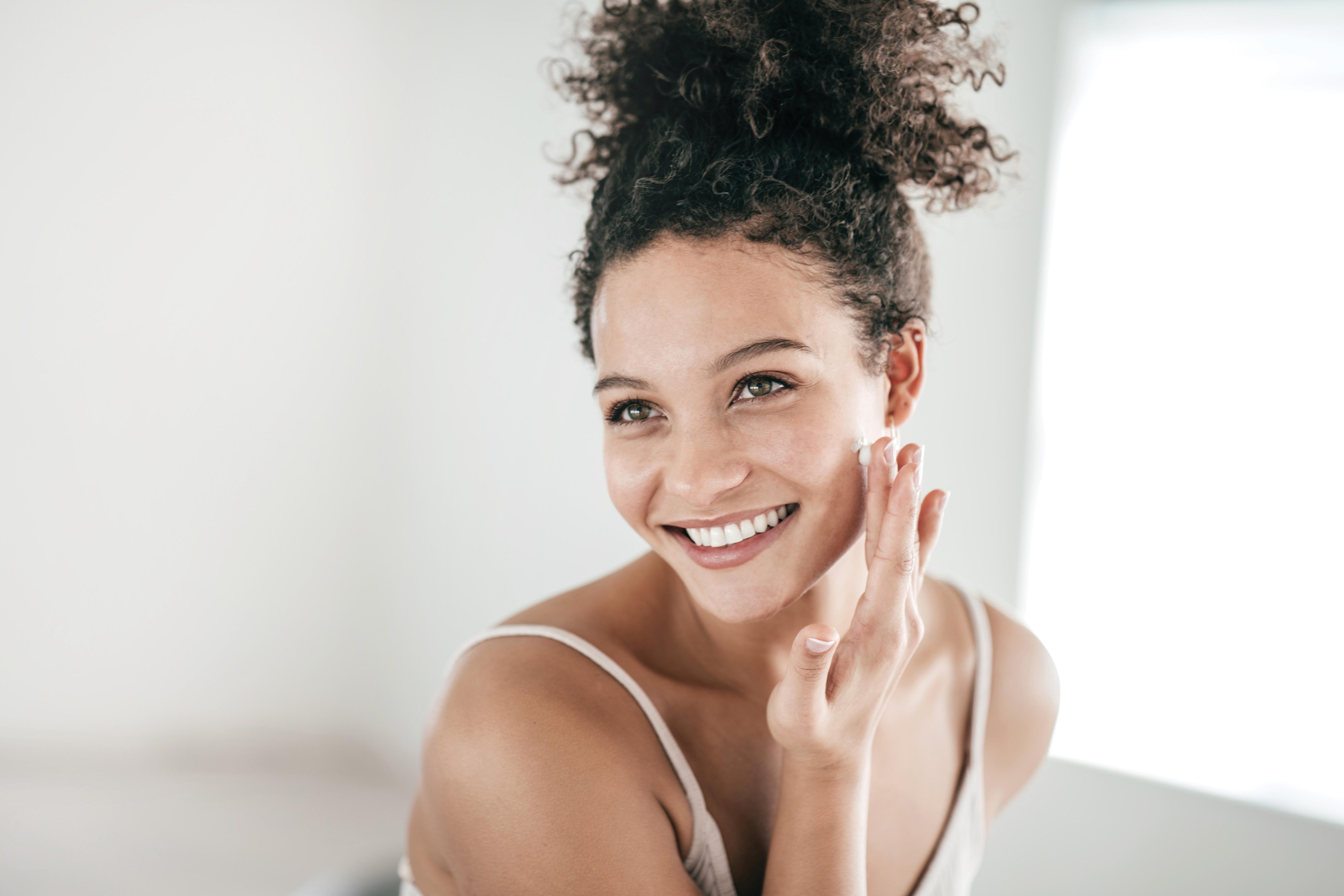

DR GIULIA D’ANNA explains why not every trend should be followed.
As aesthetic practitioners, there is generally nothing we want more than great results and clients that keep coming back again and again. Sometimes it can be so tempting to consider offering treatments based on trends that are all over social media in an attempt to create excitement and a sense of urgency with our clients not wanting to miss out. Nevertheless there are some trends that should be approached with caution. Others we need to simply skip over completely.
In this eye-opening article, I will dissect the latest trends that are set to dominate the aesthetic scene for 2024. From exaggerated results to risky procedures, I will uncover the potential pitfalls and reasons to exercise caution so that you stay informed, and also are able to empower your clients.
The correct medical nomenclature for Barbie-Tox, also known as Traptox, Swan neck and a bunch of other layman’s terms, is Trapezius slimming or Trapezius muscle relaxant treatment. Although believed to be a current trend given the hype around the beautiful Margot Robbie in the Barbie movie, this is not actually a new treatment at all.
So what actually is the Trapezius muscle and why would you slim it? The Trapezius muscle, as its name suggests, is a diamond shape muscle that runs from the base of our skull, down both shoulders and onto the middle of the back. The Trapezius muscle is important for shoulder and neck movements, posture, and overall upper body function. It is commonly targeted in exercises to strengthen and condition the upper back and neck. Body builders and weight-lifters aim to increase the size of this muscle to improve strength and upper back strength. When it gets broad, our shoulders look more masculine and our neck more bulky and wide. Enter treatment with botulinum toxin. Inject the muscle and the shape of our shoulders and neck change, since botulinum toxin temporarily modifies the contraction of the muscle, causing it to atrophy. So consider what happens when we start to target this muscle with anti-wrinkle injections, such as botulinum toxin. The Trapezius muscle starts to weaken since it cannot contract, leading to a square right-angle between the neck and shoulders, which can appear quite statuesque. However it comes at a cost. Any patient that has neck problems or weakness, will further experience weakness and lack of support in the neck.
This can lead to a host of issues, such as poor posture, shoulder dysfunction, neck pain and straining as other muscles struggle to compensate for the trapezius weakening, as well as decreased upper body strength.
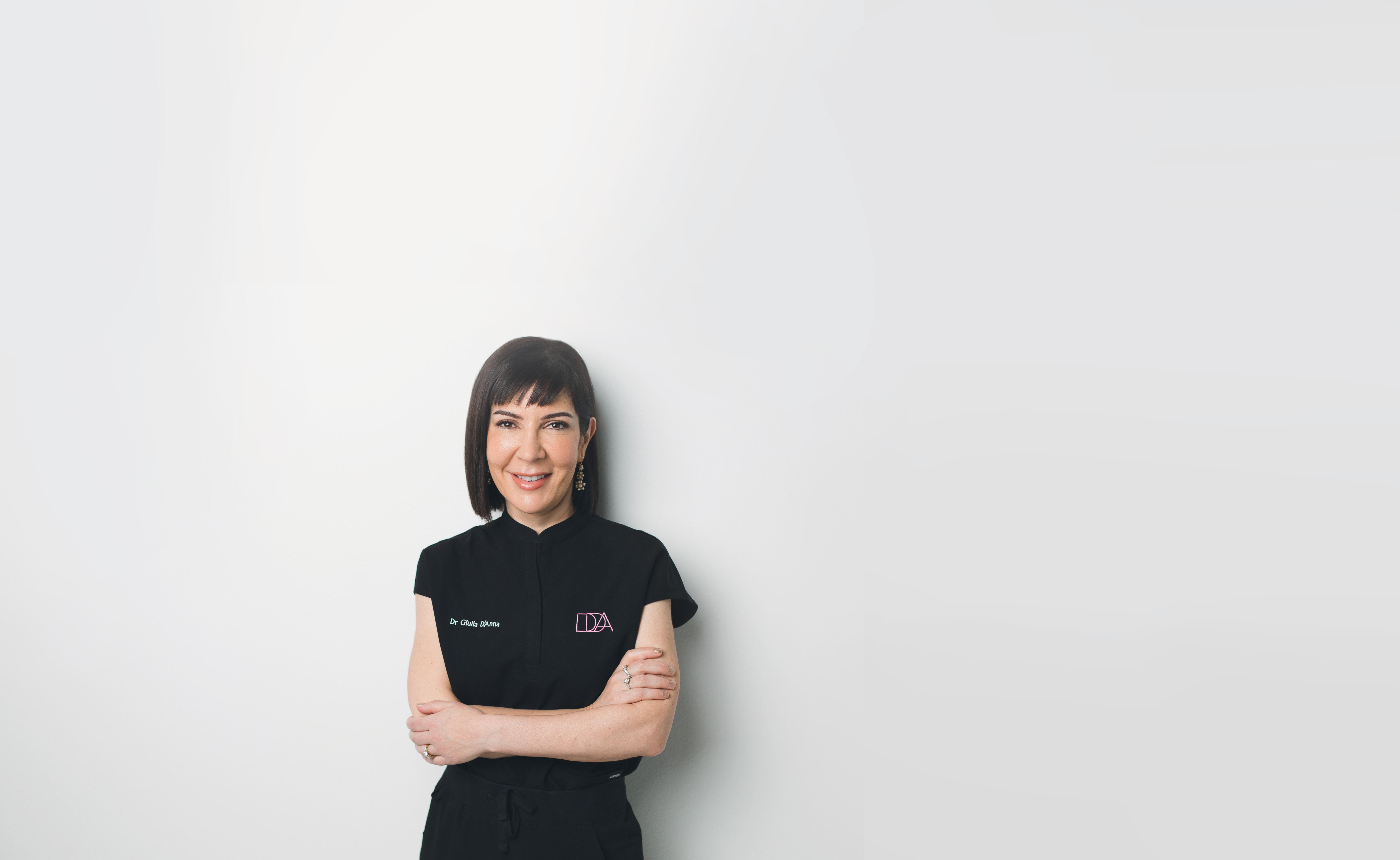 Dr Giulia D’Anna
Dr Giulia D’Anna
Treating a patient’s trapezius muscle without proper consultation on the risks and any underlying neck issues is bound to land you and the patient in a very uneasy position – literally. Some patients will have trouble holding their head up. You need to consider the patient’s medical history, their occupation (do they need to look up or down more than normal?) to previous neck injuries and surgeries. Consequently this trend might best be skipped to keep your patient comfortable and functioning optimally.

This one has a lot of buzz going into 2024. First let us look at what an exosome actually is. An exosome is a tiny vesicle that is released by cells in the body and acts as a messenger between cells. Exosomes usually play a role in communication between cells, releasing bioactive molecules, resulting in physiological processes. This might be to induce collagen and reduce inflammation, which sounds amazing for any aesthetic practitioner. Imagine all the possibilities here, if we could deliver the messages we select for our clients. Amazing, right?
Before we get too excited, let’s remember that some exosomes are not so desirable. Some exosomes contribute to cancer progression. Others help to induce disease, such as those exosomes released in Alzheimer’s or Parkinson’s disease.
Now of course exosomes that are being developed for skin treatments promise to induce great things for us, like more collagen and more elastin. This could be the next big thing in skin, especially if we could deliver the right exosomes, right where we need them.
Getting the right exosomes where we need them is the next step. How do we deliver these vesicles into the skin? Some practitioners have already started to focus on the heavy use of exosome treatments using all manner of methods to insert them into the skin. Some are using devices to stamp the exosomes in place, others are performing micro-needling and then applying them topically. What is the correct way to use exosomes? We simply do not know.
At the moment, although exosomes look to be on-trend for 2024, we need to pull-back a bit. There is no validated scientific research to show that they are useful – yet. Exosome use and effects are little more than theoretical at the moment, so we need to wait for this trend to pass and watch the actual real data before we start promising our clients results that may or may not be achieved.
In medical settings, Intravenous (IV) infusions are used to administer fluids or medications or nutrients into the bloodstream to improve the health of a patient. Before undertaking an IV infusion, there is generally some medical testing and/or blood tests undertaken to diagnose an illness or lack of essential nutrients to qualify the treatment.
However there are some IV infusions which are becoming a trend in the health and wellness space. In some cases, individuals may seek IV infusions for non-medical reasons, such as for hangover relief, boosting thinking ability, a vitamin boosts, clearer skin or general wellness. These kinds of IV infusion are done on client request, and usually in a nonmedical setting. There is no denying that a hydrated body functions well, however there is often a lack of reliability of IV infusions in terms of ingredients and also medical need.
Let’s now look at the data and methodology. Most wellness IV infusions lack the scientific evidence to support the claims being made about them. Furthermore, when a solution is infused straight into the bloodstream, we have bypassed the regular absorption processes of the body, forcing the solution in. In usual circumstances such as when we eat a diet rich in essential fatty acids and other nutrients, the nutrients are filtered by our gut, where our gut will absorb the nutrients we need, bypassing those that are already at good levels. However when an IV infusion is undertaken, our body absorbs all of it, whether we need it or not, meaning that we may actually be over-infused.
To be clear, I am not disputing that some clients need medical infusions. It is where there is treatment undertaken because of a trend and without diagnosis that we need to be careful. If there is no
scientific evidence to support the health benefit that is being advertised, the administering practitioner will find themselves in breach of the law and subject to AHPRA and/or criminal proceedings. Worse yet, if the patient suffers a medical incident as a result of an IV infusion such as an infection, you will have caused harm not just to the patient but also your reputation. Again, this aesthetic trend might be one that is best left to medical practitioners in a medical setting.
I am ending this article on a big one! If you haven’t heard about weightloss drugs from the semaglutide family, listen up. These drugs are fast becoming widely in demand and are set to grow even more in 2024.
Semaglutide pharmaceutical drugs are traditionally prescribed for the treatment of diabetes to control blood sugar. The drug is injected, causing the body to produce insulin, leading to lower blood sugar, slower digestion and the feeling of fullness.
One of the consequences of feeling full is rapid weight loss, causing this class of drugs to become in demand with celebrities and now every person who happens to be struggling with their weight. Of course this sounds like the dream solution to weight loss.
So what do you need to know? Doctors have been cautioned to avoid prescribing these pharmaceuticals to anyone who doesn’t need them medically to try and ease the medicine shortage that is happening due to high demand. What is worse, is that counterfeit drugs are starting to make an entrance here in Australia as a result of the out-ofcontrol demand, putting those that venture that way at real risk.
Let’s look at the risks with rapid weight loss. Semaglutide pharmaceuticals can cause gastrointestinal reactions in some people, which may include vomiting and/or diarrhoea. There have also been reports of nutritional deficiencies and severe headaches in some patients due to lack of adequate food intake and poor metabolite levels.
A little talked about side-effect of rapid weight loss is what this does to the face and body. Being in aesthetic medicine, I have consultations and perform treatments for patients who have lost fat from their midface area on a daily basis. Under normal circumstance, we lose around 6.5ml of fat from the deep fat pads of the face as a natural part of ageing between the ages of 30 to 60 years of age.
As an aesthetic medicine practitioner, I think that we are going to see a shift in cosmetic facial changes in patients’ facial contours that we have not faced before. I am starting to see interesting changes in the way patients are presenting to my office of late. I am seeing changes in the mid-face that I usually do not expect so early on in life, and I wonder if this might lead to over-treatment over the long-term as patients battle the balance between body weight and facial fat loss. Only time will tell on this one.
Trends are definitely creating buzz in the aesthetic industry and probably always will. My passion for ethical aesthetics is strong and at the forefront of everything I do in the clinical and education space. It needs to be so that I remain client-centric. Like many of you, we see trends come and go, and we need to be aware of what benefits there are for our patients.
It is also our role to know when to agree to treatment, but equally when to pull back and explain why a trend might not be the best idea for your clients. If you want to hear more about Ethical Aesthetics, please tune into the Dermal Distinction Podcast on your favourite streaming service. Dr Giulia D’Anna is a Cosmetic Injector, Dentist, and Dermal Therapist and the Founder of Dermal Distinction Dermaldistinction.com.au
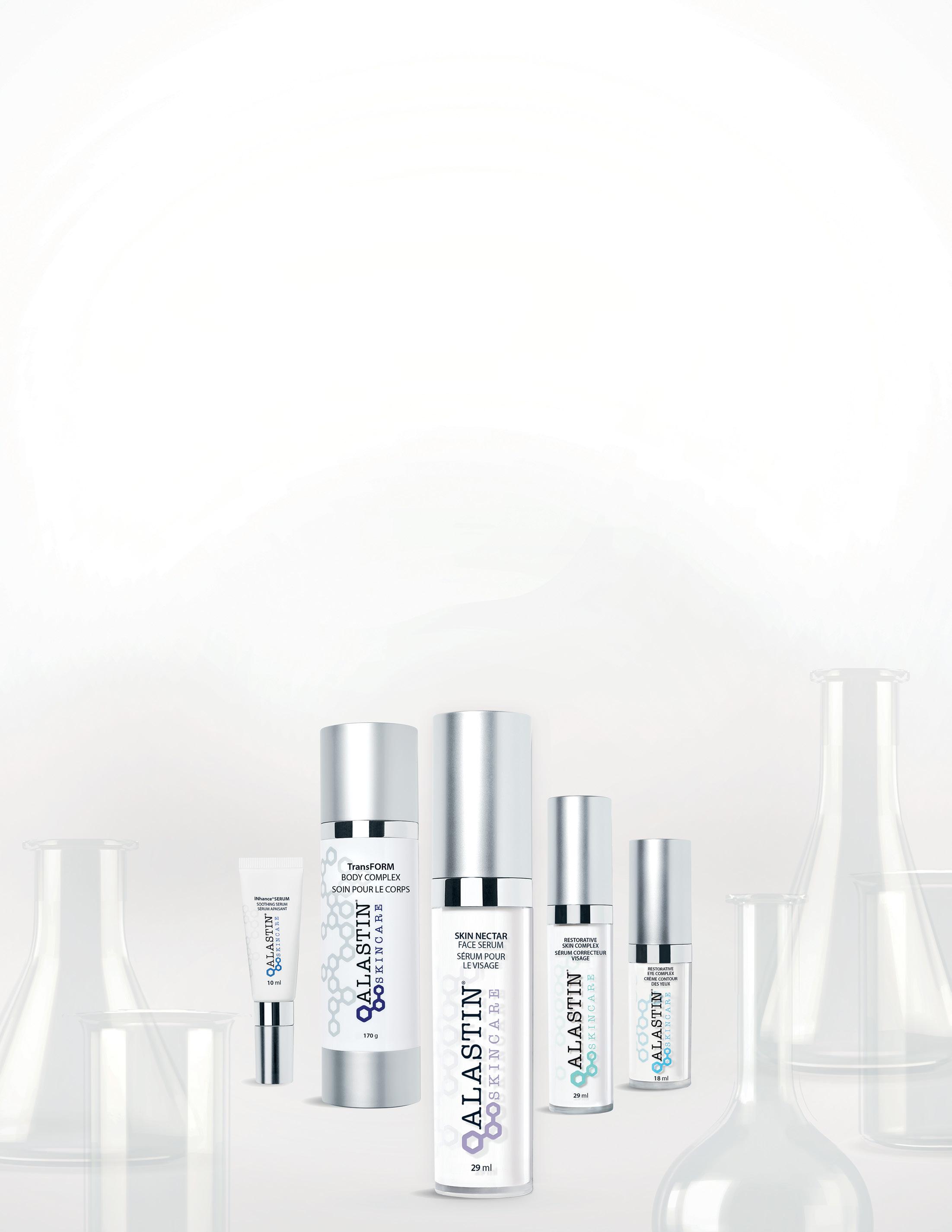
Fresh to Australian shores, ALASTIN Skincare is the leading pre- and post-procedure skincare brand in the U.S., providing a complete complement to in-clinic cosmetic treatments and for every day use. Founded in 2015, ALASTIN Skincare is a skin rejuvenation approach that helps to improve the appearance of fine lines, wrinkles and other visible signs of ageing – but it’s so much more than that, as it helps to visibly improve the outcomes as well as reduces the recovery times of both surgical and non-surgical procedures. Both the Daily Restorative Skincare and Procedure Support Skincare products are powered by a technology that supports the production of fresh collagen and elastin, helping to protect and renew skin for a more youthful appearance.
Acquired by Galderma in 2022, ALASTIN has become the perfect complement to a variety of injectable and laser based skin treatments. As a leader in the dermatological space, Galderma shares a commitment to innovation and making a positive impact in the lives of their customers; thus, this union is a match made in skin heaven. Together, Galderma and ALASTIN will continue providing breakthrough and high-quality products.
The ALASTIN Skincare range boasts innovative, scientifically proven and clinically tested products based on TriHex Technology®, which is a powerful blend of peptides, an elastin and collagen support system to help protect and renew skin for a more youthful appearance.
TriHex Technology’s® key ingredients include Tripeptide 1, which supports production of enzymes that remove damaged proteins from the extracellular matrix, helps minimise the appearance of inflammation and supports the production of collagen, and Hexapeptide-12 which supports fibroblast function and the production of elastin.
The science of TriHex Technology® works in three steps:
1. Clear out the old: A blend of peptides works with the skin to help remove damaged elastin and collagen that builds up as we age.
2. Room to grow: TriHex Technology® supports the skin’s natural ability to produce new, healthy elastin and collagen in the newly created space.
3. Maintain healthy looking skin: With daily use, TriHex Technology® helps maintain smoother, healthier, more youthful-looking skin every day.
How Galderma’s newly launched skincare range can help transform your patients’ surgical and non-surgical experience.
The Peri Procedure Range has been designed for patients undergoing common cosmetic treatments including injectables, lasers, body sculpting and more. This exclusive line of treatment-enhancing skincare products has been clinically proven to help accelerate recovery and improve results when paired with in-clinic cosmetic treatments.
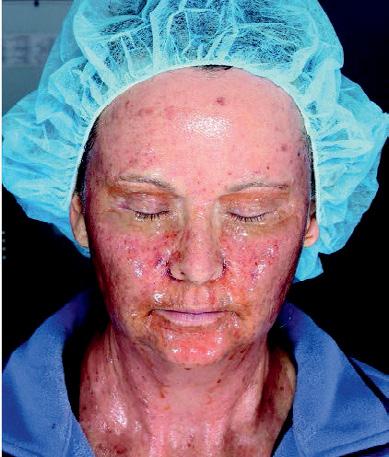
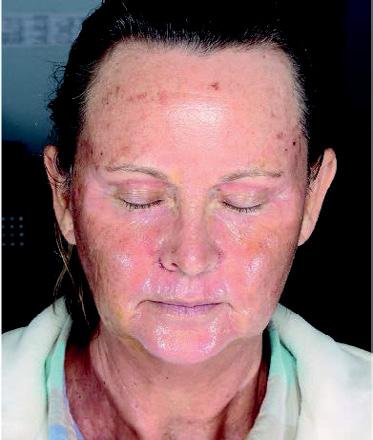

• Skin Nectar
Designed to be used in conjunction with lasers, microneedling and skin tightening, Skin Nectar should be used before and after treatment to prepare and strengthen the skin barrier, then soothe and support during the recovery phase until skin is healed. This award-winning product is recommended for twice daily use, designed to help achieve smoother, brighter and more youthful-looking skin. Skin Nectar includes Arnica Montana Extract as it provides a calming effect to the skin. Phytoene and Phytofluene are extracted from saltwater micro-algae that help address the appearance of pigmentary concerns and help protect the skin from further damage.
• TransFORM Body Complex™
Designed specifically for the body, TransFORM Body Complex™ should be used twice daily to achieve the appearance of firmer, more supple looking skin and apply after body-sculpting treatments to help
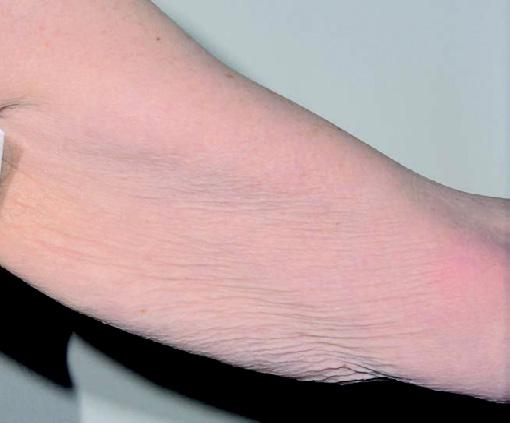
Baseline
Female, Age 60
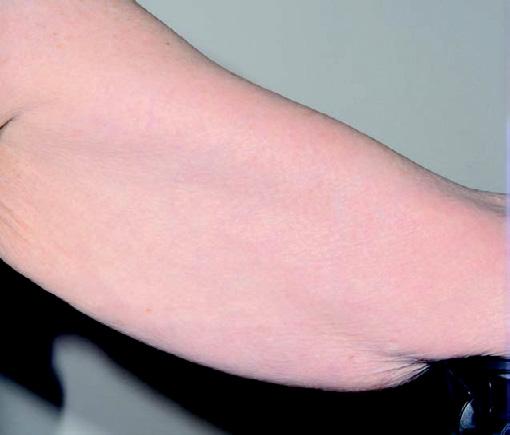
8 weeks
ALASTIN Skincare® Regimen: TransFORM Body Complex® applied to arms twice daily. No procedure was done.
Imaging Equipment & Analysis: QuantiCare 3D LifeViz® Infinity (Cumming, GA, USA) and roughness measurement.
Reference: Data on file at ALASTIN Skincare®. Individual results may vary. Photographs are unretouched.
complement results. In addition to improved skin hydration, TransFORM Body Complex™ can help provide a visible improvement of skin texture, firmness and crepiness. When used to complement body-sculpting treatments, the peptides in the patented LipoDRONE® delivery system help you achieve the appearance of even firmer, more toned skin on the body.
• INhance® Serum
ALASTIN’s INhance® Serum is formulated with ChromaFADE Technology® to improve the appearance of skin hydration and plumpness, and to maintain skin’s healthy look. Designed to be used after cosmetic injectables, the cooling applicator tip provides a soothing effect while the inclusion of Arnica Montana calms the skin and reduces the appearance of redness and swelling. Winner of New Beauty 2020 “Best Post-Injection Treatment’’ award, INhance® Serum can be used on the face, lip and eye up to four times daily for up to 10 days.
The Restorative Range contains a specialised line of products for daily use. The clinically-validated regimen boasts products that aim to deliver everything you need to help produce healthy elastin and collagen, protect, and renew skin for a more youthful-looking appearance.
• Restorative Skin Complex
For daily use, Restorative Skin Complex helps improve the appearance of fine lines, wrinkles, and other signs of ageing, as well as to help brighten the complexion for a more youthful glow. The inclusion of TriHex Technology helps to restore the appearance of plumpness and improve elasticity while antioxidants help protect the skin from environmental stressors, L-Ornithine and Hexapeptide 38 help restore volume to thinning skin and to improve elasticity.
• Restorative Eye Complex
Designed to help reduce the appearance of puffiness and dark circles, Restorative Eye Complex works to smooth the appearance of fine lines and wrinkles around the eyes. With daily use, Restorative Eye Complex will also help to promote a more even skin tone around the eye in as little as 4 weeks. This two-time award winning product includes Green Tea Extract which helps reduce the appearance of dark circles while Niacinamide and Tetrapeptide-30 help to brighten and even skin tone.
Prof Alan Widgerow has dedicated much of his impressive career to research in wound healing, which led him to spearhead ALASTIN Skincare’s Scientific Innovations team since becoming Chief Medical Officer in 2015. In 2021, Alastin Skincare was acquired by Galderma – and in 2022, Dr Widgerow was appointed Chief Scientific Officer at Galderma, where he is involved in aesthetic, prescription and cosmetic product science research and development. Here, he explains the science behind this revolutionary brand.
The basis of ALASTIN was based on ‘wound healing’ principles that I had gleaned over the years as an expert in the field. The first new approach was considering the skin as a chronic wound constantly challenged by outside influences (UV photodamage) and internal wear and tear. This resulted in multiple break down products forming and collecting in the skin in the form of fragments of collagen, elastin fragments and by-products of circulating blood sugar (glycation end products). These jammed up in the depths of the skin (known as the extracellular matrix, ECM) and prevented the communication between cells and proteins so that regeneration of new tissue was affected.
By using a unique panel of peptides and other active agents, we were able to clear the ECM of these waste products and replace them with new collagen and elastin. This was validated with gene studies, in vitro, ex vivo, clinical studies and biopsies. The end result was that this became established as a new routine prior to procedures (skin bed preparation), Further resulting in improved healing and improved patient comfort being demonstrated in these clinical trials. Soon after we established a maintenance range based on the same principles. This ‘ECM recycling and remodelling’ was a new concept introduced to the professional skin care community and has been very well adopted. It is unique to ALASTIN.
In the body products, how do the ingredients get to the layers beneath the dermis to actually work and enhance body contouring results?
Through a process of autophagy, another known concept introduced to this field of skin care, we found a way to break down lipid droplets which appear after non-surgical fat reduction procedures such as cryolipolysis and Radio frequency (RF) treatment of fat. These lipid droplets are very large and difficult to be absorbed, but importantly we showed that they cause a great amount of inflammation so this delay in absorption causing induration and swelling could be greatly improved by increasing breakdown and absorption of the droplets using other novel peptides and active agents.
Once again we showed that we could also speed up and improve results when combining this topical with procedures. It also has a component of skin tightening so that it can be used on its own as a body treatment product. We also designed a liposome that could get the products directly down the hair follicle and into the fat layer for it to function efficiently. All this has been published in multiple papers showing gene expression studies, biopsies and clinical trials validating all these actions.
Yes, the principles remain the same no matter who is using it and the ingredients are effective with a good safety profile. We constantly monitor our adverse reaction statistics and we are among the lowest in the industry overseas. This is extremely important because we are often dealing with skin when it is as its most vulnerable after a procedure.
Aurora Spa and Bathhouse is a must-visit for anyone visiting the Mornington Peninsula. NADINE DILONG shares her experience.
Where would you go if you wanted a spa day with friends? And I don’t mean a facial and manicure, I mean a wellness day including bathing, swimming, and a sauna. Truthfully, there aren’t many places in Australia that come to mind, but thanks to Aurora Spa & Bathhouse, we have one more option, and it’s a brilliant one.
Last year, after the Spa & Wellness Awards had been presented at the Intercontinental Hotel in Sorrento, VIC, I of course couldn’t leave the area without experiencing the newly opened Aurora Spa, which is located inside the refurbished Intercontinental Sorrento. Everything about Aurora is impressive. The reception area features a sophisticated shop where one can buy anything from swimwear to sunscreen, jewellery, books, and also, your very own bespoke bath soak and body scrub, which you can blend together from a myriad of bath salt ingredient options. What a gorgeous souvenir!
Upon getting changed and taking the obligatory photo of my feet in Aurora slides, I am given a quick explanation and instructions of the bathhouse. At first, I wasn’t sure what was so complicated about bathing that a briefing was necessary, but I quickly realised I was wrong. Aurora offers so many different experiences, you would be lost without the helpful staff!


“Each experience has instructions and explanations on a board upon entering so you don’t have to memorise everything you are told at the beginning, and there are water and tea stations throughout to keep you hydrated.”

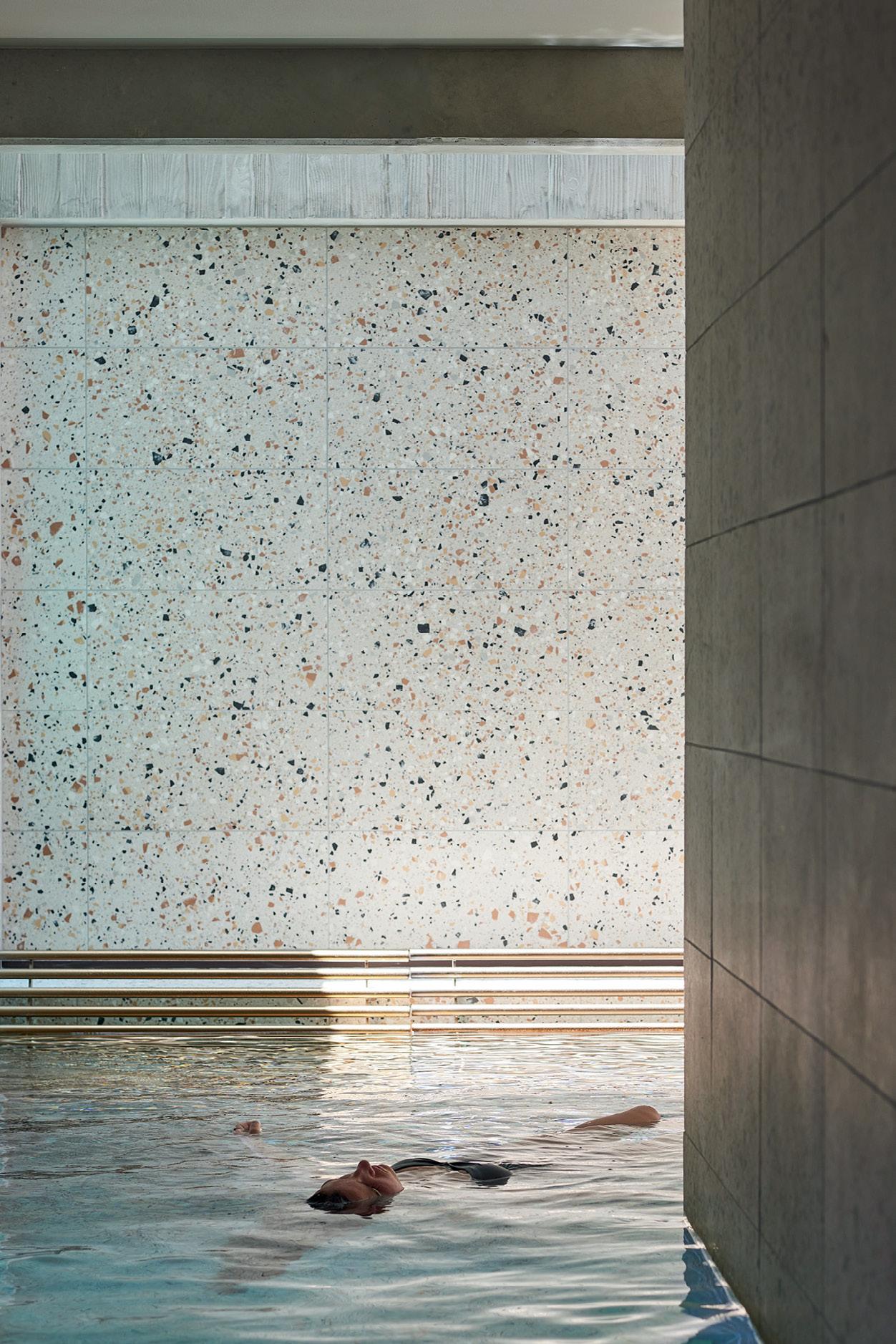
“The absolute highlight was the bathhouse’s glacial mist room, as it was unlike anything I had seen before.”
First, you take a scoop of the picturesque bath salt scrub mount and have a quick shower, before deciding where you want to start. The mineral pool including a reflexology footpath? The plunge pool with ice cold water to wake you up? The salt therapy suite? The steam room? The glacial mist room?



These are just a few options to keep you ‘busy’ while at Aurora bathhouse, and they’re all offered in the most modern facilities using high end equipment and luxurious designs. Each experience has instructions and explanations on a board upon entering so you don’t have to memorise everything you are told at the beginning, and there are water and tea stations throughout to keep you hydrated.
The absolute highlight was the bathhouse’s glacial mist room, as it was unlike anything I had seen before. I had been to snow rooms which are basically large freezers with snow so you can rub your body with the frozen water after your sauna session, but Aurora’s glacial mist room trumps this by offering a ‘rain storm’ option. At the push of a button, cold rain drops are flung around the room by cold air, and as your body tries to cope with the drop in temperature, I couldn’t help but smile – it was somehow reminiscent of playing outside in the rain as a child, a time when you don’t care about getting your hair wet or being cold; you’re just in the moment.
You could easily spend half a day just a the bathhouse and be completely content, but, there’s another part to Aurora which offers spa treatments such as facials and massages, and it’s worth making some time for. I booked in for a Himalayan sound and stone massage, which was a wonderfully relaxing treatment using ASPAR products and a lot of attention to detail. My therapist showed me cards with different mantras to choose from, which she then customised to my needs and gave me to take home at the end of my treatment.
I can see myself booking a weekend in Sorrento with my girlfriends and spending an entire day at Aurora. The team, led by wellness guru Lyndall Mitchell, have thought of every little detail that makes a spa experience memorable.
“You could easily spend half a day just a the bathhouse and be completely content, but, there’s another part to Aurora which offers spa treatments such as facials and massages, and it’s worth making some time for. ”
In its annual “Future of Wellness” report, the Global Wellness Summit (GWS) has provided a comprehensive overview of the key trends that will influence the wellness landscape in the coming year. The 120-page report delves into the significant shifts occurring in the wellness market, highlighting the emergence of two distinct markets and mindsets: “hardcare” and “softcare.” As the generational, income, and gender gaps continue to widen, the report predicts a future where these polarities in the wellness market will become more pronounced.
As the planet faces increasing challenges from rising temperatures, a new trend known as “climate-adaptive wellness” is set to emerge. This trend encompasses a wave of innovations designed to cool bodies, homes, and cities. From advanced cooling technologies to sustainable practices, this trend reflects a growing awareness of the impact of climate change on overall wellbeing. Our baking planet is disrupting travel, with people moving away from traditional “hotspots,” trading beaches and deserts for mountains, the Mediterranean for Scandinavia, and summer vacations for fall or spring ones, in a move towards what’s being called “cool-cations.”
Pilgrimages, the most ancient form of travel, are experiencing a resurgence with a record number of new and revitalised pilgrimage trails worldwide. This trend signifies a shift towards slow, spiritual travel, attracting new generations seeking meaningful and transformative experiences. Resorts are now incorporating pilgrimages into wellness programs, offering transformative experiences between sacred sites, religious services, and cultural ceremonies. From a wellness perspective, this trend has serious legs: a pilgrimage is a metaphor for the path to enlightenment, engendering slow, meditative travel, and facilitating deeper engagement with our surroundings to foster a sense of awe.
A cultural shift is underway as social and emotional wellness offerings for men gain traction.




From dedicated retreats to apps, there is a rise in initiatives encouraging men to connect with themselves and each other, challenging traditional notions of masculinity. The trend anticipates a more nuanced, globally distributed approach to social and emotional wellness for men, challenging traditional views of masculinity. In this trend, we explore how these so-called “softer” forms of wellness will serve as a much-needed catalyst for male connection. Looking further ahead, we anticipate that social and emotional wellness offerings for men will become more nuanced, more evenly distributed across all stages of life, and more global.
Addressing the often-neglected period after childbirth, the report highlights a new era of comprehensive postpartum care. Various approaches are emerging to support new parents in navigating the physical and mental challenges that arise during this crucial time. The future envisions a dramatic change in the post-birth experience, aiming to make integrated medical and wellness support accessible to all new parents. True postpartum wellness would mean a dramatic change in the current post-birth experience, with access to an integrated medical and wellness team that could deliver a holistic, empathetic approach to support new parents’ physical and emotional wellbeing, including education, proper nutrition, physical therapy and pain-focused therapies.
Longevity has become a cornerstone of the health and wellness industry, with longevity clinics emerging as the fastest-growing business genre. No longer a mere trend, longevity has become a foundational industry pillar, influencing everything from personalised plans based on genetic and biomarker testing to advancements in senolytics and telomere regeneration. The trend explores the growth of longevity clinics and their transformation into high-end wellness destinations. More high-end gyms (such as Saint Haven in Melbourne) are becoming full-blown longevity clinics, offering work-ups (preventative diagnostic testing, scans, etc.) along with their workouts. If wellness resorts have been more
about “soul” than scans and stem cells, now a growing number are becoming highly-medical longevity destinations.
The report notes a shift in weight loss approaches, with the wellness world integrating more holistic and whole-health methods. Traditional weight loss businesses are adapting to new trends, providing wellness companion programs for individuals using pharmaceutical weight loss options.
With the emergence of sports-meets-wellness travel, destinations are encouraging active participation rather than mere spectating. The future: evidence-based methods that could help get people off these “forever” drugs and that specifically improve their health while on them.
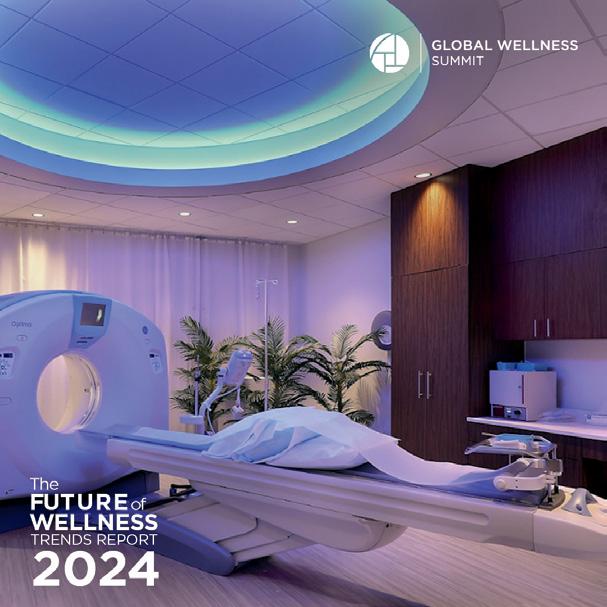
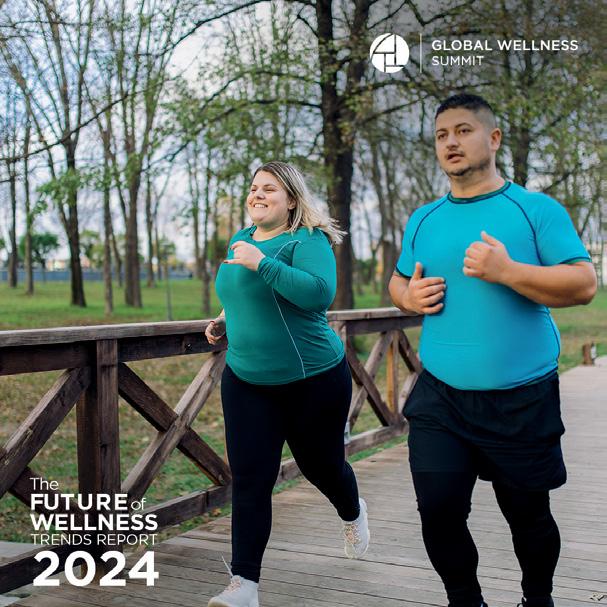

Breaking away from solo gym sessions, more people are embracing social and empowering sports activities. This trend also extends to elite athletes, who seek hospitality destinations that support their well-being and training needs, indicating a convergence of sports and hospitality. Sports tourism (people traveling to watch events) is a massive market, but more destinations are moving people from spectators to sports participants. The 2024 Paris Olympics will host a pre-Games marathon for regular folks so they can experience the thrill of the course. This summer’s Tour de France will, for the first time, open up new cycling routes near the course, so biking enthusiasts can jump in. Hospitality groups are thinking beyond “training like an athlete” and actually organising competitive play: swimmers, runners, and tennis and pickleball players really want to compete with people at their level. So, in 2024, add a new category to the tourism lexicon: sports-meets-wellness travel.
8. The Home as High-Tech-Health-Hub Wellness-focused homes are evolving into high-tech health hubs, incorporating medical-grade home health monitoring systems and smart furnishings that adjust to individual well-being needs. This trend represents a broader integration of technology into everyday
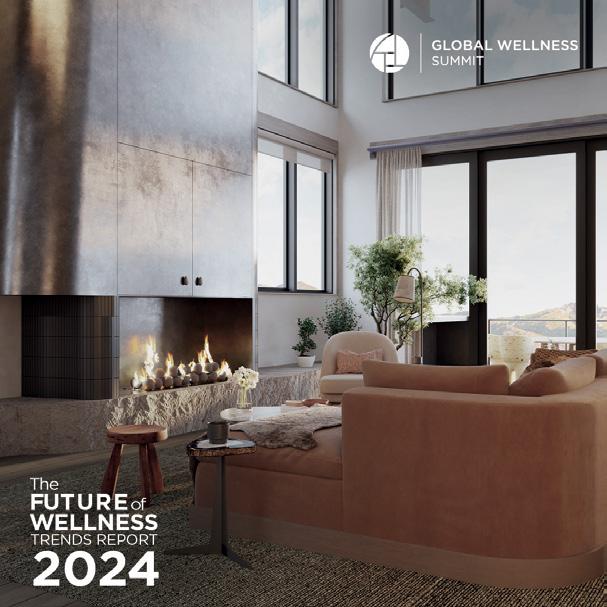
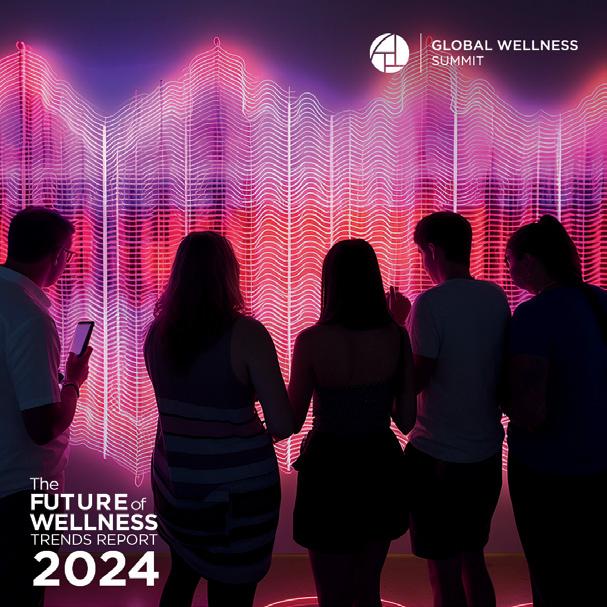

living spaces. In a postpandemic era marked by increased time spent at home, health-athome is taking bold new directions. The trend includes “Home Health Care,” where homes are becoming advanced “outpatient” care centers powered by digital health services— from fully-integrated telehealth to new health monitoring and diagnostic technology, reducing reliance on in-person interactions with practitioners.
9.
The intersection of art and wellness is taking a new turn with immersive experiences powered by technology like generative AI and spatial sound. Museums, resorts, and public spaces are embracing art forms designed to actively boost mental well-being, transforming art into a multisensory journey. Museums, hotels and spas are incorporating more and more multisensory art experiences into their offerings and, in doing so, are prioritizing wellness as an integrated offering. Case in point: the Mandala Lab at the Rubin Museum in New York City combines video, scent, sculpture, and sound based on Buddhist principles into one holistic, spiritual exhibit. At the Termemilano spa in Milan, Italy, a video skyscape of stormy skies surrounds a hydro pool, creating an unmatched moody vibe. Six Senses resorts are creating multisensory somatic experiences, like bio-alchemy sculptures infused with scents, flotation experiences suffused with ocean sounds, or geodesic domes with vibroacoustic floors.
GWS chair and CEO, Susie Ellis, explores “under the radar” trends emerging from the recent Global Wellness Summit, providing a glimpse into additional developments shaping the wellness landscape. As the wellness market continues to evolve, these trends offer valuable insights into the diverse and dynamic future of well-being. The GWS report serves as a roadmap for businesses, practitioners, and enthusiasts seeking to navigate and capitalise on the transformative changes ahead.

Spa aims to help people overcome mental health problems and addiction.

Nestled in the mountains of Los Angeles, Carrara is an ultraluxury treatment centre for addiction that blends wellness and recovery, started by Cliffside Malibu’s former CEO, Richard Taite, a recovered addict turned sober living and treatment centre mogul. Carrara is providing comprehensive and personalised recovery programs in a luxurious setting. We chatted to Richard and Carrara’s newly appointed Spa Director, Crystal Webb, to learn more about how spa treatments help people learn self love.

Carrara was a true labor of love. I’ve done treatment for 15 years and this time I wanted to create something different, I wanted to redefine luxury treatment. I brought together a team of the finest clinicians whom I have known and worked with most for over ten years and built a program from that experience and passion. We have a unique approach
to treating substance use and mental health. The clinical team built a curriculum incorporating somatic trauma therapy and holistic wellness with the more traditional therapeutic modalities.
Along with the strong clinical program, we really focused on a serene, luxurious setting where people can really focus on healing. Our houses are set in peaceful, quiet areas, with gorgeous views in the most exclusive areas in Los Angeles. Each house has six private bedrooms with en suite bathrooms to provide a private, comfortable place for each person to recover.
Carrara is extraordinary in the sense that there really isn’t anything else out there like it. It’s not just about getting people sober. This program is about finding out who you are and then thriving. It’s about giving people the lives they were meant to live. And of course we are the only treatment, wellness, and Spa centre in the country.
Carrara handles a wide variety of challenges, but at the root of it, we treat addiction, substance dependency, trauma, and mental health.
Carrara Treatment Wellness & Spa has a location in Malibu, right on the beachYou offer spa treatments like facials and massages as part of the programs – why do spa treatments matter on the road to well-being?

Great question, because in the 15 years that I was the CEO of my last centre and the thousands of people we’ve treated, I have yet to find a person that loved themselves. One of the many ways to achieve self love is through self care, which graduates to self esteem and then self love. People typically don’t relapse when they have self care and self love. All of our spa treatments have a clinical component and will be supported by the therapists and clinical team. Having somatic work as the core of our program includes somatic resourcing, but also doing the actual physical body work, getting people connected and
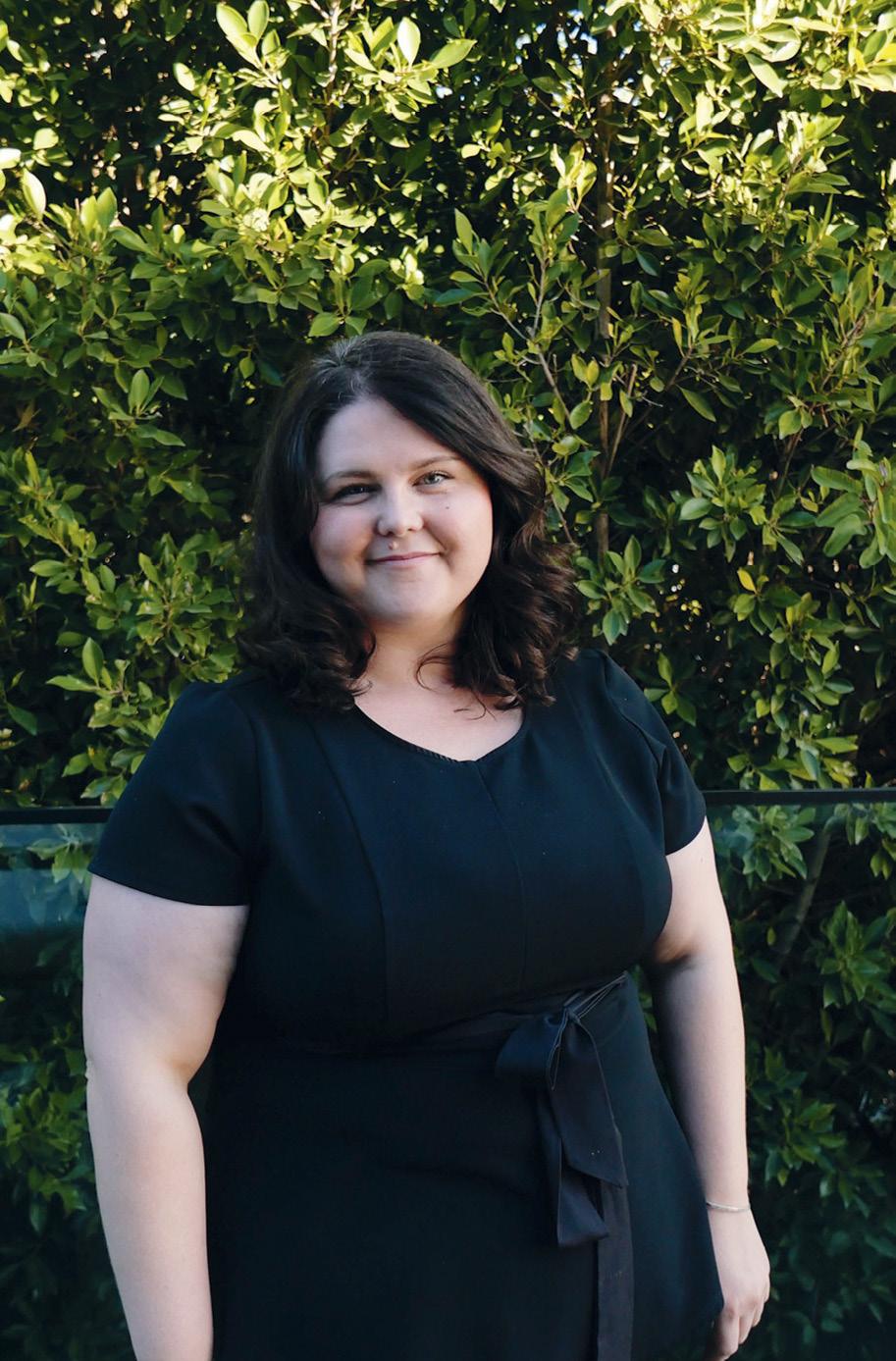
Crystal, please tell me a bit about your professional experience in the wellness
Our Wellness Spa is centred on kindness, treatment, and maintainability of a sound body and mind. It was this style that landed me in my previous position of managing Ojai Valley Inn’s Spa, a world class location whose focus was to bring luxury Spa and Wellness not only to its guests, but to all those participating in its experience as well. At Ojai, I developed unique treatments and nurtured my staff to create that authentic connection and personalised care which celebrated wellness on the global stage.
Working at Carrara is giving me a chance to push my creativity to the next level and innovate treatment plans to be more impactful and personalised to the clients’ specific needs, and of course the opportunity to help this population is the most rewarding career I can imagine.
What are some of the considerations you have to keep in mind when treating patients that are recovering from trauma/addiction etc?
Each patient that begins their journey into recovery is going to be different and nuanced. Carefully choosing the correct therapies to
support their overall plan for health and strategising with the whole of their health team is a must.
In what way do spa treatments help people on the road to recovery?
A massage focused on relieving the body of built-up adhesion points is just as much a physical relief as it is a mental one. Spa treatments have the ability to break down all kinds of traumas if done with complementary therapies to create a synergistic approach. They reinforce the idea of returning your body back to a state of health while simultaneously building a foundation of strong habits of selfwellness habits. When treatments are paired with strong clinical support, a patient can develop a strong and solid path to recovery.
Can you explain a few treatments you offer at Carrara Spa?
Carrara will offer massage treatments that incorporate lymphatic drainage and cranial sacral therapy, both modalities assist with a gamut of health concerns. Facials repair and restore delicate facial skin while body wraps and scrubs nurture as well as rehydrate and rejuvenate the patient.

Recently, there has been a significant upsurge in the fascination and engagement with alternative healing practices. Reiki, energy healing, and shamanism have emerged as holistic avenues for enhancing overall well-being and addressing physical, emotional, and spiritual health. In this essay, healing expert Mariane Ferreira will thoroughly examine the distinguishing characteristics of these healing methods, elucidate the reasons behind their burgeoning popularity, and offer guidance on their integration into a personal wellness routine. Furthermore, she will explore the circumstances necessitating consultation with a shamanic practitioner and provide advice on verifying their qualifications.

belief that health and wellbeing are restored when energy flows freely.
Incorporating Holistic Healing into Your Wellness Regime
So, what are the differences between these practices? Let’s explore the reasons behind their resurgence in our modern world.
Reiki: The Healing Touch - often described as the “universal life force energy,” is a Japanese healing technique that dates back to the early 20th century. Practitioners of Reiki believe that this energy flows through all living beings and that channeling it through their hands can facilitate healing and balance in the recipient. The point promotes relaxation, reduces stress, and enhances the body’s natural ability to heal.
Energy Healing: Balancing the Energetic Body - is a broad term encompassing various practices. At its core, energy healing posits that the human body is not just a physical entity but also an energetic one. It is said that imbalances in the body’s energy system can lead to physical, emotional, and spiritual ailments. Energy healers work to rebalance these energies, often using their hands to detect and manipulate the energy fields around the body. These practices are often grounded in the
Shamanism: Journeying to the Spirit World – in contrast to Reiki and energy healing, is a much older and more diverse practice that spans cultures across the globe. Shamanism is centred around the belief that there is a spiritual realm that can be accessed by individuals with unique abilities known as shamans. These shamans act as intermediaries between the physical and spiritual worlds.
“Energy healing, in particular, is a fascinating field that bridges the gap between science and spirituality. As our understanding of energy evolves, so does our capacity for healing,” Mariane Ferreira said.
In recent years, Reiki, Energy Healing, and Shamanism have been experiencing a resurgence in popularity for several reasons. “In our fast-paced world, people seek holistic health and well-being approaches. Reiki, Energy Healing, and Shamanism offer unique pathways to healing that resonate with those looking to address not only physical ailments but the deeper aspects of their being.” Mariane acknowledges the popularity of these modalities.
“One appointment can provide immediate benefits, but for lasting transformation and continued wellbeing, incorporating regular sessions into your wellness regime is often recommended.”
“Just as you would schedule massages or therapy sessions, ongoing Reiki, Energy Healing, or Shamanic practices can yield profound and sustainable results.”
Mariane offers guidance on integrating these practices into one’s life:
Holistic Wellness: these practices offer a holistic approach to healing that addresses physical but also emotional and spiritual aspects.
Stress Reduction: people are turning to these practices to manage stress, anxiety, and the pressures of modern life.
Self-Empowerment: these practices offer a sense of empowerment and control over one’s health and spiritual journey.
Cultural Curiosity: People are curious about different cultures and traditions as the world becomes more interconnected.
Scientific Interest: Emerging research in fields like quantum physics and neuroscience is beginning to provide some scientific backing to the concepts of energy healing.
Regarding Reiki, energy healing, and shamanism, regularity is often crucial to experiencing their full benefits. While a single session can offer immediate relief and insights, the true potential of these practices unfolds gradually over time. The benefits of regular practice in Reiki, energy healing, and shamanism extend beyond the immediate relief of stress or discomfort. Over time, you may experience Deep Healing, Increased Awareness, Spiritual Growth, and Emotional Resilience.
One appointment can provide immediate benefits; incorporating these practices into your wellness regime as recurring treatments is often the most effective way to unlock their full potential. The key is establishing a personalised plan in consultation with a qualified practitioner, paying attention to your intuition and needs.
Ensuring that you work with a qualified practitioner in Reiki, Energy Healing, or Shamanism is essential for your safety and to receive the intended benefits of these practices. Here are some steps to help you determine whether a practitioner is qualified: ask about their training and certifications, their years of course, and the number of clients; read reviews; ensure they follow ethical standards and maintain professional boundaries; seek recommendations from trusted sources; listen to your intuition; and ask if they stay updated with ongoing education and training. “Selecting a qualified practitioner is paramount. I often recommend clients to trust their intuition when choosing someone to guide them on their healing journey,” Mariane added.
When seeking a Shamanic practitioner, Mariane emphasises the importance of due diligence:
Experience: Look for practitioners with substantial experience and a genuine connection to the shamanic tradition.
References: Seek recommendations from trusted sources or ask for references from previous clients.
Training: Inquire about the practitioner’s training and lineage within the shamanic tradition.
Intuition: Trust your intuition. A qualified practitioner should resonate with you spiritually, fostering a sense of trust and comfort.
In summary, the renewed popularity of Reiki, Energy Healing, and Shamanism underscores their appeal as holistic approaches to overall well-being. These practices offer relaxation, empowerment, and a connection between the past and present. Consistent engagement is critical to realising their full benefits, and selecting qualified practitioners is vital. This resurgence reflects a significant shift towards a more comprehensive approach to personal health and spirituality today.
Mariane Ferreira is a healing expert based in London.
oceanic-heal.com
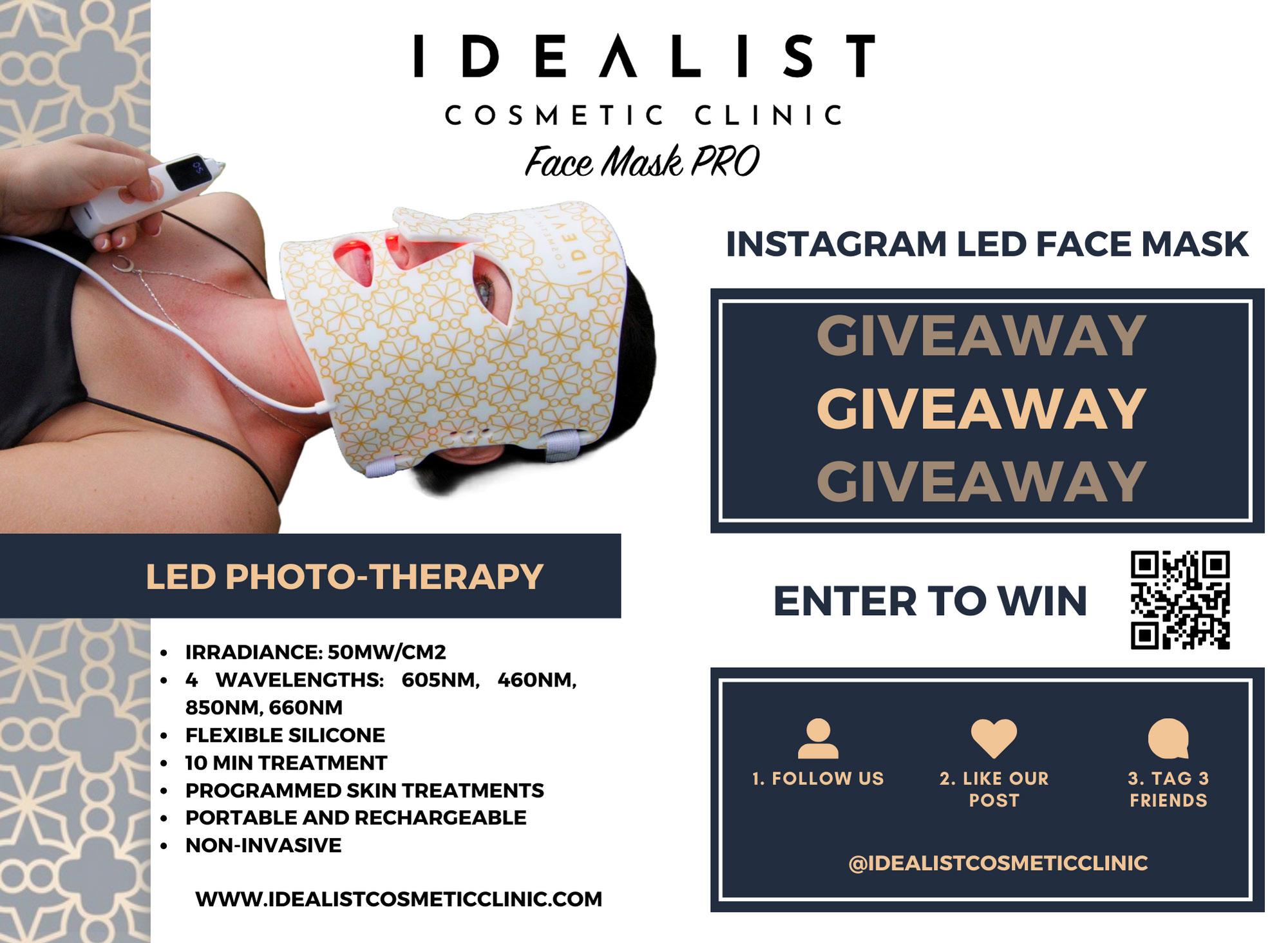


MICHELLE REEVE shares her learnings from the 2023 Global Wellness Summit in Miami.
Hosted in Miami Florida, the 17th annual Global Wellness Summit for 2023 recognised the radically changing wellness economy and how it’s experiencing quantum leaps in consumer demand since the pandemic. With the fitting title, “A Time of Transformation”, the event brought together leading experts, thought leaders and visionaries merging themes from business and investment into those industries disrupting and transforming wellness; from real estate to mental health, technology to beauty, and neuroscience to luxury hospitality and sports.
The Wellness Revolution… and what it means for us?
Since the Global Wellness Institute has been measuring the economic impact of wellness internationally, we have watched this market grow from 3.4 trillion dollars (all dollar amounts in this article refer to USD) back in 2013 to the whopping 5.6 trillion dollars most recently reported in 2022; almost doubling in a timespan of less than a decade. It appears that wellness is immune from the recessions, interest rates and crippling pandemics that we have been unable to escape over recent years.
These dynamic native wellness industries are reported from each country from around the world. Sectors ranging from the usual suspects including thermal springs, natural medicine and wellness therapies including fitness to more emerging mainstream markets being led by industries such as architecture, town planning, travel, tourism and workplace wellness.
In particular, the day spa industry has grown at an incredible rate of 22% and was valued at 105 billion dollars

in 2022. Spa is growing at a rate of 8% annually and is expected to be worth more than 150 billion dollars by the year 2027. Also of note is the personal care sector encompassing cosmetics and anti-ageing products. Currently valued at a 1.09 trillion dollars, this is expected to grow by almost 50% to reach 1.4 trillion in the year 2027.
While this event offered so much to explore, what appealed to me was how wellness was moving away from luxury and toward elements that infiltrate modern day life. With the compounding growth in wellness treatments and skincare, how does this impact us as operators and how can we harness the wellness benefits in a real and authentic way with what is happening in women’s health, ageing and longevity?
Dr Pooja Lakshmin, Psychiatrist, author and industry disruptor is an advocate for women’s wellness and is quick to call out the barriers to entry. Her presentation was a discussion on how our social systems do not always support our wellness model. This is a problem especially for women, and her aim is to bring a slew of compassionate tools to the wellness conversation. Dr Lakshmin’s insights are frank,

practical and to the point, “You can’t meditate your way out of a 40hour work week without childcare.”
Self-care can sometimes feel like an irrepressible to-do list and the overwhelming barrage from social platforms is starting to stress us out. She likens this to creating empty wellness calories. She questions, “How do we approach our wellness practices? Is it with a mindset of reverence and nourishment or does our attitude adopt a framework of expectation, comparison and judgement?”
Dr Lakshmin reminds us that as leaders we steer the path for our teams by taking steps toward wellness throughout our day. These small but consistent commitments in time trickle down and out to not only shape our own health but affect our employees, our guests and consumers. And it’s no surprise that our communities are hungry for a deeper conversation around wellbeing. It serves not only our businesses but our consumers to be more reflective and intentional around our products and services.
We are offered a prescriptive insight into the fundamentals of selfcare. A recipe it seems that has women clearly in mind. Self-care by its very nature is an inside job relying on these four guiding principles:
1. Setting boundaries. In practice, this distils down to basically doing less things. The simple but never easy practice of merely saying no.
2. Showing compassion. We are an industry of compassionate empaths.
But here’s the catch; the commitment to showing more compassion is to yourself first. I know, right?
3. Clearly defined values. Getting really articulate on what matters to you and making those your daily priorities. We can often list those principles that are important to us but are they embedded into the operational aspects of our life, hour to hour, moment to moment?
4. And lastly, how we negotiate power. Interestingly this isn’t about fighting for control. Instead she welcomes us to give power back when it isn’t our responsibility, or alternately it could mean asking for help. Sometimes it’s a matter of outsourcing or simply the act of letting go of those things that aren’t aligned with our values.
As an industry she encourages us to continue to evolve with these principles of self-care. And to realise the wellness and business opportunities to build after care experiences into our wellness models for our guests.
Rewiring instead of Retiring
Aradhana Khowala, CEO of Aptamind Partners, is unafraid to explore those taboos we shy away from, and this presentation was no different. Today we had a frank conversation about how we age and provokingly, how we die. Essentially, a dive into the demographic tsunami that is disrupting the way we age, live, love and work.
With the advances in medicine and wellness, we no longer divide our lives into the traditional three-part paradigm of education, career and retirement. This expanded timeline has added another whole quarter to our lifespan impacting our longevity. This has serious implications on our careers, partnerships, communities, families, economies. So many of us have more years ahead than previous generations expected.
Are we ready to explore this extended longevity? Are we ready for the long haul, and are we prepared for 50-year careers? We need to get clear on how we think about lifestyle.
Today there is an equal number of people over 50 as there are under 50. The wealthy OECD and western countries are experiencing what Aradhana is calling a demographic hangover and are bearing the brunt of the surge in ageing populations. This is putting pressure on
Aradhana Khowala, CEO of Aptamind Partners
social security, healthcare and government budgets. What does that mean for us? One thing we can be certain of is that we will be working longer and need to prepare for the work life marathon.
We are not just happy living longer; we want to live better. And this takes money. It’s the over 60’s who control the cash with boomers responsible for two thirds of the consumption and most of the economic and political power. They are also least affected by higher interest rates and economic downturn. Why? Because they’ve already spent on the big ticket items.
They have more time and more disposable income. Their top priority is travel, wellness and leisure. As a wellness industry, how are we servicing, interacting and enticing this demographic? We know that every $800 increase per annum we spent on wellness increases happiness levels by 7% and life expectancy by 1.26 years. And health and happiness is a key driver for this growing group.
But here’s the paradox, the older you get, the more consumption you drive, yet only 5 to 10% of the marketing and advertising spend is currently targeted at people over 60. Sadly, when the over 60’s are portrayed in the media, 28% of the time it’s generally in a negative light compared to 4% of their younger cohort. These assumptions underestimate that most people in this demographic are generally in great health and have a focus on movement, self-care and wellbeing. The new economy is breaking the mould as to what 60 looks like. This is turning into a time of rebirth; you could be going back to school, starting a new career, essentially re-skilling. Health span and the quality of our lives then becomes as equally compelling as our lifespan.
Khowala’s parting message invites our industry to be part of this pro-age revolution. We are encouraged to embrace the 100year life with optimism, learning and leaning into maximising our potential. This is a time when science, knowledge and funding come together. She finishes with, “In the next 20 years we are going to see an intergenerational wealth transfer of $40 trillion dollars from the boomers to the millennials, and guess what, they care about wellness even more, up to 8% more. They are the demographic seeking more personalisation and tailored wellness solutions.” So we watch as the intergenerational wellness conversation continues!
“It’s important to remember medicine cannot move forward without data.”
Over a billion women globally will be in menopause by 2025, and Dr Somi Javaid, CEO of HerMD, is tackling the crisis in women’s health care head-on. Revolutionising women’s wellness, she is unveiling the taboos and stigma around sexual wellbeing and taking women’s healthcare mainstream. The topic on today’s agenda, Menopause; and for most of us, we were surprised to learn how unrecognised menopause is within the current medical model.
As women, we will spend at least 40 – 50% of our lives in menopause. And the statistics are not that great. While 85% of us will experience significant symptoms, only around 20% (that’s one in five) OBGYN doctors are confidently trained to treat menopause and its indications.

There are more than 30 symptoms associated with menopause. This goes way beyond hot flashes and includes cognitive decline, bone loss, muscle loss, repeated infections (which can be fatal), increased risk of cardiovascular disease, weight gain and the list goes on. At least 30% of us will stop having sex due to infections, pain, libido and fatigue. Dr Javaid is taking on the challenge and transforming advocacy for women’s health with solutions targeting both the provider and the patient.
Menopause touches every facet of a woman’s life. Women are leaving the boardroom (and the bedroom) in droves, and she’s blaming the obvious gender disparity in healthcare. The barriers to health care for women are real. Within our medical system there are not enough female decision makers (or at least in decision making rooms) despite women outnumbering men 3 to 1 within the medical model. Even more worrisome, less than 5% of women hold leading practitioner roles.
Worse still is the access or distribution of funding. Of the 330 billion dollars of investment capital deployed in the US less than 2% went to female founders in this segment. And the irony? Female entrepreneurs in this field delivered outsized returns compared to their male counterparts due to their efficient use of capital.
Women are also underrepresented in clinical research. It was not mandated for women to be included in clinical trials until just 30 years ago. And even as recently as 2023 women are only included in three out of every four clinical trials. In the US, less than 1% of the billions of dollars invested in research is for female health care.
Dr Javaid reminds us, “It’s important to remember medicine cannot move forward without data.”
She states that the medical community prepares us well for the limited child bearing years, yet we are in menopause for half of our life. She can see how the current medical system has arrived at the point, with 93% of medical residents claiming they are completely unprepared to treat menopause. It’s clear there is a provider bias. Historically OBGYN doctors were men. As a result women are more likely to be prescribed anti-depressants instead of addressing the real concerns or symptoms of menopause.
Dismissing women’s health has serious outcomes. When women become invisible, are ignored or not taken seriously, lives are at stake. Women are more likely to die of a heart attack than a man. We wait longer for pain medications. And statistically there is a reported 4-year delay in diagnosis for female health care decisions. All costing lives, money and suffering, affecting not only women, but their families, partnerships, communities and workplace.
Dr Javaid reminds us of the Women’s Health Initiative study where this all started going very wrong, delivering a massive disservice to women’s health. Conducted in the early 2000’s the study was aimed at the safety of hormone therapy in postmenopausal women. It suffered significant flaws that not only compromised its findings but the impact in effectively treating menopause for the next 25 years. Confusing, inaccurate and statistically misleading, it led to hormone replacement therapy being withdrawn; the main way of treating menopausal symptoms. Interestingly, although the medical community has dismissed the findings, the study has never been reversed or publicly corrected.
Dr Javaid does leave us with hope. The advances in hormone replacement therapy is offering most women the option of an effective treatment. There are other options and modalities including lifestyle modification along with pharma and non-pharma relief for symptom treatment including hot flashes. Femtech is also coming to the party with innovations in female sexual health.
The impacts are real. Every year, 1.8 billion dollars are lost as women are being sidelined at work due to menopause (900,000 women left the workforce in the UK last year alone). For Dr Somi Javaid, this just provides more motivation to her commitment to a patience centric model to smash the status quo and revolutionise medicine forever.
This year the Global Wellness agenda clearly illustrated a global industry with unprecedented momentum, committed to change. It is showing a promising future that is more serious and sciencebacked, as well as more innovative and authentic. Women are taking the centre stage leading the momentum and calls to action to the wellness conversation.
About the Global Wellness Summit: The Global Wellness Summit (GWS) is an invitation-only international gathering that brings together leaders and visionaries to positively shape the future of the $5.6 trillion global wellness economy. Held in a different location each year, Summits have taken place in the U.S., Switzerland, Turkey, Bali, India, Morocco, Mexico, Austria and Israel. The 2024 Summit will be held in St Andrews, Scotland.
Michelle Reeve has a life passion for wellness and natural medicine. She is the Founder, Formulator and Managing Director for Waterlily Australasia, a leading wellness spa brand stocked in day spas, clinics and salons in Australia and New Zealand and offered online globally. She is an industry advocate, thought leader, writer and guest contributor.


In the quest to live not only longer, but better, SAMANTHA DUNN explains the latest innovations that will make a serious difference to your patients’ quality of life.
In the fast-paced world of wellness, innovation is key to staying ahead of the competition. Forget incremental tweaks or new fad ingredients – clients are increasingly seeking transformative experiences that go beyond skin deep to deliver better results with less effort in less time. The solution? Embrace the biohacking revolution and give your medispa an undeniable edge.
What is Biohacking, exactly?
‘Biohacking’ sounds like a world of sci-fi gadgetry limited to tech nerds, which is not surprising given its origin. The term was coined in 2004 by Silicon Valley IT guru, Dave Asprey, when he was looking for solutions to his own chronic health problems.
Realising that the human body is a collection of (at least) 11 organ systems, Asprey and a growing wave of researchers set about finding ways to ‘hack’ each system to create optimal functioning of both body and mind.
Sounds unnatural? Actually, it’s quite the opposite. Biohacking recognises Nature as the ultimate healer. All biohacking does is to create the ideal environment – internally and externally – to let every tissue and biological process thrive.
Biohacking is not one thing: it’s an umbrella term for any device or practice that facilitates optimal function. Asprey describes biohacking as “the art and science of becoming superhuman”.
How can you leverage this movement in your business?
First, be aware that many biohacking practices come down to lifestyle. Focusing on five key pillars of exercise, nutrition, sleep, mind and work, biohacking enthusiasts use practices such as meditation, breathwork, HIIT training, intermittent fasting, supplements and journaling to improve health, reduce stress, increase productivity, amplify performance and extend life.
However not everyone has the desire or discipline to perfect their lifestyle, and even die-hard biohackers want professional therapies that can deliver big results fast. That’s where your medispa comes in. Here are six biohacking modalities that you can use to set your spa apart and unleash your clients’ potential for health and vitality.
Diagnostics - your blueprint for personalisation
“What gets measured gets managed” is a well-accepted maxim in business, and the same applies to wellness. When seeking improvement in any aspect of health or beauty, it’s important to know your starting point. Spas have long relied on consultations and skin analysis, however there are many other diagnostics that enable additional services to create truly holistic, personalised programs for your clients. These diagnostics take two main forms: scans and lab tests.
3D Body Scanning and Body Composition analysis provide precise baseline data to guide body improvement programs, motivate the client and track their transformation journey. Heart Rate Variability (HRV) is a low cost assessment

that provides valuable insight into your clients’ stress response, and informs effective mind-body programs. Bodyworkers can improve their treatments using Postural and Gait Analysis, potentially partnering with physiotherapy, chiropractic or osteopathy practitioners.
Coming soon to Australia, AI-facilitated medical diagnostics that provide a more preventative approach to cardiovascular and brain health, allowing medispas to participate in a continuum of care. Consider partnering with a Functional Medicine doctor to stake your place at this frontier where medicine meets wellness.
Functional medicine lab tests uncover the root cause of any health problem by looking at hormones, food intolerance, oxidative stress, heavy metals, the microbiome and DNA. These powerful diagnostic tools help you understand the unique tapestry of each client, allowing you to create highly personalised, effective programs for rejuvenation and transformation.
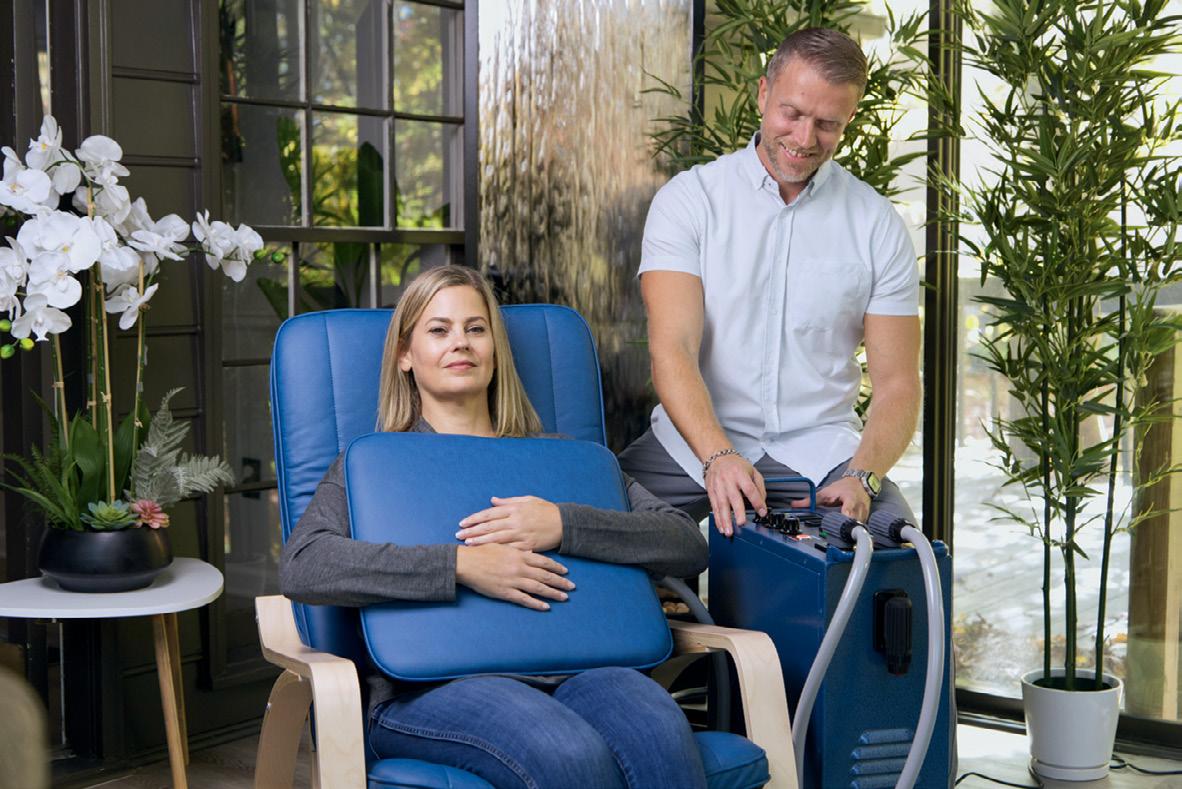
Energy therapies are revolutionising wellness, harnessing the potent energy of specific frequencies to repair, rejuvenate and revitalise. Many spas are already using LED therapy for various effects, such as red and near infra-red to stimulate collagen production or blue light to target acne-causing bacteria. But did you know that light can also be ‘injected’ via fibre optic threads? A variation on Cold or Low Level Laser, this innovative therapy was pioneered by Weber Medical and has a staggering array of applications, ranging from melting fat and promoting hair growth through to shrinking cancer tumours.
Another therapy worth considering is Pulsed ElectroMagnetic Field therapy, or PEMF. Originally developed by NASA to protect the health of astronauts in space, this innovative therapy recharges the body using Schumann Resonances – the frequencies of the Earth’s magnetic field, to stimulate circulation, promote cellular regeneration, reduce inflammation and relieve pain.
As growing evidence nudges Energy Medicine increasingly from ‘woo woo’ to mainstream, expect to see many new devices that utilise light, sound and the spectrum of healing frequencies.

Saunas and cold plunges have long been used to facilitate detoxification, relaxation, and vitality. However, biohackers recognise the wide-ranging health benefits of even more extreme heat and cold. If you’ve ever spent three minutes at −110°C during Whole Body Cryotherapy (WBC), you’ll appreciate the immediate boost in vitality that it provides. Originally developed for pain relief, WBC is also now widely used to reduce inflammation, expedite recovery, reboot the immune system and foster overall well-being.
At the other end of the temperature spectrum, Infrared Saunas improve on the relaxation benefits of traditional sauna by penetrating deeper into the body to also promote detoxification, and pain relief. The most extreme heat therapy, Hyperthermia, is proven to kill cancer cells, shrink tumours and boost the immune system, and so may be considered by more advanced medical spas that support oncology clients.
Consider incorporating fitness elements to go way beyond aesthetics and optimise your clients’ physique, performance, resilience and confidence. If you think that you need a gym to do this, think again. With cutting-edge fitness tech, you can create personalised programs that enhance strength, cardio, flexibility and balance in the space of a single treatment room. Better still, your clients will get far better results in much less time.
For example, Electro-Muscle Stimulation (EMS) uses special suits to activate all major muscles 85 times per second. That’s around 54,000 contractions in one 20-minute session – the equivalent of a 90-minute HIIT class, while being low impact, safe and effective for all ages and fitness levels. Similarly, vibration training – another NASA-adopted innovation – also activates involuntary muscle toning, and has proven benefits including improvements in strength, physical performance, balance, flexibility and body composition.
Other machines include CAROL – an AI-personalised exercise bike that in five minutes delivers the same cardio benefits as a 45-minute run. Or BioDensity, a machine that improves bone density by 14% over 12-months with only one 5-minute workout per week.
Even if you choose not to offer exercise, you can certainly capitalise on the huge trend towards recovery. Massage

has long been the ‘go-to’ recovery service offered by spas, however if you want to include a touchless version, consider Pressotherapy. Originally developed for post-surgery in hospitals, pressotherapy devices use waves of air pressure to enhance lymphatic drainage, reduce swelling and relax muscles.
Any true wellness journey must go beyond the body—it must also encompass the mind. In this realm, biohacking therapies work on both cognitive function and emotional health. Brain training devices such as NeurOptimal work by increasing connections between the right and left hemispheres of the brain, increasing the thickness of the corpus callosum to improve cognitive function, decisionmaking, creativity and memory.
Other initiatives are based on the ancient practice of meditation, using technology to help calm and focus hyper-busy minds. One example is the Enkidu light, which synchronises light and sound to induce Brainwave Entrainment (BWE) and achieve deep meditation within minutes. The light creates a similar experience as LSD (altered state of consciousness), creating a mesmerising lightshow of kaleidoscopic colour that shifts with the music, boosting mood with no risk or side effects.
Another ancient practice on the verge of being approved in Australia is psychedelic medicine. Research has shown that a single carefully-administered dose of psilocybin (a compound from magic mushrooms) can have the same effect as up to ten years of psychotherapy. Watch this trend for therapies that expand consciousness, bolster mental and emotional health, and unlock profound personal growth for your clients!
While advances in non-invasive cosmetic procedures have greatly improved our clients’ aesthetics, the new frontier of Longevity Medicine is set to be a game-changer. Our future clients will not just look younger; they will biologically be younger!
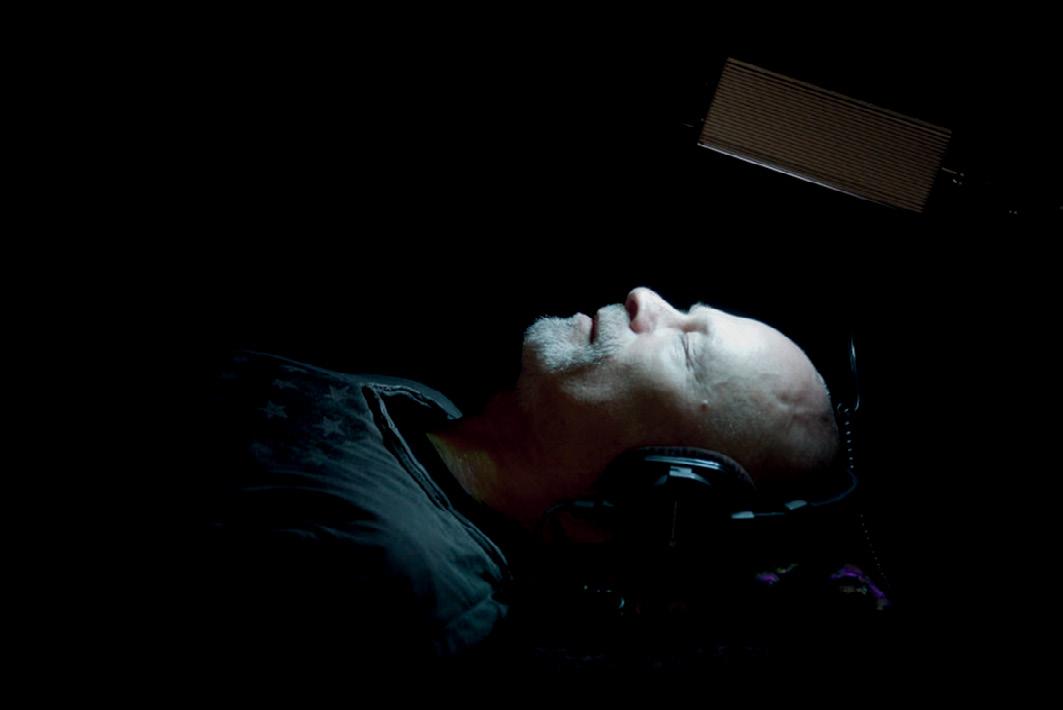
the age-related deterioration we experience is due to accumulated damage to our DNA. Sinclair and his team at Harvard Medical School have discovered that every cell contains a backup copy of our at-birth DNA, and have proven in animal studies that they really can turn back time with a simple injection.
While human trials are already planned for restoring vision, hearing loss and dementia, it will likely be 10-20 years before this technology is commercially available for overall anti-ageing. In the meantime, there is a host of therapies that medical spas can leverage for rejuvenation. IV infusions are already popular, and so consider providing healthpromoting upsells that can be delivered simultaneously, such as LED light therapy, PEMF or brain training.
One device definitely worth considering is NanoVi, which involves inhaling a mist of structured water. This deceptively simple therapy is proven to help ‘re-fold’ damaged proteins, reducing biological age and repairing up to 40% of damaged DNA.
Also focused on proteins is Peptide Therapy, in which these short chains of amino acids are being administered for wide-ranging functions, including: fat loss, immune strengthening, libido and sexual performance, healing the gut, restoring healthy skin and hair, increasing muscle mass, bone strength and more.
Other age-reversing therapies can be offered by partnering with a functional medicine doctor, including Hormone Optimisation Therapy (HOT), which differs from traditional Hormone Replacement Therapy (HRT) in that it aims to not just restore youthful levels of sex hormones, but finetune the balance of hormones across all body systems to benefit stress, sleep, energy and metabolism.
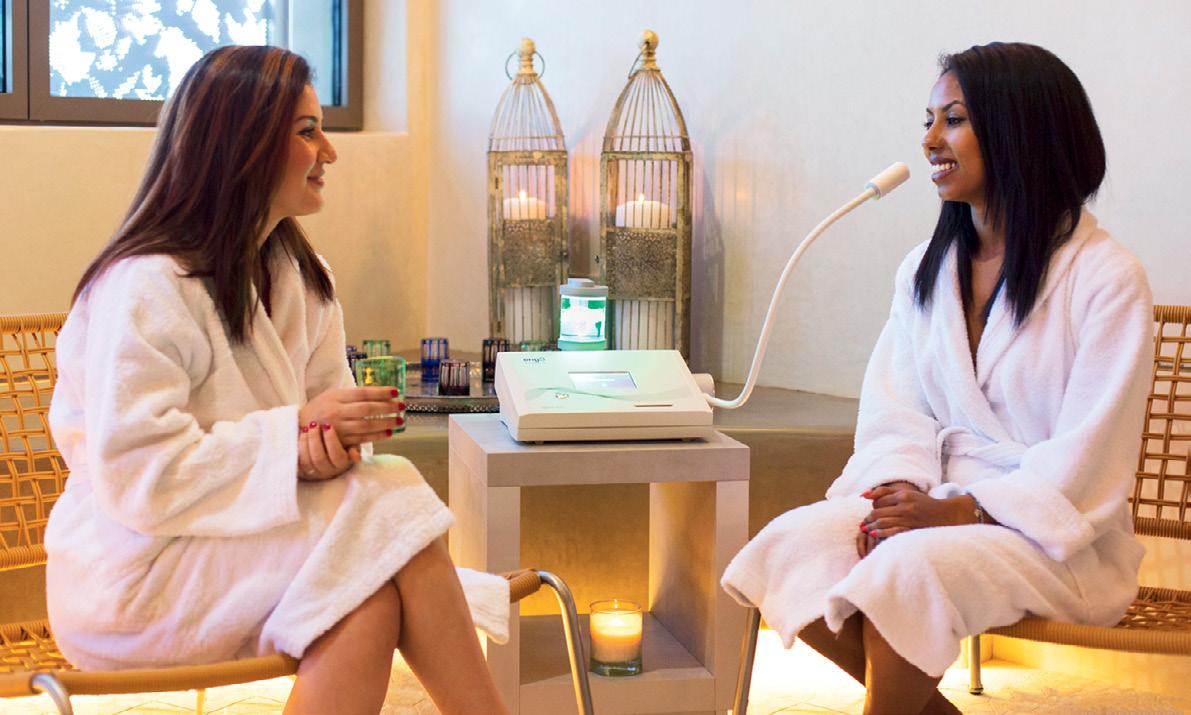
By seamlessly integrating one or more of these modalities into your medispa menu, you’ll not only give your spa a competitive edge, but also provide clients with the transformative experiences they crave. The biohacking revolution continues to gain momentum, so embrace these modalities to stay at the forefront and watch your medispa thrive.
Samantha Dunn is Asia-Pacific’s leading consultant in integrative wellness, and is currently leading the revival of ASWELL – the Australasian Wellness Association.
In the ever-evolving aesthetic landscape, why own an expensive device when you can rent it?
The past few years have seen the cost of living for Australians rise continuously, and this is no different for business owners. With seemingly everything becoming more expensive, investing money in capital equipment might not be as easy as it used to be, so have you thought about leasing your device?
At Laseraid, we recognise the significance of staying ahead in technology, despite the challenges of rising interest rates and repayment costs. We offer world-class devices for a simple weekly fee, to purchase or lease to own. Since 2007, Laseraid has been hard at work curating some of the best aesthetic devices in the market for independent beauty businesses across Australia. We offer an innovative weekly subscription model that removes the risk associated with buying expensive equipment from the get-go and allows businesses to ‘Rent, Try and Buy’.
Our subscription model includes service support and clinical education and training, so you never have to worry about owning a device that just sits in the corner. Over the years, we have established partnerships with esteemed and trusted brands, including Cynosure, Laseroptek, Lumenis, and more.
• Shop for the equipment online or via a dedicated business manager
• Discuss the option best for you with our team: Weekly Subscription, Rent to Buy, Buy.
• Device delivery and training by our Clinical Team
• Ongoing Service and Maintenance Support, 7 days a week
• Ongoing business support including training and marketing
• Monthly online store credit to buy consumables for your business
Last year, we introduced Sylfirm X to the Australian market, and have seen it revolutionise the microneedling market. Sylfirm X is a South Korean device and the only FDA approved dual wavelength system in the world. This combined with its 300nm gold plated and non insulated tips
makes it suitable for treatment under the eye, melasma and redness as well as all other typical treatment areas for needling.
• World’s only 300 nano meter needle –reduces downtime and allows for treatment under the eye
• Non-insulated needle makes treatment significantly more comfortable than other devices on the market Effectively treats all skin types across melasma, scarring, acne, fine lines and wrinkles, stretch marks, vascular lesions, pigmentation and has an overall reduced risk of post inflammatory pigmentation
• Sylfirm X is the only device on the market that delivers a pulsed and continuous RF wave. This allows targeting of a broader range of conditions from melasma through to stretch marks.
• This device offers three different tip sizes for varying levels of intensity and treatment preferences. What sets it apart from other devices on the market is that you can use a single tip for all needle depths and modalities, which not only saves time but also reduces consumable costs.
• Therapists can choose to treat different skin conditions in one session. For example: Redness across the cheek area and tightening and lifting on the rest of the face without changing tips.
• Non-insulated needles deliver the RF to the point of penetration without heating the entire needle, eliminating epidermal thermal heat and providing a more precise thermal treatment.
• Significantly less painful than other devices on the market because of the needle composition.
• The Sylfirm X uses 24-K gold-plated needles, allowing for smoother penetration through the skin and minimising the risk of pigmentary changes. When treating, you only need gentle pressure against the skin for clean insertion of the tip.
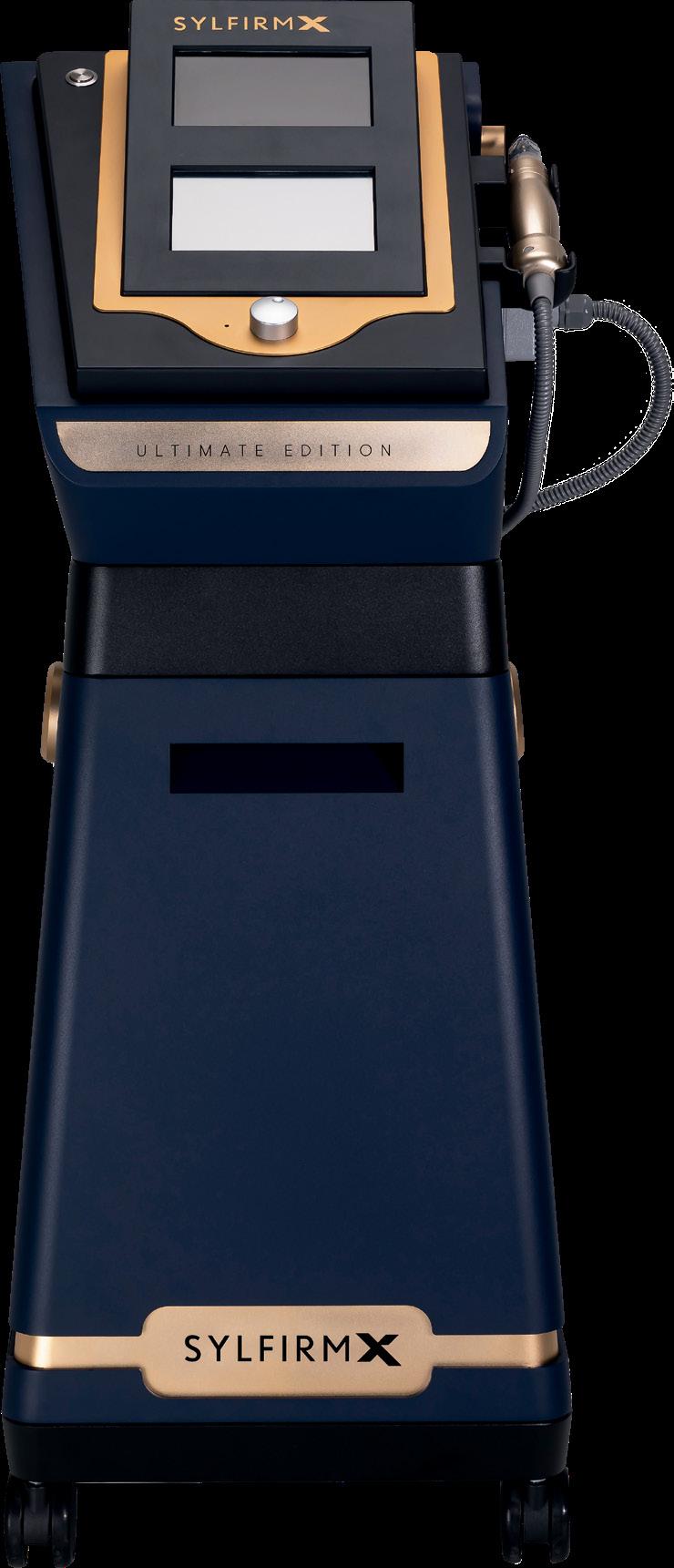
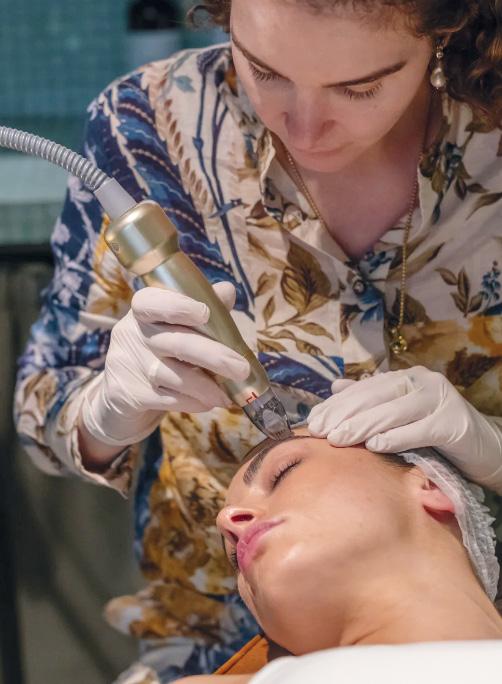
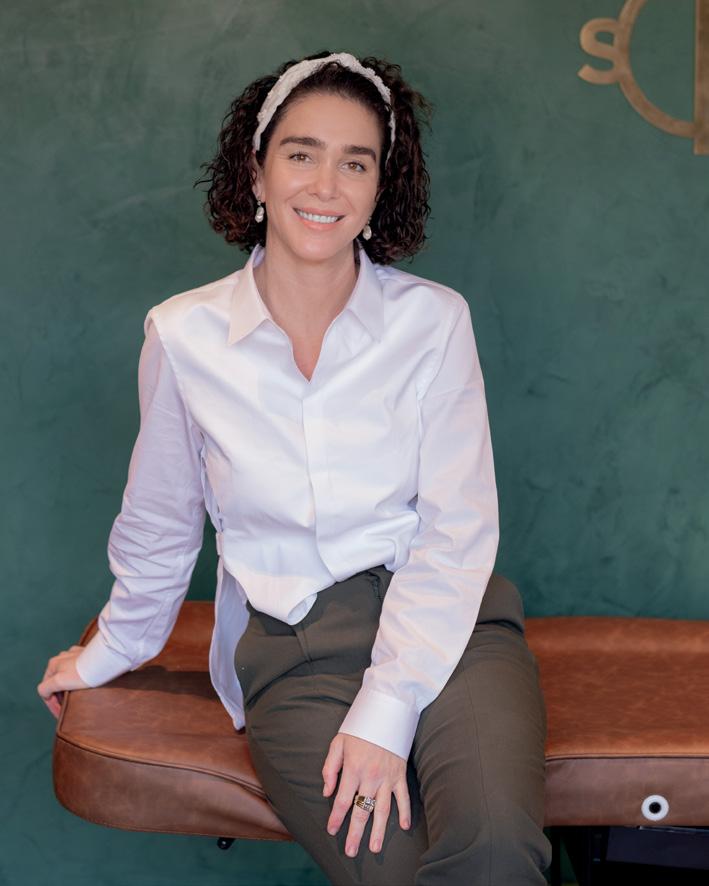
The Skin Bar
What made you interested in the Sylfirm X device?
RF Microneedling is a hugely popular treatment and we wanted to find a device that had incredible results with less downtime than traditional RF. We’d been hearing about this device and its ability to treat melasma and rosacea, as well as rejuvenation so we trialled
How does it compare to other microneedling devices on the market?
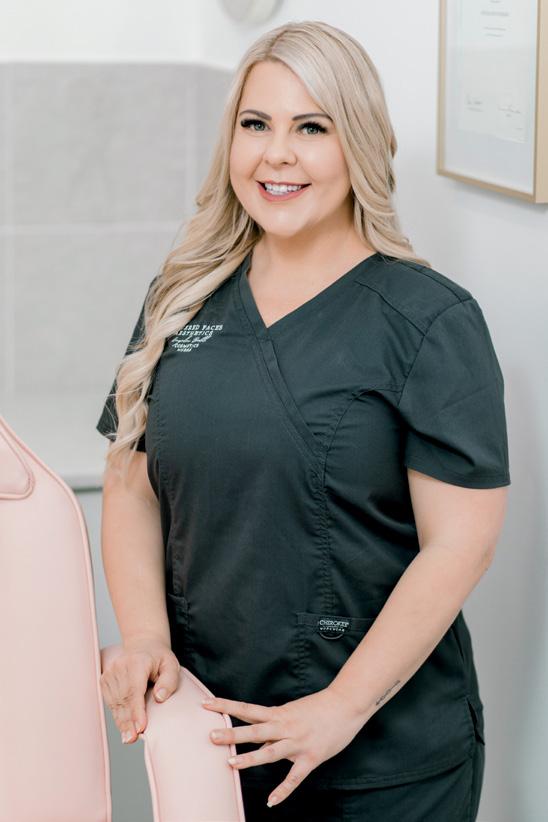
As a newer technology, the main stand out is downtime and comfort. Despite being twice as powerful as Morpheus 8, the delivery is really precise and clients find it very comfortable.
The ability to treat the eyelids, melasma and rosacea is a big stand out for us compared with other devices.
What kind of skin conditions do you treat with it and when do you see best results?
We use the device for lifting and tightening, texture and tone, melasma, rosacea, diffused redness, acne and scarring. We see best results over 4-6 treatments.
What are the ongoing costs involved?
The ongoing costs are for the tips. These are well priced compared with other devices we researched.
Are you leasing it through Laseraid, and what was the process like?
We are on their Subscription Rental model. So you pay a weekly fee for the device and you have the flexibility that you aren’t otherwise given with Ownership.
What kind of support do you receive from Laseraid?
Training and Servicing are all included in our fee and we also have team webinars and other support included as well.
Have you ever had a problem with the device and how have Laseraid assisted you?
No issues so far. The great thing about RF needling devices is they are predictable and rarely have issues, so no complaints from us.
How did you first hear about Sylfirm X?
I was researching different RF microneedling devices to introduce in our clinic, and I looked at both Australia and what was available within the overseas market. I had narrowed my search down to three machines. I had a treatment from one of the devices that I was considering and could not get through the whole treatment due to how painful it was. I immediately decided this is not the machine I would use because if I am finding it that painful, then my clients will not come back for repeat treatments and will not be getting the best for their skin concerns. Sylfirm X had just become available in Australia when I was researching so I immediately contacted Steph at Laseraid and she had the machine in my clinic and I trialled it within that week. The treatment blew my mind with how painless it was and I was immediately sold on this machine. The results I was seeing from overseas also had me impressed.
How does it compare to other microneedling devices on the market?
I feel it is far superior due to the ability to treat multiple indications on the one face within the same treatment including being able to treat melasma and rosacea. Having the ability to switch between pulsed wave and continuous wave RF in the one treatment allows us to give our clients the best possible outcomes from one device. Most of our patients also do not require numbing which makes it a faster treatment to offer in clinic. The downtime is also significantly shorter than other devices we trialled. The treatment parameters are super easy to follow and having the ability to treat the upper and lower eye lid safely is a massive benefit.
What kind of skin conditions do you treat with it and when do you see best results?
We have treated general rejuvenation, skin tightening, rosacea, pigmentation including melasma, and scars. I personally have seen a dramatic improvement in pores and skin firmness after having three treatments. We have also seen great results with rosacea, pigmentation, melasma and treating surgical scars.
What are the ongoing costs involved?
Compared to other machines the consumables are very low. This was another factor when I compared the machines that I took into account with my decision. The ROI for each treatment is significantly higher than other machines that we compared. The purchasing of needle heads is the main consumable required which are available on the Laseraid website.
Are you leasing it through Laseraid, and what was the process like?
I am currently leasing the machine. The process was easy, and Steph made it seamless and fast.
What kind of support do you receive from Laseraid?
Steph has provided onsite training for myself and staff members as well as being a great contact for any questions we have had around treatment parameters for certain conditions.
Have you ever had a problem with the device and how have Laseraid assisted you?
We have never had a problem with our Sylfirm X device. If I have ever had any questions regarding treatments or consumables, Steph has always been contactable and has helped us with any questions we have had around the treatments. She is just as passionate as I am about this device.
Laseraid distributes this world class device. It is available for sale or on their all-inclusive device subscription for a simple weekly fee. For more information, visit laseraid.com.au

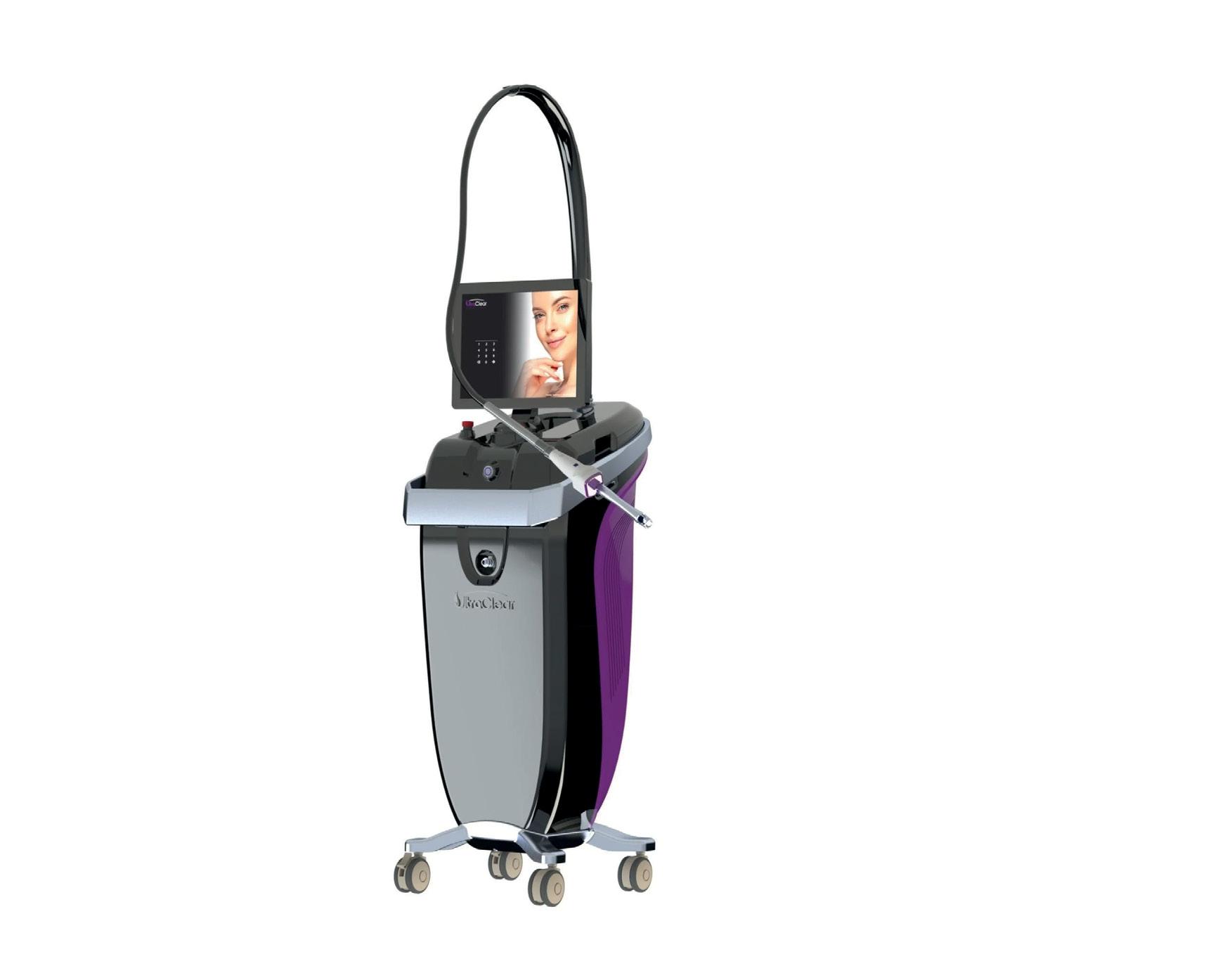
We take a look at two of the most exciting launches this year.

fractionated ablative sub-pulses, offering optimal skin concerns, including sun damage, fine lines, wrinkles, scars, and acne scars, UltraClear creates microchannels that trigger natural exfoliation and stimulate collagen
groundbreaking technology promises quicker, more comfortable, precise treatments with increased safety
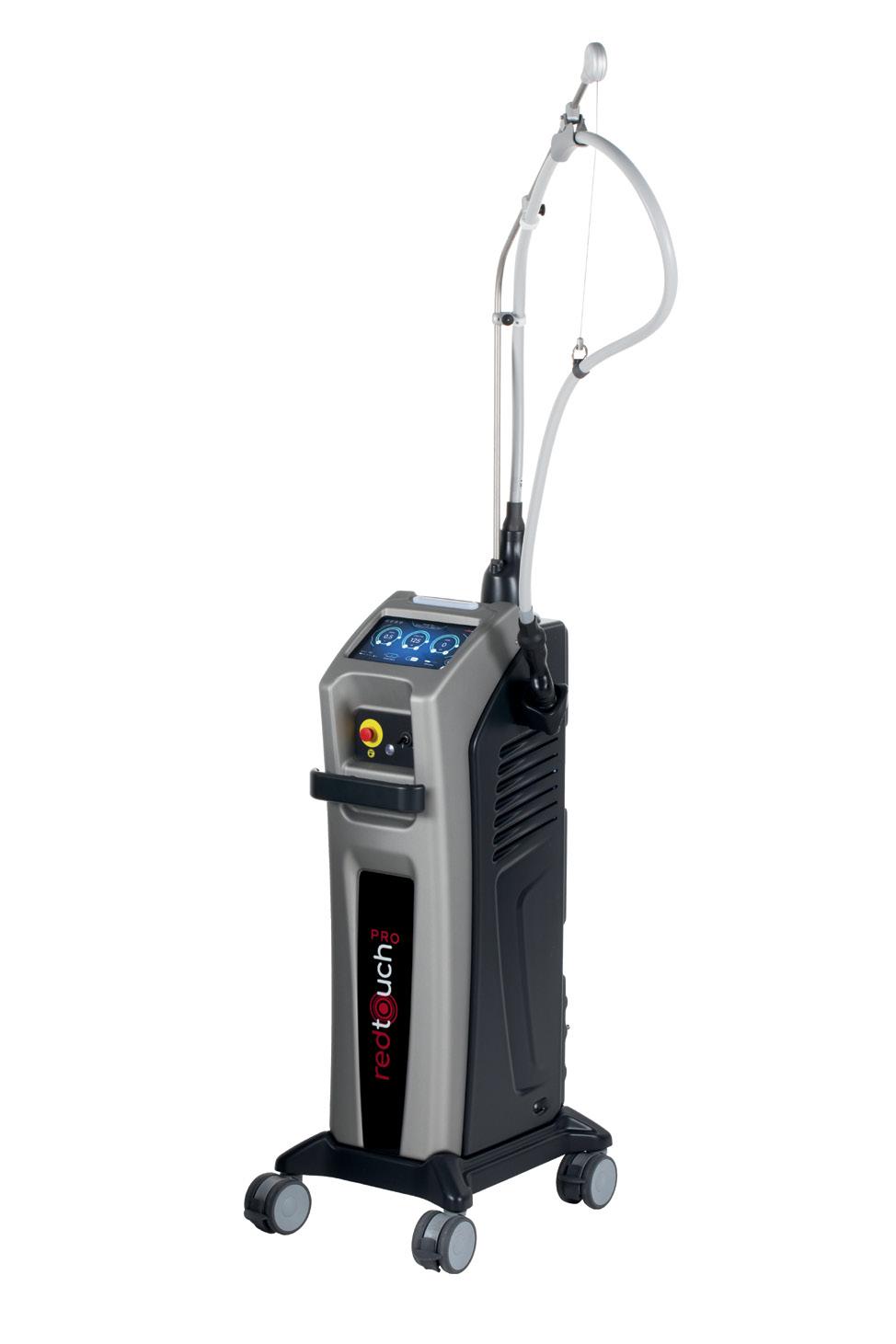
Deka’s latest launch, RedTouch PRO, is the first and only fractional laser that selectively targets collagen for total skin rejuvenation. The utilised wavelength provides total skin rejuvenation with no anaesthetic and no downtime.
Proudly distributed by High Tech Medical, the unique action of the RedTouch PRO means it works on the chromatic component of skin in the epidermis and also on collagen at the dermal level, making it an ideal option for treating lines and wrinkles, dyschromia, melasma, skin rejuvenation, and more.
and minimal downtime, UltraClear promises quicker healing and dramatic results, making it the future of aesthetics. With options from lunch time treatments to deep collagen remodelling, UltraClear can be used on a wide variety of patients. There are no consumables involved, making it highly profitable. UltraClear is the future of laser resurfacing, leveraging cutting-edge fiber laser technology for optimal skin rejuvenation. Enjoy quick treatments, minimal discomfort, and reduced downtime, all while achieving dramatic results.
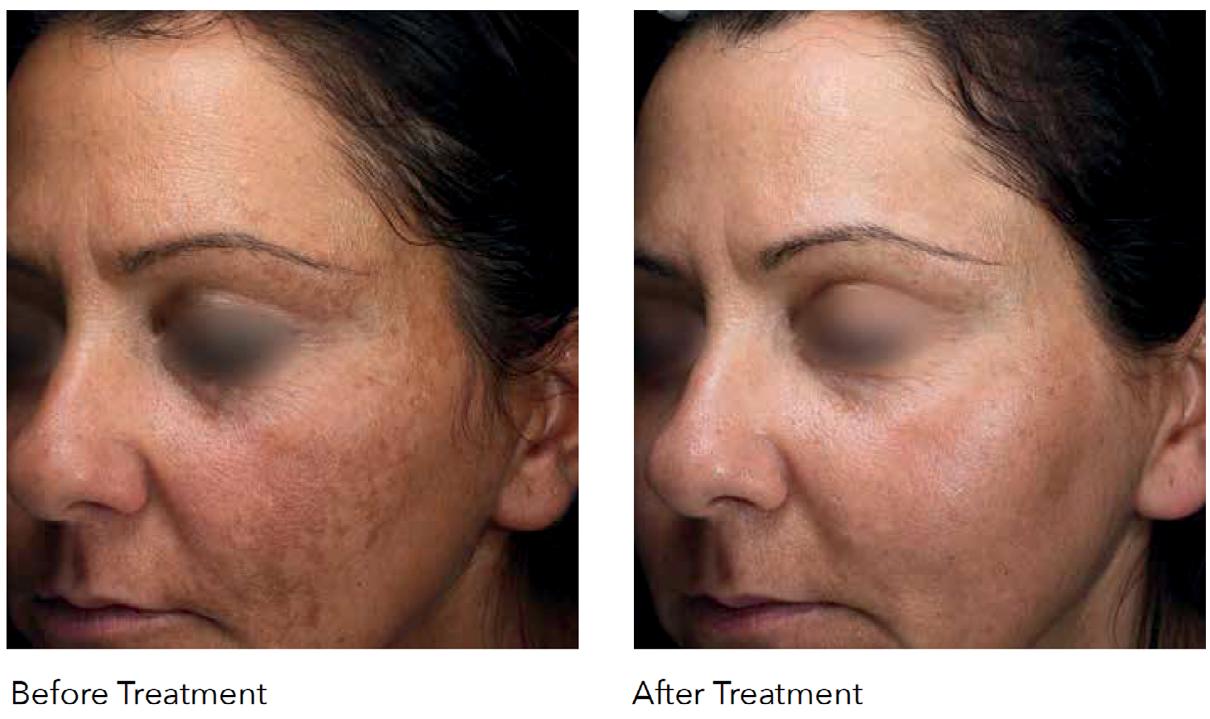
RedTouch PRO combines the laser energy with Deka’s skin cooling MOVEO system to deliver optimum treatment performance, speed, comfort and efficacy, without causing damage to the epidermis. The RedTouch PRO handpiece, with an integrated scanner system, has been designed to achieve the ultimate performance in transmitting energy to the skin with optimised ergonomics, treating all skin types including dark phototypes.
RedTouch PRO also offers the ReLive treatment, which acts as a preventative rejuvenation solution helping to keep the ageing process at bay. It works to visibly improve premature signs of skin ageing for a more natural, youthful-looking appearance. The direct action on collagen production combined with the minimally invasive nature of the treatment, allows for maximum efficacy, with little to no downtime. The unique stimulative effect of the RedTouch PRO wavelength means the ReLive treatment revitalises the skin and can be performed as an alternative or complementary treatment to injectables.

High Power laser for Hair Removal
Perfect for busy clinics
With Mixed Technology you can use Alexandrite 755nm and Nd:YAG 1064nm in a simultaneous or sequential emission modes
Applications:
Hair Removal
Vascular Lesions
Skin Rejuvenation
Benign Pigmented Lesions
Onychomycosis
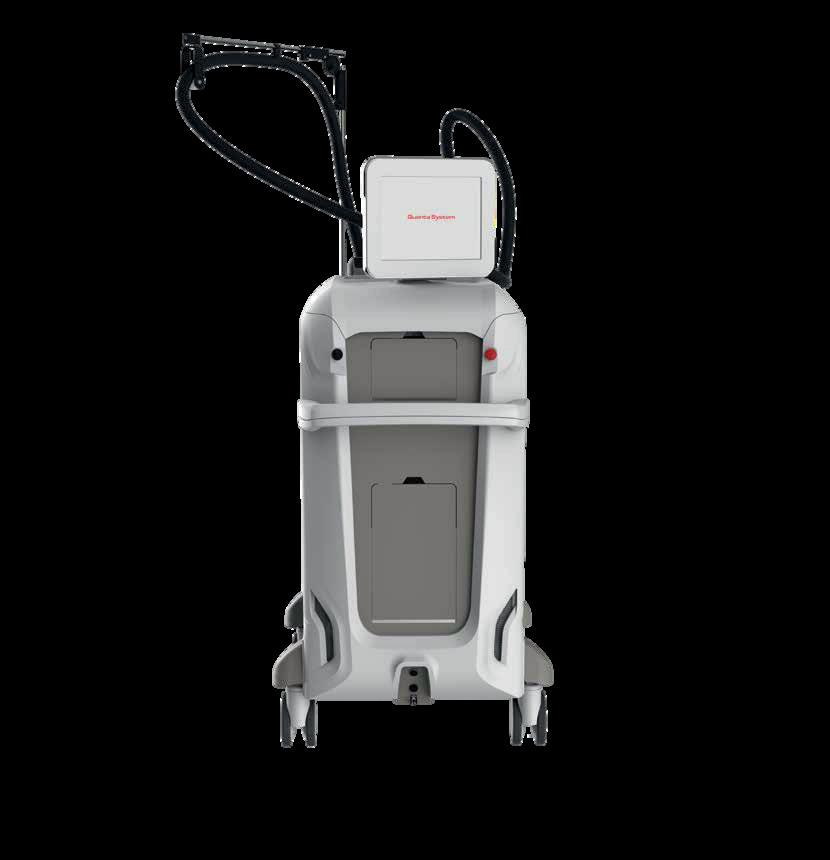


12” Touchscreen Display
Optispot Handpieces and Scanner
Handpieces door case
Optional scanner delivers laser pulses with controlled overlap placing the spots precisely to perform safe, effective and fastest treatments With a maximum scanning area of 29 cm²
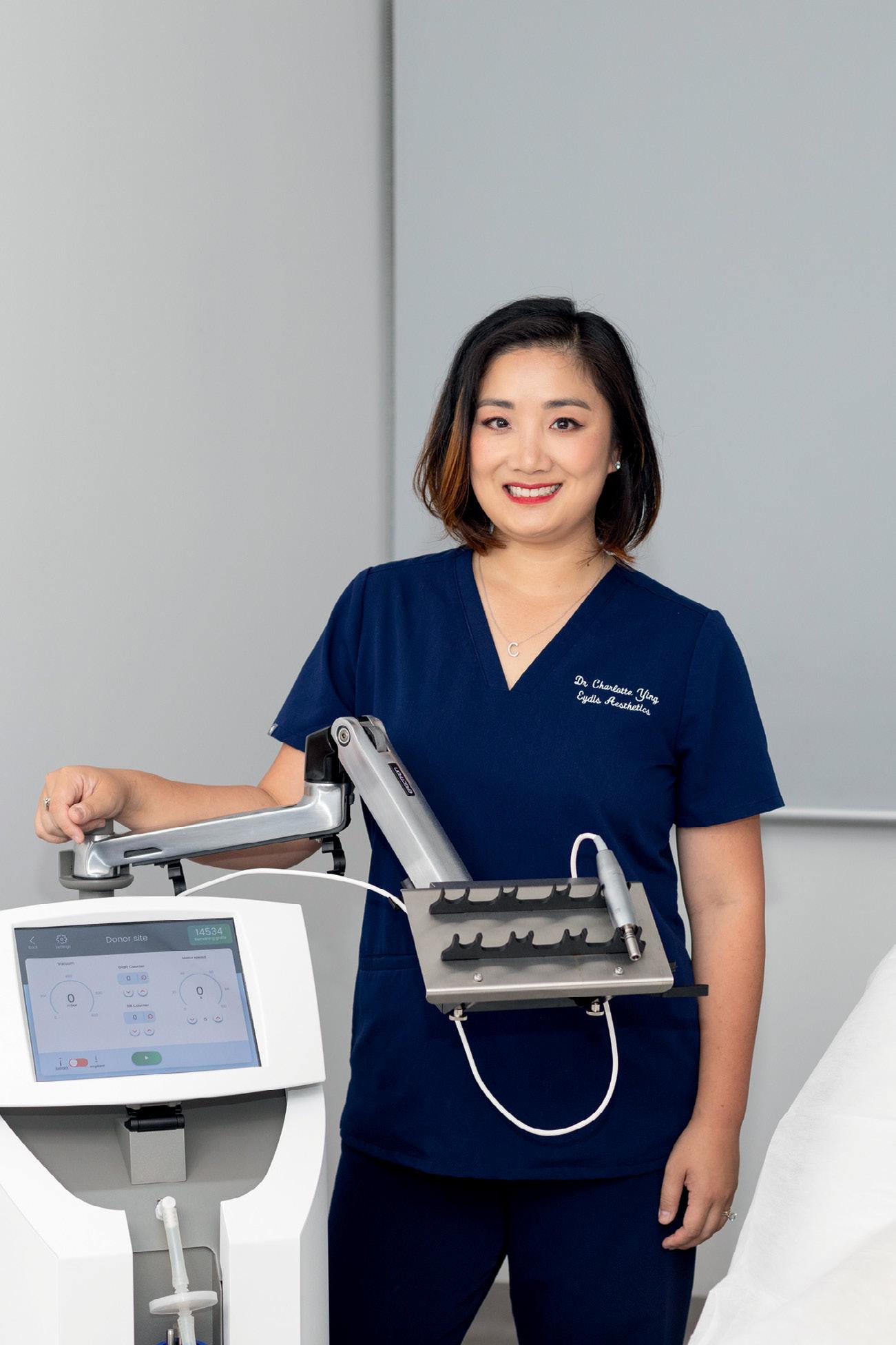
DR YING shares how she successfully uses her suite of Venus devices, to treat anything from burn scars to hair loss and acne.
Working alongside renowned surgeons, she refined her skills in both surgical and non-surgical cosmetic procedures, always prioritising technical excellence and the stories and well-being of her patients.
At the heart of Dr Ying’s practice is a deep-seated respect for her patients’ health and needs. She adopts a safetyfirst, respectful approach to all procedures, customising each treatment to the individual. Her philosophy of ageing gracefully and empathetically addressing post-pregnancy body changes is a testament to her commitment to patient-centric care. This approach extends to her consultations, where she invests time in understanding each patient’s unique story.
Dr Ying’s post-surgical recovery care strategies include using Venus Bliss™, which significantly shortens recovery times, therefore enhancing recovery, especially following liposuction. The Venus Bliss™ device employs Multi-Polar Radio Frequency and Pulsed Electro Magnetic Fields to reduce bruising, swelling and accelerate healing. This not only reduces physical recovery time but also enhances patient comfort and satisfaction. Dr Ying reports that the Venus Bliss™ can reduce average bruising time from three weeks to one week, allowing patients to return to their normal activities sooner. This significantly benefits patients, as more bruising means more inflammation, prolonging the recovery process.
Dr Charlotte Ying, a leader in aesthetic surgery, boasts an impressive array of qualifications, including Honours degrees in Medicine, Surgery, and Obstetrics and Gynaecology from the Royal College of Surgeons in Ireland, and a Surgical Fellow of the Australasian College of Cosmetic Surgery and Medicine (ACCSM). Her medical journey, which began in Dublin, has flourished in Australia, leading to significant contributions in cosmetic surgery.
From an early age, Dr Ying was drawn to the art and science of aesthetic surgery, a passion that was nurtured during her tenure at The Canberra Hospital. Her commitment to surgical excellence and patient care has been recognised in her published research and by The Canberra Times.
In 2013, Dr Ying’s career took a pivotal turn as she delved into the world of Cosmetic Surgery in Sydney.
Dr Charlotte YingIn addition to the Venus Bliss™, Dr Ying incorporates other Venus devices such as the Venus Viva™ MD, Venus Versa™, Venus Glow, and NeoGraft® in her practice. Each device brings unique benefits, from comprehensive skin rejuvenation with the Venus Versa™ to streamlining hair transplant procedures with NeoGraft®. Dr Ying was one of the first in the Sydney’s Asian community to introduce NeoGraft®, highlighting her role in bringing advanced hair restoration techniques to a diverse patient base. NeoGraft® is not only utilised for male hair transplants, it can also be beneficial for various other purposes, including eyebrow transplants, hairline lowering, and beard transplants. She combines NeoGraft® with LED treatments and PRP injections to enhance results. Looking to the future, Dr Ying sees the potential for robotic systems like ARTAS in hair restoration, minimising human error and fatigue in long procedures.
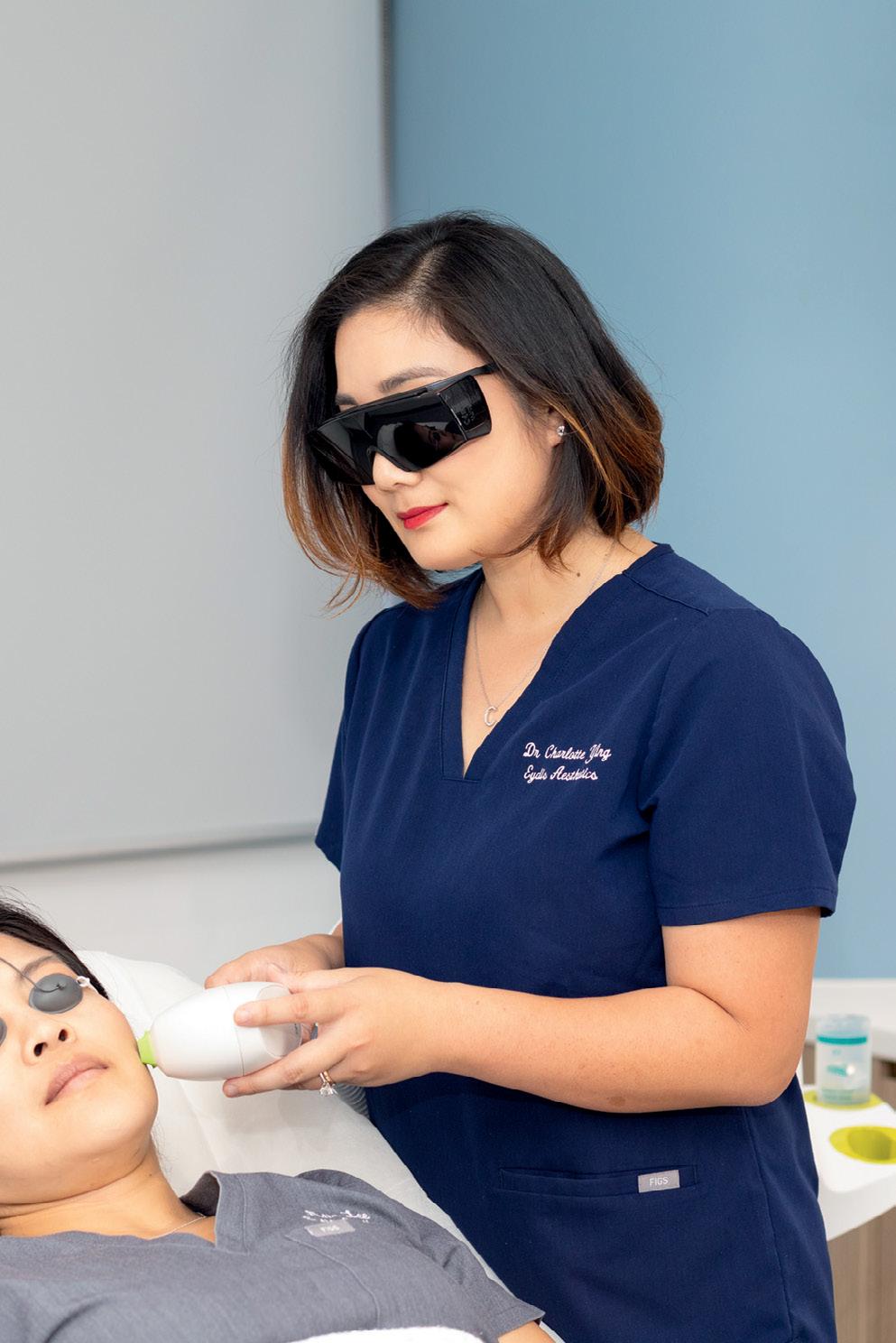
Dr Ying has noted a trend towards thicker, bushier eyebrows, with many women seeking eyebrow transplants due to overplucking in the past. For hairline lowering, this procedure is popular among females with larger foreheads or those experiencing traction alopecia, often seen in ballet dancers due to their hairstyle. These procedures reflect the evolving beauty trends and the diverse needs of her patients.
Dr Ying’s proficiency with Venus technology, particularly the Venus Viva™ MD, is a cornerstone of her practice. She leverages these devices for a variety of treatments, from mitigating acne and burn scars to rejuvenation, underscoring their versatility beyond conventional beauty treatments. Her success stories, including the transformative care for burn scars, exemplify the profound impact of Venus technology on patient outcomes.
Venus Viva™ MD utilises NanoFractional RF™ technology and SmartScan™ for targeted skin resurfacing. This technology creates micro-channels in the skin while surrounding tissues remain intact, enhancing skin texture and reducing scars with minimal downtime. Her use of both the 80-pin and 160-pin tips allows for personalised treatments based on individual patient needs. Dr Ying’s mastery in utilising Venus Viva™ MD’s technology is evident in her successful treatment of complex cases like burn scars, showcasing significant improvements in skin texture and appearance.

Dr Ying places great emphasis on treating darker skin types, particularly Fitzpatrick Skin Type 4 and 5, with Venus Viva™ MD. She takes extra care to prep the skin to avoid complications, such as post-inflammatory hyperpigmentation (PIH). This approach enables her to be more aggressive in treatment while being mindful of the special needs of these skin types.
Dr Ying has successfully treated patients with burn scars, including a case involving chemical burns to the face and neck of a Fitzpatrick Skin Type 5 patient. She utilised the Venus Viva™ MD, employing its NanoFractional RF™ technology for these treatments. Through multiple sessions and careful skin preparation, she achieved remarkable results in improving the texture and appearance of the burn scars, making them less obvious and enhancing skin elasticity.
In her surgical practice, Dr Ying innovatively integrates Venus device technology, especially in body contouring and liposuction. The Venus Bliss™ aligns seamlessly with her work, offering non-invasive, effective alternatives to traditional procedures. This blend of cutting-edge device technology with surgical expertise underscores her innovative and adaptive approach to aesthetic treatment.

Dr Ying’s dedication to continuous learning and excellence is unwavering. A council member of the ACCSM, Dr Ying truly embodies her college’s mission of “raising standards, protecting patients” by being actively involved with training and education of cosmetic practitioners.
Her interactions with peers, such as Dr Sonia Batra, and her adoption of new techniques like pre-treatment skin preparation, highlight her commitment to staying at the forefront of her field. Her presentations in international conferences and her eagerness to share with and learn from others in the industry further illustrate her pursuit of excellence in cosmetic surgery.
Dr Charlotte Ying stands as a beacon of excellence in aesthetic surgery. Her patient-centric approach, combined with her innovative use of technology and commitment to continuous education, sets her apart as a practitioner who not only enhances beauty but also profoundly impacts lives.
For more information on Venus devices, visit venusconcept.com/en-au/
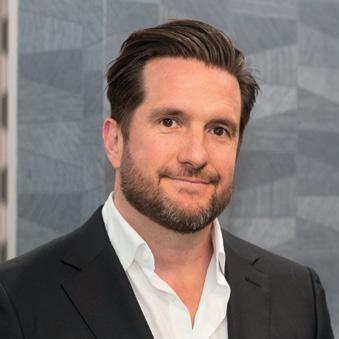
Dr Theo, how will the ARTAS iXi change the experience for patients?
This is the first time Plastic Surgery Queensland has offered hair restoration procedures.The acquisition of this state-of-the-art technology represents a significant advancement in our brand offering as the only Australian practice to own and offer this technology.
The ARTAS iXi represents a groundbreaking leap forward in hair restoration procedures, ushering in a new era of patient care by seamlessly integrating artificial intelligence and 3D capabilities. This stateof-the-art robot not only elevates precision and efficiency but also transforms the overall patient experience, ensuring unparalleled accuracy in follicular unit extraction. Patients can anticipate a more comfortable and minimally invasive process, as the robot precisely harvests and implants individual follicles without scalpels, stitches, or staples. This advanced technology reduces disruption to surrounding areas, accelerates recovery times, and contributes to an exceptional and patient-centric journey in the realm of hair restoration.
How much time does it save for the practitioner performing the procedure?
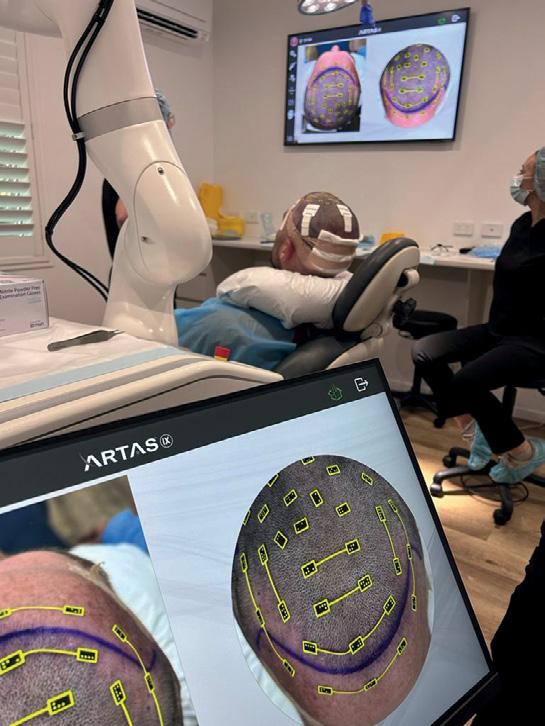
ARTAS iXi at our Noosa practice in December last year. We’re only one month in, and already seeing a spike in enquiries which we expect to rise throughout the year.
Describe the ‘typical’ hair transplant patient.
The demographic diversity among hair transplant patients highlights the nuanced motivations and varied circumstances that drive individuals to seek hair restoration treatments. A substantial portion of our patients pursues these procedures to address genetic hair loss, a common concern affecting both men and women as they age.

The ARTAS iXi significantly expedites the hair restoration process, saving valuable time for practitioners. Compared to existing technologies, the efficiency gains are remarkable, with up to 30% less time spent in the chair, contributing to a streamlined and more timeeffective procedure, ultimately benefiting both practitioners and patients.
The escalating demand for hair transplants underscores a societal shift in improving health and wellbeing. In an era where self-care and aesthetics are increasingly prioritised, individuals are seeking solutions that align with their desire for confidence and improved quality of life. Notably, the advent of cutting-edge technologies like the ARTAS iXi has played a pivotal role in reshaping the landscape of hair restoration treatments. By offering a more precise, minimally invasive, and efficient approach, we can address the evolving expectations of a diverse demographic. This technological advancement is a game-changer, making hair restoration procedures more accessible and appealing than ever before. As a result, it not only meets the existing demand for treatments but also serves as a catalyst for further growth, expanding the reach of hair restoration solutions to individuals who may have been hesitant or unaware of what modern technology can offer.
Plastic Surgery Queensland announced the introduction of the
The ARTAS iXi technology is particularly adept at tailoring solutions for individuals dealing with hereditary hair loss, ensuring natural-looking and enduring results.
Can anyone have a hair transplant, or is there a risk of it not working well for some?
The ARTAS iXi is indicated for harvesting hair follicles from the scalp in men diagnosed with androgenic alopecia (male pattern hair loss) who have black or brown straight hair.
Patient satisfaction is typically high, but results can vary based on factors such as individual physiology and adherence to post-procedure care. As with any medical intervention, there is a small inherent risk of the procedure not meeting expectations, and thorough consultations help manage and mitigate these risks.
Pre-procedure, patients undergo comprehensive consultations to ensure they are suitable candidates. Post-procedure care involves following personalised recovery plans, which may include specific instructions for hair care, activity limitations, and follow-up appointments to monitor progress. Our team provides ongoing support to ensure optimal recovery and outcomes.
The operation of the ARTAS iXi requires specialised training. While the technology is designed to be operated by medical professionals, qualification requirements include expertise in surgical hair restoration procedures. At PSQ, our team consists of highly qualified specialists, who have undergone extensive training and possess the necessary credentials.
Dr Theo Birch is a Specialist Plastic & Reconstructive Surgeon at Plastic Surgery Queensland. plasticsurgeryqueensland.com
DR LIN’S insights promise to unveil the revolutionary features that have positioned Potenza as a standout in the industry.
Sydney is gearing up for a game-changing event as internationally acclaimed dermatologist, Dr Shangli Lin, is poised to enlighten attendees with a showcase on the transformative capabilities of the Potenza RF by Cynosure. Potenza is a unique RF microneedling device that utilises both monopolar and bipolar radiofrequency at either 1 or 2MHz within a single device, resulting in the formation of four distinct RF modes.
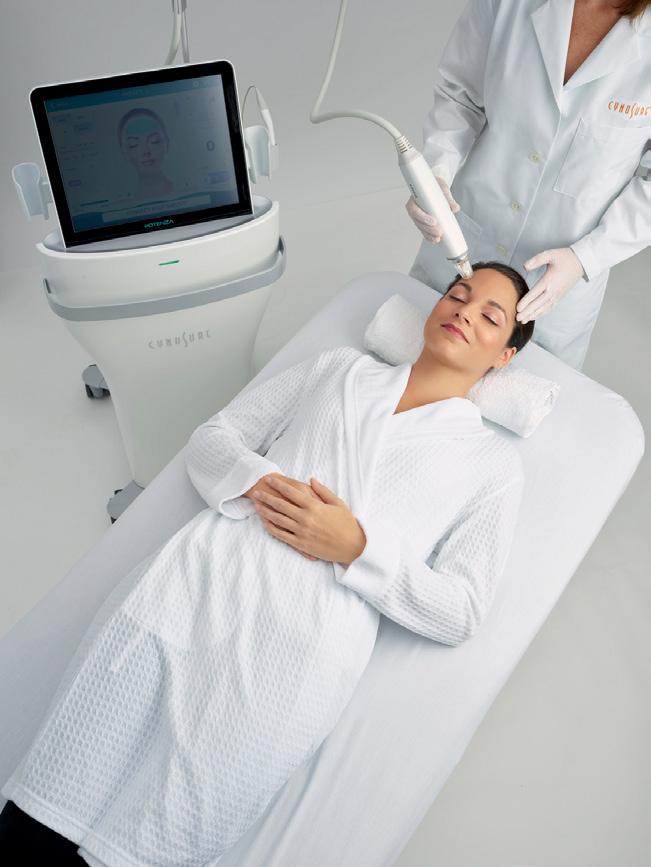
Dr Lin is a board-certified dermatologist and one of the most renowned speakers in the field of aesthetic medicine. He founded Shangli Dermatologic & Aesthetic Clinic in Taipei 12 years ago and has been giving lectures and training sessions in numerous global conferences and workshops for years.
Boasting an array of tips, needle alignment choices, and the capacity to address diverse areas, the versatility of Potenza is unparalleled. This flexibility not only enhances the patient experience, but also widens the scope of treatment possibilities for practitioners.
Dr Lin’s discussion will delve into the groundbreaking collagen boosting capability, a hallmark of Potenza. This innovative aspect underscores the device’s process in stimulating collagen production on three distinct levels, ensuring a holistic and enduring rejuvenation of the skin tissue.
We caught up with Dr Lin to find out his reasonings of why Potenza is one of his top selected modalities in practice.
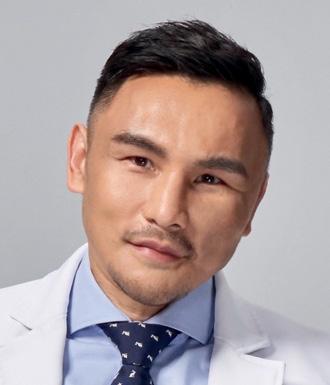
Dr Lin, what are some of the most common skin concerns you encounter in Taiwan?
Asian women are quite keen on smooth, bright and flawless skin. Apart from spots or uneven pigmentation on the skin, many people are concerned about their pores, fine wrinkles and skin firmness as well.
What made you decide to work with Cynosure, in particular, the Potenza?
While Picosure targets mainly the epidermal problems and is an amazing device for the aging spots and pigments, and HIFU and the traditional RF devices are frequently used to treat deep dermis to subcutaneous fat for skin tightening, not many devices on the market can cover the indications in the dermal area between the epidermis and the subcutaneous area.
Potenza is one of the few devices that covers the indications of this dermal segment, and can treat these indications very well! Therefore, to me, Potenza is the final piece of the puzzle.
What skin conditions can you treat with the Potenza?
Potenza is truly a versatile device with a lot of potential. By selecting the different RF frequencies, the RF delivery configurations, pulse durations, enery levels and depths, I can create a tremendous number of parameter combinations for a lot of different indications, and even for the same condition the parameter can be totally differet in different sessions, in order to achieve the optimal results.
The conditions I frequently treat with Potenza, are wrinkles, pores, acne scars, facial skin laxity, neck lines, jawlines and body skin laxity.
What do your patients like about the treatment?
Minimal downtime, good treatment comfort and satisfying results are the frequently mentioned parts they like about the treatment. In quite a few patients they like Potenza because they can have multiple problems solved with only one device, just by using different parameters, which is fascinating to them.
Can you please explain the enhanced topical penetration with the Potenza?
One of the benefits of microneedling RF, is the fact that we can use it to enhancce the drug penetration through the channels the needles already create, after we treat other skin conditions. However, not every device can do this efficiently.
The Fusion Tip of Potenza, by applying a negative pressure onto the skin while needling, is penetrating the skin, which can increase the drug delivery up to 67%!
What are some body concerns you can treat?
Stretch marks and abdominal skin laxity are very good indications for Potenza. And the results are usually quite satisfying.
In a nutshell, why would you recommend the Potenza to other practitioners?
Potenza is a device that can really cover a lot of indications the we enounter on the daily basis. It never bores me, and it complements well with Picosure. Therefore, I definitely recommend Potenza!
Join Cynosure and Dr Shangli Lin for an exclusive dinner.
Date: Thursday 7th March, 7pm
Venue: The Sunroom at Ivy, 330 George St, Sydney Scan the QR code to RSVP


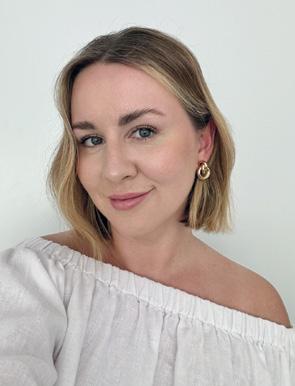 Nadine Dilong Dr Naveen Somia
Nadine Dilong Dr Naveen Somia
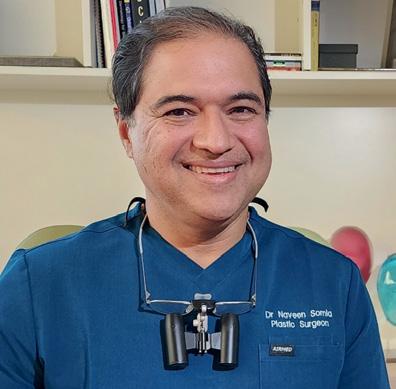
Aesthetic practitioners in the UK are facing regulatory changes this year, but is it enough? NADINE DILONG and DR NAVEEN SOMIA are trying to find out.
In Australia, 2023 was the year of stricter regulations in the aesthetic industry aimed at improving patient safety and clinical outcomes. The new AHPRA guidelines have put an end to false, misleading and manipulative advertising by restricting the use of the title ‘surgeon’, among other measures. The use of emojis that trivialise cosmetic surgery in advertising has been banned, and there has been an overhaul to more serious aspects like haphazard consultations. At least in theory, the industry has become safer and less misleading for consumers. But what about other countries?
We often look to Europe in terms of aesthetic trends, new technology, and experts in the field of surgical and non-surgical
treatments. Especially the UK is home to aesthetic practitioners who are industry leaders, but when it comes to patient safety, it seems that the UK has a lot of catching up to do. At this stage, it is a highly unregulated industry allowing under-qualified people to perform risky procedures, with little to no framework in place to protect the public.
Just last year, a new licensing scheme was proposed, which would see tighter regulations for non-surgical practitioners. “The current regulatory framework places few restrictions on who can perform non-surgical cosmetic procedures,” the official release reads. “The government recognises the concerns about the lack of regulation in this field and the potential dangers that this poses to the public.
We want to ensure public safety and public protection through a regulatory framework that enables consumers to make informed and safe choices when undergoing procedures which have the potential to cause serious injury or harm.”
Sydney-based Specialist Plastic Surgeon and past ASAPS President, Dr Naveen Somia, has welcomed the stricter regulatory changes in Australia, seeing it as a step in the right direction. As Scientific Convenor of the Non-Surgical Symposium, which includes many international speakers each year, Dr Somia is interested in the state of affairs in other countries, and worked on this article with SPA+CLINIC Managing Editor Nadine Dilong to shed light on the baffling lack of industry regulation in the UK.
In order to understand the landscape for UK-based aesthetic practitioners better, Nadine Dilong and Dr Naveen Somia talked to a Plastic Surgeon, a Cosmetic Doctor, and a Nurse Injector in the UK.
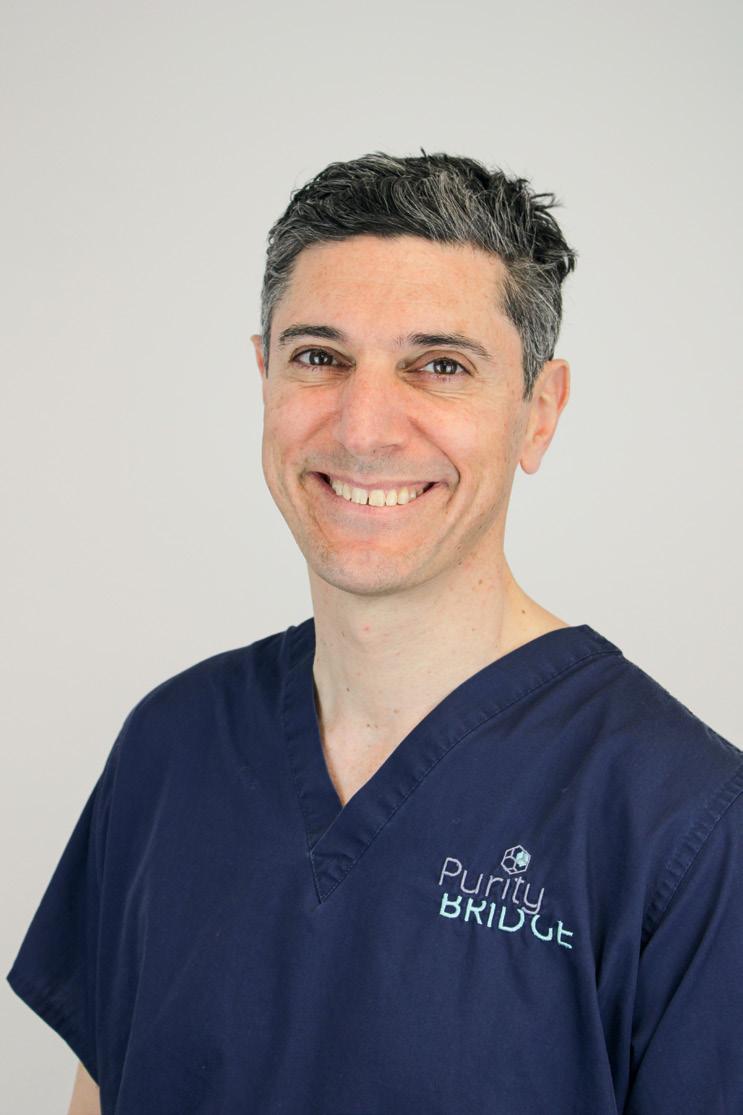
Are you satisfied with the way the aesthetic practice industry in the UK is regulated?
Aesthetic practice covers, of course, a broad arena, incorporating both non-surgical and surgical interventions.
“Fit for purpose” regulation is frustratingly lacking in the UK, and BAAPS (the British Association of Aesthetic Plastic Surgeons [Editor’s note: and equivalent to ASAPS in Australia] ) has been pushing to try to get some basic requirements in place.
In the field of aesthetic surgery, one aspect that might help in the UK is the relatively recent introduction of the Cosmetic Surgery Certification Scheme. This is a voluntary scheme to recognise aesthetic surgeons who are able to certify only in their field of anatomical training and only if they fulfil a variety of criteria, including psychology training. This aims to stop surgeons operating outside their area of expertise, so, for example, an ear nose and throat (ENT) surgeon should not be able to perform breast surgery, and a cardiothoracic surgeon should not be able to perform facelifts (both of which unbelievably happen in the UK).
This is noble in principle and a very useful initiative, but it is not yet mandatory and uptake has been mixed. It is hoped that many of the private hospitals in which surgeons undertaking aesthetic surgery will mandate this as part of surgeons’ practising privileges requirements which appears to be starting to happen, and this will help significantly. It is also hoped that soon medical indemnity companies will take certification into account when deciding whether or not to insure a doctor, and what their premiums may be. However in the UK, an increasing number of surgeons are developing their own facilities and they can choose to ignore this.
In addition, BAAPS is pushing for some sort of legislation so that only surgeons on the UK’s GMC (General Medical Council) Specialist Register (demonstrating higher level surgical training and qualification) should be able to undertake specialist aesthetic surgery. However,
this is not something that seems to be of interest to regulators nor politicians at the time of writing.
In the non-surgical area, the UK has long had a reputation of being the “Wild West” with lax regulation regarding who can administer procedures, and no regulation in terms of the facilities in which these procedures can be performed. Some years ago the regulatory authority (the CQC, the Care Quality Commission) divested itself of responsibility of injectable treatments, lasers and other non-surgical treatments. This unintentionally permitted a flourishing of nonmedically qualified individuals to start performing these treatments. We have a vast number of beauticians, for example, performing filler injections. The government has belatedly woken up to this and has recently undertaken a consultation exercise regarding the concept of licensing non-surgical practitioners, but we have yet to see what any possible legislation might look like. The proposal is to categorise procedures into green, amber and red sections, according to the risk of the procedure to patients, with restrictions on who can perform amber and red procedures, and where they can be performed.
As the beauty industry has gained such a foothold in the area of aesthetic medicine in the UK (performing fillers and laser treatments for example), it is not yet known what the future legislation might look like, but we certainly hope that most aesthetic medical procedures will be categorised as red, and be required to be undertaken in CQC registered facilities.
What is the difference between a BAAPS accredited surgeon and a cosmetic surgeon that is not BAAPS accredited?
Personally, my journey is relatively typical of my generation (“midcareer”!) – after six years of medical school including both a medical degree (MB BS) and a further science degree (BSc (Hons)), I undertook basic surgical training and exams (MRCS qualification), then a doctorate (MD) and continued, through competitive interview to higher plastic surgical training. This culminated in my FRCS(Plast) consultant level plastic surgery exams, in which I was awarded the “gold medal” for performance. I finished my training in Australia, under Graeme Southwick in Melbourne and his team, which was an invaluable ending to my training before returning to the UK to apply for a consultant post. From start to finish, it took around 18-years!
Being a member of BAAPS is a badge of achievement that I wear proudly – there are fundamental entry criteria based on training, qualifications and also recommendations and standards of practice. We hold our articles of association and our code of conduct very close to our outlook and expect all of our members to behave ethically, collegiately and to do their best for their patients at all times. Members who do not fulfil these tenets, or who are reported to our Council are reviewed by our Professional Standards Committee and action deemed appropriate is then taken. This can range from an informal meeting through to expulsion from the Association.
Not all eligible plastic surgeons are members of the BAAPS, and there are many surgeons practising cosmetic surgery who are ineligible to join as they do not fulfil our requirements. Therefore, when patients see a surgeon who is a member of the BAAPS, it gives them a quality assurance about the training and qualifications of their surgeon, without them needing to do extensive research on this front.
Non-BAAS surgeons practising cosmetic surgeons comprise of a wide range of training, backgrounds (some not even surgically trained, and many not plastic surgeons) so the variability out there is huge.
Are there a lot of complications happening with cosmetic surgery in the UK and why is that?
When we look at complications in plastic surgery, we must all be honest and accept that every surgeon who is practising will have some patients who will have complications. I think what is key, is to minimise the risks of complications occurring in the first place, and, if they happen, be both open with your patient and look after your patient with the complication to the best of your ability. There is, unfortunately, no hard data to objectively compare complication rates between different groups of surgeons, so I do not want to speculate. However, what I expect of BAAPS members is to follow the above principles, as I would expect it of all ethical surgeons.
Is cosmetic surgery complications due to medical tourism a significant issue that you have to deal with?
The issues with complications from cosmetic tourism is very topical at the moment in the UK. We are seeing a huge increase in the numbers of people travelling from the UK to other destinations, principally Turkey, for cheaper surgery. Whilst there are some extremely eminent plastic surgeons in Turkey, those involved in the cosmetic tourism industry tend to be the less well qualified, less experienced, and often not properly trained surgeons. As a result we are seeing a huge influx of patients in our public system being treated for complications of cosmetic tourism. Some of these are truly staggering – not only due to the extent of the complication, but also due to the decision making from the start of the process.
procedures - they have ended up fighting for their life on the intensive care unit on their return to the UK.
Are there regulations around office based procedures in the UK, i.e. is there a prescribed list of procedures that can only be performed in a licensed hospital or day surgery centre?
In terms of office based procedures, if referring to surgical procedures, the CQC in the UK make little or no distinction between the criteria required for a small clinic versus a hospital. For example, we have a day surgery facility in our clinic, and we are expected to adhere to the same standards as the large hospital down the road. No surgical procedures are legally allowed to be performed in a non-CQC regulated facility. Having said that, we have examples of non medically qualified people, including beauticians, undertaking surgical procedures, such as fat transfer, in their salons! This is something that falls between the posts, as beauticians do not need to be CQC regulated, so they can sometimes “fly under the radar”. We hope, again, that the future licensing of cosmetic procedures will put a stop to this.
Do you work with influencers in cosmetic surgery and what are the rules around this?
Social media has no borders, and therefore, influencers in cosmetic surgery exist both in the UK and all over the world, and all of them can have an impact. We have had conversations with the ASA (the UK’s Advertising Standards Authority) who are very aware of these issues and are trying to put a stop to bad practice, such as not declaring conflicts of interests and payments for promotion. They have recently advertised just such a case. However, it is virtually impossible for them to police such a huge field, and therefore they mainly rely on individual cases being reported to them. It’s an uphill battle for them.

Is there a country that you would see as a sort of ‘role model’ when it comes to regulations?
I don’t think there is a perfect landscape anywhere in the world. In some European countries, only dermatologists and plastics surgeons are legally able to perform injectables, which is perhaps too extreme, and in others, such as the UK to date, there has been far too much laxity. If the government gets the licensing plans right, then it promises to become an incredibly useful piece of legislation and very fit for purpose. However, if it gets it wrong, it could have profound unintended consequences and result in poor practice and give poor practitioners a firm foothold for the future.
I watch with great interest the changes that are occurring in Australia and I congratulate my Australian plastic surgery colleagues for championing improvements in patient safety and the protection of titles, such as plastic surgery. However some of the changes I do not think would be transferrable to the UK, for example the involvement of general practitioners (who are struggling hugely in the UK with their workload and many do not have the basis for understanding plastic surgery). Interestingly, depending on what any future restrictions on social media content may look like, it risks giving the unscrupulous and unregulated cosmetic tourism companies a huge further advantage, by not being encumbered by any rules. Finally, if the Certification Scheme that I outlined above becomes mandatory, that will significantly bring into line the surgical world, and help to clamp down on the cosmetic surgery cowboys that exist.
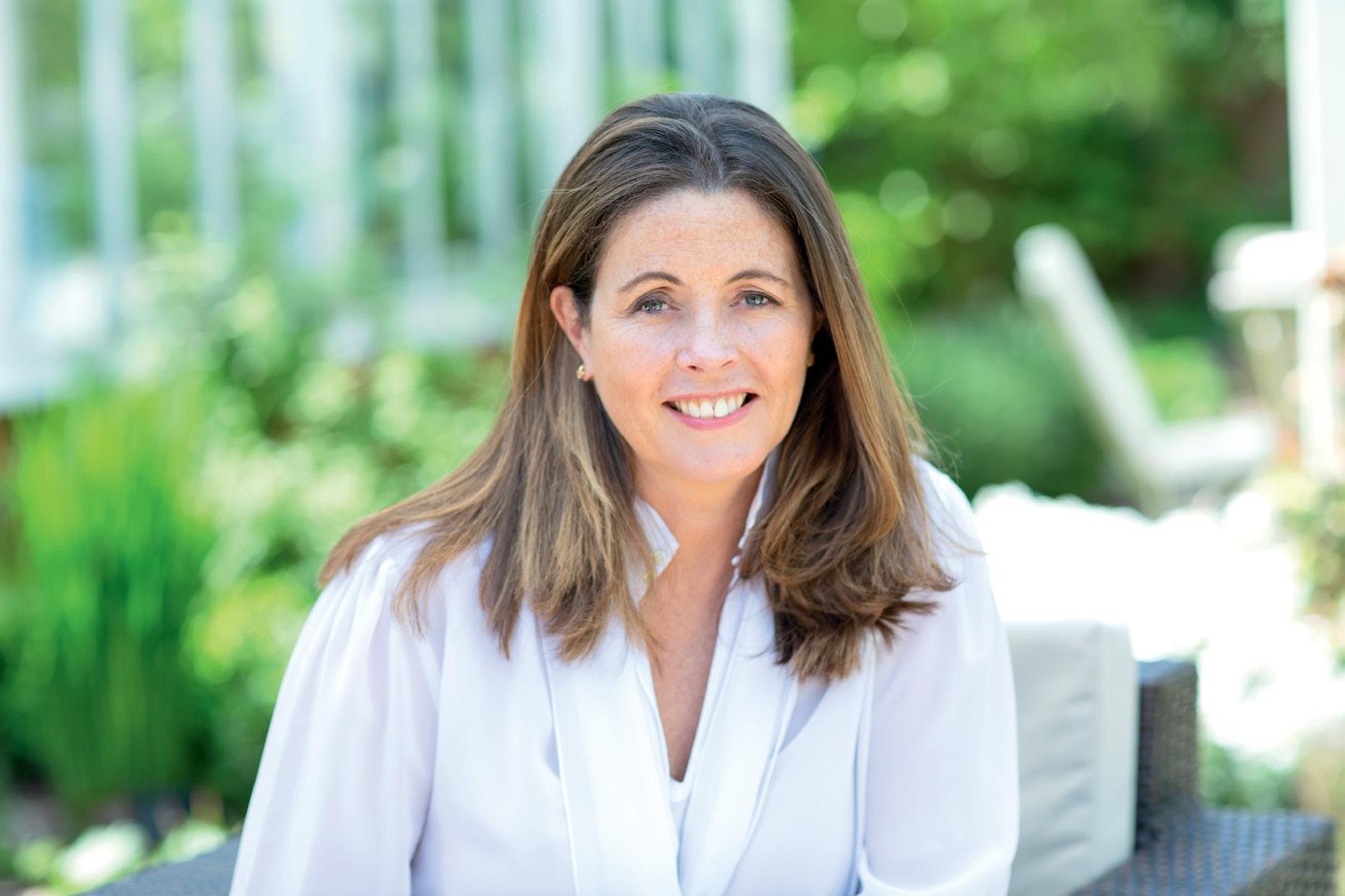
For someone unfamiliar
industry in the UK, what do you have to do if you want to be a cosmetic
insist that a trainee is a doctor, patient flow and experience it’s best to be an independent them, but it’s clunky for patients and problems can arise as corners are invariably cut. However, there are training centres who will train beauty therapists who have a doctor who will prescribe on their behalf, which
Anti-wrinkle injections are prescription only; fillers, skin boosters and polynucleides are available without prescription and often on the open market – anyone can buy them and administer them.
What kind of training have you had and does this give you any more scope of practice than someone who hasn’t had this training?
I have a BSc(Hons) in Human Science and a Registered General Nurse qualification. I am also an independent prescriber and an ICU specialist nurse and experienced Aesthetic Surgery Practice Nurse. I am a member of the British Association of Cosmetic Nurses and ACE, The Aesthetic Complications Experts Group. Both societies are exclusive to Doctors, Nurses and Dentists. Both require clarity on insurance, which you have to jump through many hoops to get.
As I started my aesthetics career before any training was available, I learned in the ‘watch one, do one, teach one camp’. Over the years, as more certified training emerged, I have had training provided by product manufacturers as well as specific training in anti-wrinkle and fillers, so I have designed my training based on my client base and their requirements. Having been around for so long, like many seasoned practitioners, I’m a relatively slow adopter of new treatments. The more experienced I get, the less I do! I have more scope because I don’t need to rely on anyone else in my patient journey, plus I am fully insurable and have a network of similarly qualified and experienced practitioners to learn from and be supported by.
Can nurses prescribe and inject dermal fillers and antiwrinkle drugs without a medical practitioner?
Only if they have undertaken a specific independent prescribing course, which is one year part time post-grad. It’s expensive so you’ve got to be committed. Some undergraduate courses now include it.
Do you feel you have to compete with under-qualified cosmetic nurses? Do they offer their services at a lower cost?
There are always beauty therapists and sometimes hairdressers offering anti-wrinkle and fillers at “competitive prices”. I don’t compete. My prices are very high in comparison and I make sure
patients know that they are getting high quality professionalism. My consultation and assessment alone shows them that if they have visited under-qualified practitioners previously.
Do you feel the big Pharma companies in the UK properly vet practitioners who want to buy injectables from them?
It’s mixed. Some do and some don’t. There are also cheap versions available from international suppliers who are very haphazard in their vetting.
How many hours per year is the minimum requirement for nurses who perform cosmetic procedures and do you have to obtain CPD/CME points?
In the UK, the Nursing and Midwifery Council provides CPD/CME points. It’s 450 hours with direct patient contact over three years in any nursing role to maintain registration on the register, as well as 35 hours of CPD relevant to your scope of practice and annual basic life support training. This is revalidated every three years and requires sign off by another nurse.
What do you wish to see change in the UK aesthetics industry?
Regulation is on its way, which will revolutionise these treatments, making them much safer for the patient. Insisting on licensing but having it properly policed, and allowing products available to only fully qualified practitioners will make a big difference. However, the key will be in public education and policing/monitoring.
I think most countries with a burgeoning non-surgical cosmetic industry struggle with patient safety when it comes to the boom in procedures and revenue (both to the tax authorities and therapists/ medics). It would be good to have a global consensus, from both the medical profession AND the manufacturers of these products.

4511502)
• Injectables are highly unregulated, with dermal fillers free to be purchased by anyone
• Anyone, including beauty therapists and hairdressers can train to perform injectables
• Cosmetic surgery is highly unregulated, making it possible for nonspecialised surgeons to perform procedures they’re not experienced in
• Advertising guidelines are less strict than in Australia, and use of schedule-4 brand names is permitted
• The UK government has proposed a new licensing scheme with stricter guidelines for aesthetic practitioners, this has not come into effect at the time of publishing this article
• Almost 3,000 complaints about cosmetic procedures were made in the UK in 2022
I then decided to pursue my new career in the field of regenerative and medical aesthetics in 2010 and have attended many training courses in this field over the last 13 years, all in accordance with the GMC’s Best Medical Practice, and hold full revalidation with the GMC. My Medical Qualifications allow me to practice medicine and aesthetic medicine here in the UK and to carry out all treatments which I currently deliver in my practice ranging from topical, medical device led treatments, to facial injectables.
In the UK, how can patients know that they are being treated by a qualified practitioner, especially when it comes to injectables?
Patients have access to ask their practitioner for their qualifications, be it Medical, Nursing and Dental as these are the qualified practitioners allowed to carry out such aesthetic treatments here in the UK. Patients are able to look this information up on the websites for the General Medical, Nursing and Dental Councils, on which a qualified practitioner will have a unique licensed number, also stating their regulation status, which is essential for patients to have access to. Furthermore, if patients are unsure off whom to turn to, they should seek advice and referral from their primary care practitioners or General Practitioner (GP).
In your opinion, why is the injectables industry so highly unregulated in the UK, and do you think it will change soon?
This is an exciting and fast paced industry that has grown at such a pace that the regulations have not been put in place at the right pace to match. Currently, Doctors, Nurses and Dentists are regulated by their own professions to qualify carrying out injectable procedures due to being regulated by their own professional bodies, however this isn’t yet in place for other healthcare professionals. With the new Government Regulations being proposed, this will aim to bring about a better structure for regulation soon here in the UK. Stricter regulations and more education and discussion around this topic, and visibility in the media, through better transparency of practitioner qualifications and credentials would, in my opinion, result in higher patient safety.
Is it true that basically anyone can buy injectable products in the UK? Even non-medical professionals? Current, and sadly, this is true.
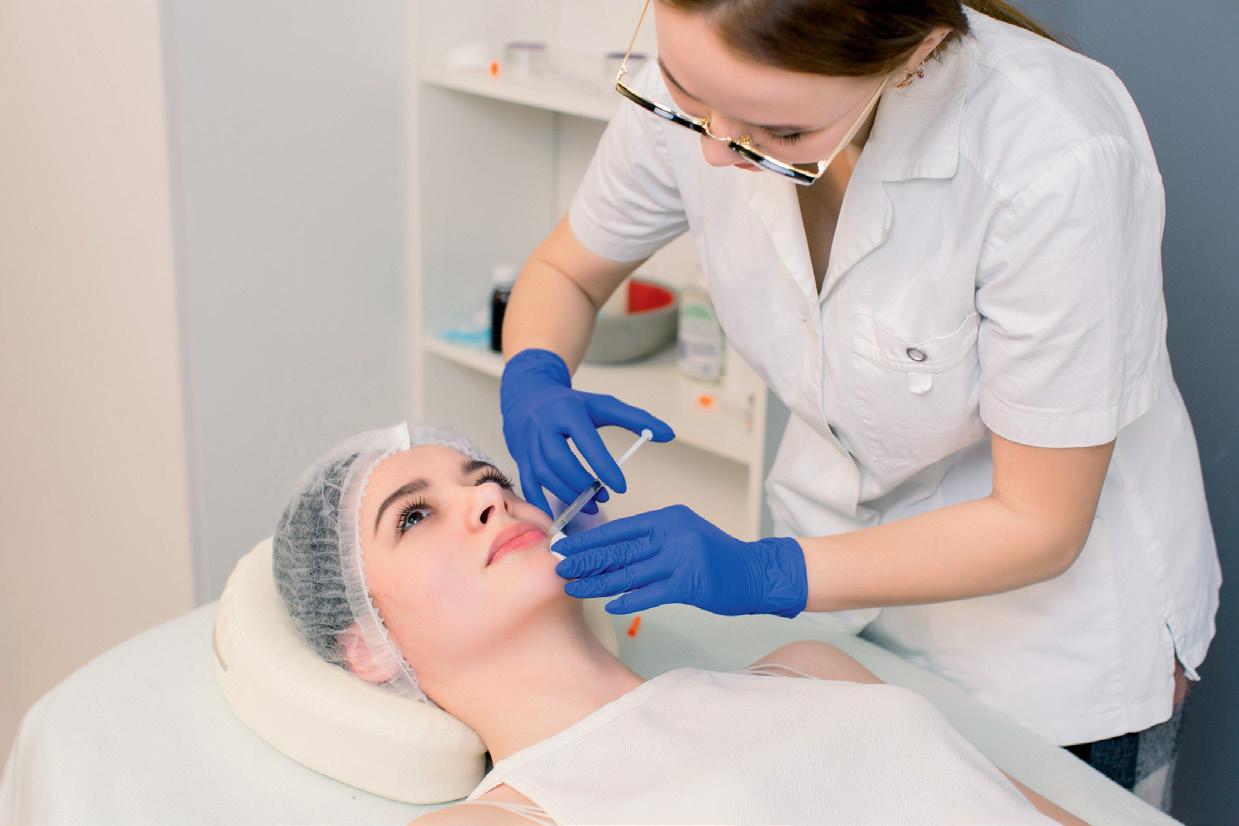
CPD or CME is essential for any health care professional performing cosmetic procedures. Is there a professional body or society that administers your CPD/CME program? How many hours per year is the minimum requirement?
I am regulated by the General Medical Council here in the UK, and undergo yearly appraisals by a Responsible Officer within my profession, as well as having a 5-yearly full revalidation. This is a highly robust and comprehensive 360-degree assessment, also by patients and peers. I would like to see a similar type appraisal and revalidation type system put in place for all healthcare professionals practising within the aesthetic sector.
If you work with social media influencers, do they have to declare their conflict of interest when they post about cosmetic procedures?
I am very selective of the types of social media influencers whom I partner with and choose those who ‘become a patient’ in my practice, based on their aims and objectives personally, and those who are truly seeking an aesthetic treatment for themselves, versus this being ’transactional’, as the latter does not work for me. I also select these who work alongside my goals which are to educate, inform and empower the public with knowledge on the science, data and mechanism of action and background behind the treatments themselves, the companies who create these, as well as my own clinic purpose and ethos. Yes, they would be required to declare any conflict of interest when they post about procedure they have with me and with us.
What do you wish to see change in the UK aesthetics industry?
I wish to see practitioners stop offering discounts on their treatments and their service. This devalues the knowledge, skillset and reputation that we as Doctors bring to the table to serve our patients and the communities based on Good Medical Practice.
Patients will always be patients, and not customers. I don’t see lawyers, architects and accountants devalue their services by offering discounts and Black Friday deals on their services, and it is always a shame when I see this happen to the aesthetics industry here in the UK.
Is there a country that you see as a ‘role model’ when it comes to regulations?
I have to commend Australia being a strong role model for good regulation.

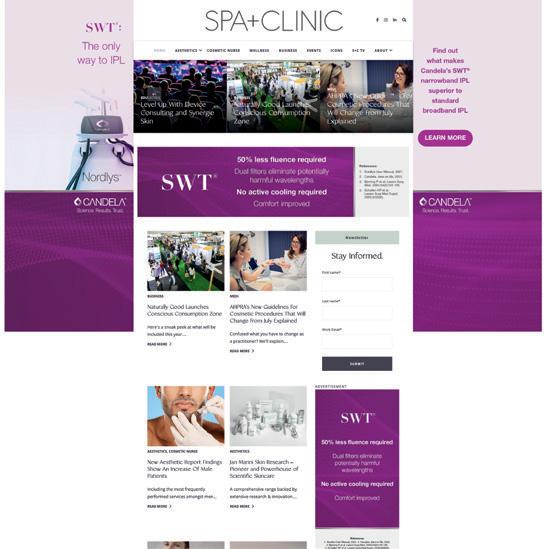
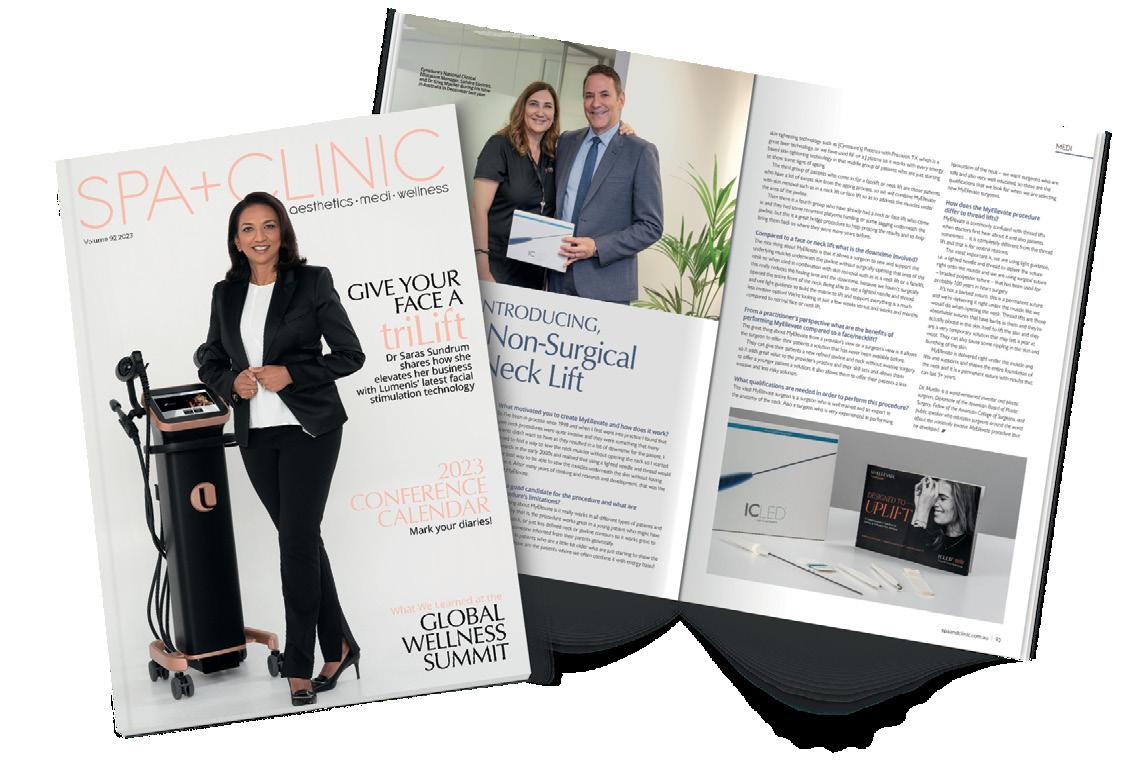

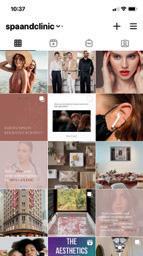
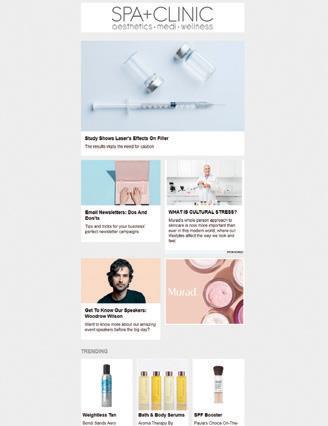
You may have heard the industry stirring with excitement as Rejuran – a ground-breaking injectable – is making its waves. Aptly dubbed the ‘salmon sperm injectable’, Rejuran is made from Salmon DNA and stands out for its ability to rejuvenate skin to a level of radiance and youthfulness that many aspire to achieve. We explore why Rejuran is increasingly popular with cosmetic injectors and patients alike.
Rejuran, distributed in Australia by K Bridge Medical, is a pioneering skin rejuvenation treatment derived from salmon DNA. This advanced injectable does not just mask skin imperfections like traditional methods; instead, it delves deep into the dermis, enhancing the skin’s natural collagen and elastin production.
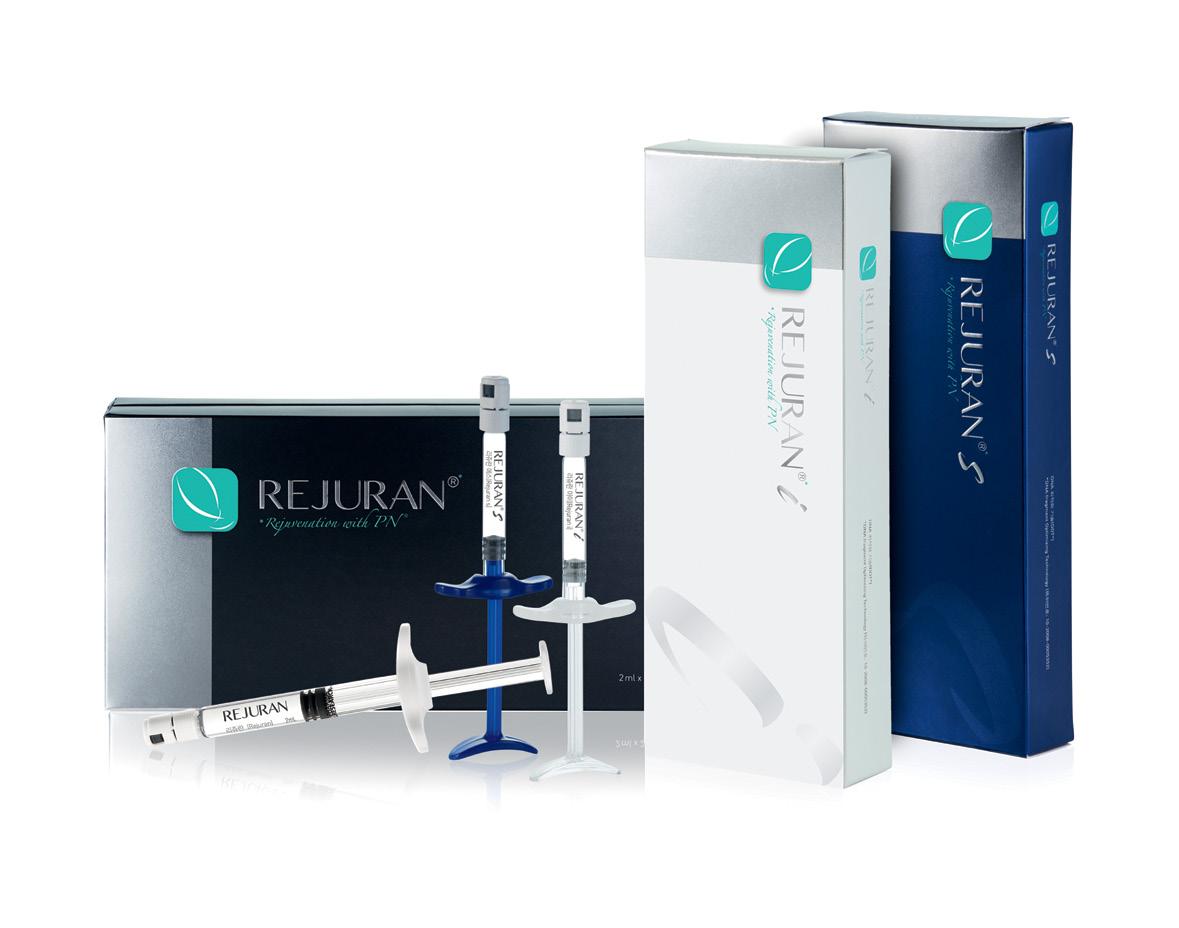
Additionally, salmon DNA is pivotal in promoting fibroblast growth, which is essential for collagen and elastin generation and new skin cell formation.
The secret behind Rejuran’s efficacy lies in its composition. Developed using DOT ™ technology (DNA Optimising Technology), Rejuran is made of polynucleotide DNA fragments from wild salmon, offering a novel approach to skin rejuvenation. Unlike hyaluronic acid skin boosters, Rejuran’s bio-active DNA molecules assists in stimulating regeneration and repair, reducing inflammation and increasing the proliferation of fibroblast cells. This promotes long-term growth of elastin and collagen in the skin, addressing various skin issues such as texture, elasticity, hydration, tone, fine lines, oil production, pore size, and acne scars.
The benefits of Rejuran can be attributed to its key ingredient: polynucleotides. These are long chains of nucleotides – essentially, fragments of DNA – extracted from wild salmon. Polynucleotides (PN) in Rejuran are a purer and more concentrated form of PDRN, offering potent regenerative properties. They are also highly compatible with human skin.
The high-molecular-weight PN chains in Rejuran primarily function by boosting the metabolic activity of fibroblasts, the cells responsible for renewing various dermal components. This cellular remodelling stimulates collagen production, combats signs of ageing, and reduces acne scars.
Published research1 has demonstrated that salmon DNA possesses remarkable wound healing abilities, supporting blood vessel growth, thereby facilitating cell growth and repair. This leads to a stronger skin barrier, making it less prone to irritation, redness, and sensitivity. Furthermore, Rejuran has been found to be effective on UV damage, enhancing DNA repair.
The Rejuran treatment begins with the application of a topical numbing cream to minimise the patient’s discomfort. Depending on the practitioner’s preference and the targeted area, either a needle or an injectable gun administers the product beneath the skin.
Rejuran’s biocompatibility make it beneficial for areas challenging to treat with other fillers or toxins. The expected benefits of Rejuran include improved hydration, reduced wrinkles and sagging skin, and diminished pigmentation. Notably, for optimal results, a full-face treatment is recommended.
Rejuran represents a unique approach to rejuvenating injectables, harnessing the regenerative properties of salmon DNA. It offers a solution that not only treats but also fundamentally restores skin health. Its growing popularity underscores its potential, perhaps explaining why so many clinics in Australia have already embraced it as part of their list of injectable treatments.
1 Published Research can be accessed on https://onlinelibrary.wiley.com/doi/abs/10.1111/ j.1468-2494.2010.00551_6.x
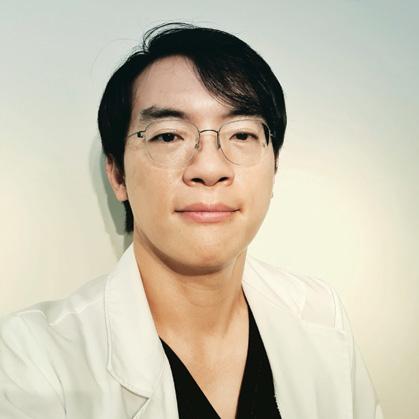
Dr Eric Song, Director Reskin Medical
Dr Song, how long have you been using Rejuran for and why did you decide to offer it at your clinic?
I have been using Rejuran for approximately six months now, even though I’ve been aware of this product for nearly a decade. During my time as a postgraduate research student focusing on photobiology, my research primarily delved into UV-induced DNA damage and repair mechanisms involving nucleotide excision repair or base excision repair. Dr. Hyun Jun Park, recognised as the “Mother of Rejuran,” introduced me to the concept of developing a product containing fragmented DNA nucleotides. I found the idea intriguing, envisioning
its potential molecular-level assistance in repairing cellular injuries and restoring homeostasis.
What ‘gap’ in an injector’s offering does Rejuran fill?
Rejuran stands out as a distinctive product, offering more than just superficial enhancements like plump cheeks or fuller lips. Its uniqueness lies in its ability to promote tissue restoration, and exert antiinflammatory effects. Instead of merely creating volume, Rejuran acts as a scaffold, signalling dermal fibroblasts to be recruited and activated, thereby enhancing the dermal collagen matrix. This, in turn, contributes to the support of the overlying epidermis.
The comprehensive impact of Rejuran extends beyond aesthetic changes, aiming to elevate overall skin quality. By fostering
improvements in the dermal matrix, epidermis, and barrier function, it plays a role in enhancing hydration, radiance, and clinically addressing fine lines and wrinkles. In essence, Rejuran’s effects go beyond the surface, promoting a more holistic and natural approach to skin rejuvenation.
Are there skin conditions that shouldn’t be treated?
Irrespective of age or gender, we all experience daily internal and external stresses, including oxidative, nitrosative, or UV-induced factors, as well as exposure to mechanical or chemical irritants, all contributing to injurious states. While most individuals can naturally recover from these injuries to maintain internal balance, the efficiency of these repair processes may be influenced by genetic factors and aging, potentially increasing the likelihood of ailments. Thus, Rejuran could theoretically offer benefits at any age, whether or not active skin issues are present.
However, for cosmetic purposes, I firmly advocate restricting the use of Rejuran, similar to other cosmetic procedures in Australia, for underage patients unless specifically advised by medical professionals and consented to by guardians. Such use should be based on clear medical indications, such as non-healing wounds or scar treatments.
Contraindications for Rejuran include pregnancy, anticoagulation therapy, and a history of salmon or fish allergies. While autoimmune conditions are not deemed absolute contraindications, individuals with such conditions should exercise caution. Additionally, it is not recommended for those who have recently undergone dermal filler injections due to uncertainties regarding

• Scar patients; including acne and surgical scars. Superficial scars respond best with a series of 3-4 sessions spaced monthly. Depth of injection is critical for results, namely intradermal.
• Combination treatments. In this application, Rejuran acts as a scaffold for augmentation of a cellular remodeling. This is my most frequent application as Rejuran compounds neocollagenesis from other modalities such as microneedling, lasers and other energy devices. Essentially, polynucleotides combined with procedures provide an outcome that far exceeds the expected outcome of each modality. Profound results are achieved in one to two sessions.
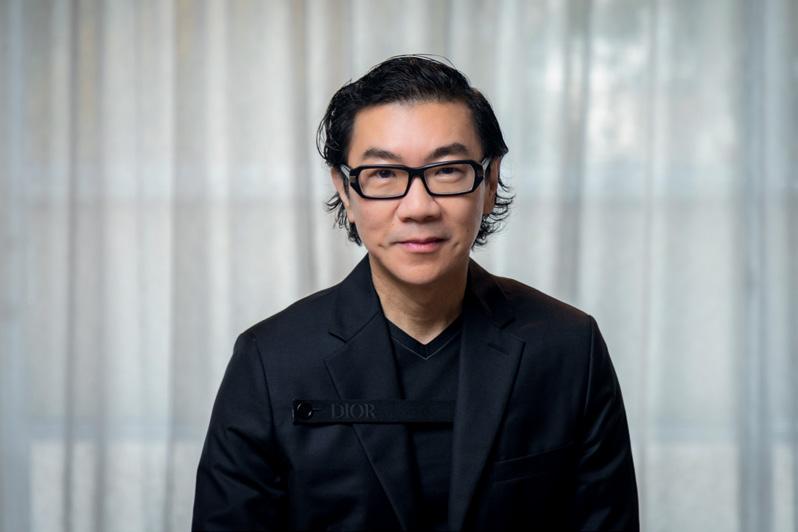 Dr Steven Liew, MB BS (SYD), FRACS, Director
Dr Steven Liew, MB BS (SYD), FRACS, Director
Regenerative medicine like Rejuran is the new frontier in aesthetic treatments, it will revolutionise aesthetic results that we can achieve non-surgically and take them to the next level. Rejuran is very different to other ‘bio stimulators’ in the market, in that it does not cause any inflammation and hence, less chance of lumpiness or nodules formation.
Dr Davin Lim, Dermatologist, Cutis and DVP
What
The three main patient main groups I use
Anti-aging/ rejuvenation patients. The results from this group is a subtle improvement of skin quality, including better luminosity, reduced fine lines and pore sizing. Typically results are seen in one session, however best outcomes are achieved after 3 sessions,
In terms of injecting techniques for Rejuran, what is important to know? Rejuran is one of the easiest injectables to master, however there are three important points to understand.
1. Level of injection. Rejuran should be placed superficially, as the mechanism of action is intradermal. A short 33 G needle is provided with the Rejuran kit as this limits the depth of penetration, ensuring the product is placed in the appropriate level. With Rejuran S, my technique is bevel up with injected volumes of around 0.05ml per push.
2. Slow, steady & comfortable injections. To reduce pain during the procedure I apply fast acting numbing gel 20 minutes before the procedure, inject slowly and also add cooling to the skin- either a Zimmer cooler or ice.
3. Lumps & bumps are common after the procedure. The product, if placed correctly, is intradermal. It takes 24 to 48 hours to resolve, so remember to tell your patients. Synergistic results are achieved by combining Rejuran (which aids in laying down the scaffold) and neocollagenesis treatments, such as laser.
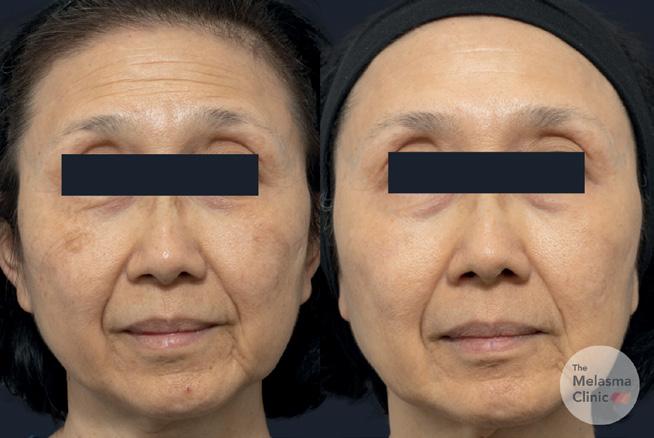
The injection technique is straight forward; by placing small aliquots of Rejuran superficially with its supplied super small gauge needles, in serial punctures without any risks of long term lumpiness. In thin skin area such as the eyelid skin, some overseas colleagues and I have started injecting Rejuran with the use of cannula with products placed immediately under the thin eyelid skin.
Having the chance to test Rejuran both locally and overseas for the last 15 months, I feel Rejuran will fill a void for the facial skin qualities; skin creepiness and dullness. I am particularly looking forward to the long term result of the continual use of Rejuran-i to improve the commonly complaint skin wrinkling, thinning and “dark circles’ of the upper and lower eyelids. Due to its True Regeneration mode of actions and its water like consistencies, it is a product to use with a low risk of causing any lumps or bumps or the risks of vascular accidents.
Rejuran, by nature of its regenerative properties, will provide healing power to damage tissues either from sun damage, ageing related damage or our any other form of skin injury. Rejuran will automatically serve as an ideal immediate treatment to further enhance the result of any other aesthetic procedures of the skin, such as immediately after any laser work (ablative and non-ablative) any skin needling or facial surgery. I have been using Rejuran on my facelift and eyelid surgery patients to ensure faster and optimal healing with minimal visible scarring with great results. Like any forms of injectables, Rejuran is contra indicated to any patients with active infection or inflammation to the surrounding tissue.
For more information, visit rejuran.com.au
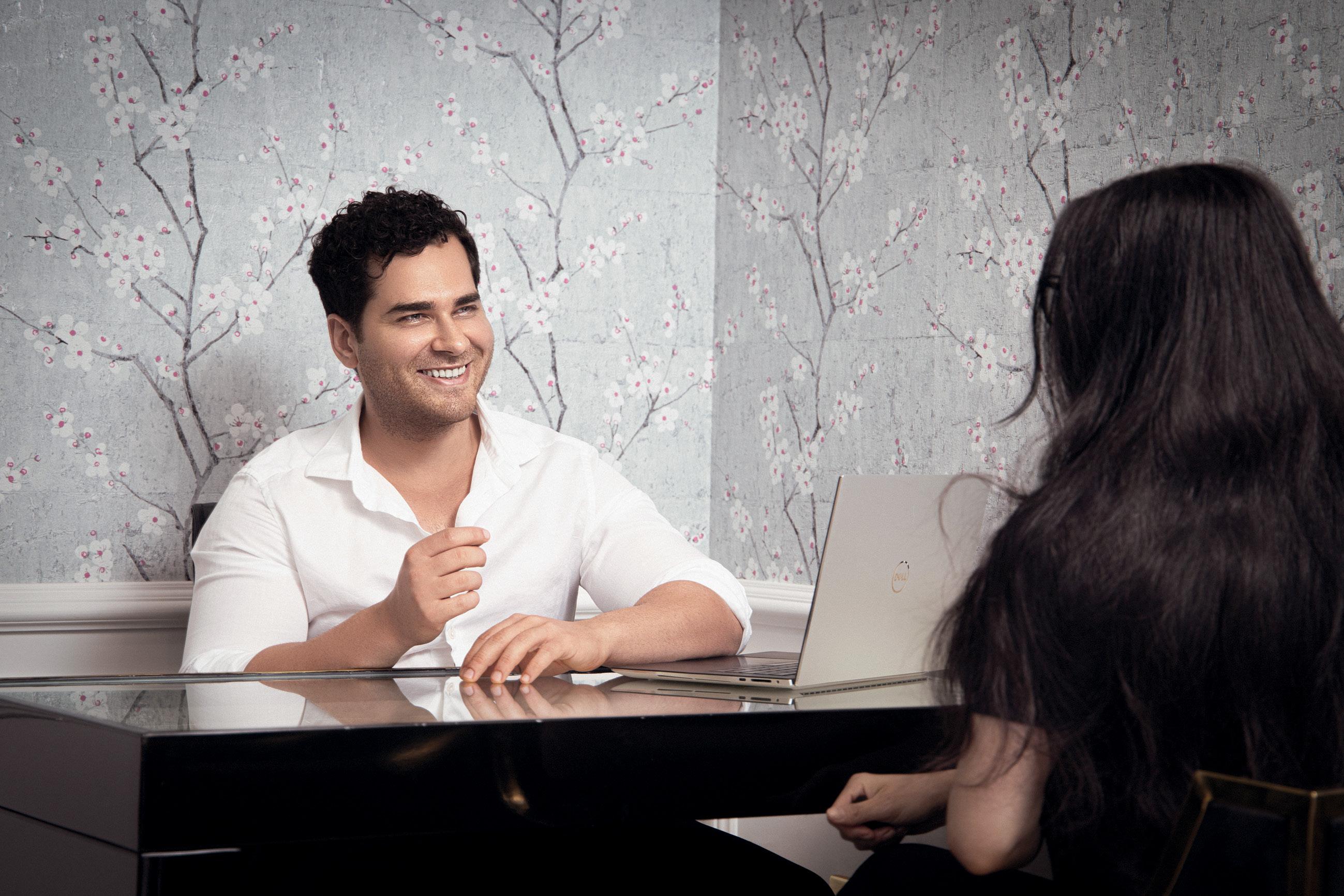 Dr Rafael Ekmejian
Dr Rafael Ekmejian
DR RAFAEL EKMEJIAN shares the innovations that will be big this year.
Trend 1: Regenerative medicine
Regenerative medicine involves using the body to heal itself. Harnessing the power of the body’s regenerative abilities can be used to reduce wrinkles, reduce pigmentation and reduce the recovery time from treatments. Platelet-rich plasma has been used for these purposes in the past, but newer treatments using exosomes may allow us to have more powerful regenerative treatments without needing to extract blood or other invasive procedures. Exosomes may be applied through injectables to the target area but may even be used in next-generation skincare products.
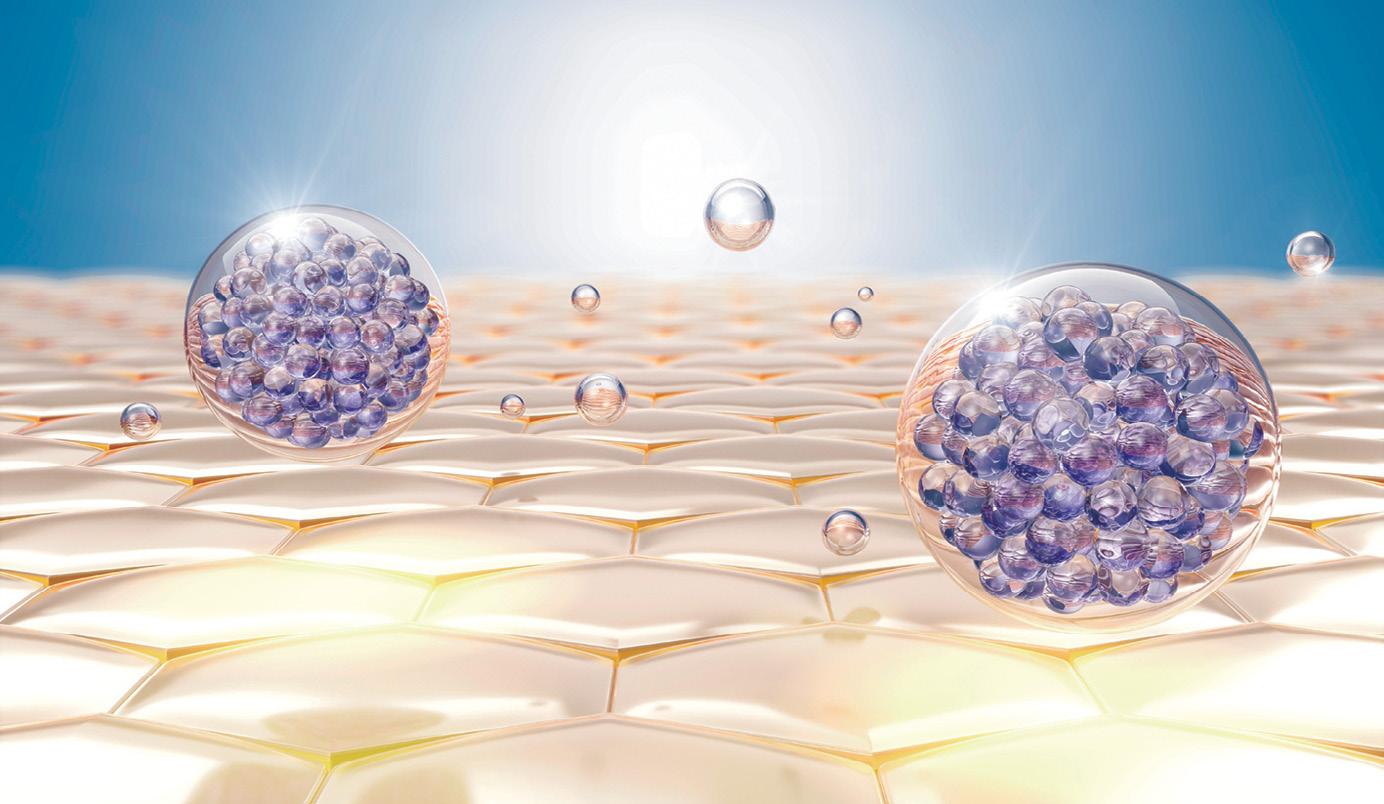
So what are exosomes? Exosomes are tiny structures that are released by cells that act as messengers by carrying information to other cells. They look like tiny bubbles which contain fats, protein and genetic material. While some studies have looked at animal-derived exosomes they can also be made from plants. They can signal your body to increase collagen production, improve skin tone, reduce discolouration and reduce hair loss. They are small enough to be used in skincare as they can be made to penetrate to the deeper layers of the skin. However, in the future, they may also be used with treatments like microneedling, cosmetic injectables or even laser treatments. While further research is needed, exosomes look promising as a nextgeneration of non-invasive treatments.
A big trend in recent years has been the increased use of ultrasound for cosmetic injectables. Ultrasound can be used before cosmetic injectables for example in the planning stages to map out blood vessels and minimise the chance of complications like vascular occlusions. This is especially true for areas such as the temples, and nasolabial folds where there can be a huge variability in where the blood vessels are sitting. New ultrasound devices have entered
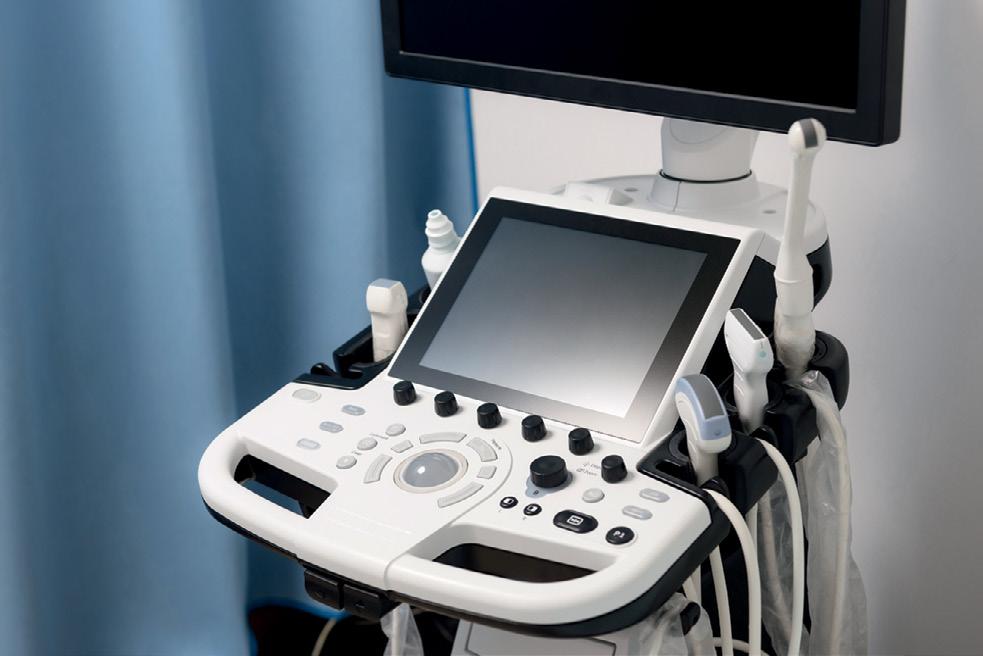
the market which are much more versatile in their size and affordability. We may reach a stage where all cosmetic injectors should know how to use ultrasound to offer more safety with their cosmetic treatments. Ultrasound may also be used in the management of filler treatments for example, identifying if filler migration has occurred and where the filler has moved to.
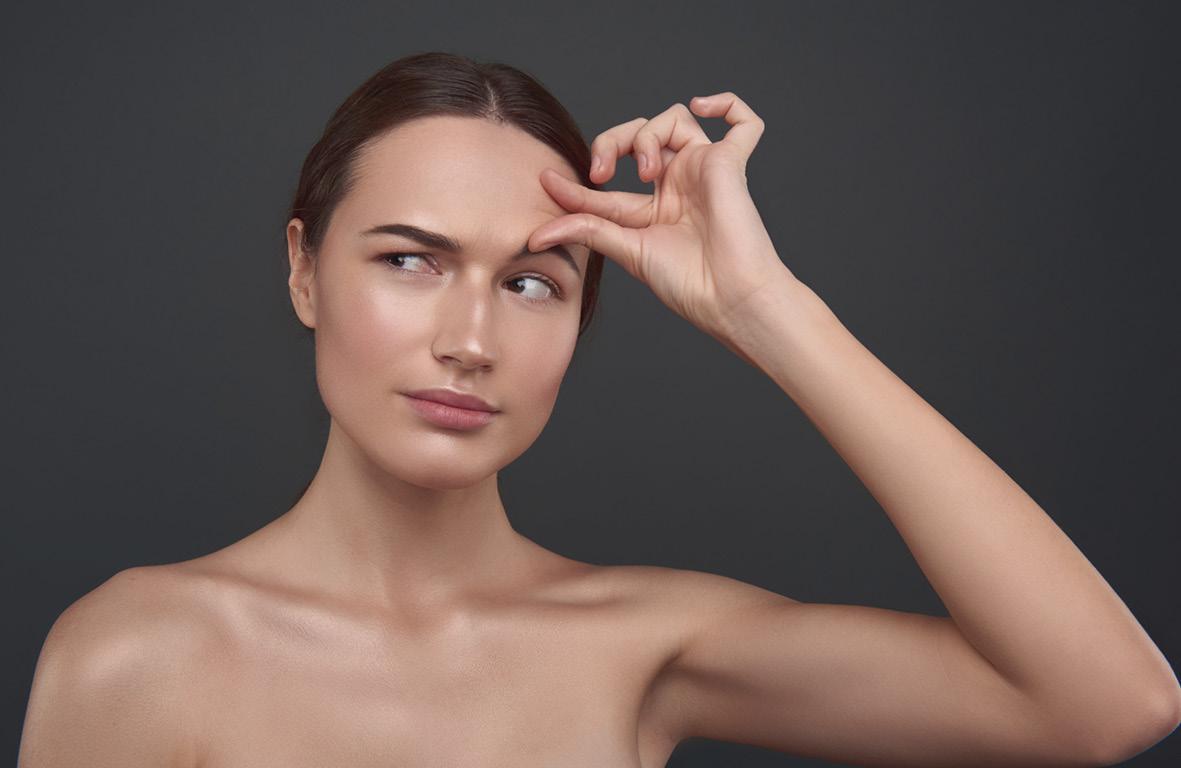
Newer anti-wrinkle products are beginning to enter the market with significantly more longevity than the products currently on the Australian market. One of the major complaints of anti-wrinkle products is that they do not last long enough. With newer generation antiwrinkle products, this may be changing. It is probably not a treatment I would use on a patient who is new to cosmetic injectables as I want them to be comfortable with a treatment before offering something longer lasting. However, I think they may offer a lot of promise for patients with busy schedules and struggle to make the time to see their cosmetic injectors.

In the past, cosmetic treatments were often planned according to a cosmetic injector’s surface judgement. However, newer tools may be changing this. We have improved tools for skin analysis that will allow us to measure the degree of hydration, elasticity, tonal irregularities, pore size, extent of wrinkles and hair quality. This will allow the clinic to measure the degree of improvement to ensure that the right treatment is selected and that patients are continuing to benefit. One thing patients have always asked for in the past is a way of visualising how a cosmetic injectable treatment will look on their face. Thanks to the advances in artificial intelligence, newer tools are coming to the market that will allow cosmetic injectors to plan cosmetic injectables on a patient and show the patient exactly how the treatment will look. We will finally be able to demonstrate to a patient how 1ml of filler might look versus a more extensive plan. This will allow patients to make sure that they are getting the most bang for their buck to make sure that all their concerns are adequately addressed.
While not strictly a cosmetic injectable trend, wellness is going to play an increasing role in the management of beauty. Beauty sleep is not a myth. Without the recovery time that your sleep provides it doesn’t matter how many cosmetic treatments you get, you will still struggle to look your best. An important part of addressing beauty is to make sure that your mental health and your sleep are being optimised. Cortisol is a stress hormone that if over-secreted can impair your skin health and recovery. In addition, a good cosmetic physician should also be aware of the supplements that can be leveraged to support skin health such as collagen supplements and hyaluronic acid supplements. These supplements have also shown promise in improving joint health.
Dr Rafael Ekmejian is a Cosmetic Doctor who specialises in natural injectables, from anti-wrinkle to filler and threads, and is

On December 4, 2023, AHPRA published a 55-page document including new proposed guidelines for Australia’s non-surgical cosmetic procedures sector, expanding an ongoing overhaul of the nation’s cosmetic surgery industry. While the previously released guidelines for cosmetic surgery and non-surgical cosmetic treatments, which came into effect on July 1 this year, were aimed at medical professionals, the new proposed guidelines include health professionals and have a specific section for nurses, called ‘Draft Guidelines for nurses who perform non-surgical cosmetic procedures (nurses practice guidelines)’.
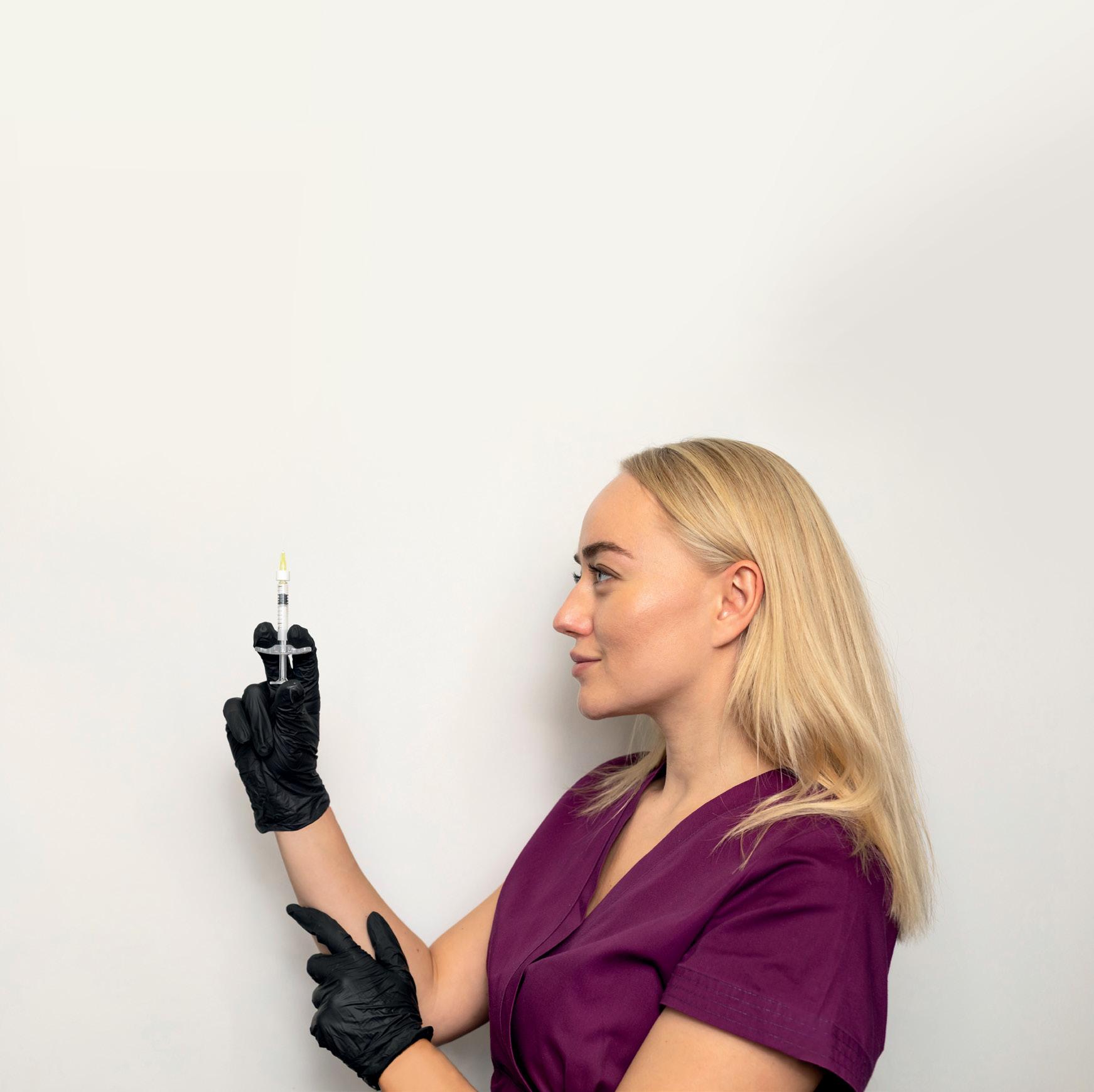
These guidelines address nurse practitioners, enrolled nurses, and registered nurses about their duties in performing and advertising injectable treatments, classified by AHPRA as ‘nonsurgical cosmetic procedures’.
The cosmetic treatment industry estimates Australians collectively spend more than one billion dollars a year on nonsurgical procedures ranging from anti-wrinkle injections and fillers to fat dissolving injections and thread lifts performed by doctors, nurses, dentists and other health practitioners.
‘Getting these services is not like getting a haircut – these procedures come with risk. We want to ensure the public knows what safe practice looks like, and that practitioners are doing everything necessary to keep the public safe,’ AHPRA CEO Martin Fletcher said.
The new proposed guidelines place a stronger emphasis on informed consent and pre-procedure consultation, including a patient suitability assessment. There will also be a focus on prescribing and administering prescription-only cosmetic injectables.
Proposed new advertising guidelines focus on the use of ‘before and after’ images, claims about expertise and qualifications of practitioners, and affirm the ban on the use of testimonials. There are also clear rules on the use of influencers and social media figures.
We spoke to Dr John Holbrook, Co-Founder of Fresh Clinics, who offer Cosmetic Nurses scripting services, business support, and software, to see what he thinks of AHPRA’s proposal. Holbrook told us Fresh Clinics was not directly involved in creating the newly proposed guidelines, however, they have been engaged in discussions with the Nursing
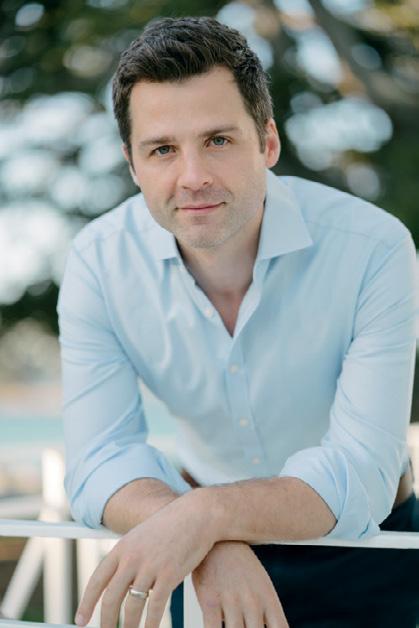
and Midwifery Board, and have found AHPRA to be open to feedback, intending to submit Fresh Clinics’ feedback soon.
“We have had quite a few meetings internally to capture thoughts from the wider team. We are working to actively advise our Fresh community to do the same,” he says.
When asked whether he was satisfied with the proposed changes, he stressed the communal goal for enhanced patient safety. “Fresh Clinics and the clinicians and clinics that work with us put patient safety first. Sometimes ‘regulation’ gets a bad rap, but ultimately good regulation helps us all create a better and safer environment for our patients and ourselves. Overall I think these regulations try to strike a balance between patient safety and allowing the industry to continue to grow.”
And what do Fresh Clinics nurses think of AHPRA’s new rules? According to Holbrook, they’re all for it. “Compliance is a pillar for Fresh Clinics and that’s true for everyone who works with us. The reaction so far has been positive and we’re working with everyone to ensure they understand the regulations and provide feedback.”
This sentiment was shared by Juv’ae nurses, who seemed to agree that, for them, not much was going to change. Juv’ae empowers nurses with the right clinical skills and health coaching tips, business support and a network for a successful career in cosmetic medicine. “Juv’ae always follows best practice and will ensure we are safeguarded,” says Tina Ashkani, RN. Cosmetic Nurse Nicki Gabriel adds that Juv’ae nurses are “already upheld to the highest standards.”
Juv’ae Director Nicole Schmid-Sanele actively participated in the collaborative efforts between Australian Health Practitioner Regulation Agency (APHRA), representing the Cosmetic Nurses Association. The workgroup engagement focused on
refining guidelines for registered health practitioners involved in non-surgical cosmetic procedures.
The comprehensive 55-page document presented three distinct drafts, covering various aspects of nonsurgical cosmetic procedures. Notably, the Cosmetic Nurses Association was specifically included in the working group concerning the “Draft Guidelines for nurses who perform non-surgical cosmetic procedures.” Regrettably, their involvement was not extended to the working group dedicated to the “Draft guidelines for registered health practitioners who advertise non-surgical cosmetic procedures.” Consequently, they are unable to endorse the proposed changes outlined in this particular draft and neither Juv’ae nor CNA approve or agree with the recommend changes.
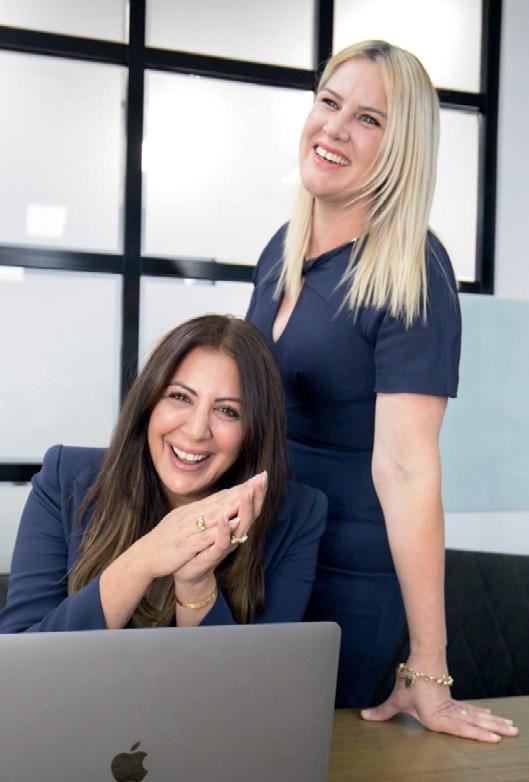
• Claims about expertise and qualifications
• Financial and other incentives
• Use of testimonials
• Social media influencers and ambassadors
• Use of images including ‘before and afters’
• Risk, recovery and idealising non-surgical cosmetic procedures
• Body image
• Realistic expectations of outcomes
• Targeting people potentially at risk
Juv’ae intends to submit comprehensive feedback to APHRA, representing the interests of cosmetic nurses practicing under the Juv’ae modus operandi. Juv’ae anticipates and will be planning with their nurses to expect significant changes to advertising regulations and facility requirements.
We spoke to Juv’ae Co-Founder and Director Melissa Isaia to see what she thinks of the new proposed guidelines, and whether there are any aspects that need reworking.
“While we appreciate and support many of the modifications suggested in the Draft Guidelines for nurses performing non-surgical cosmetic procedures (found on pages 1626), some sections require further clarification,” Isaia says. “These include points related to the definition of non-surgical cosmetic procedures, tools for Body Dysmorphic Disorder (BDD) assessment, the clinical background of nursing, and considerations for the future of Enrolled Nurses (EN) with particular disagreement with clause 17.1 and facility locations. We emphasise the need for precision in language to avoid inadvertently diminishing the skills of nurses and imposing unnecessary limitations.”
Furthermore, the new guidelines for advertising, which include stricter rules on wording and use of before and after images, do not sit well with the Juv’ae team. “We do not endorse any of the Draft guidelines for registered health practitioners advertising nonsurgical cosmetic procedures. We firmly believe that this particular document should not be adapted and left as it currently sits with the Therapeutic Goods Administration (TGA),” Isaia explains.
“Our submission will articulate the concerns and insights of our nursing professionals. We recognise the importance of maintaining a balance between regulatory oversight and the ability of cosmetic nurses to deliver optimal care within the evolving landscape of nonsurgical cosmetic procedures,” adds Isaia.
Cosmetic Nurse and Juv’ae member Lizzie Barrett shares the concern around the advertising guidelines, saying “the regulations around advertising are more worrying, as many practitioners are running small businesses and require the ability to advertise to continue to operate successfully. There is a delicate balance that needs to be considered here: the need to protect the community vs the ability for a small business owner to advertise and promote their services. Putting in place significant restrictions in this internet and social media era can make or break a small business.”
“Juv’ae’s submission to APHRA will integrate the comprehensive clinical governance framework and policies, affirming that the current National Nursing framework and guidelines are suitable when tailored for the nuances of the non-surgical cosmetic industry,” Isaia concludes. “We believe the robust nature of Juv’ae’s clinical governance framework positions it as the benchmark for community safety. Juv’ae is confident that their systems that are in place will deliver safe and highquality cosmetic non-surgical procedures.”
It’s fair to say that no other regulation change in recent times has quite received the same surprised and disappointed reaction from the vast majority of practitioners, like the TGA’s announcement in mid-January that new, stricter advertising guidelines have come into effect.
Arguing that referring to prescription only products as ‘anti-wrinkle injection’ and ‘dermal filler’ draws the consumer’s mind to well-known schedule-4 drugs, the TGA has now banned the use of said terms.
When we broke the news on January 16 on spaandclinic.com.au, it became very clear that most cosmetic injectors do not agree with the new rules. Dozens of comments left on our social media post argued that not using terms, such as ‘anti-wrinkle injection’ and ‘dermal filler’ will further confuse (potential) patients and make it even more difficult to educate consumers. Many practitioners asked the question which terms they should use instead, frustrated at the difficulty to describe
their treatments in copywriting aimed for their websites and social media.
The overall sentiment seemed to be a lack of understanding the motivation behind TGA’s decision. “Would love to know how this was tested and piloted to show with tangible evidence that it does in fact lead to better outcomes for patients,” Dr Jonathan Hopkirk wrote, while Jane Fielding, RN, argued that “Creative language is vague and confusing. […] Good conversations are often started from patients researching [their treatments] prior. Now they will be educated by sites from overseas.”

Describing what he sees online every day, Michael urges practitioners to rethink the way they educate their patients.
Others pointed out the contradictory nature of the new rules with AHPRA’s requirement to be transparent about any treatments performed when posting before and after images.
Dr Giulia d’Anna from Dermal Distinction told us, the new rules introduced by the TGA banning the use of such terms as ‘anti wrinkle treatment’, ‘dermal filler’, and ‘cosmetic injections’ “are at odds with AHPRA requirements that practitioners clearly stipulate what treatments were performed in before-and-after images […] Any efforts to increase patient safety and improve clarity of messaging and informed consent is to be applauded, but rushed measures such as these do nothing to achieve these goals.”
“A number of providers still advertise Haytox, promote the use of Botox and name the brand, despite TGA warnings and national media... This is extremely unfair to practitioners attempting to do the right thing”
“The unintended consequence is that practitioners are left in the dark on how to best present treatment options without breaching the TGA’s unnecessarily strict rules on wording, but still trying to abide by AHPRA requirements. Practitioners are now saddled with the huge task of having to revise all signage, marketing, social media posts and so on at great expense to their operations,” Dr Giulia d’Anna concluded.
However, there are also those who welcome the TGA’s decision, arguing the industry needs to take advertising medical treatments more seriously. Michael Fraser, Co-Founder of Operation Redress, says that the non-surgical and cosmetic injectables industry already has significant non-compliance with AHPRA’s and the TGA’s existing guidelines, and that most practitioner who argue they won’t be able to educate patients anymore, haven’t been doing so in a compliant way to begin with.
“A number of providers still advertise Haytox, promote the use of Botox and name the brand, despite TGA warnings and national media. Some are even bold enough to disclaim the prohibition of a term and then subsequently use it. This is extremely unfair to practitioners attempting to do the right thing,” Michael explains.
“The argument of educating patients through practitioner posts is problematic. Almost all posts promoting these procedures would not meet the standard required to educate other practitioners. The bulk is informational at best.”
“Educational material does not use cinematic camera angles and movement paired with emotive music. It does not end with “xoxo Nurse [name]”. It does not comment on how beautiful a patient is. It does not ignore or downplay risks. It does not use slightly different lighting, framing and angles to misrepresent outcomes. It does not promise or assure confidence or safe outcomes. It does not present data as a fact and hide text at the bottom that says it is a generalisation. It does not leave out key information. It does not exclude source material. It is not dance videos or content with obscene language. It does not target children or use children in advertising. It does not use girl math or Barbie or tomorrow’s meme to promote procedures. It does not joke about prescription medication.”
Overall, there seems to be a lack of consensus when it comes to the ‘why’ behind AHPRA’s and TGA’s regulations. While many are trying to come up with terms they can use to describe their injectable treatments, making their messaging virtually the same as before by finding ‘loopholes’ to stay compliant, Michael argues that the point of all these regulations is “injectors should not be promoting prescription products as a solution to a perceived issue on a prospective patient they have never met.”
“The bulk of advertising is designed to drive sales. This is not a theory; practitioners post about their approach to drive sales. Industry events discuss KPI’s and speaking guests have encouraged practitioners to make more dancing videos. Safety is at risk when sales are the driver. Nobody is telling any provider that during a consult, they can’t educate their patients. That is actually their obligation,” he continues.
Is this the beginning of the end of advertising injectable treatments altogether?
“We don’t advocate for a total ban on advertising injectable treatments,” says Michael. “Our advocacy is around improving patient safety, which includes ensuring no person is convinced by a provider’s Instagram video or imagery into thinking they need to fix perfectly natural or normal variations in their body. Wrinkles are not a medical condition, but after viewing provider posts on social media, you could be mistaken for thinking it is.”
The delicate balance between running a successful business in aesthetics while holding up the highest moral standards, is a tricky one, and is not just limited to injectables. A large part of the beauty industry is built on people’s insecurities, but there is no doubt that many aesthetic services and treatments help people feel better. Navigating this relatively new industry continues to be difficult.
In the ever-evolving world of aesthetics, small yet meaningful innovations have emerged that have the potential to revolutionise the way injectors handle syringes. The Needle Bar is a simple yet ingenious creation based on feedback from some of ANZ’s most experienced injectors, and is designed to be a simple solution, which has come as a blessing to injectors by providing them with a convenient and sanitary space to securely hold their drawnup syringes.
Gone are the days when injectors had to balance their syringes precariously on the cap, risking accidents or contamination. The Needle Bar presents a practical solution that ensures not only convenience but also increased speed, more confidence and safety in the treatment appointment.
One of the greatest advantages of the Needle Bar is its convenience. Injectors have long struggled to find a place to keep their syringes securely while preparing for an injection. The alternative methods, such as balancing the syringe on the cap, were far from ideal and often resulted in unwanted mishaps. With the advent of the Needle Bar, injectors can avoid such hazards and allocate their focus entirely to the accurate delivery of medication. The availability of a designated place to hold syringes eliminates the need for injectors to multitask and reduces the chances of accidental spills or needle sticks, ensuring a smooth and efficient process.
Hygiene is another significant aspect that the Needle Bar addresses effectively. In the medical field, maintaining a sterile environment is of paramount importance to prevent the spread of infections. The older practice of balancing syringes on caps was not only inconvenient but also greatly compromised hygiene standards. The Needle Bar, by providing a dedicated and sterile space to rest the syringe, ensures that injectors adhere to stringent sanitation protocols. It minimises the risk of contamination and crosscontamination, thereby safeguarding both the health of the patient and the wellbeing of the injector.
The Needle Bar’s impact goes beyond the convenience and sanitation it offers. By streamlining the process of injecting medication, it can contribute to improved patient experiences and outcomes. Injectors can now focus more on establishing a connection with the patient, providing comfort, and addressing any concerns they may have. Moreover, the stability and security the Needle Bar provides can result in more accurate injections, reducing the chances of errors in dosage or medication administration.
Undoubtedly, the Needle Bar has come as a welcome addition to the medical industry, addressing the long-standing challenges faced by injectors. Its introduction represents a milestone in improving convenience, safety, and sanitation
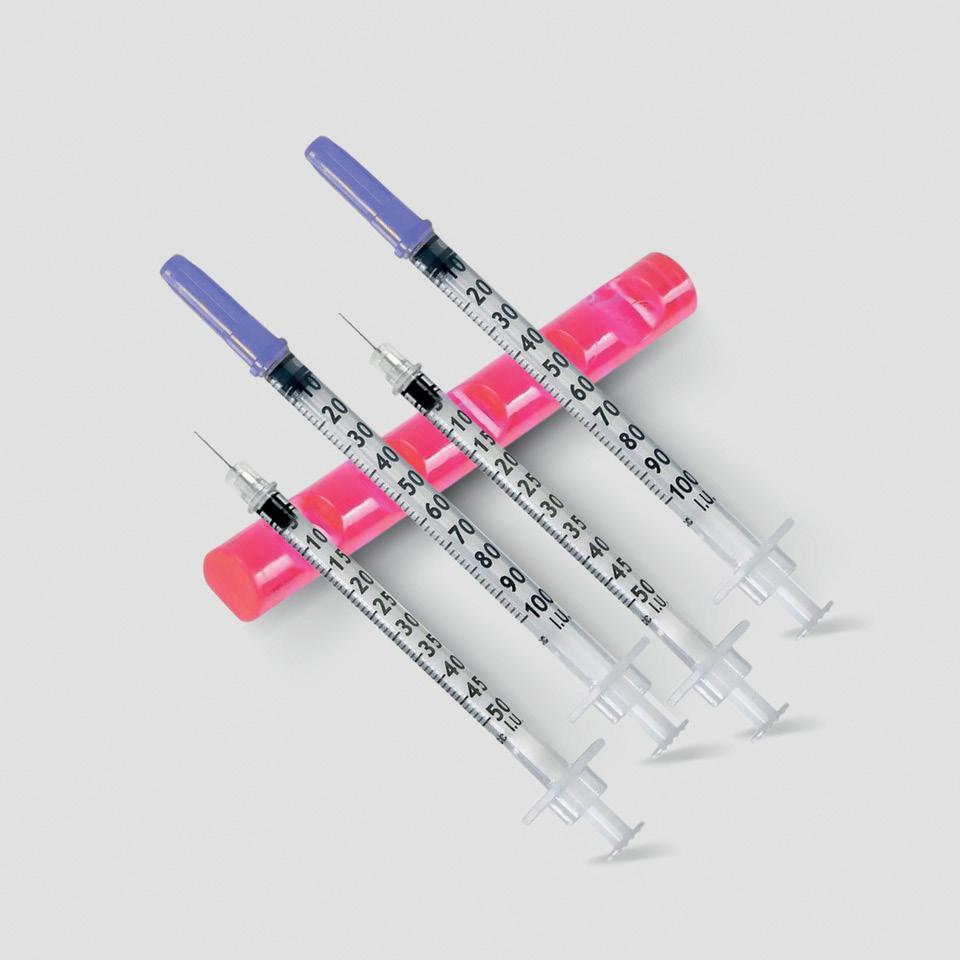
“Whilst Toxin administration is my most common and popular aesthetic treatment, each treatment must be extremely precise and methodical. As we know, units per syringe are vitally important to patient outcome and satisfaction. With the needle rest, I am able to draw up my toxin and place each syringe in the order of use. This device eliminates the searching for and double checking of each syringe in a kidney dish or dressing pack, saves valuable time, enables sterility of each syringe with simplicity and ease. When used correctly, the risk of error is greatly reduced and has been a game changer for my busy practice”.
Emily Armstrong, Registered Nurse. Evolve Aesthetics Melbournestandards surrounding injections. As technology and innovation continue to shape healthcare practices, it is encouraging to witness such simple yet powerful solutions emerge to enhance the delivery of care.
The Needle Bar fills a crucial gap in the world of injections, offering injectors a convenient and sanitary platform to hold their syringes. With its potential to improve efficiency, safety, and patient experiences, we can expect the Needle Bar to become a staple in cosmetic medical settings nationwide.
Available for purchase through The Aesthetic Collective, the Needle Bar marks their first product launch with more anticipated.
theaestheticcollective.com.au/shop
Let your clients’ skin shine thanks to these skincare powerhouses including peptides.

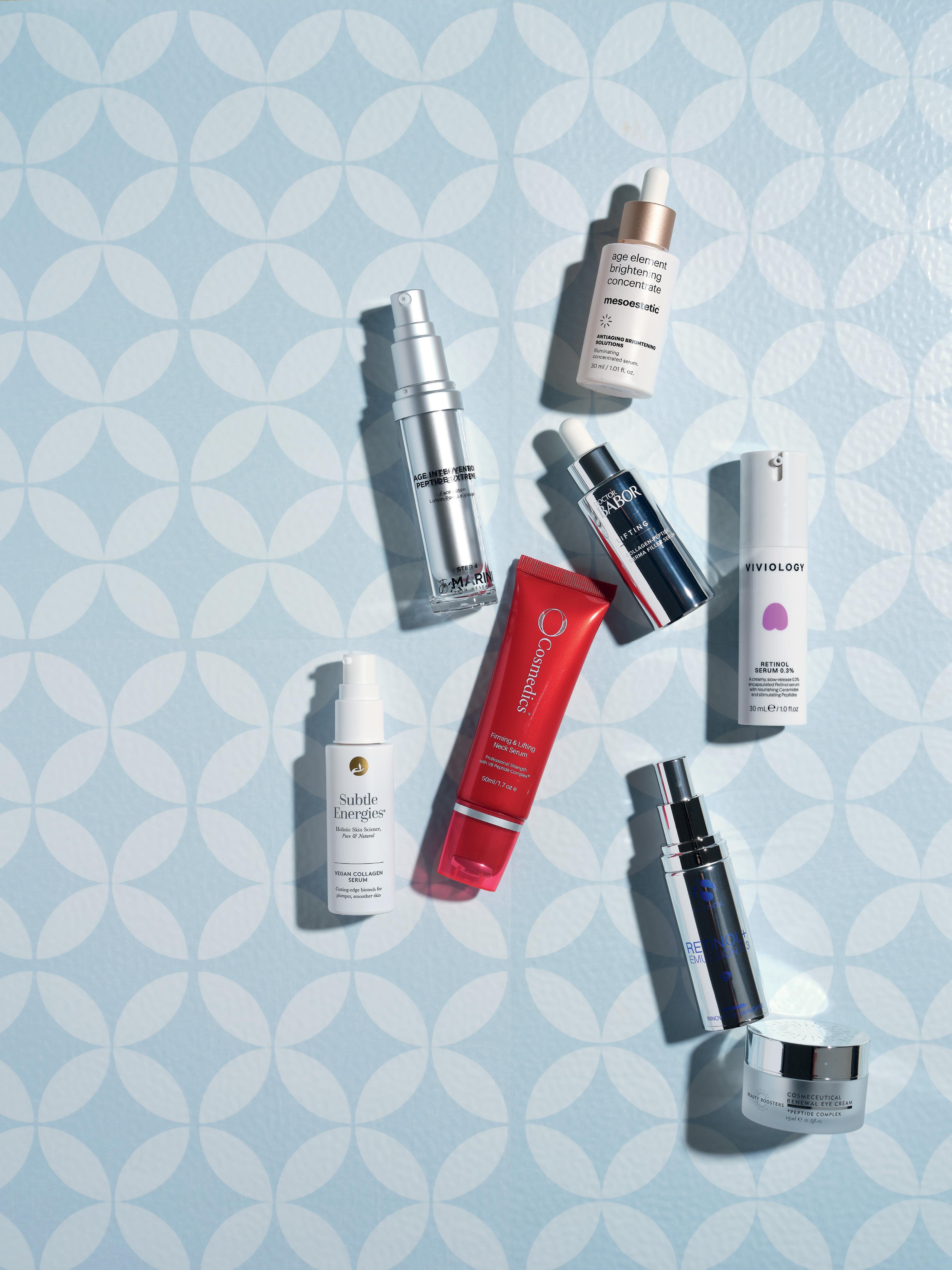



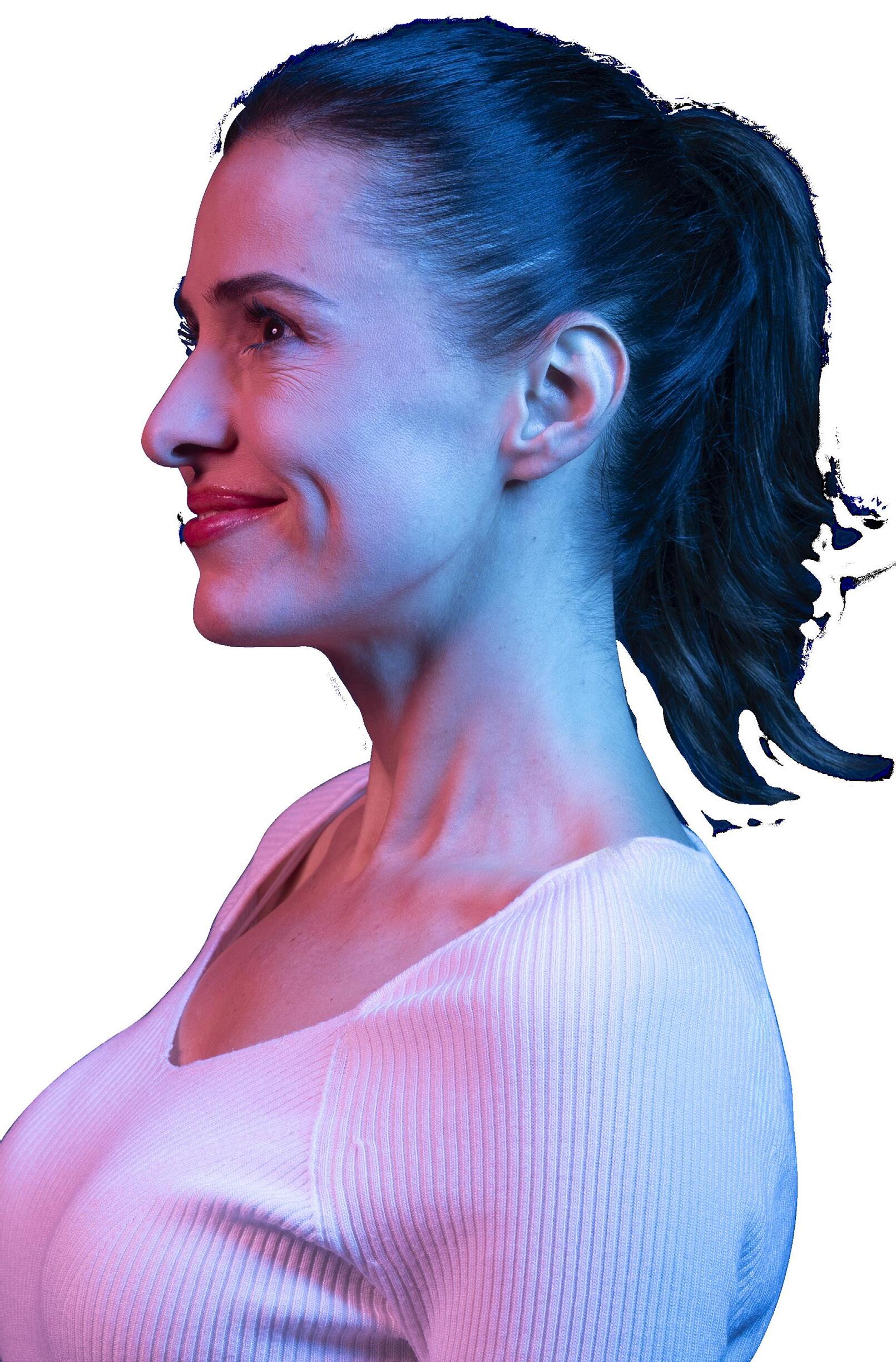
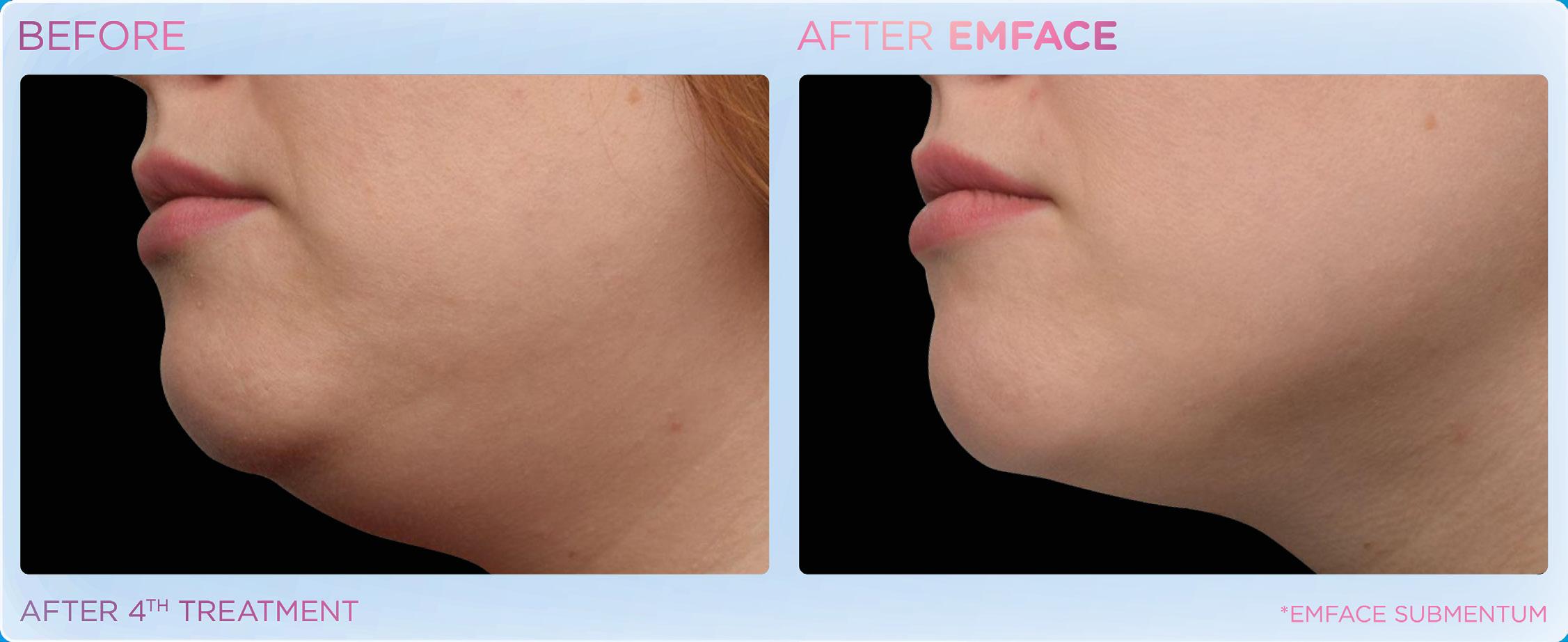



•

